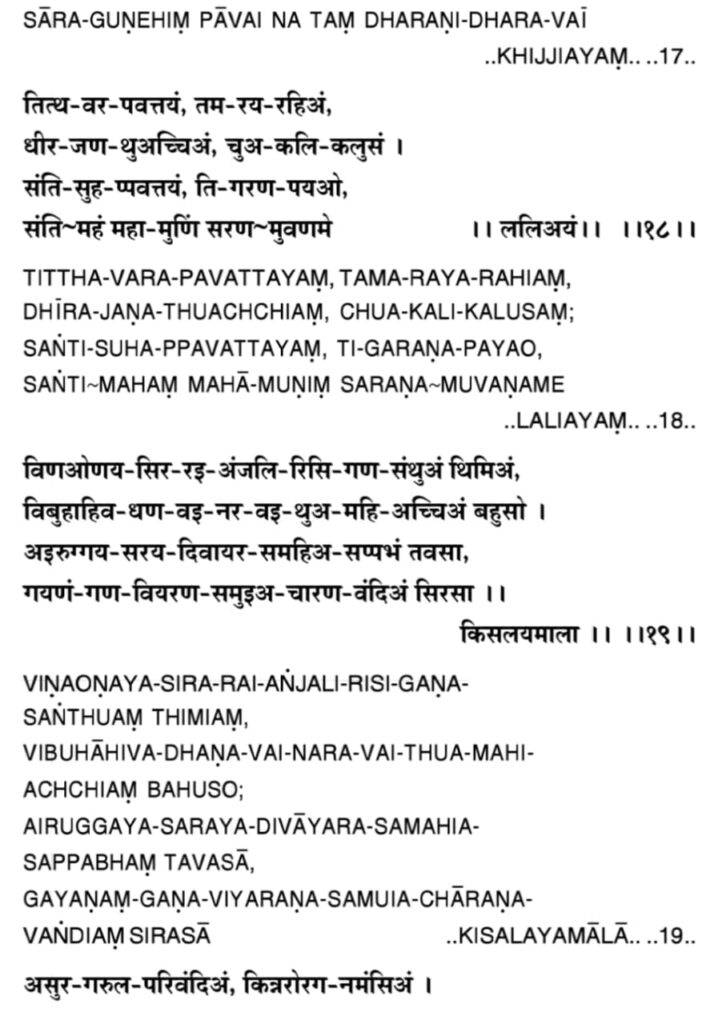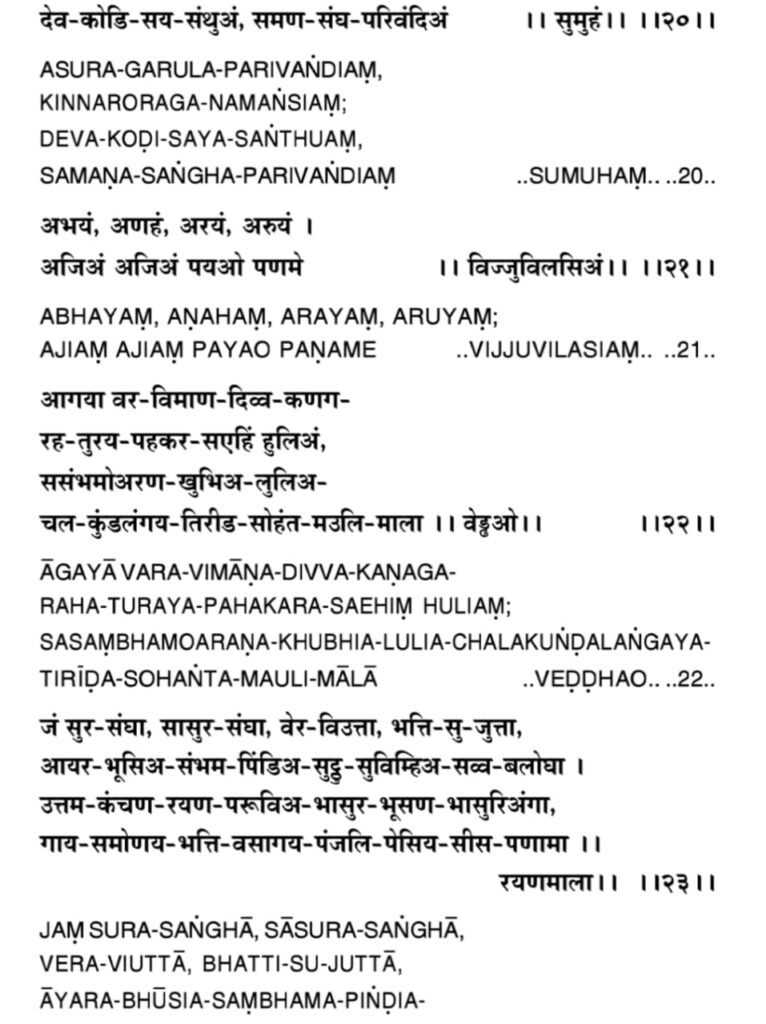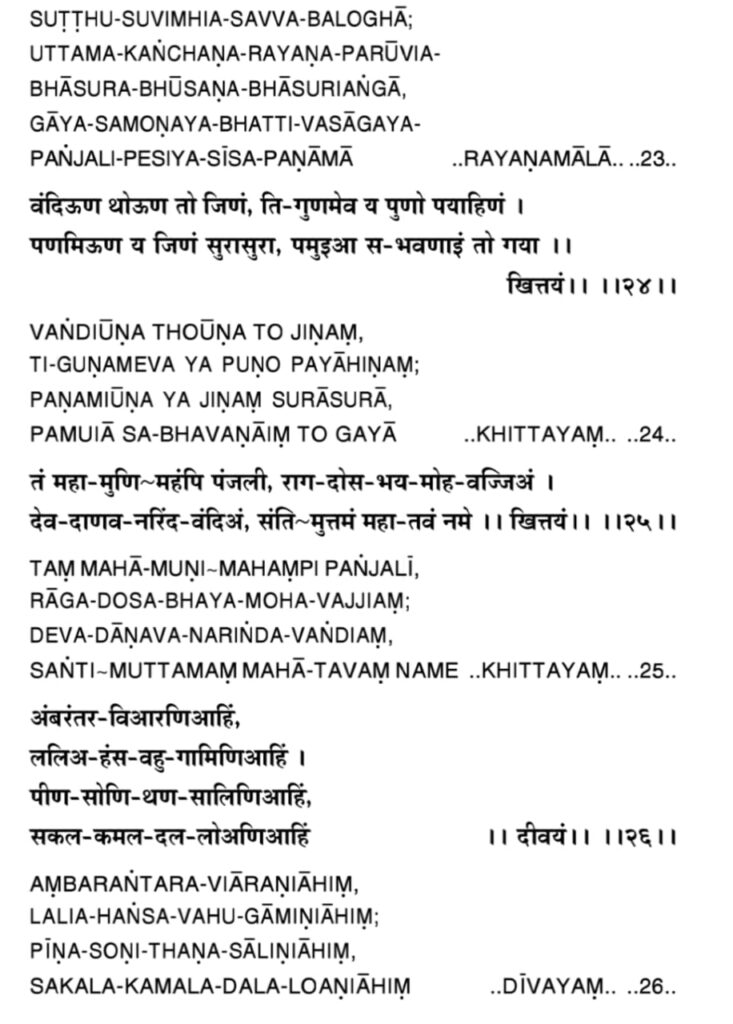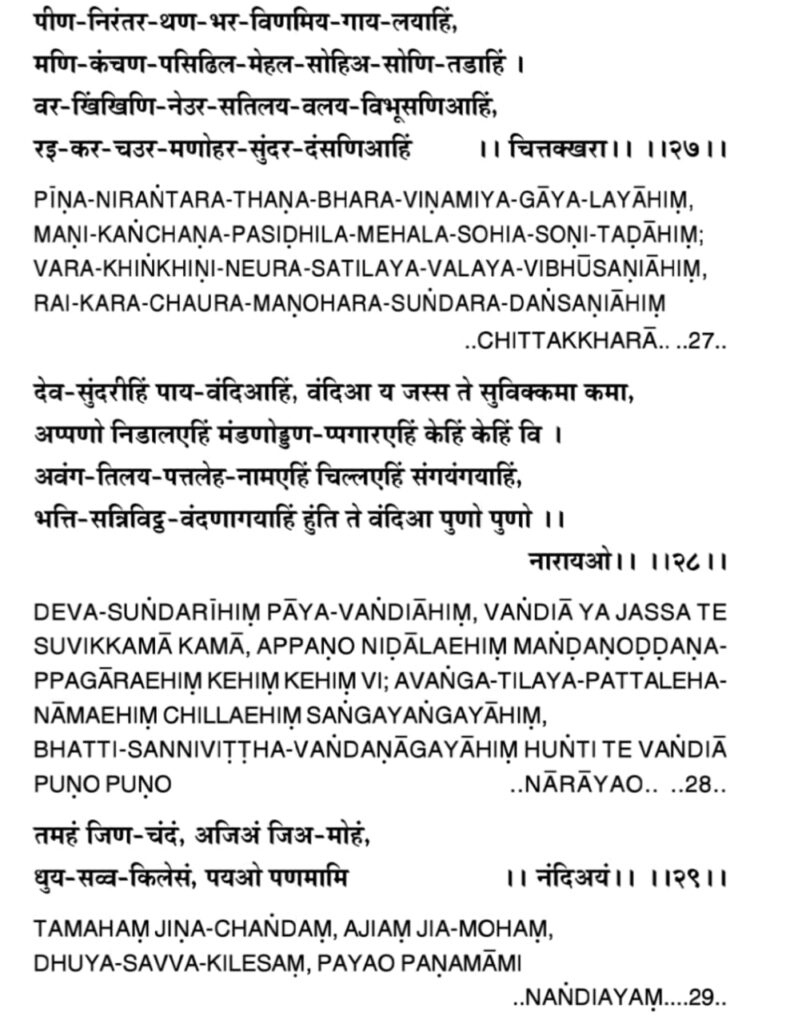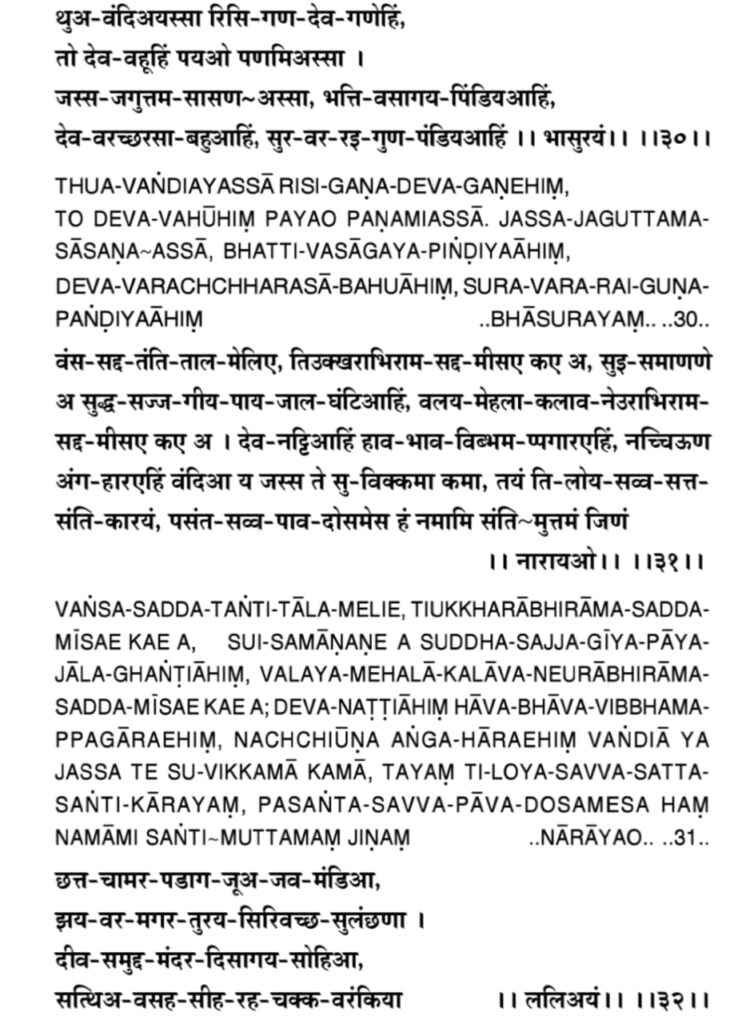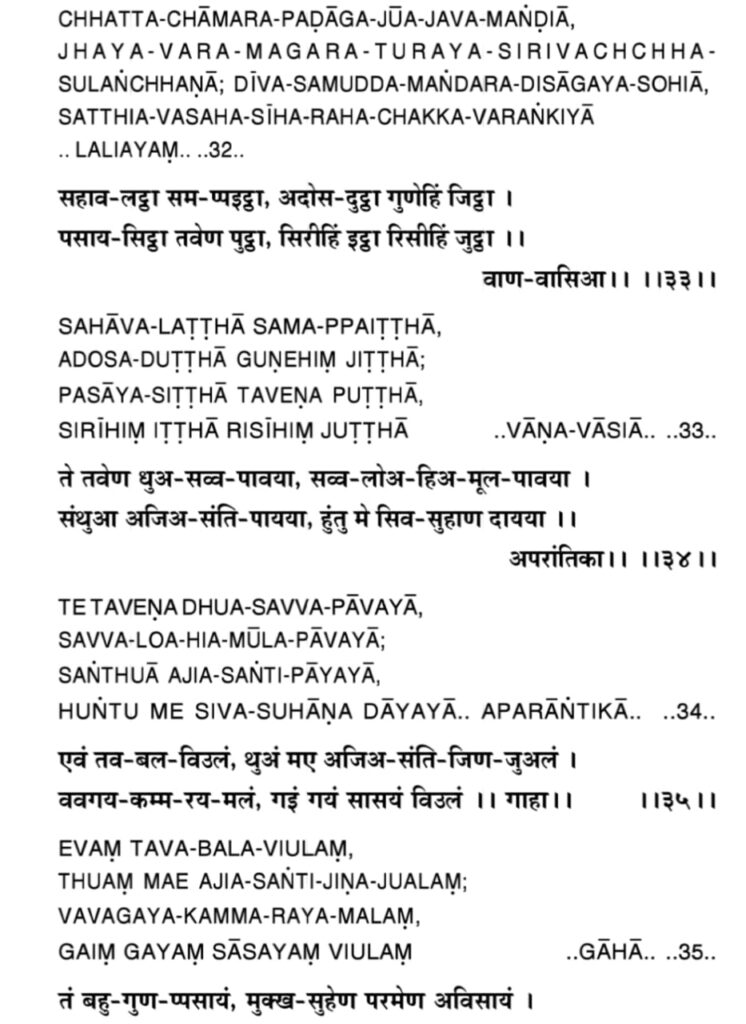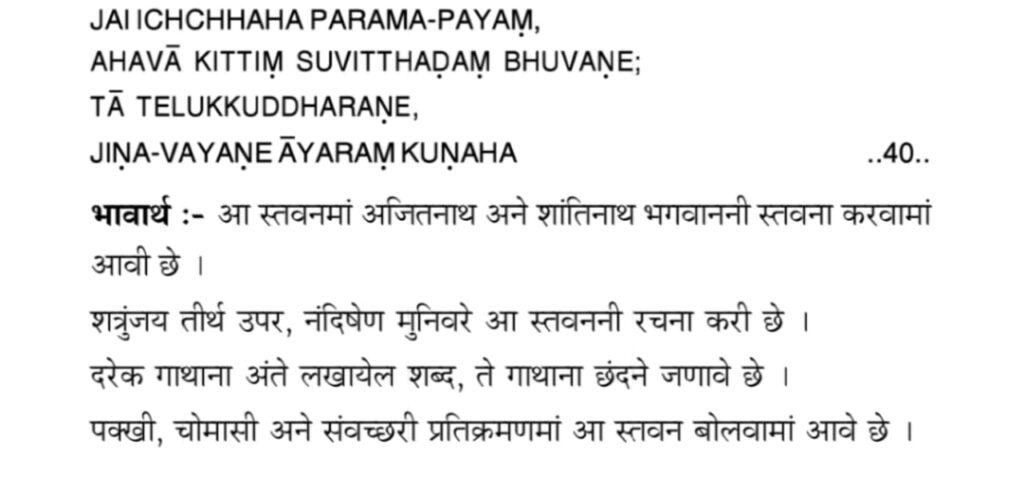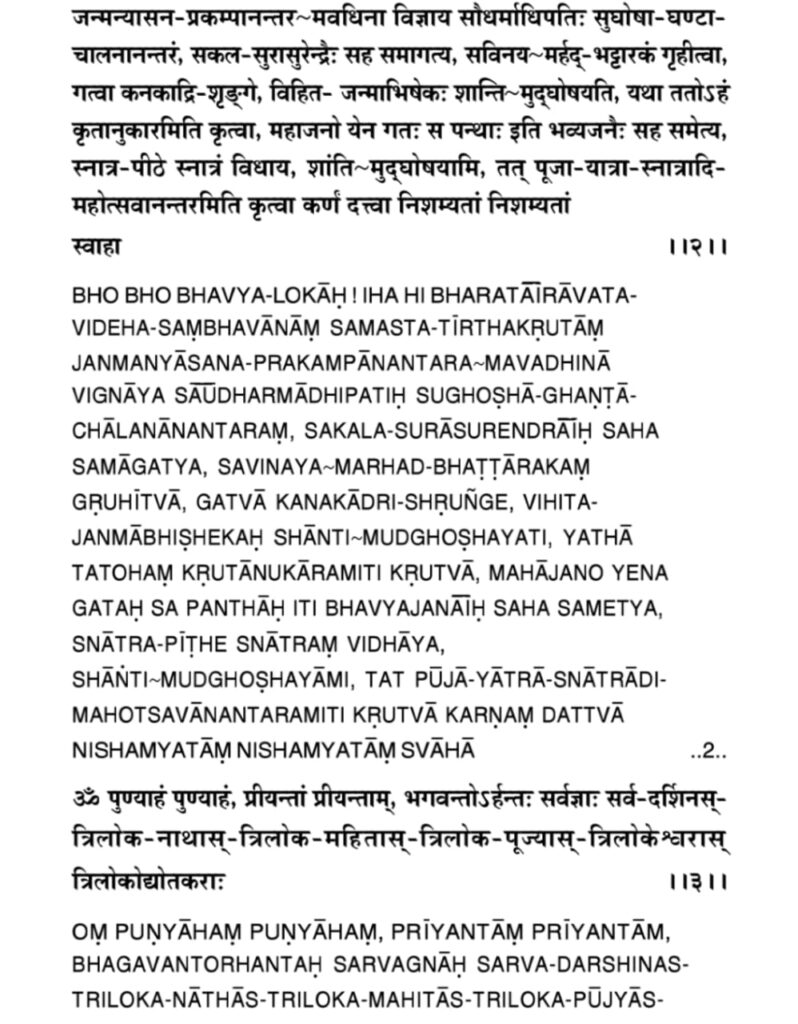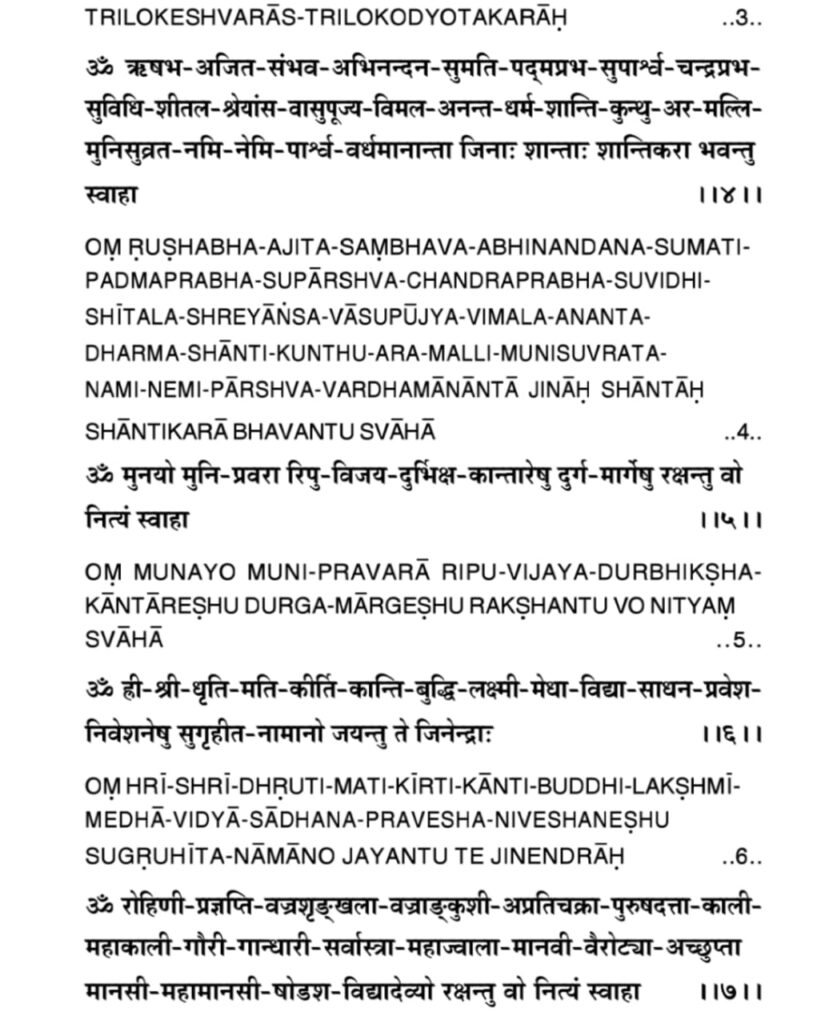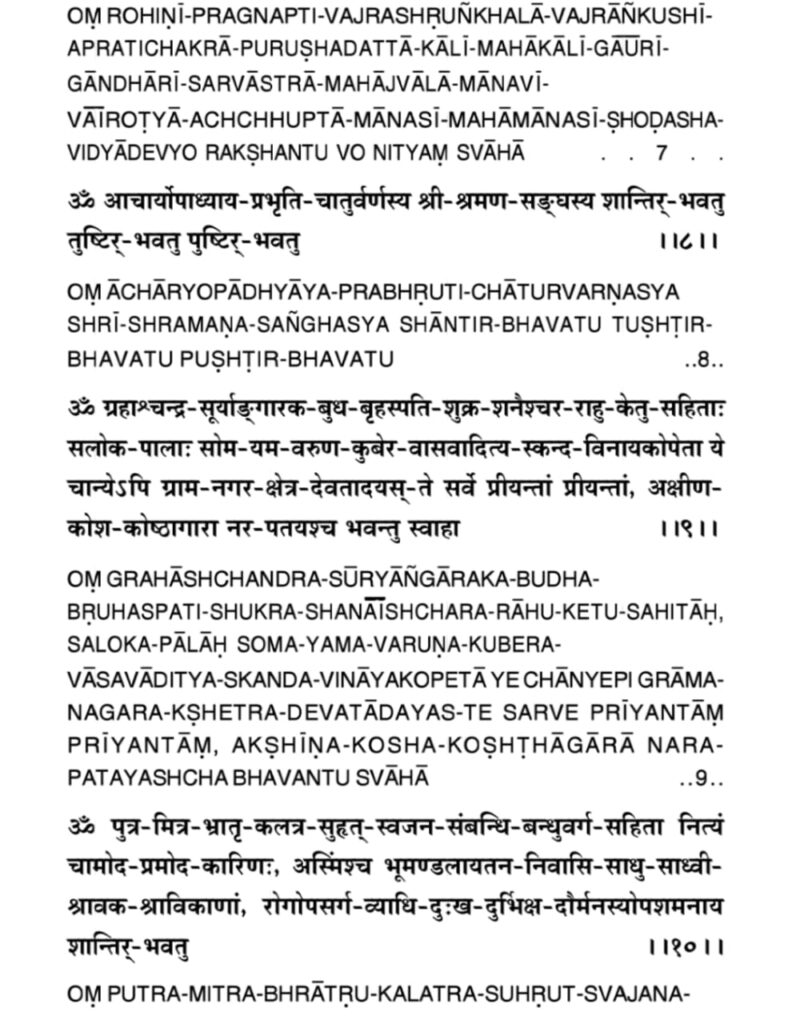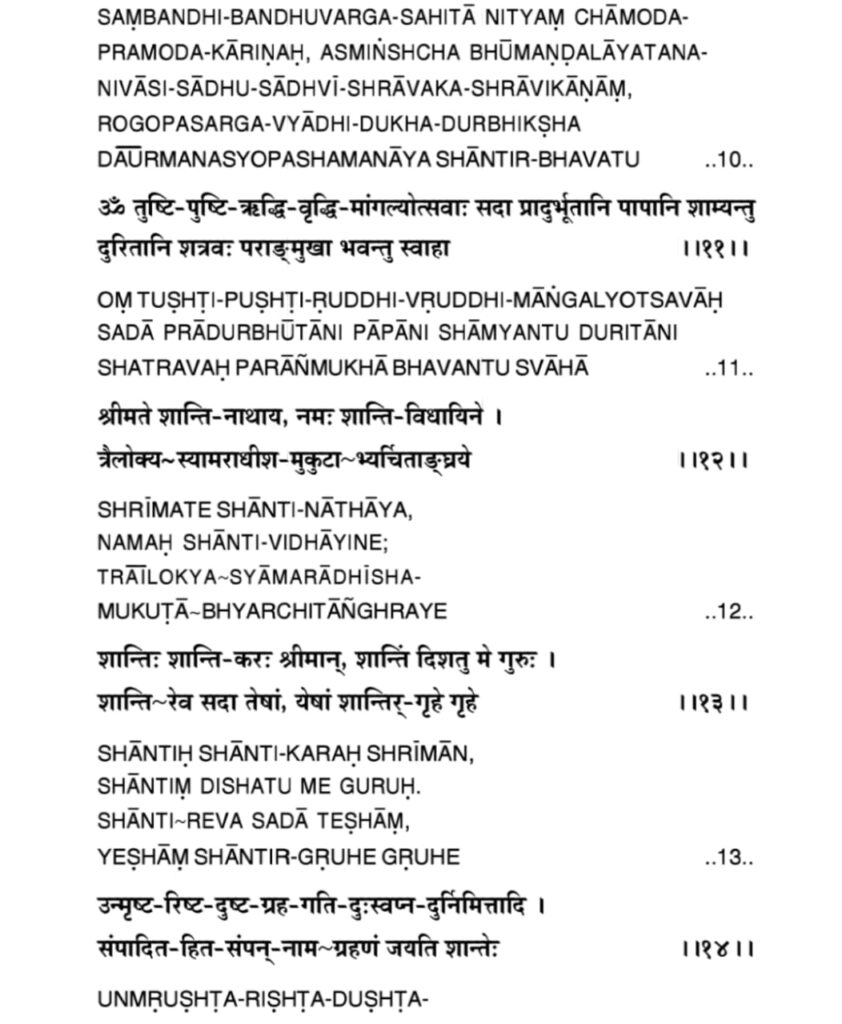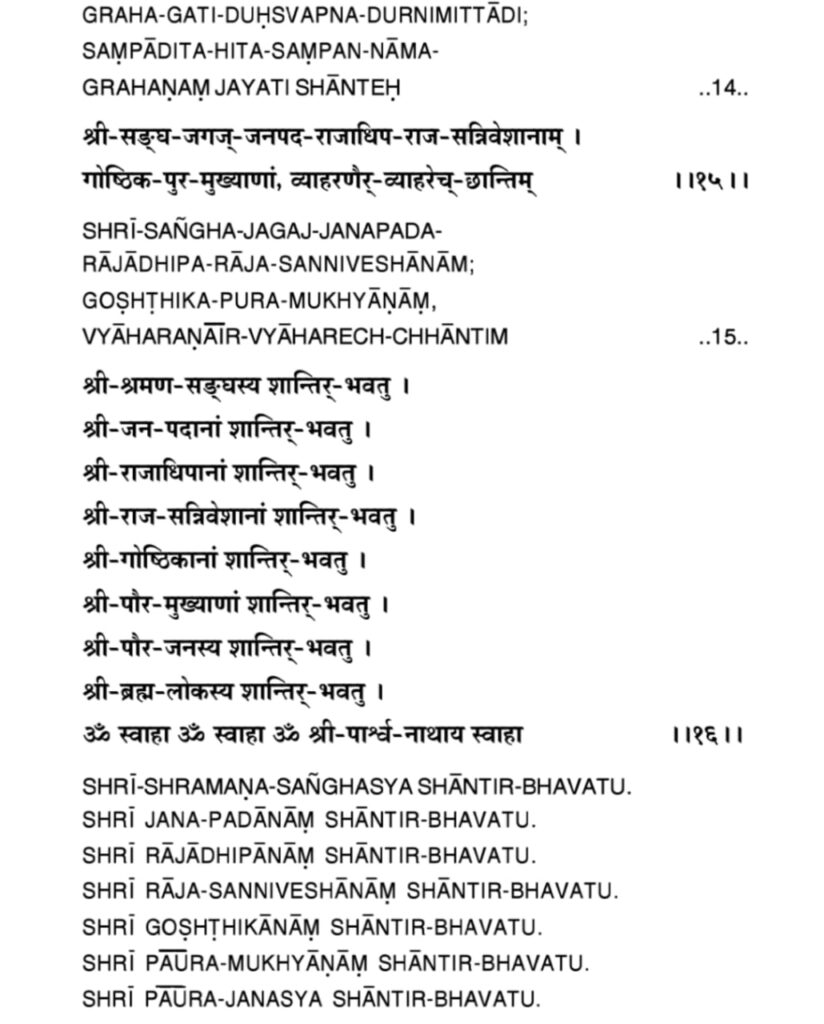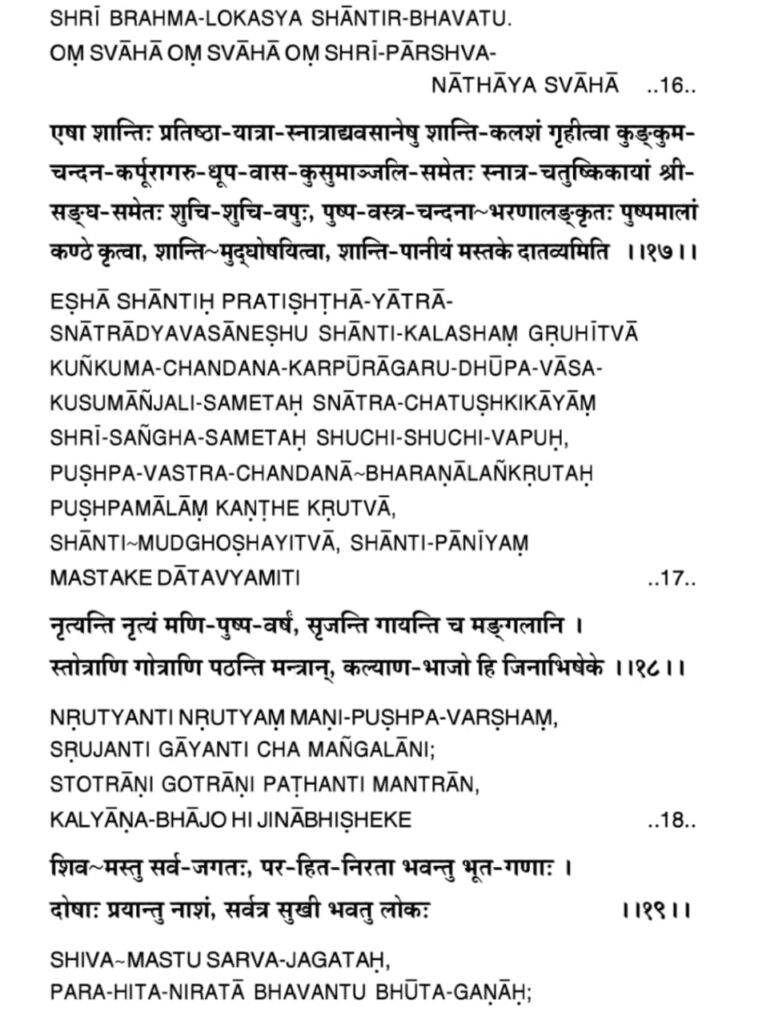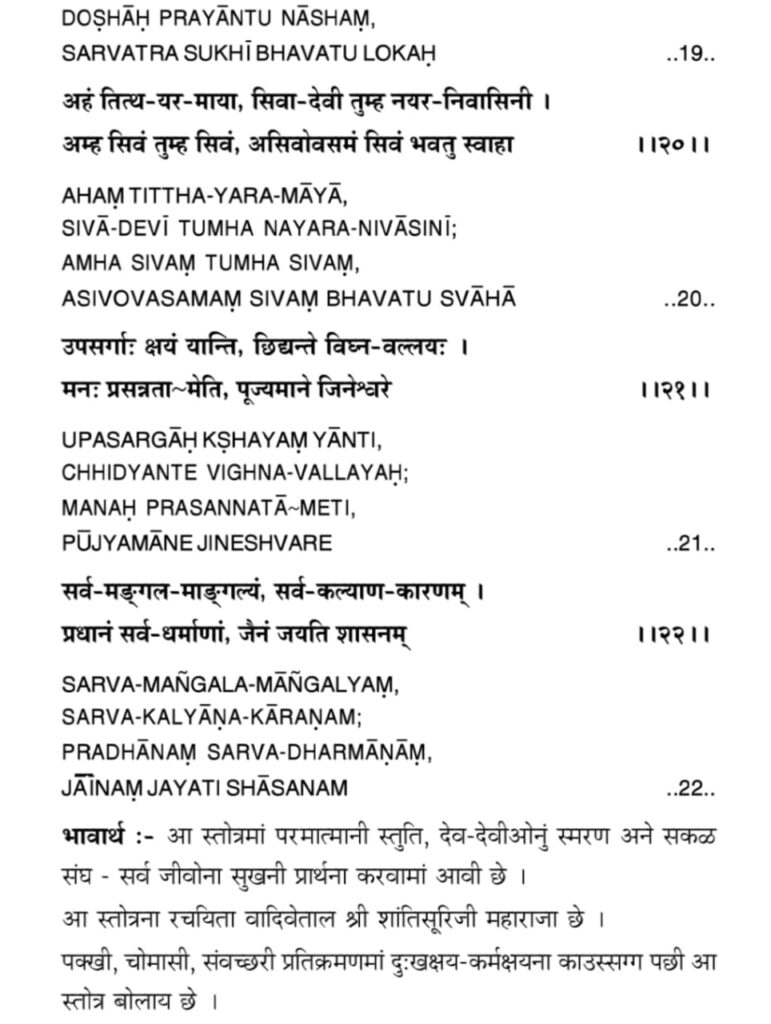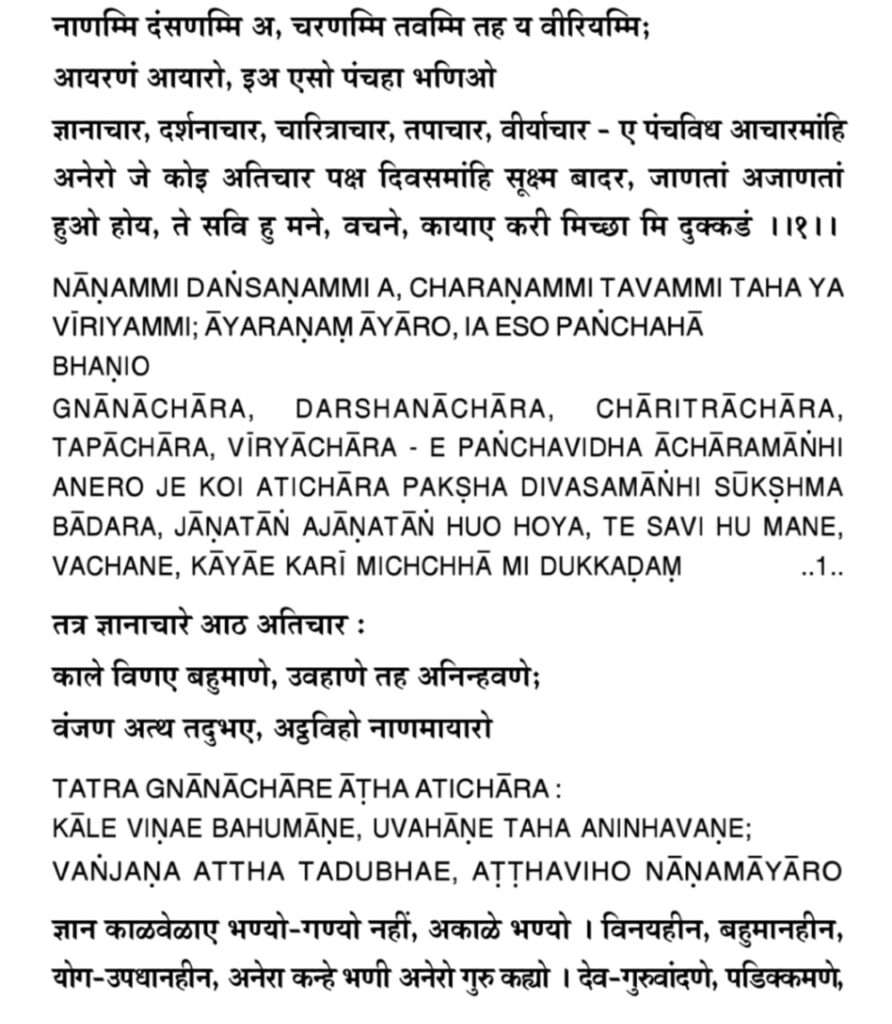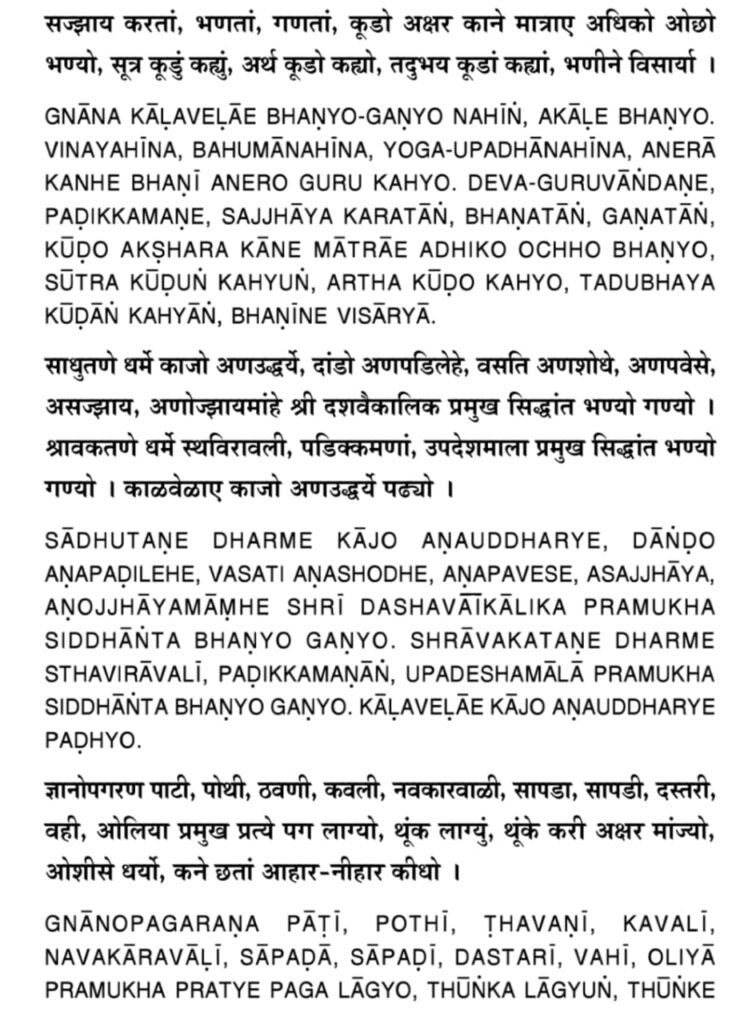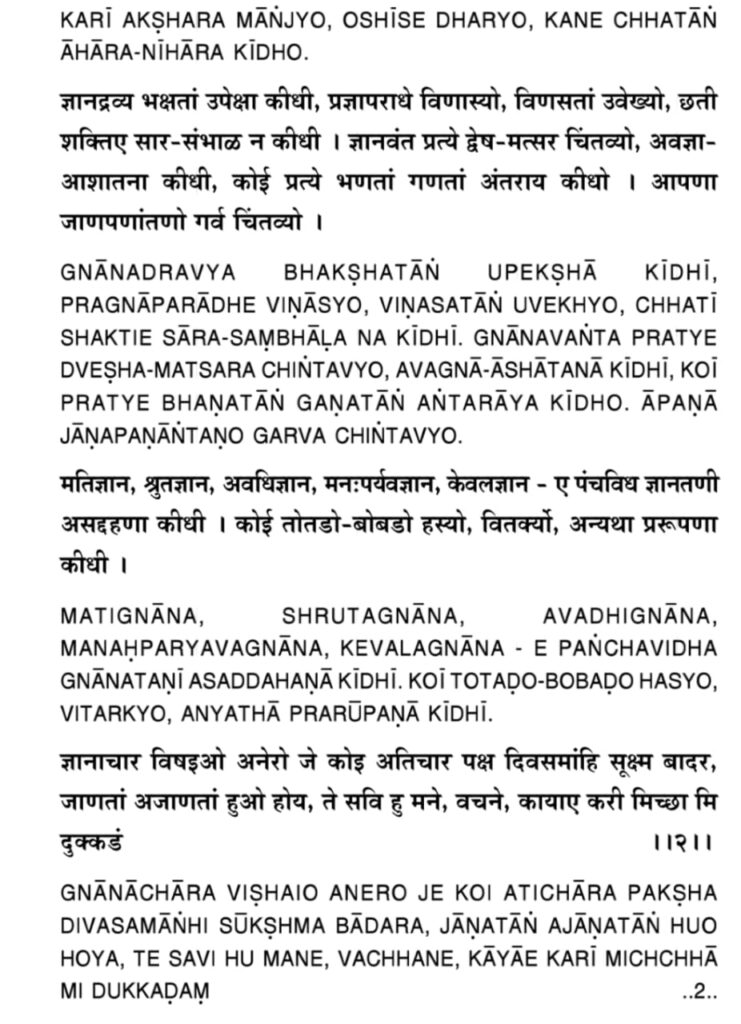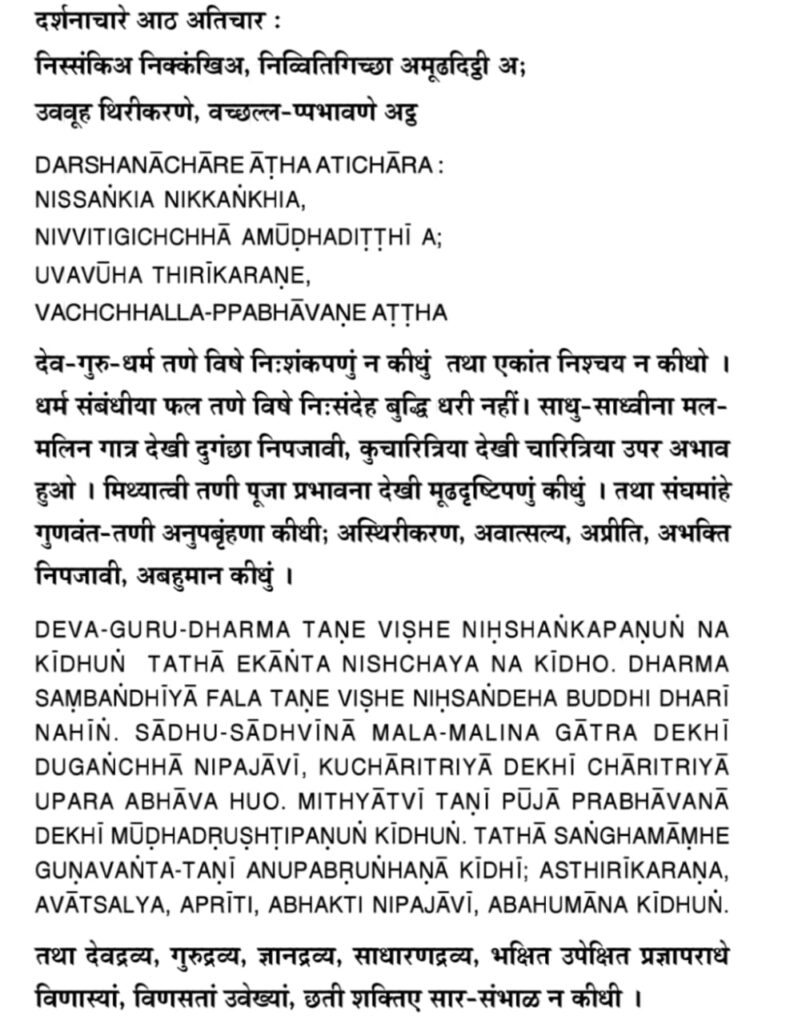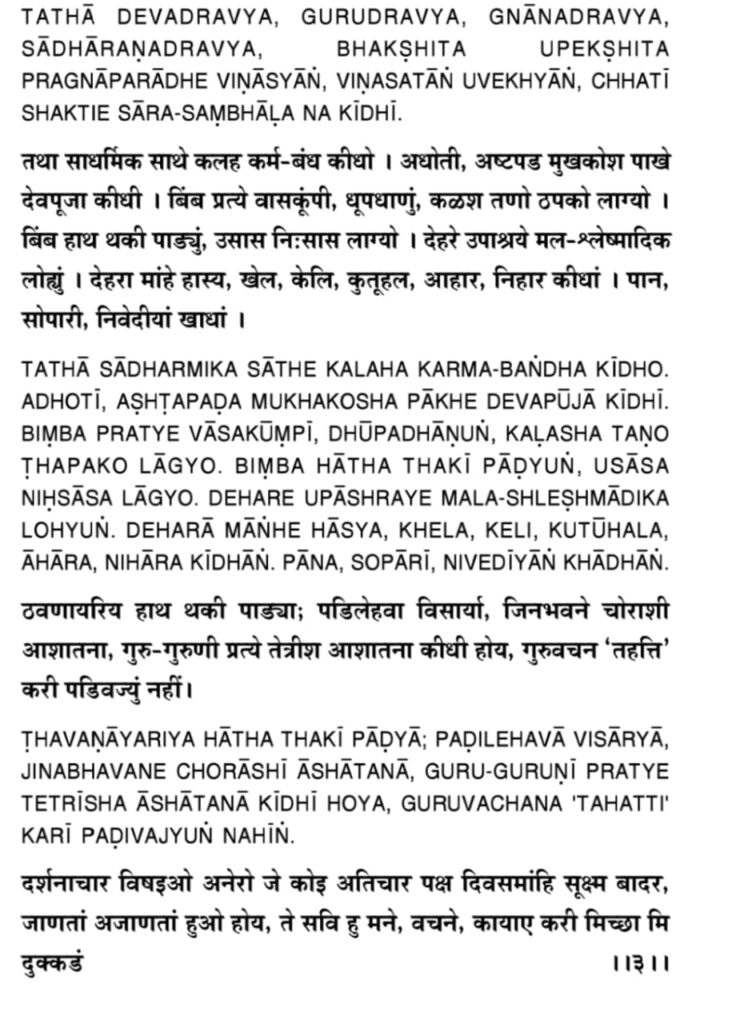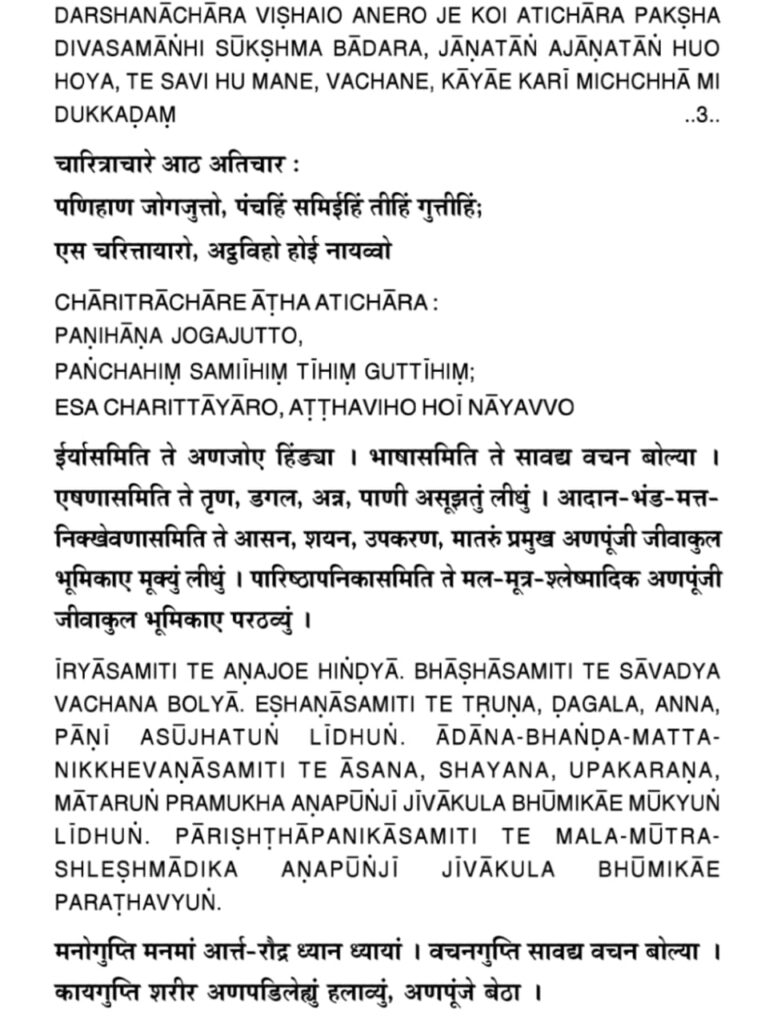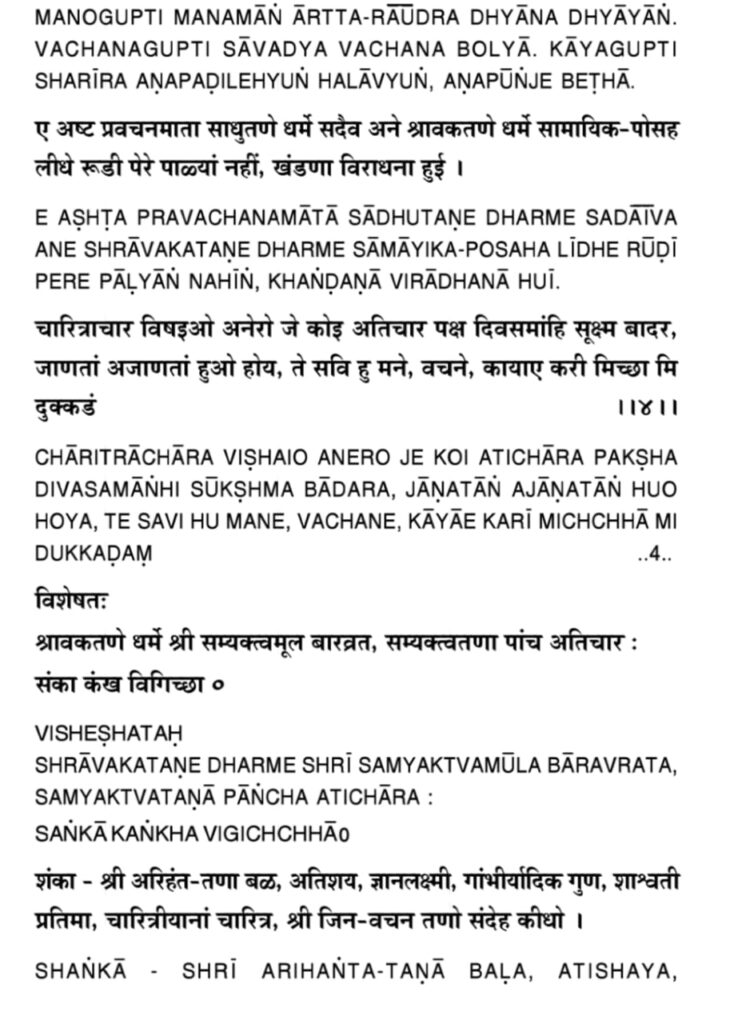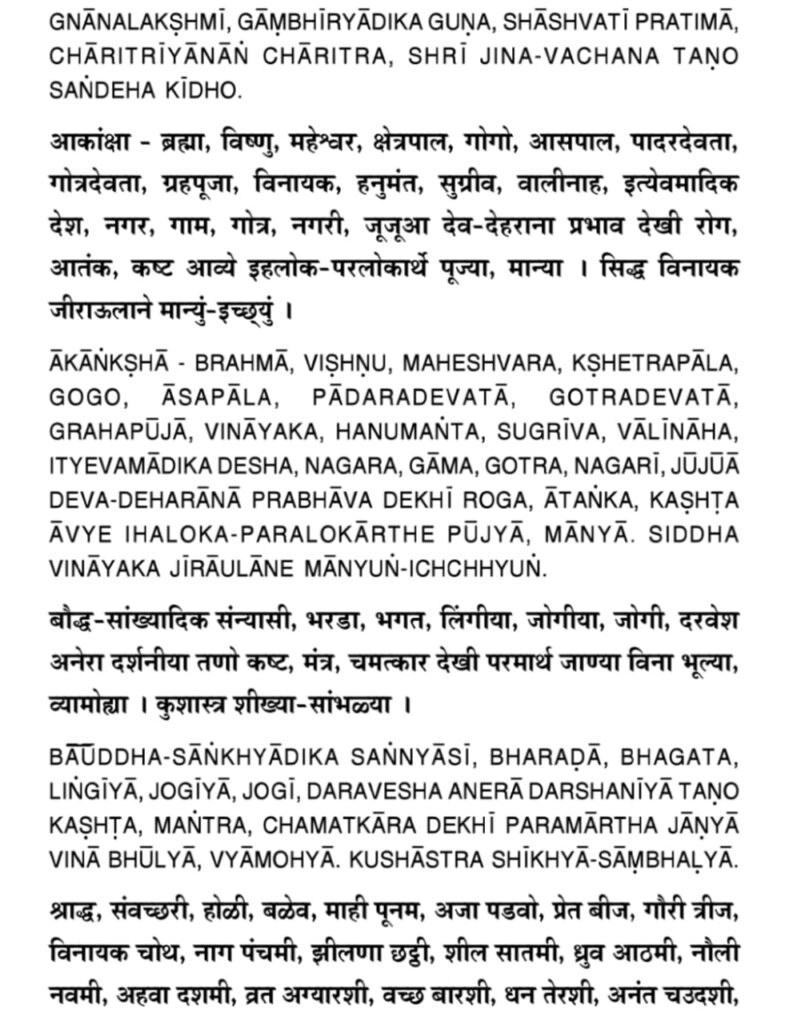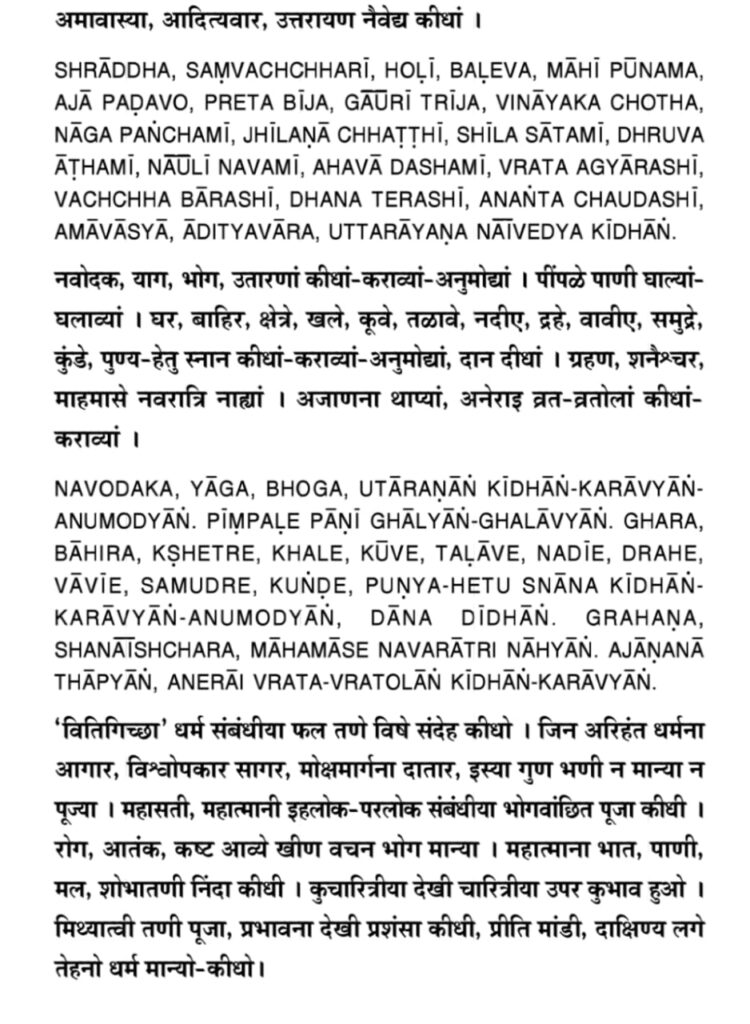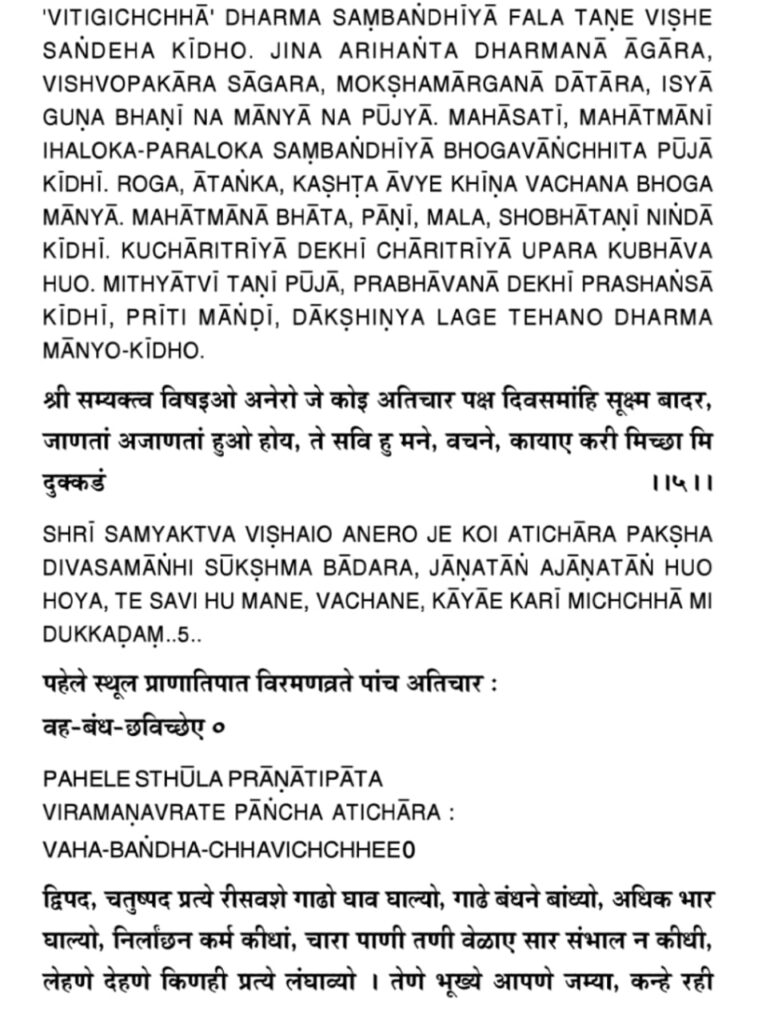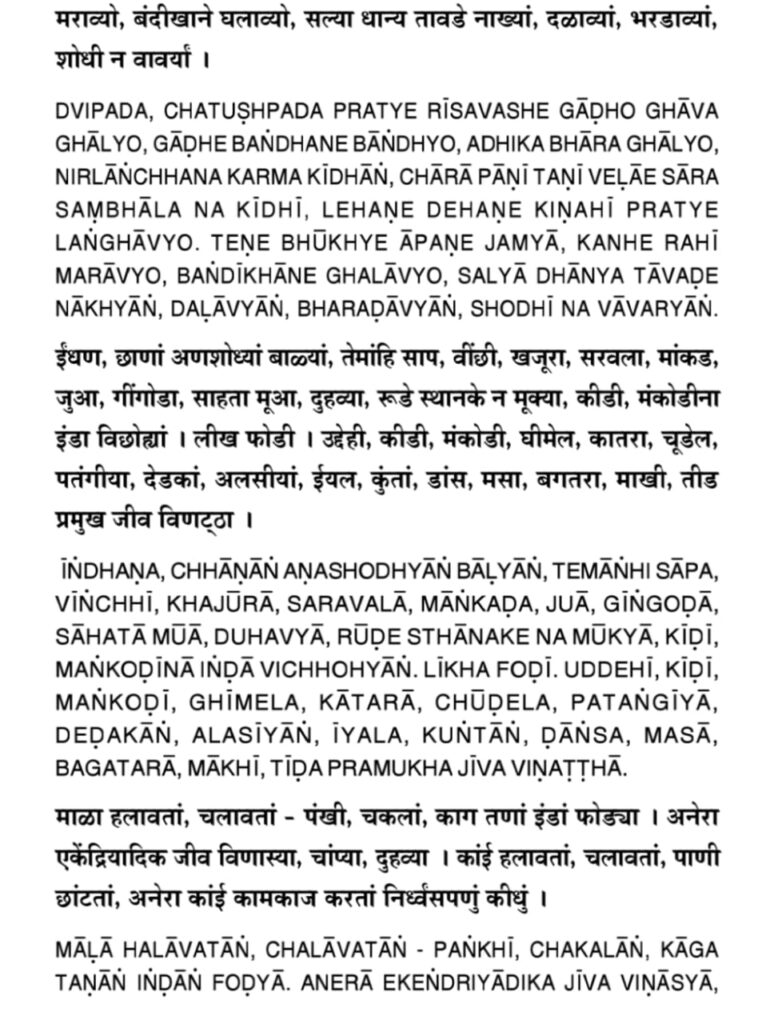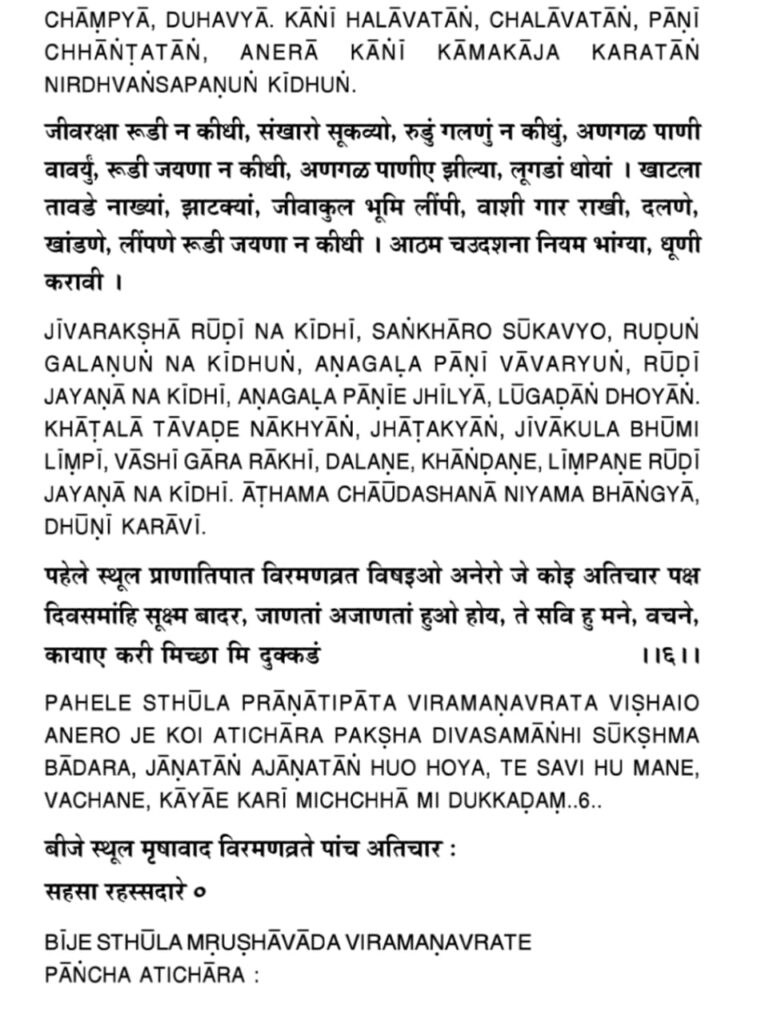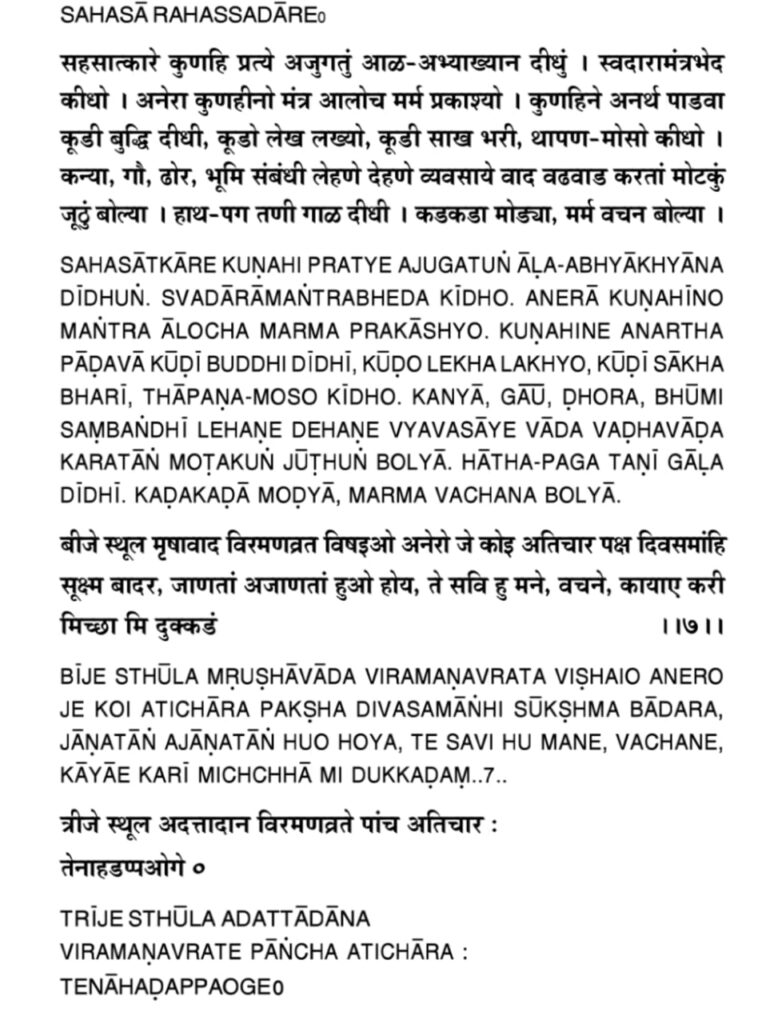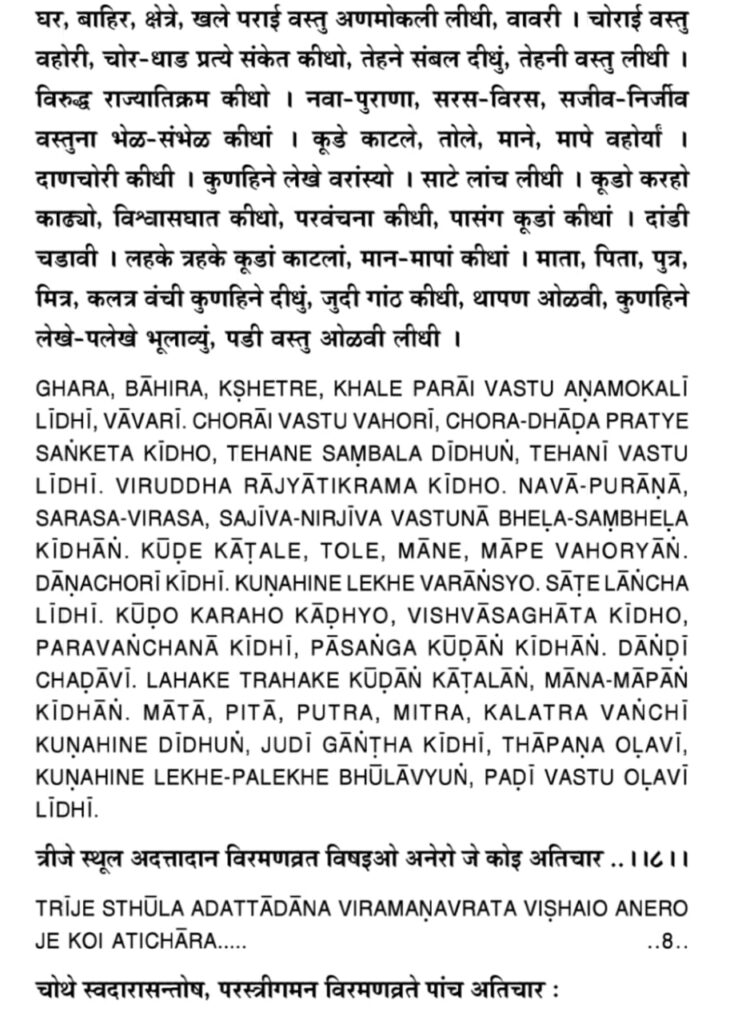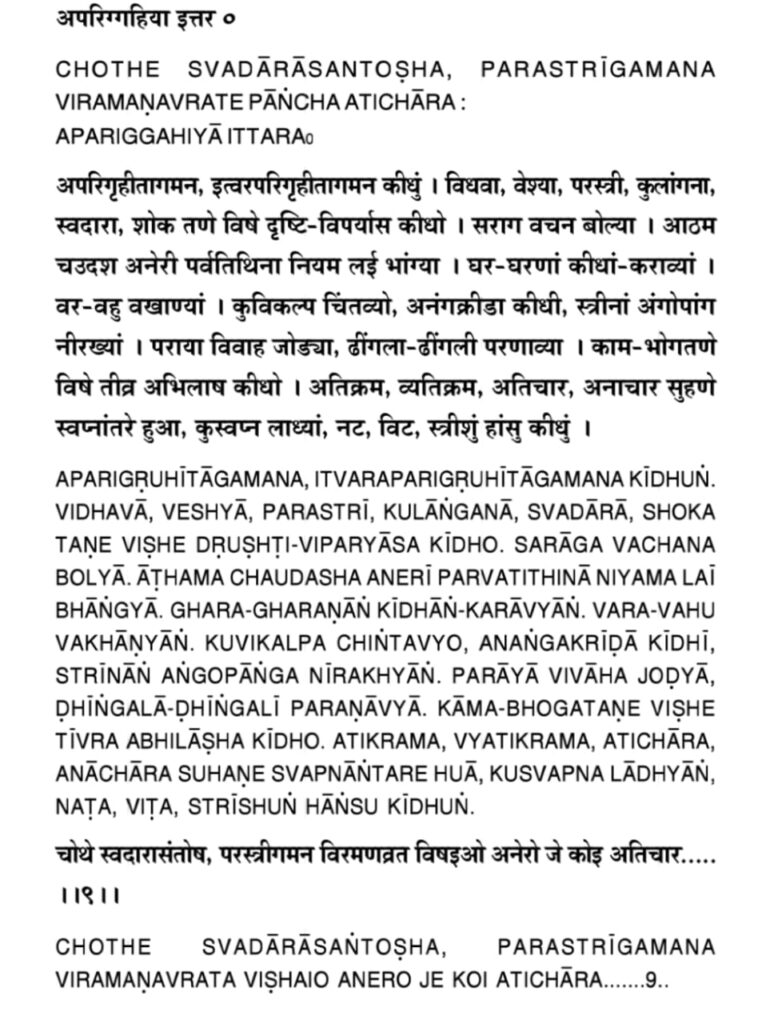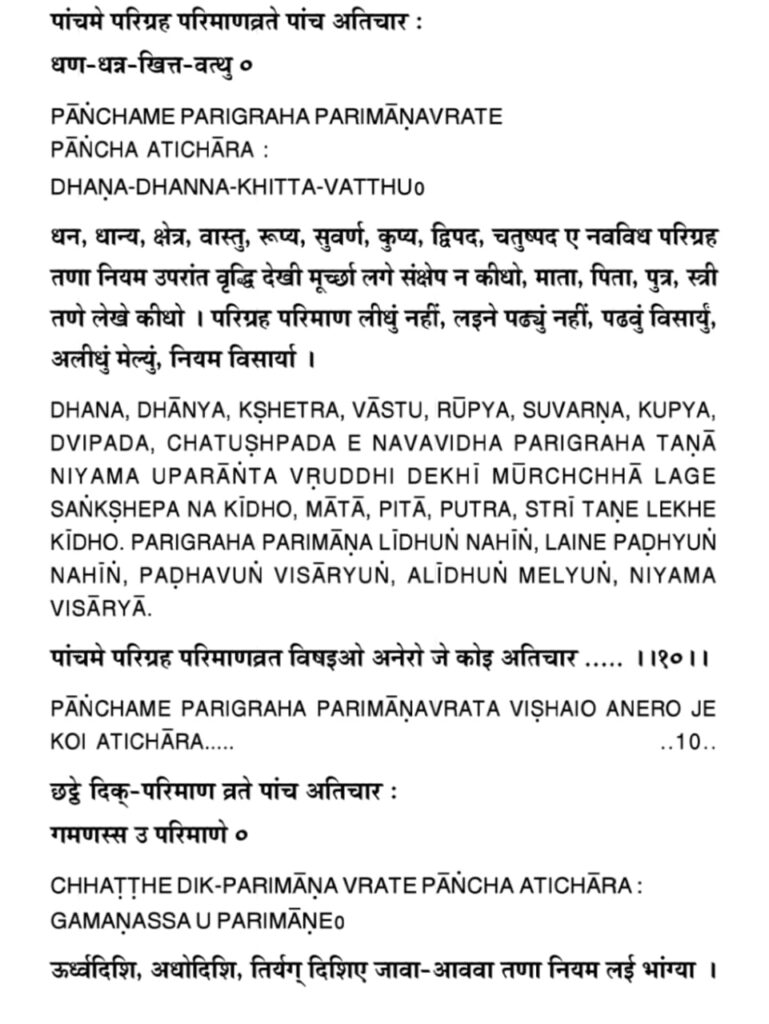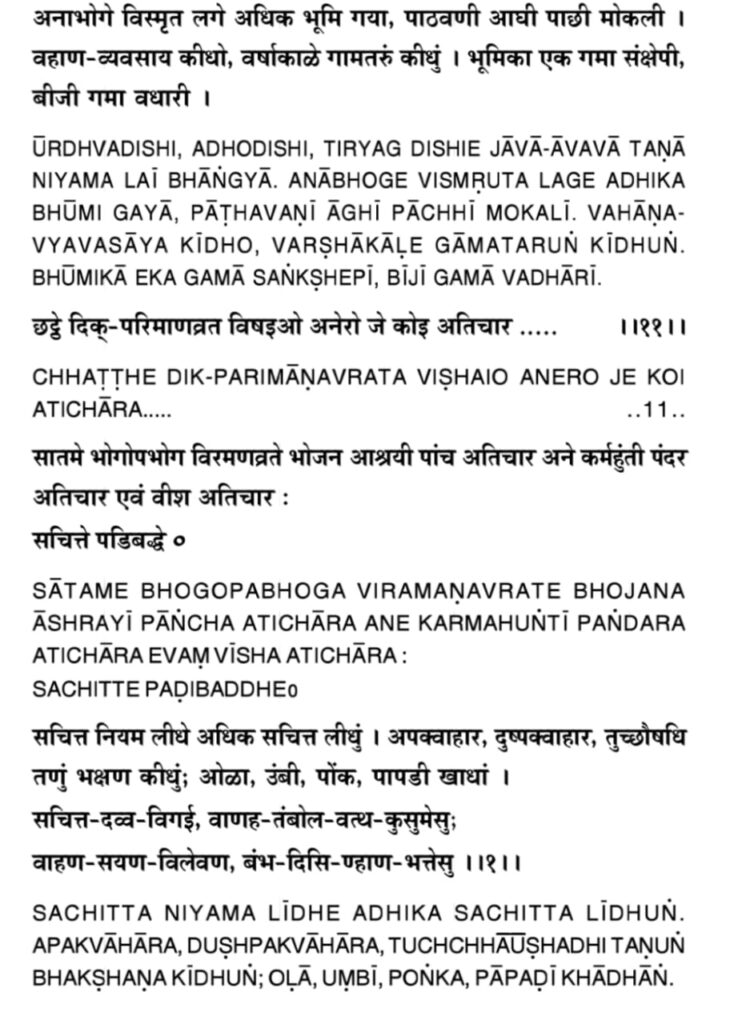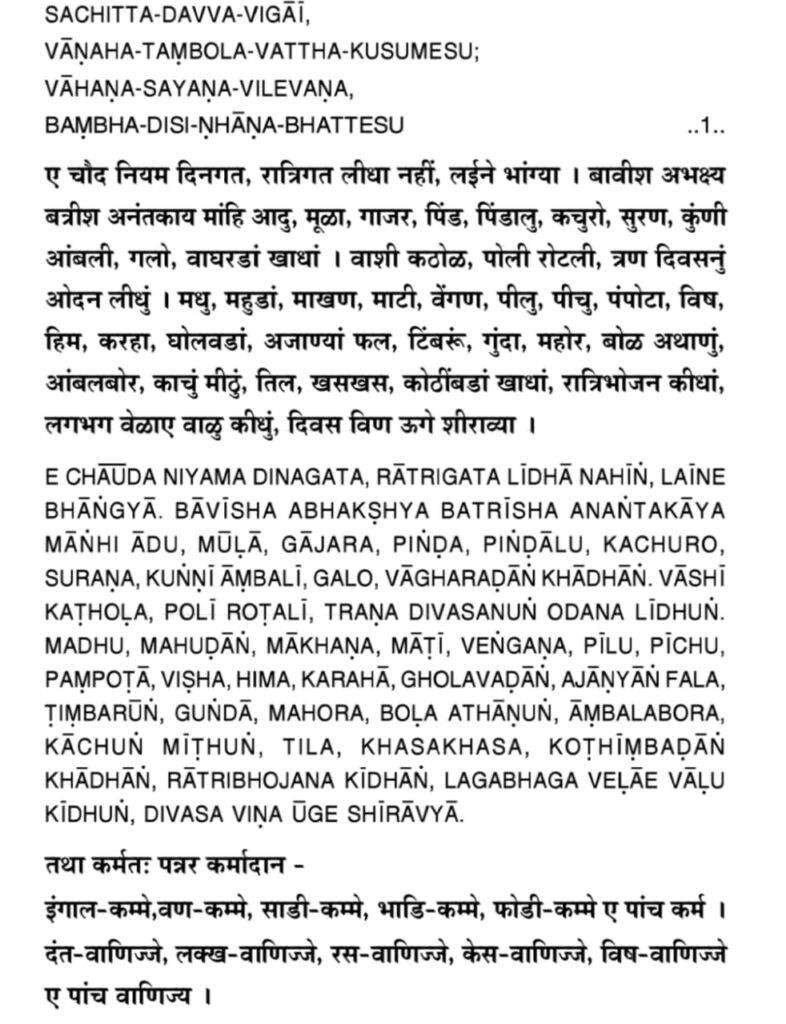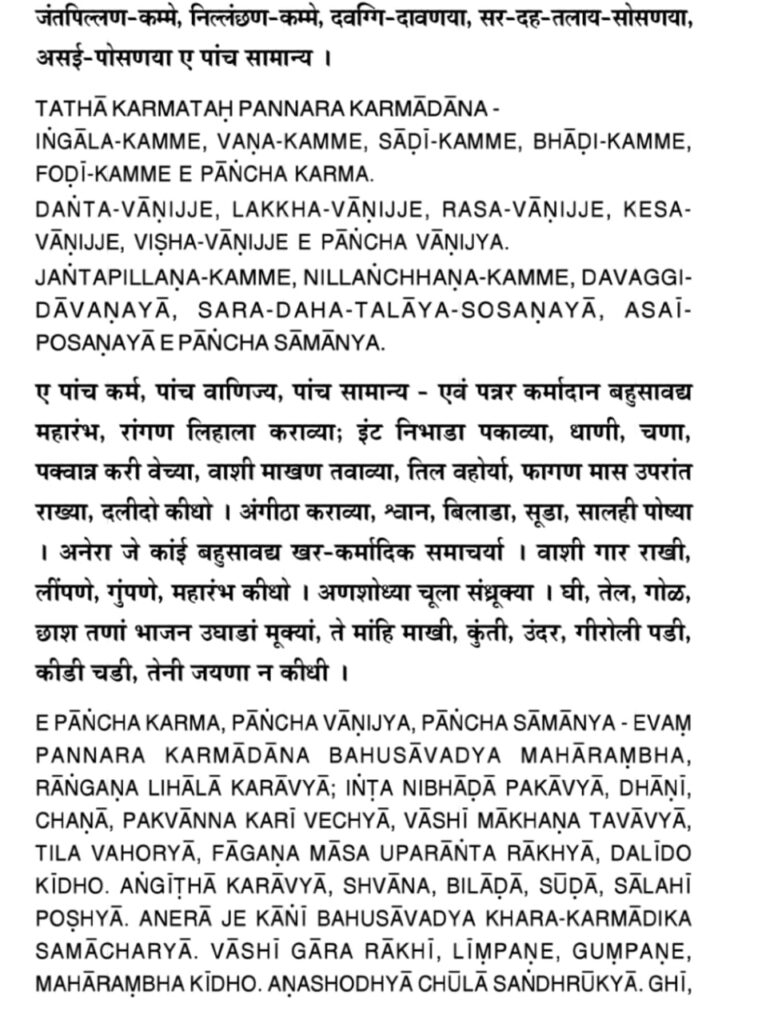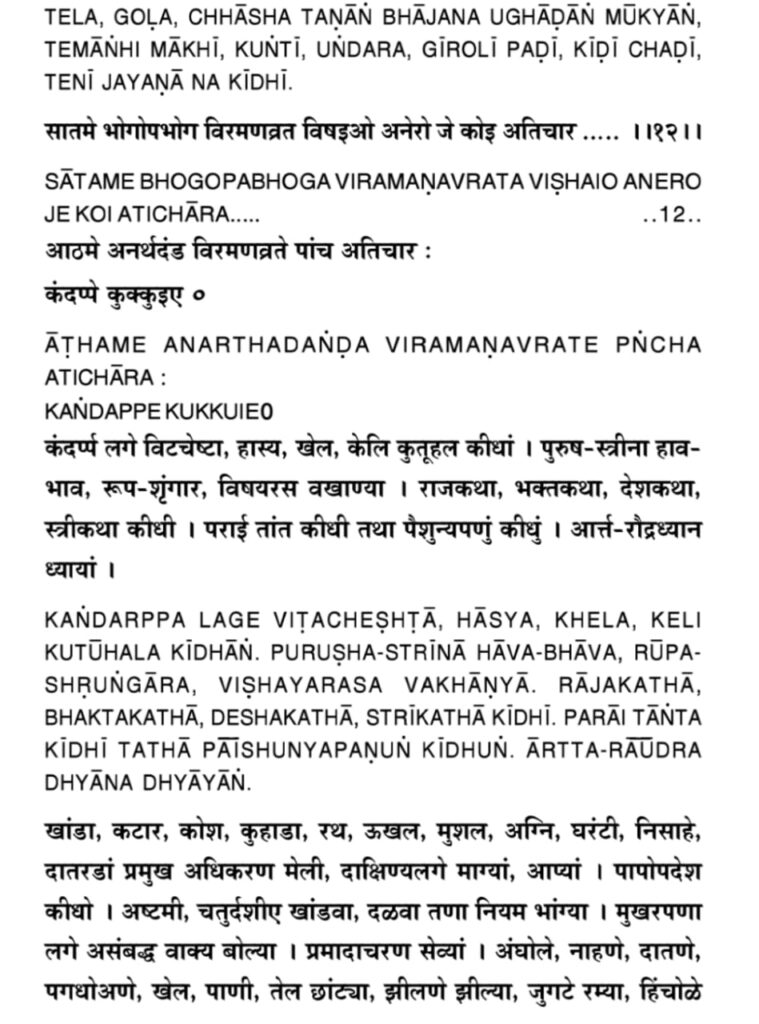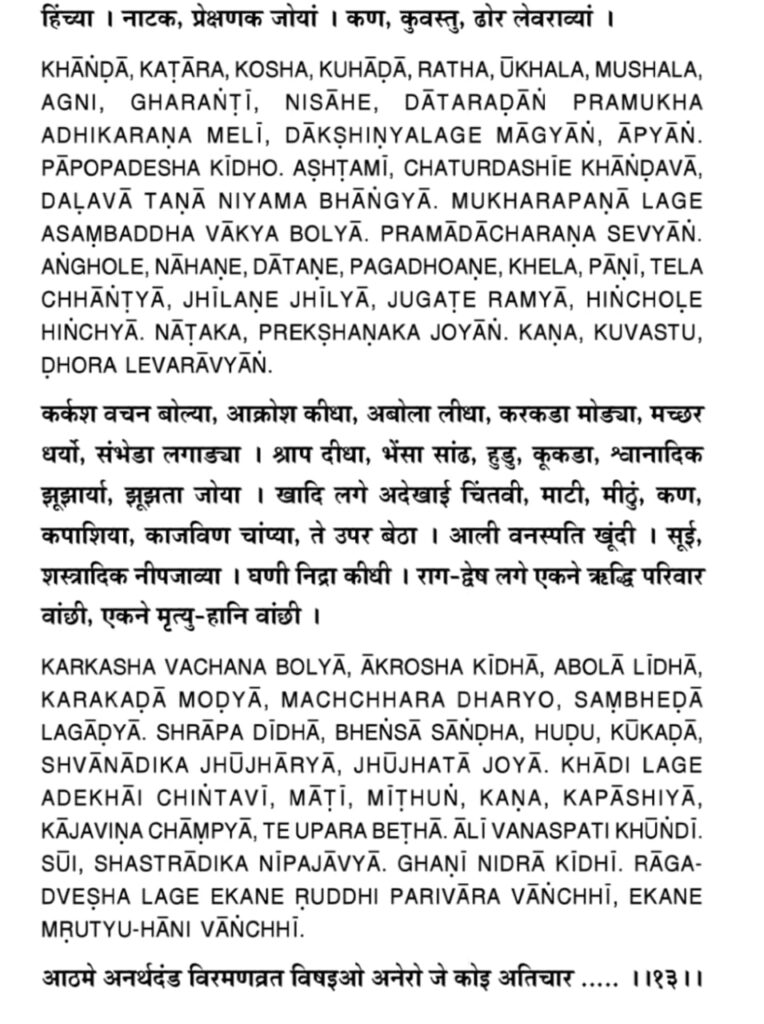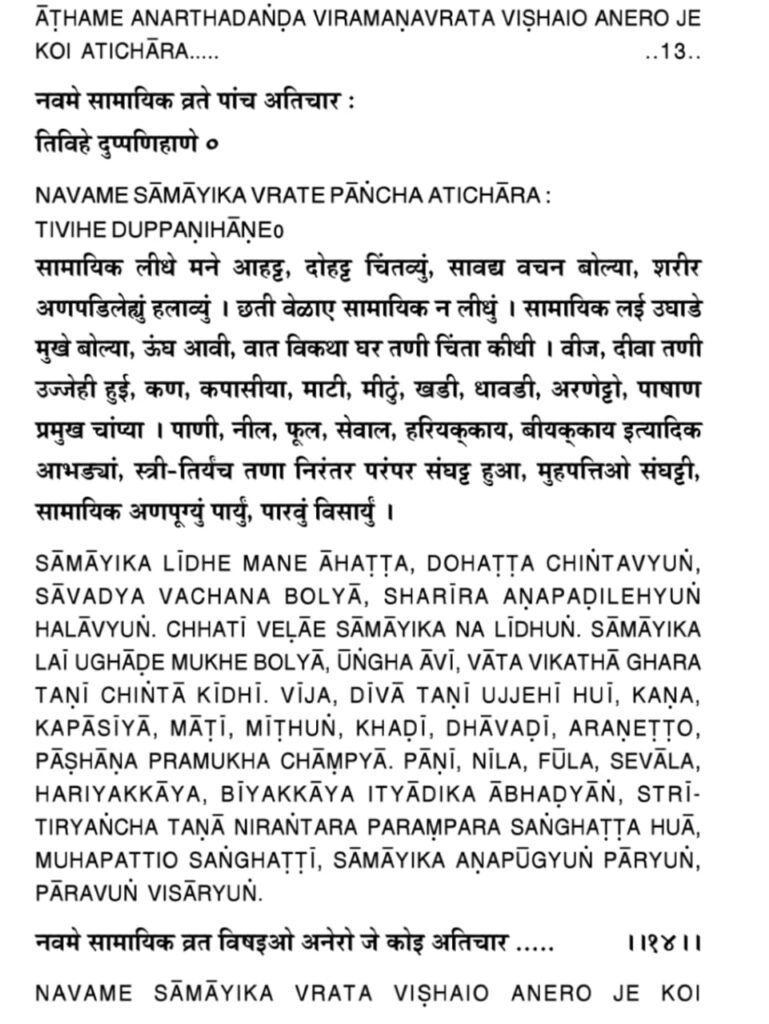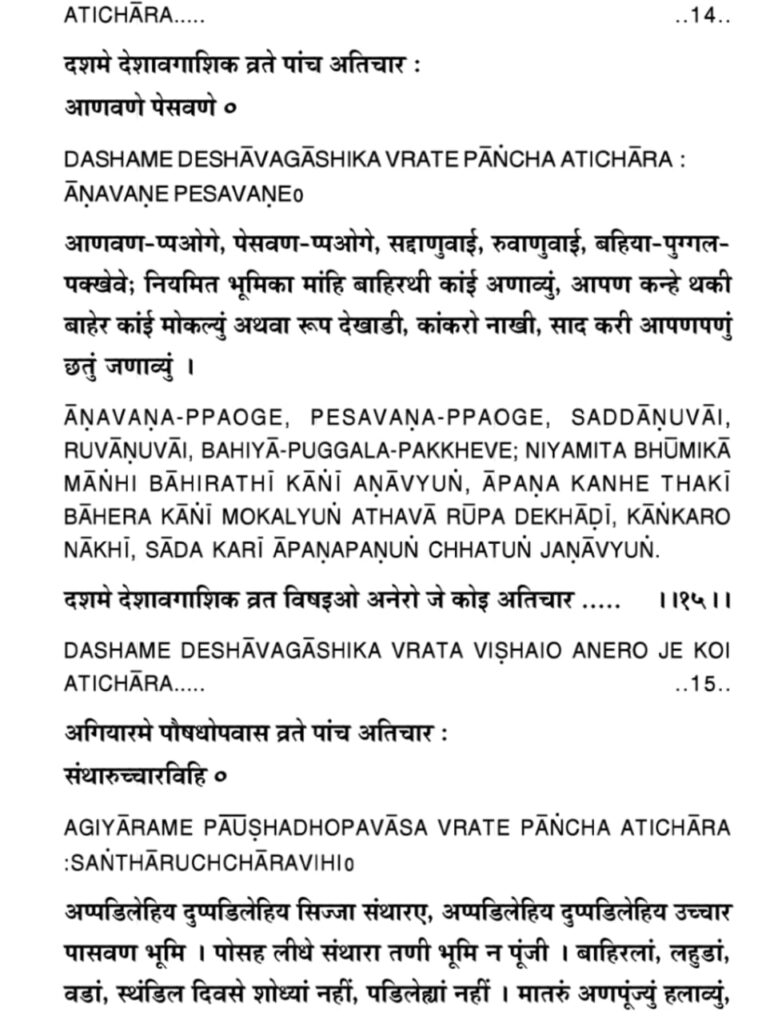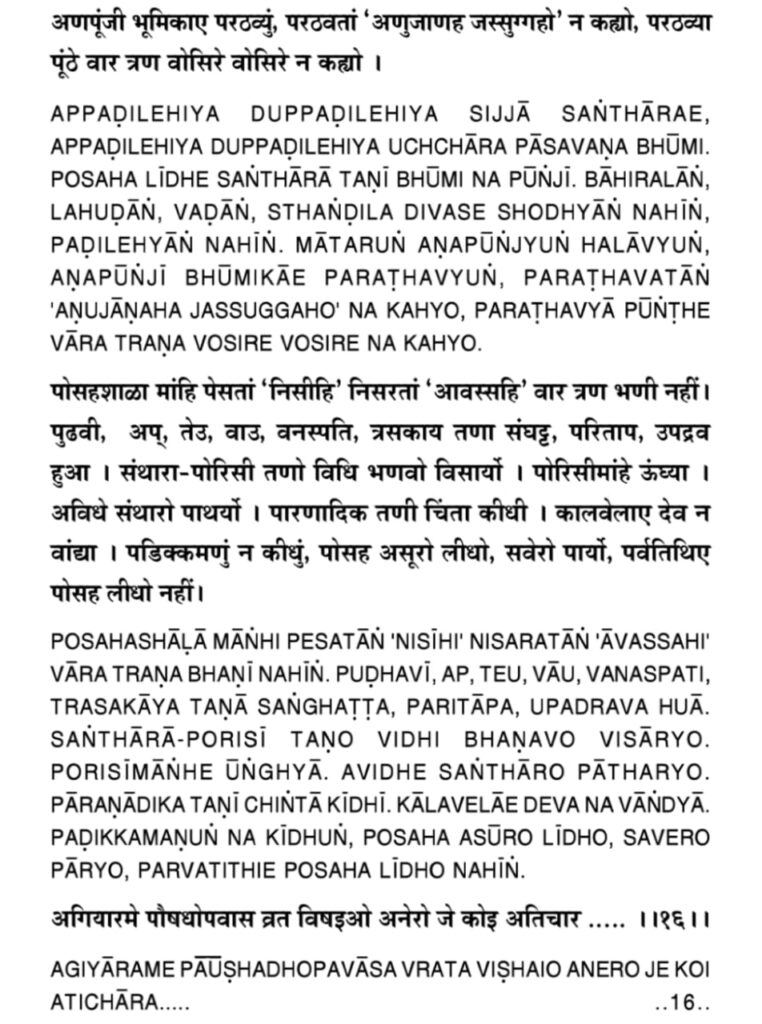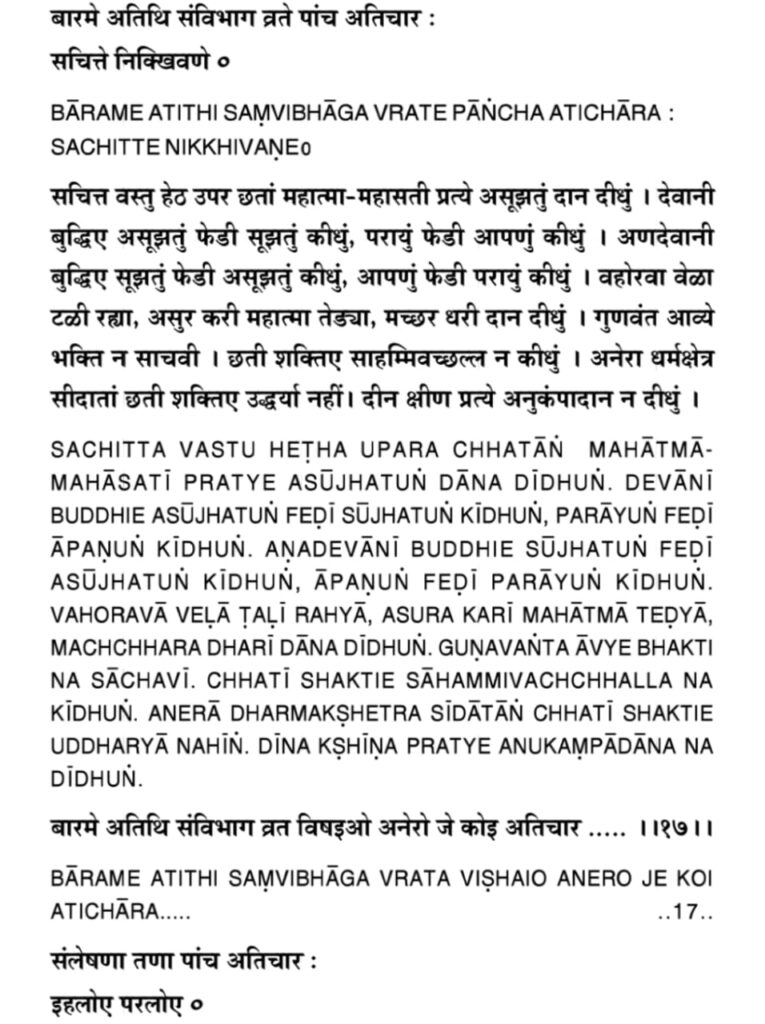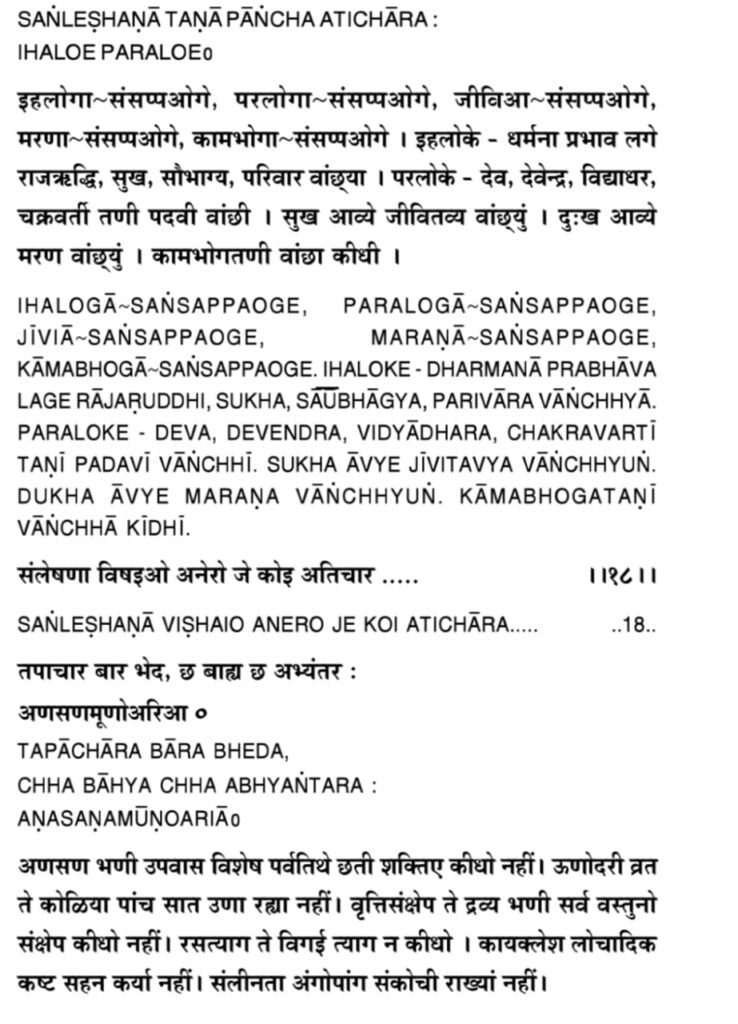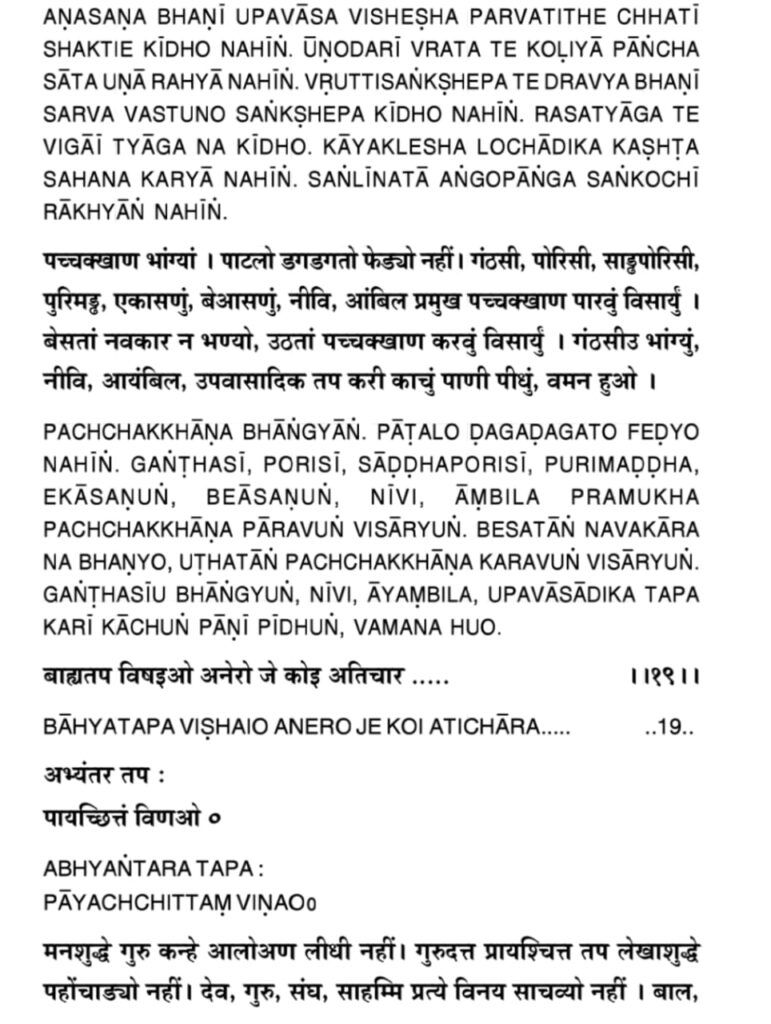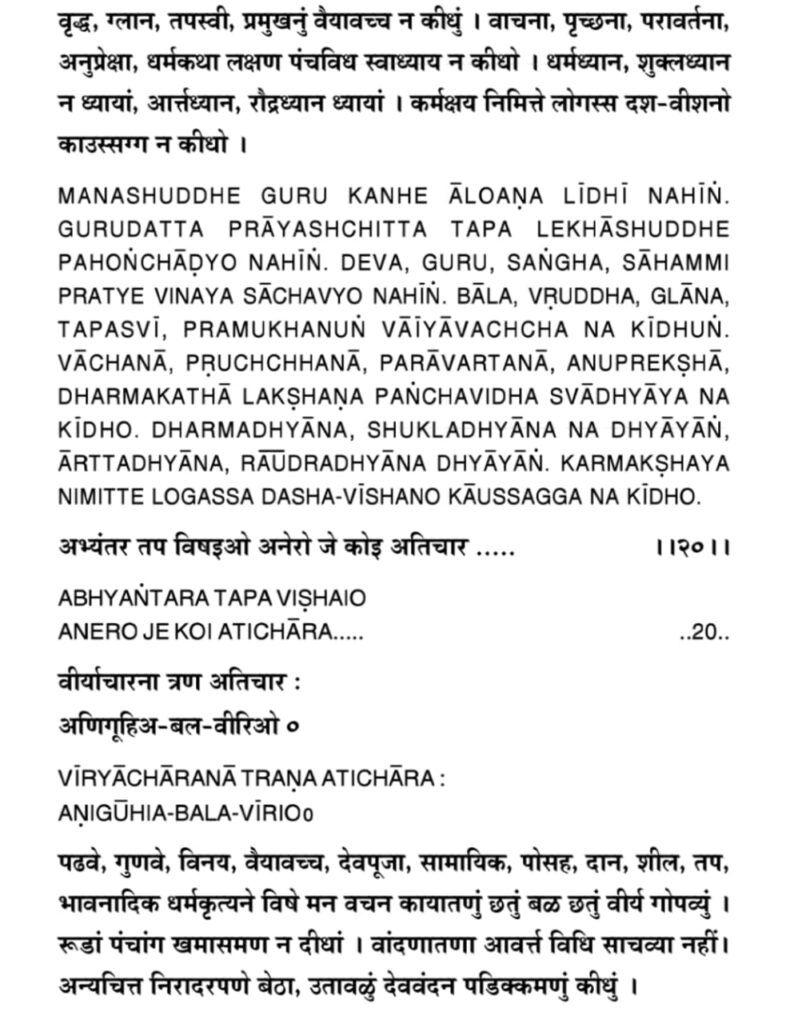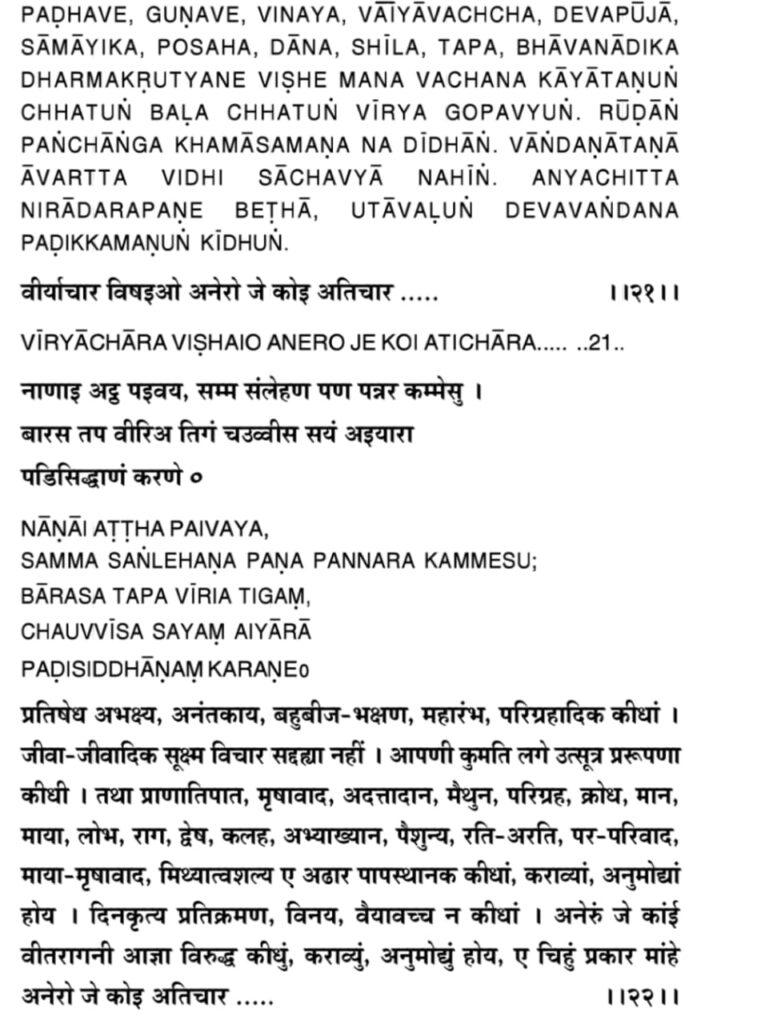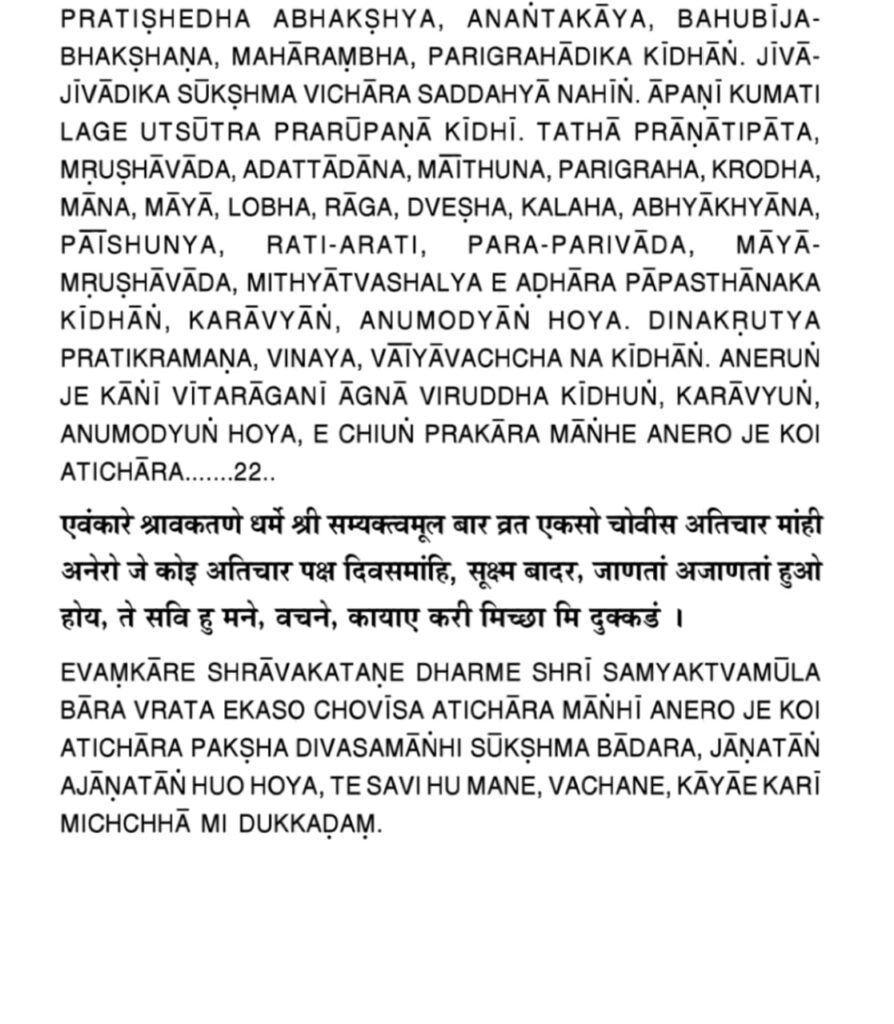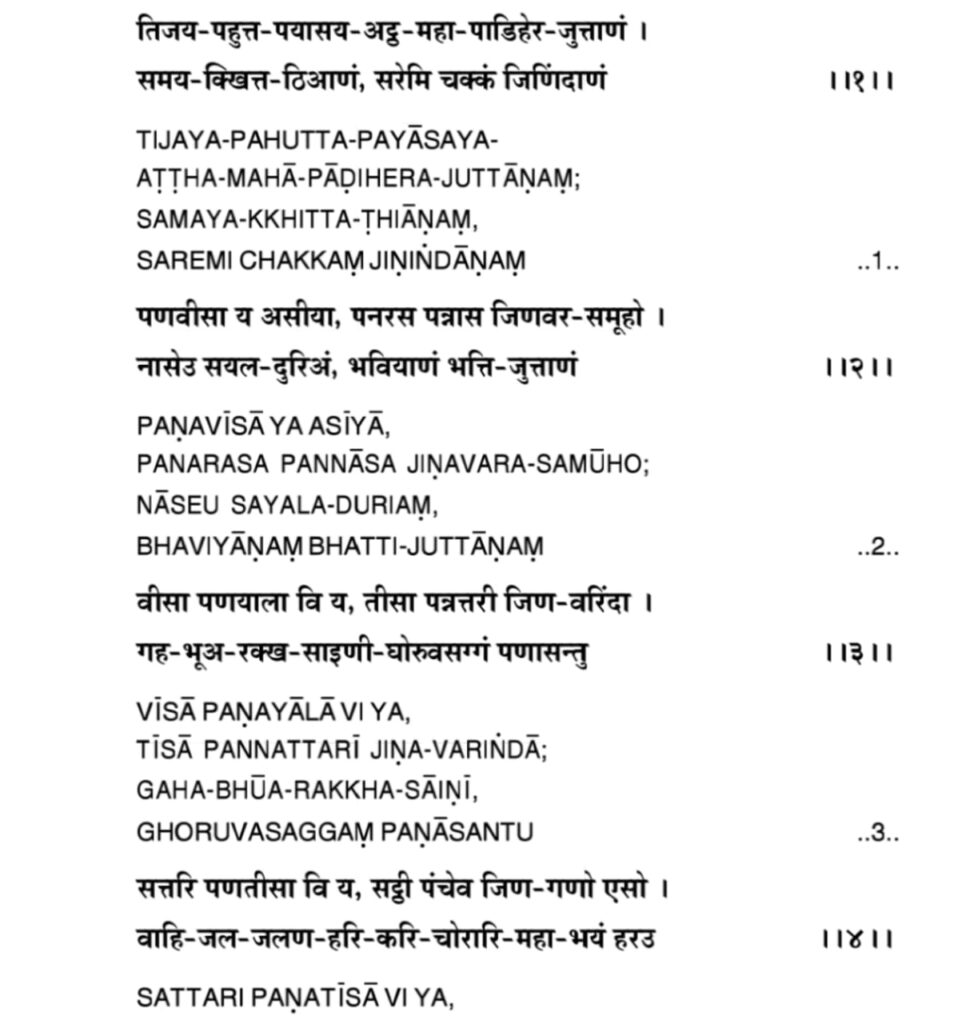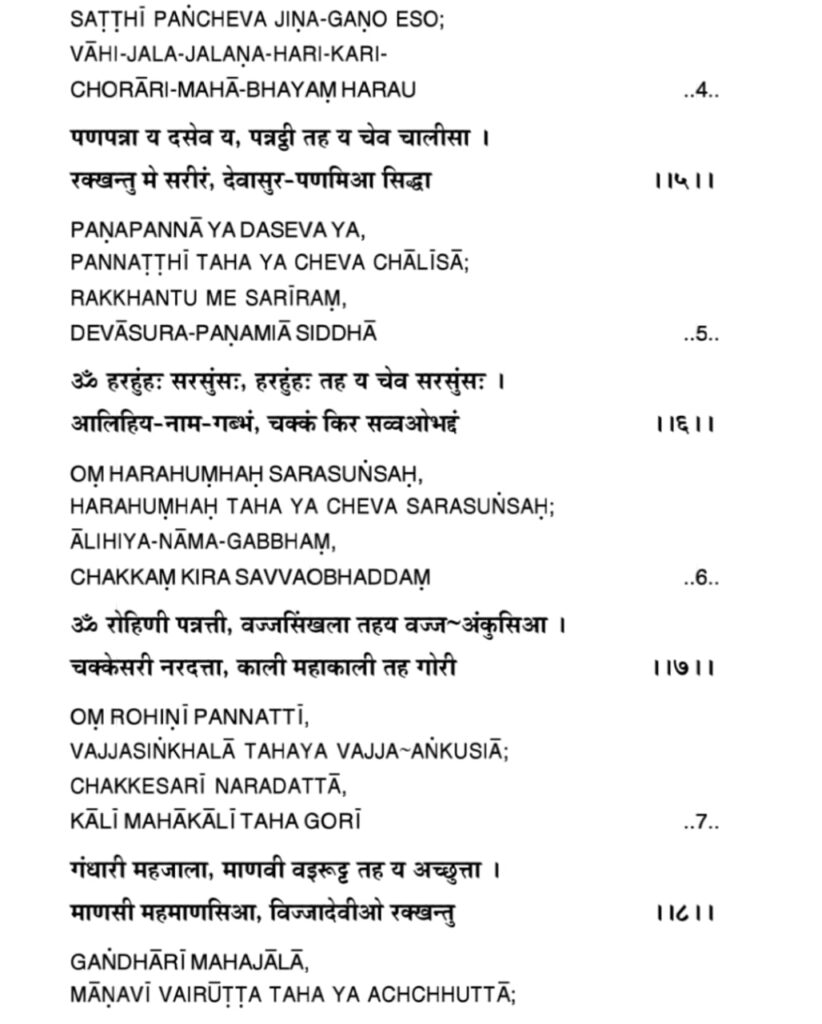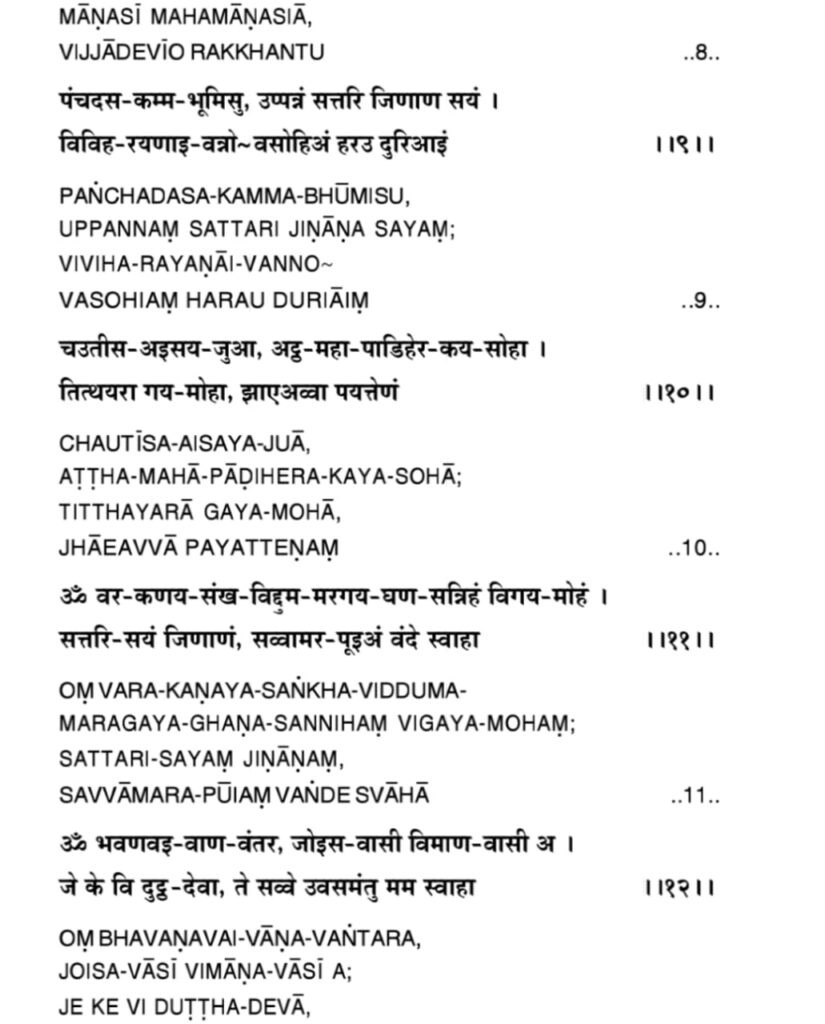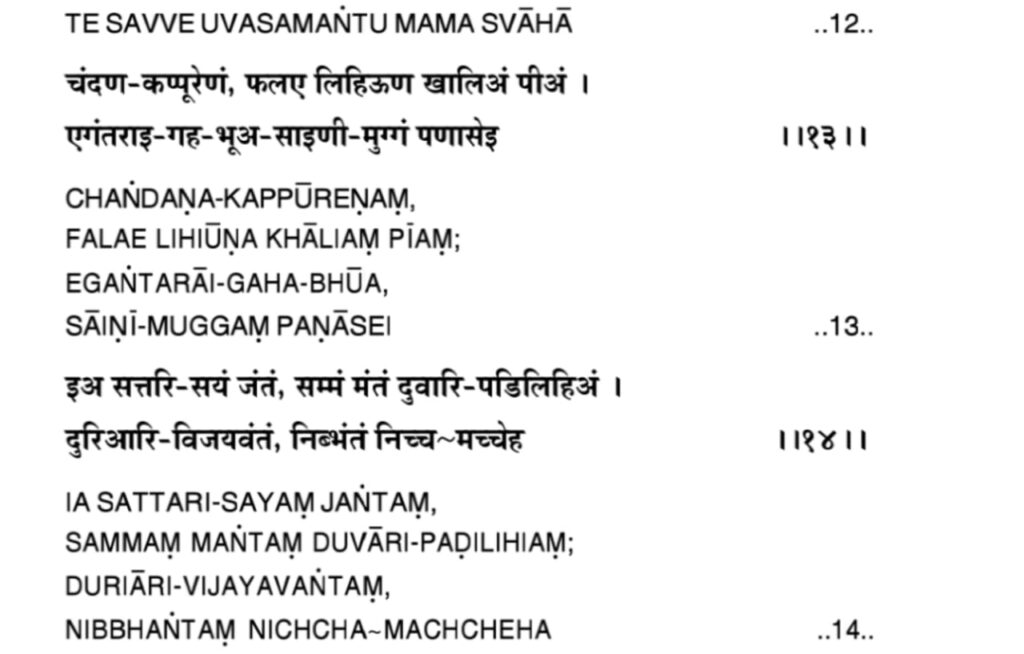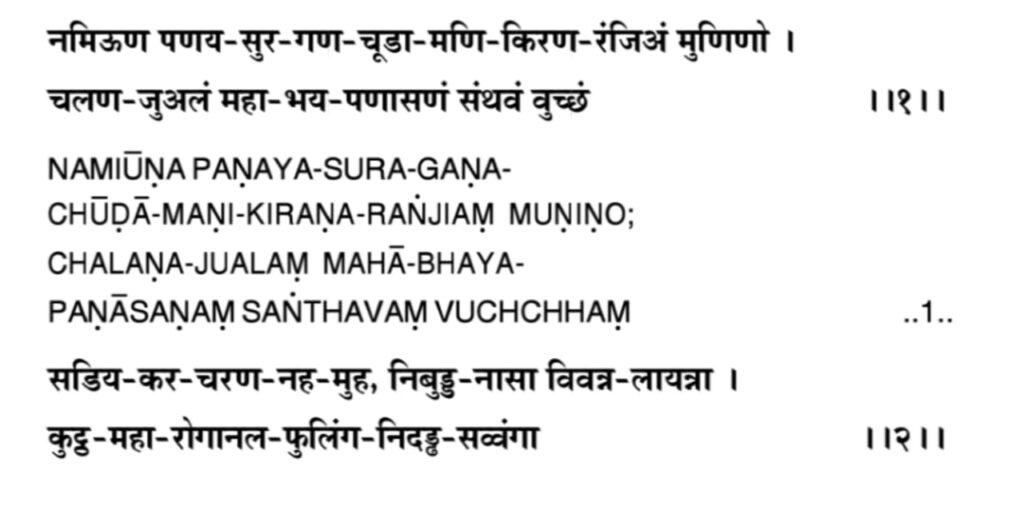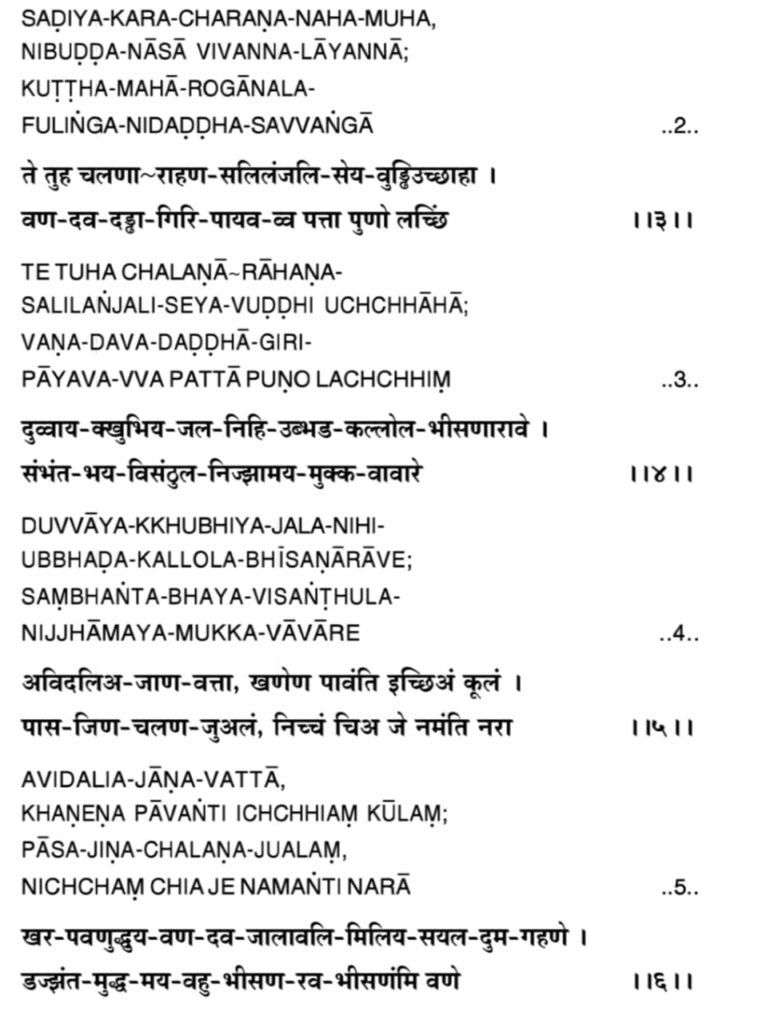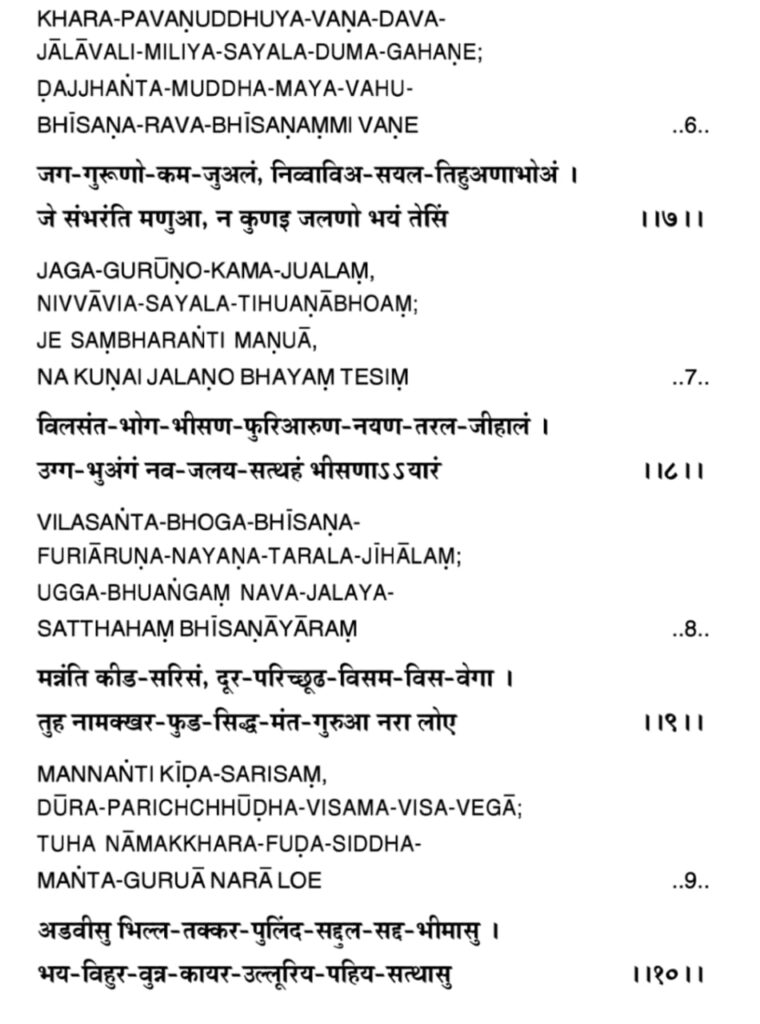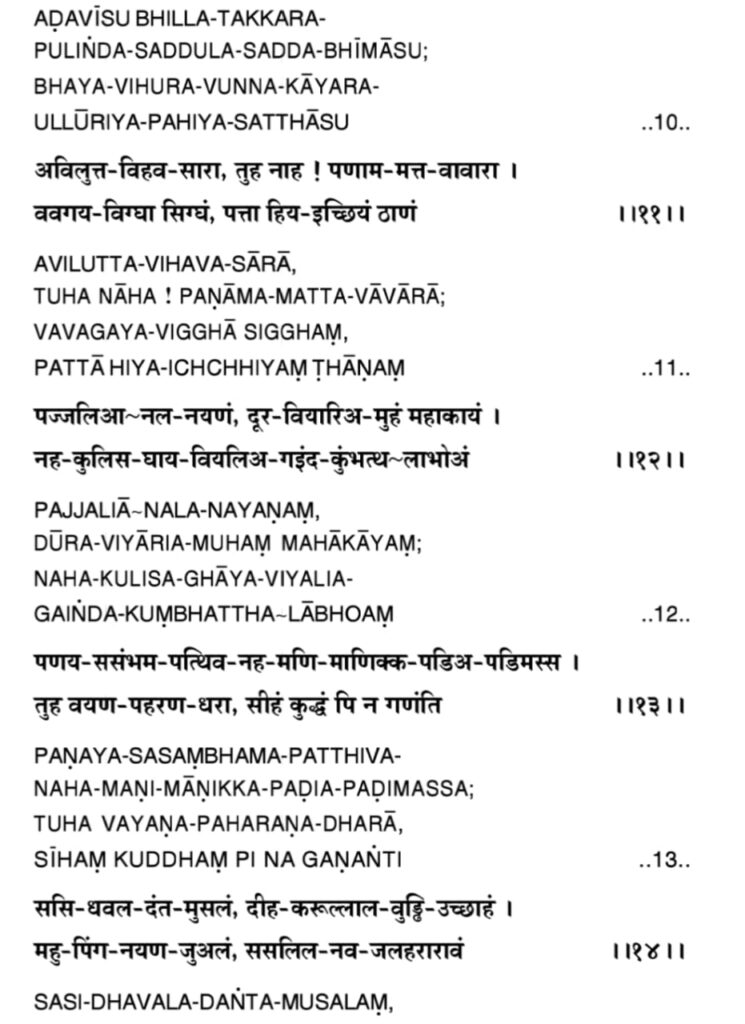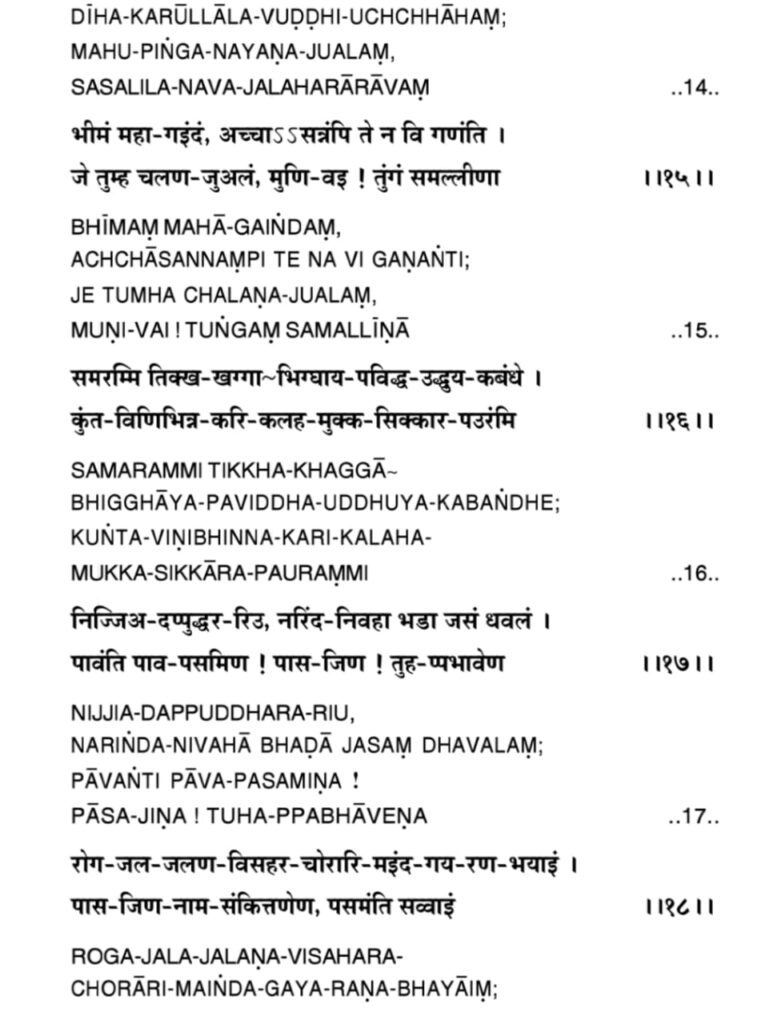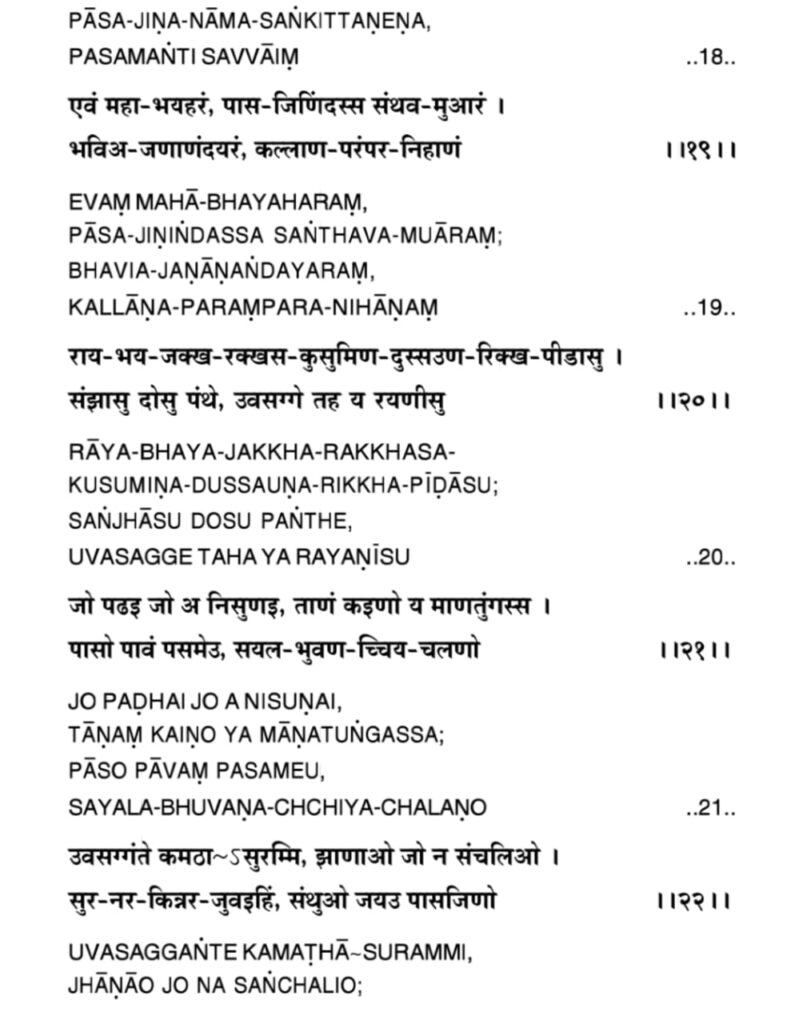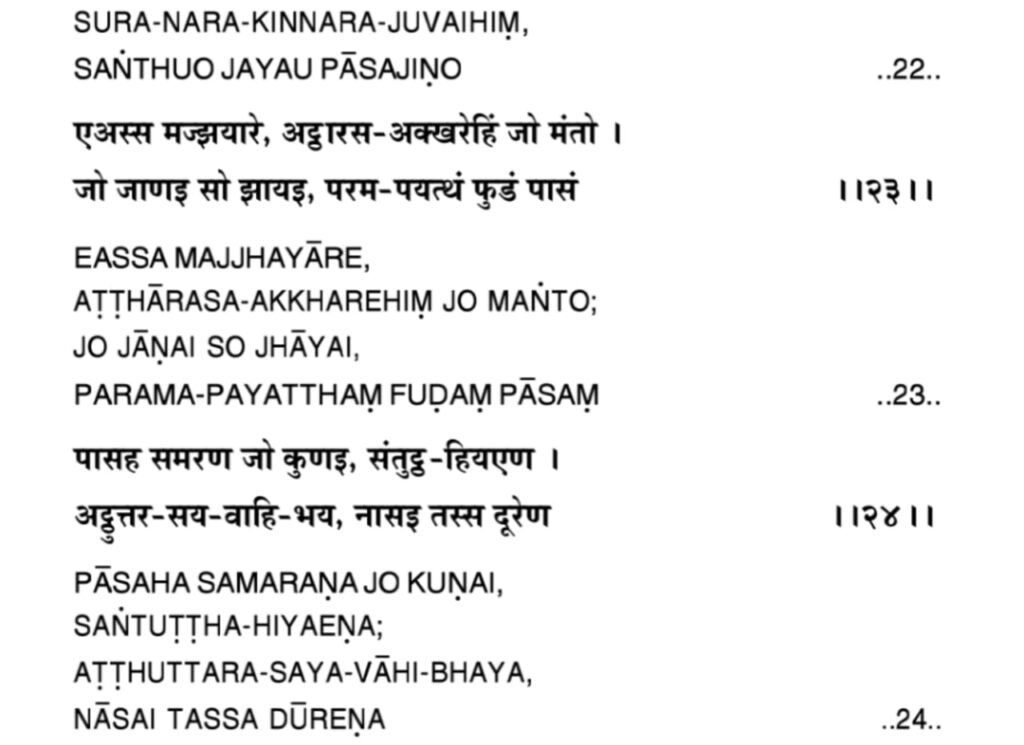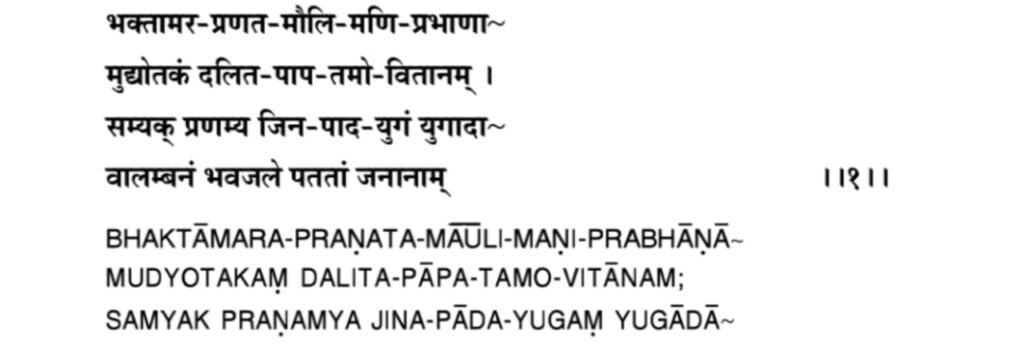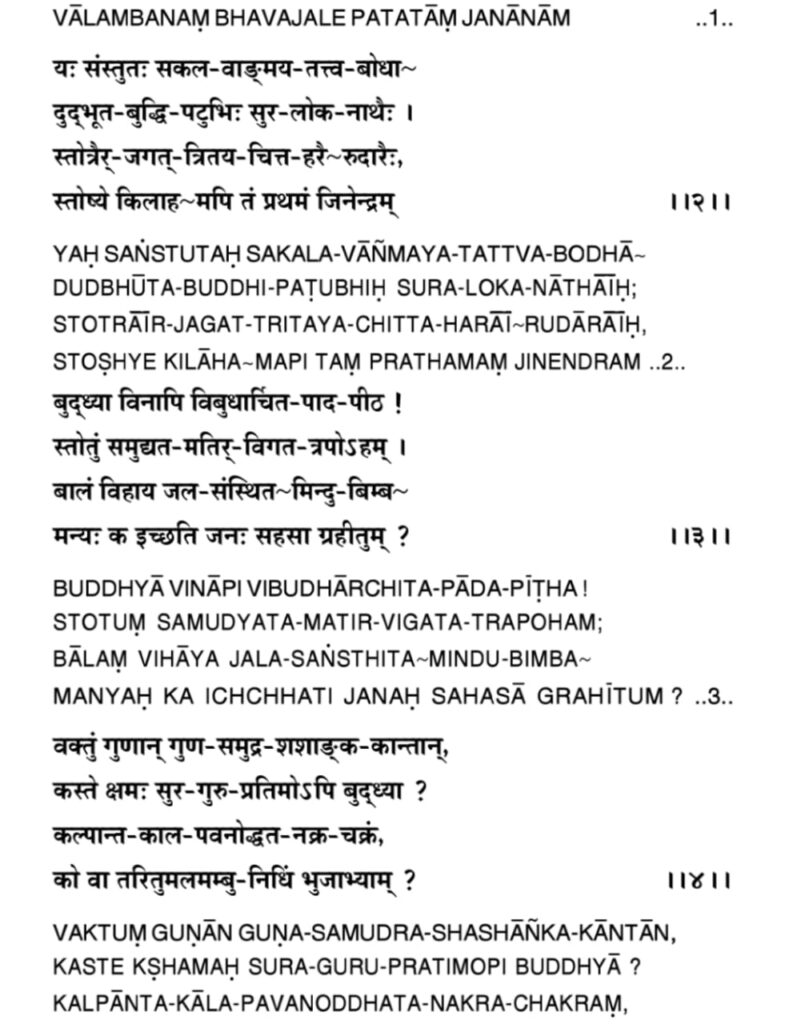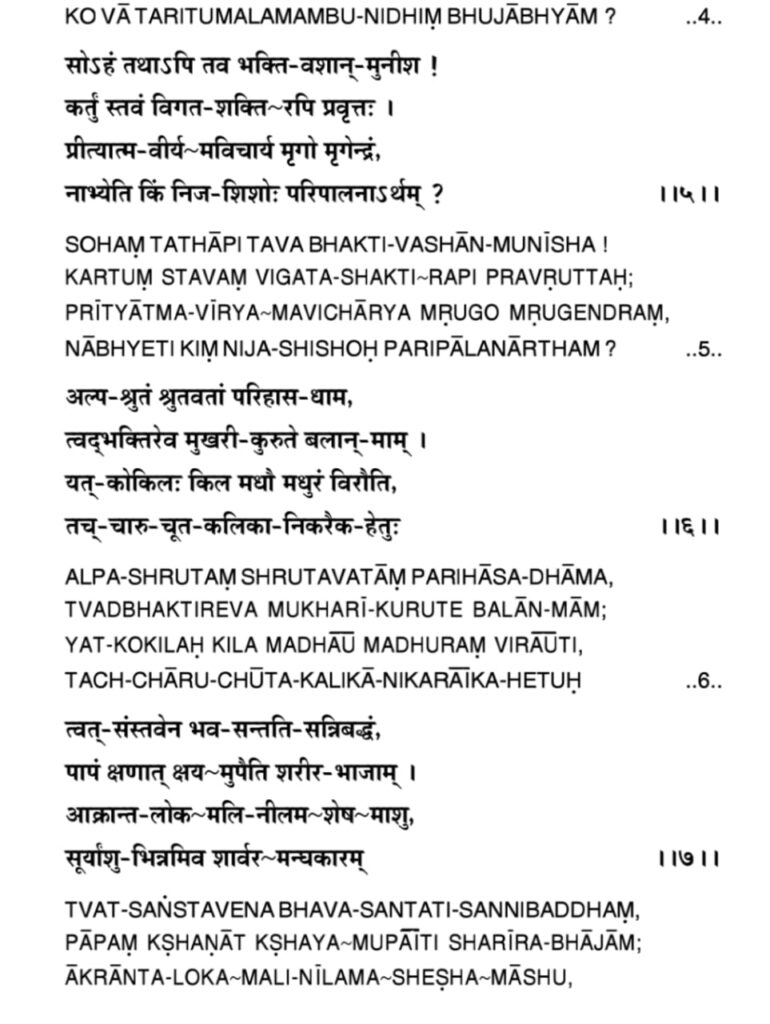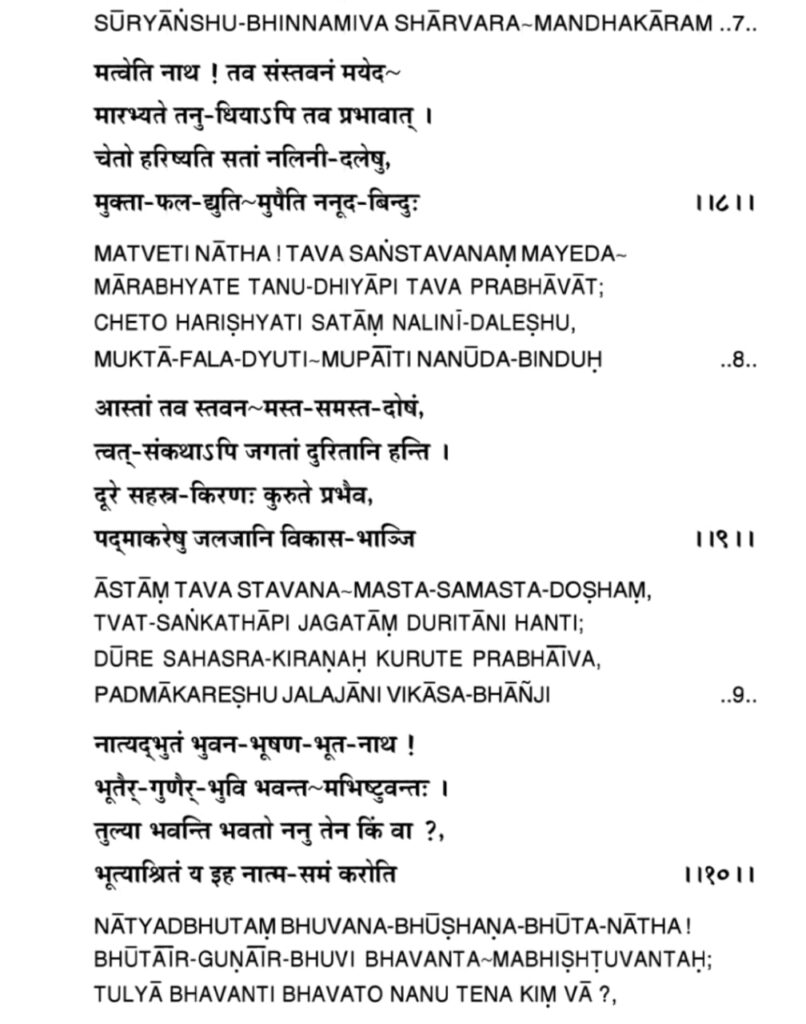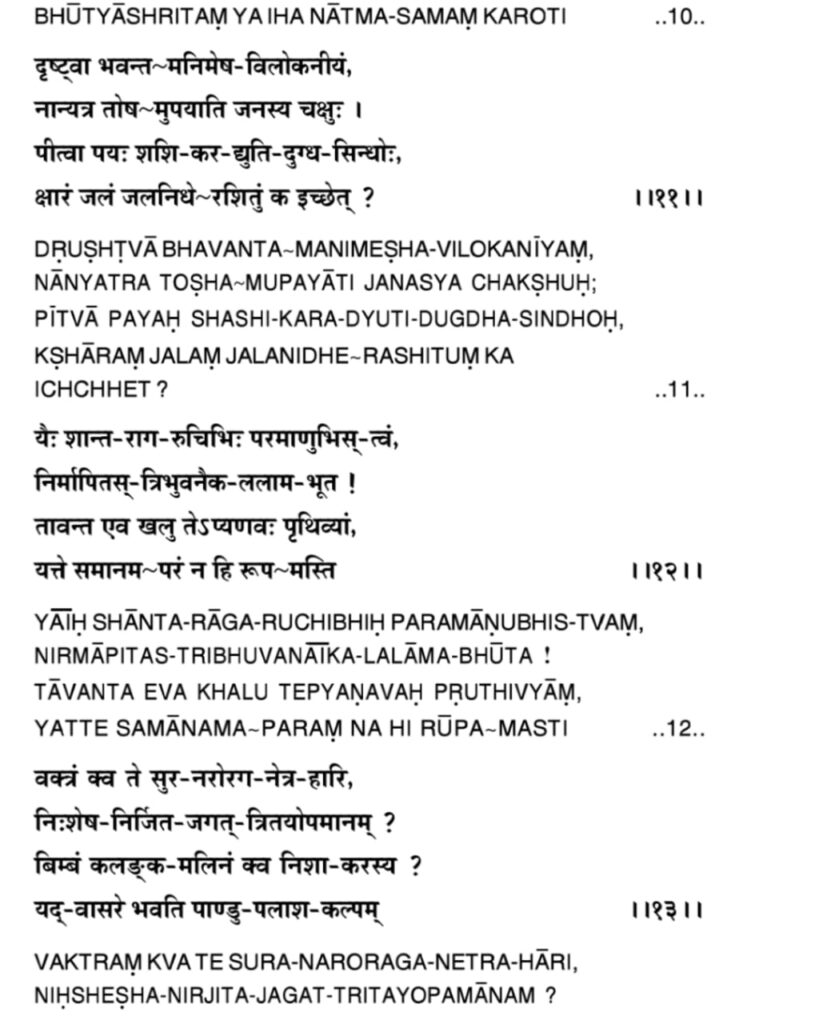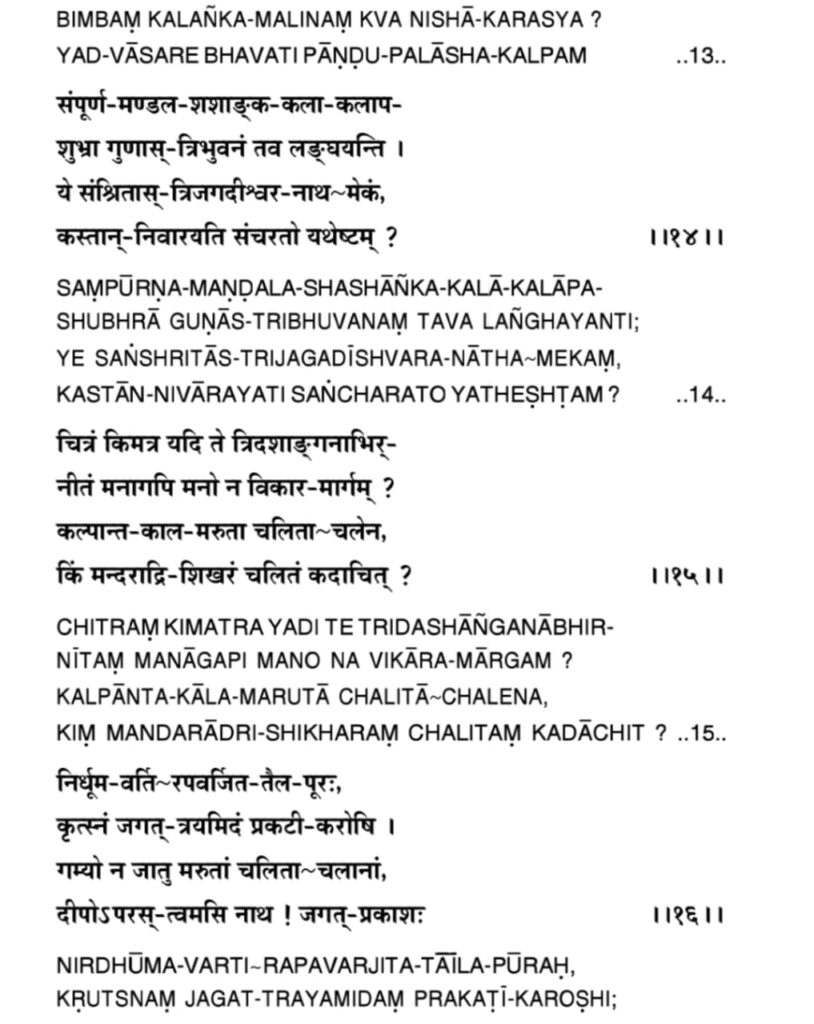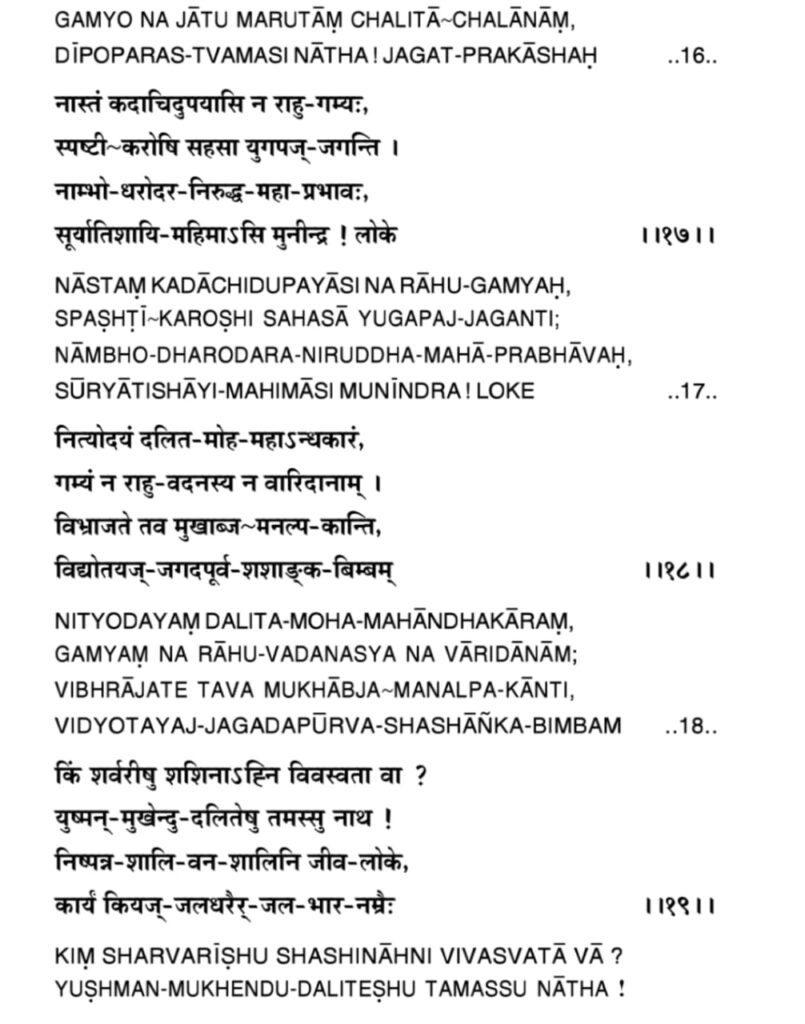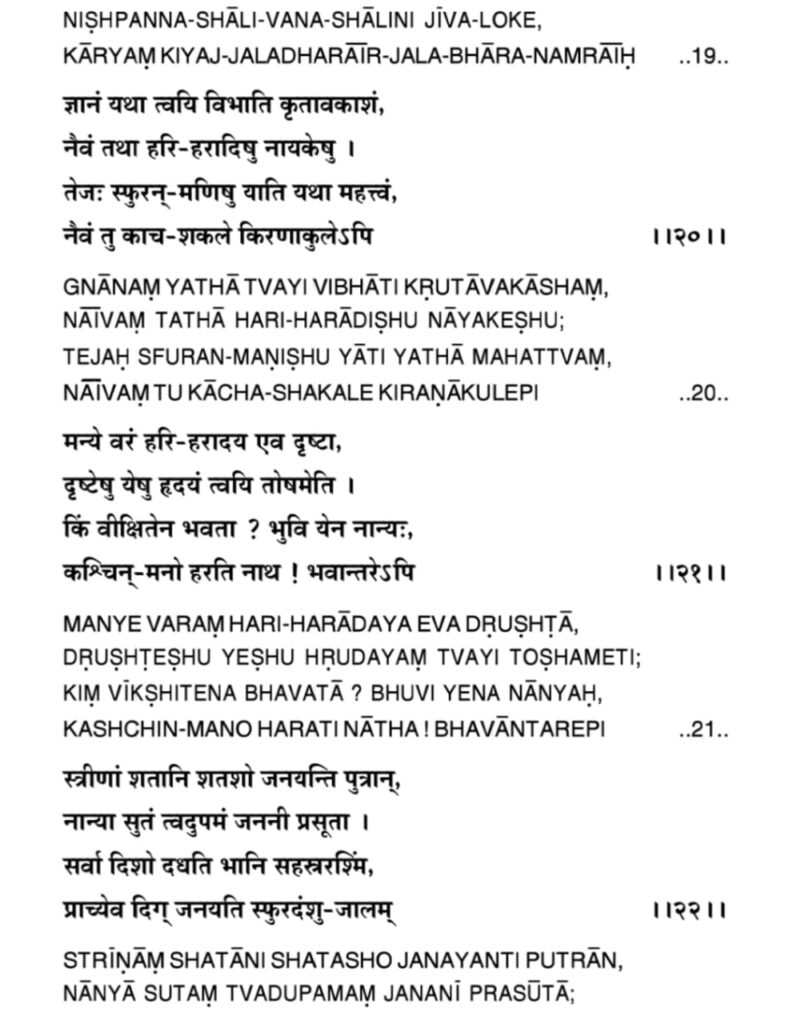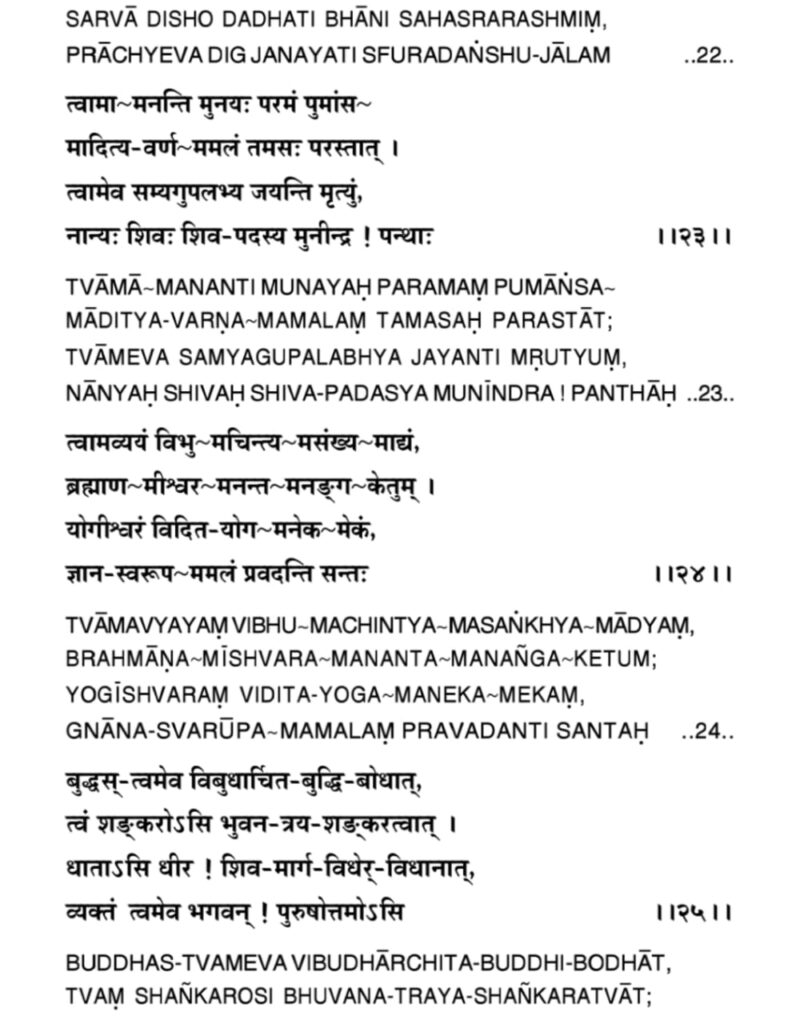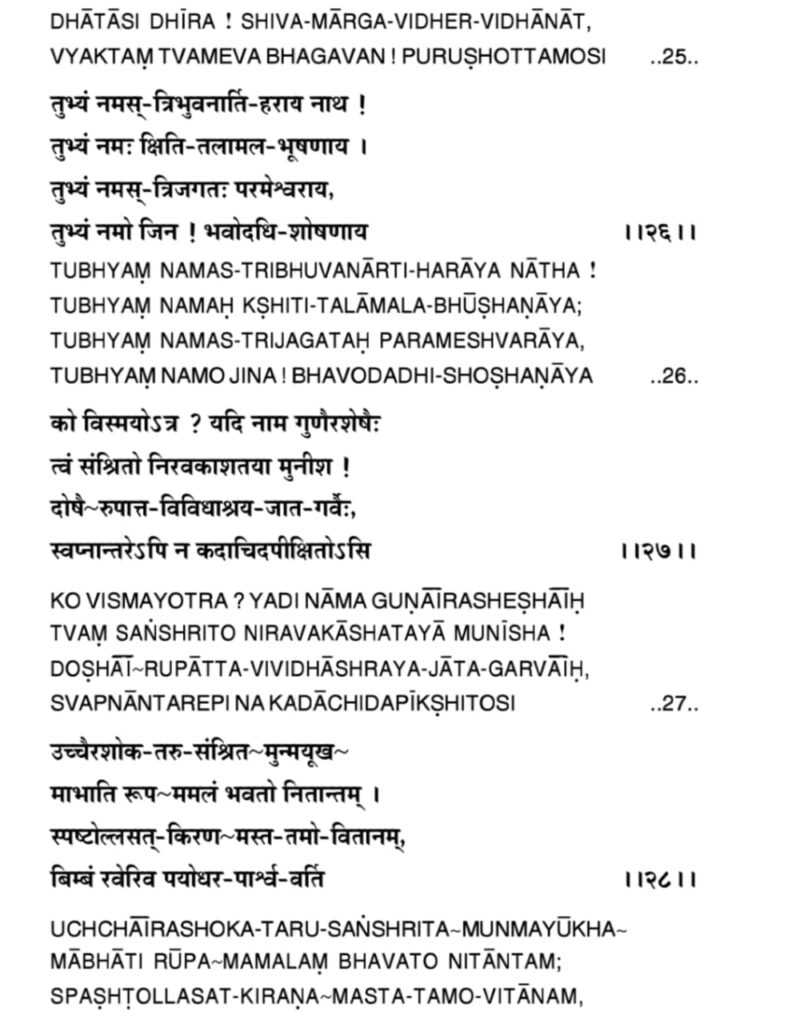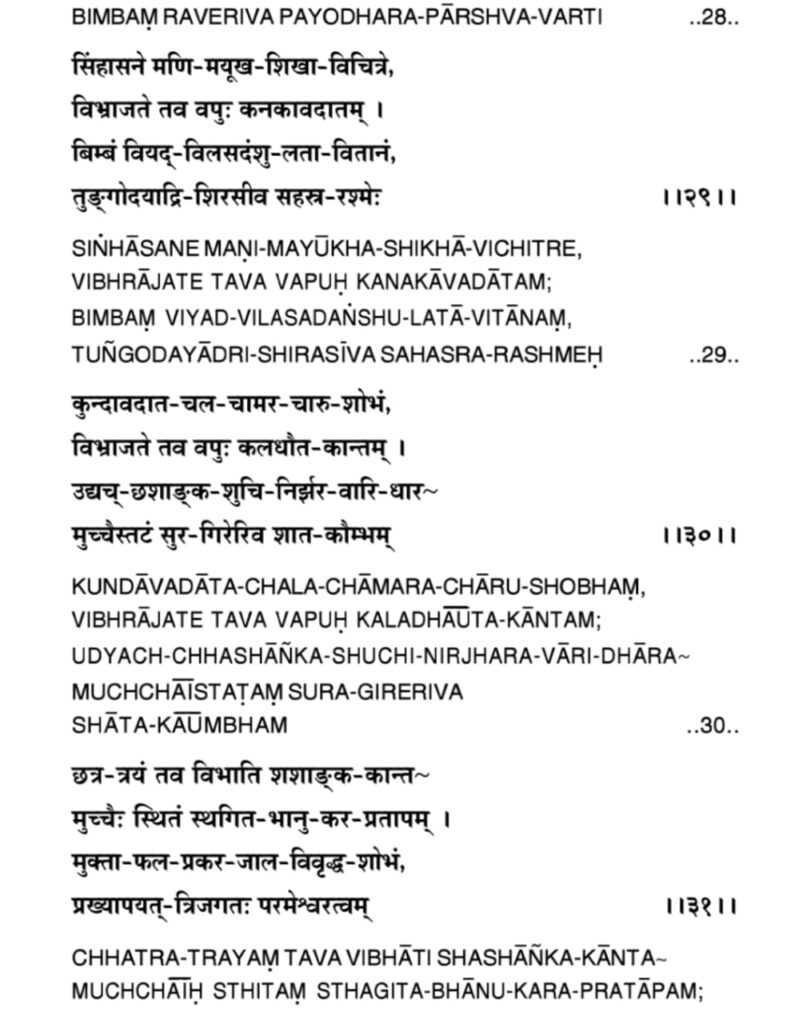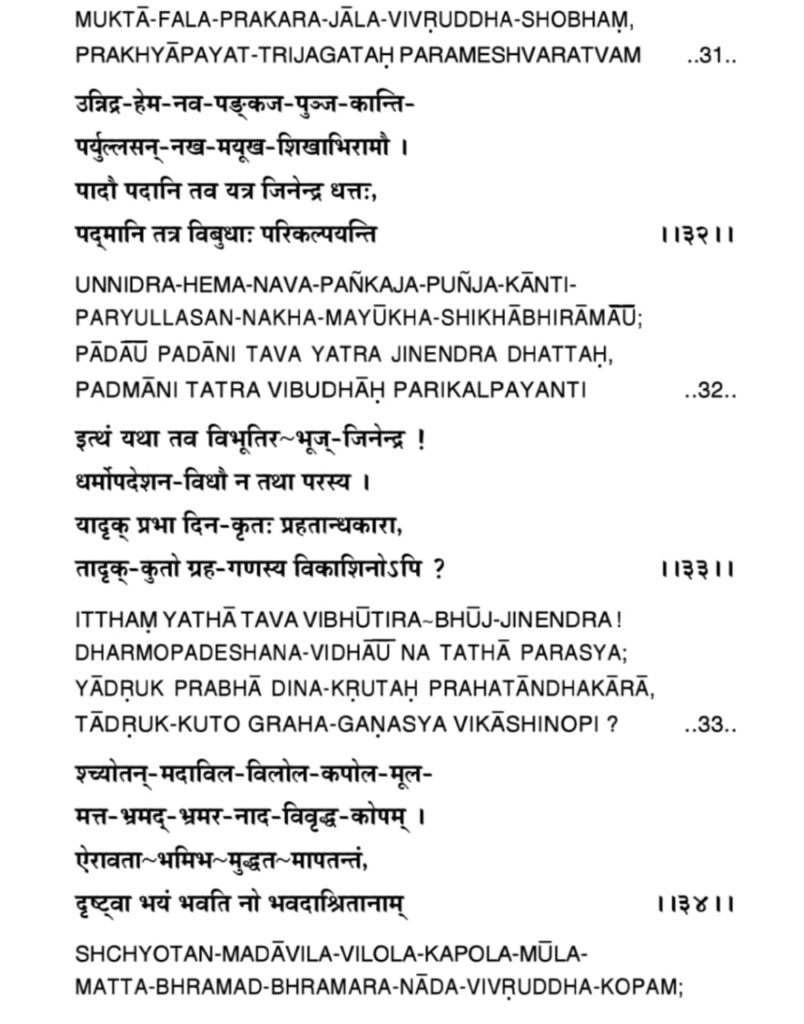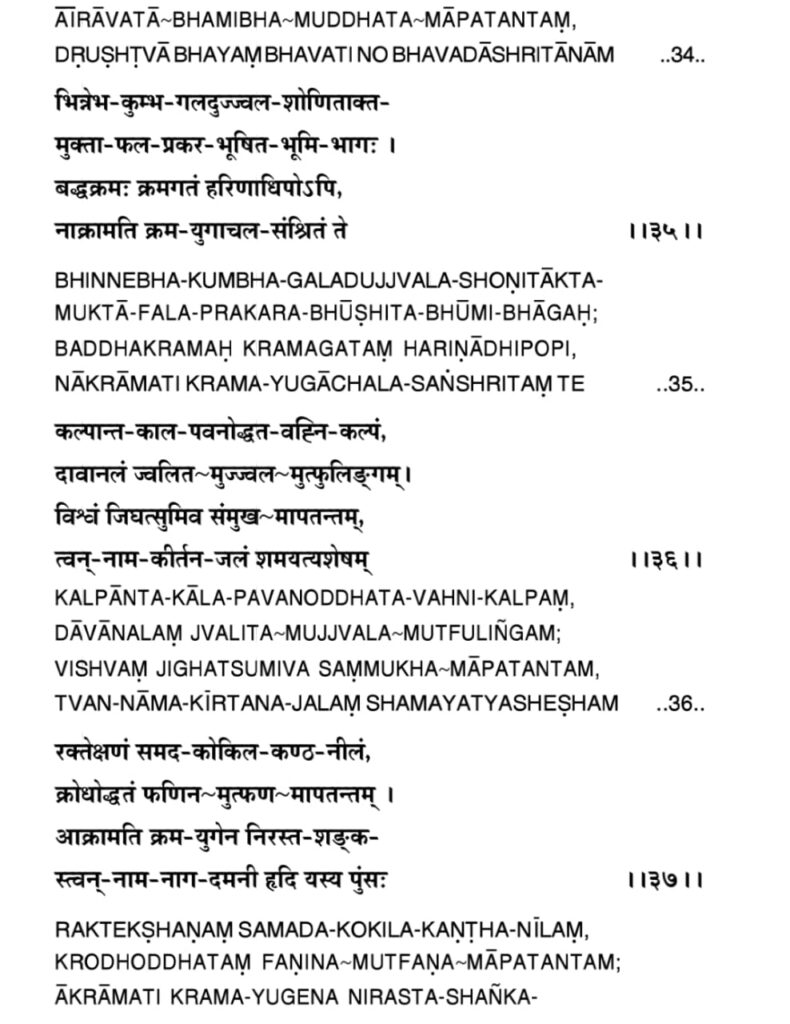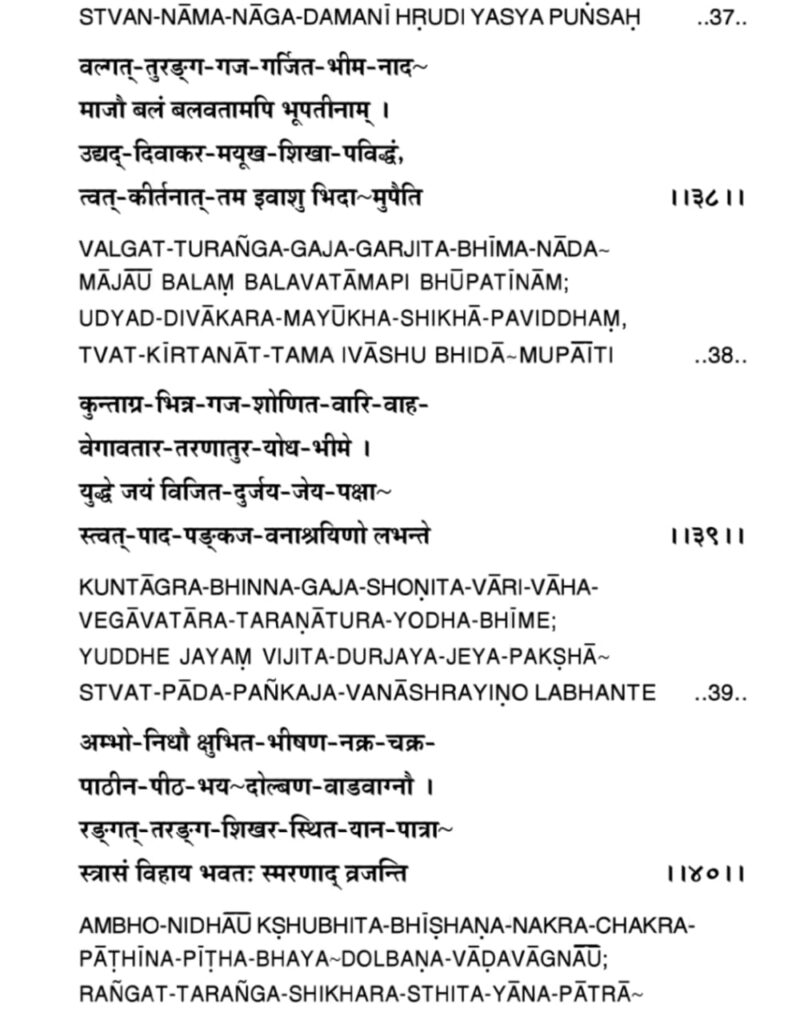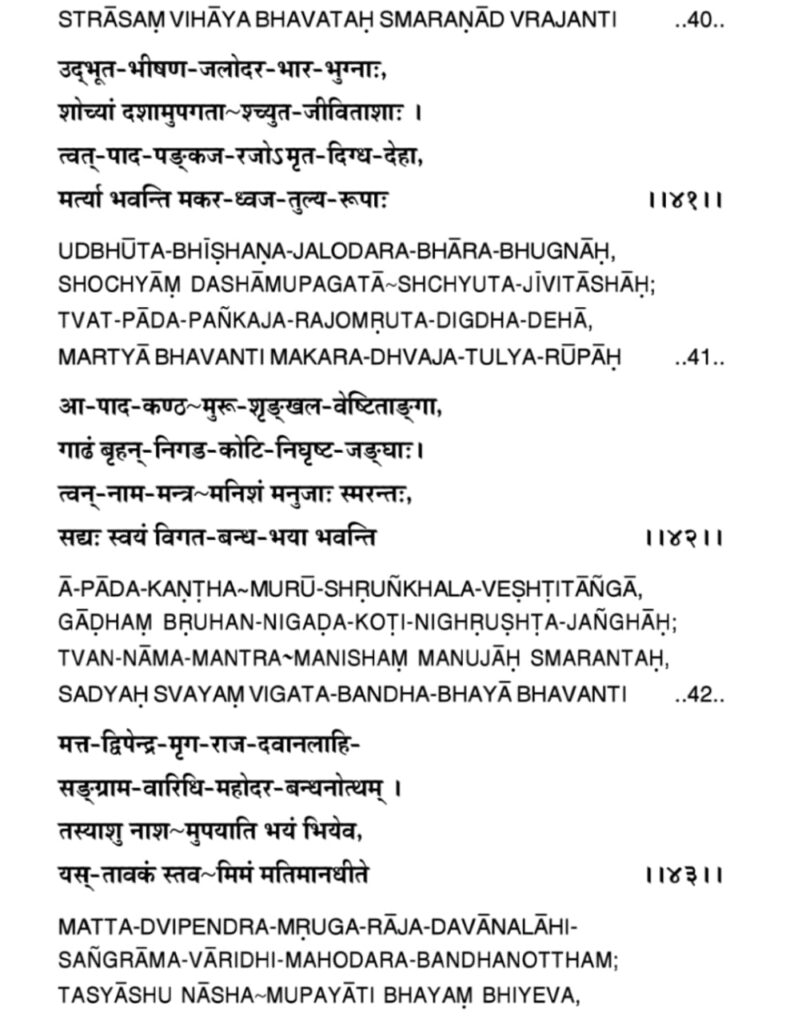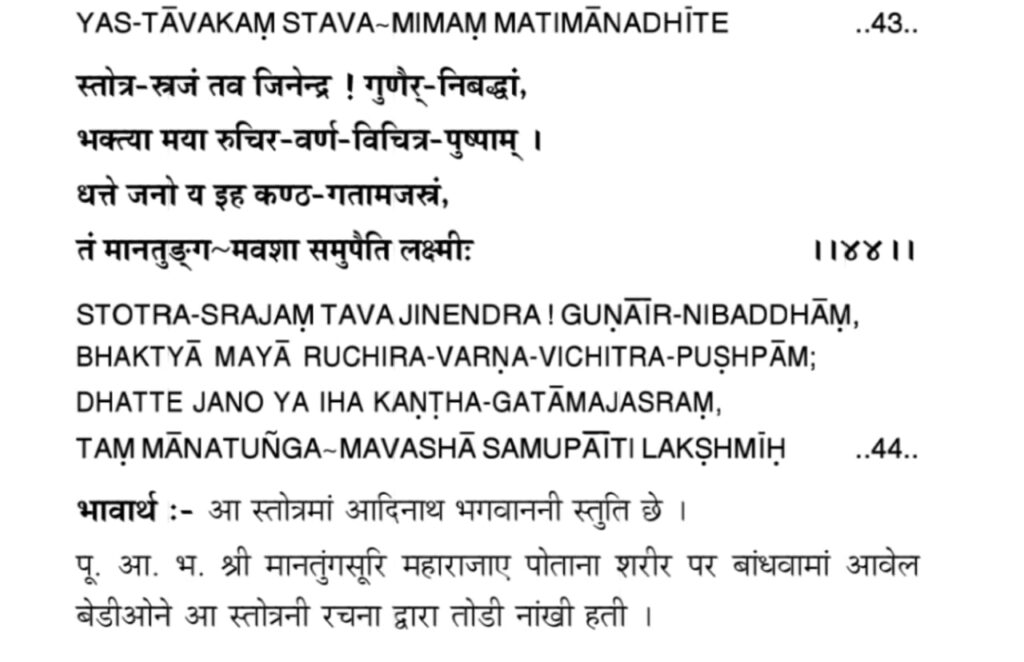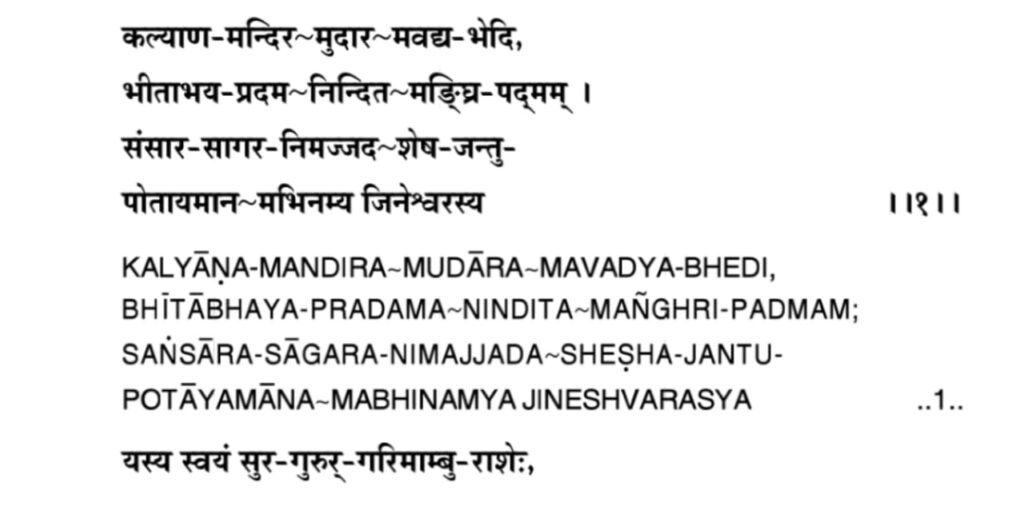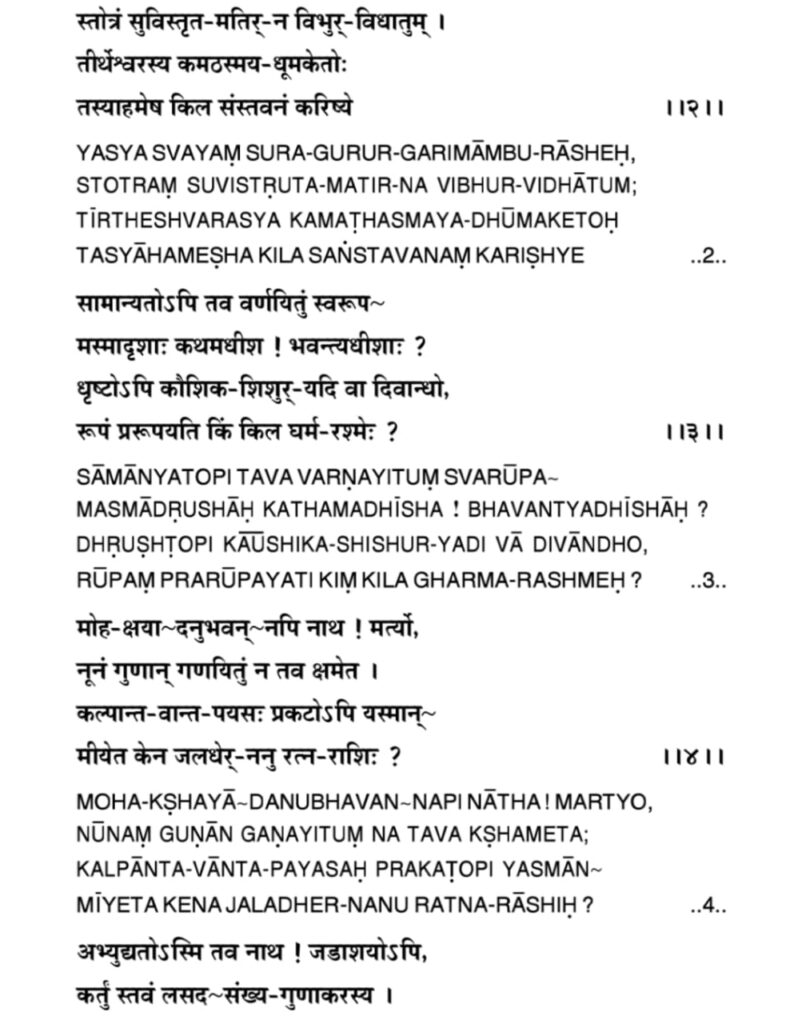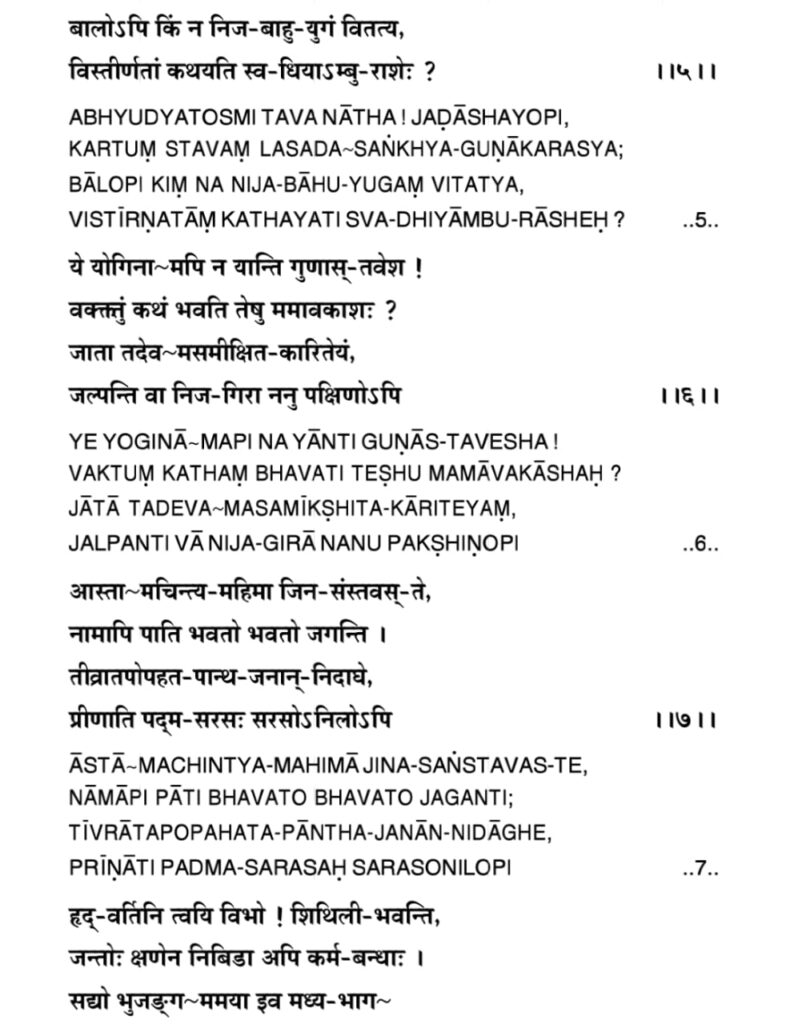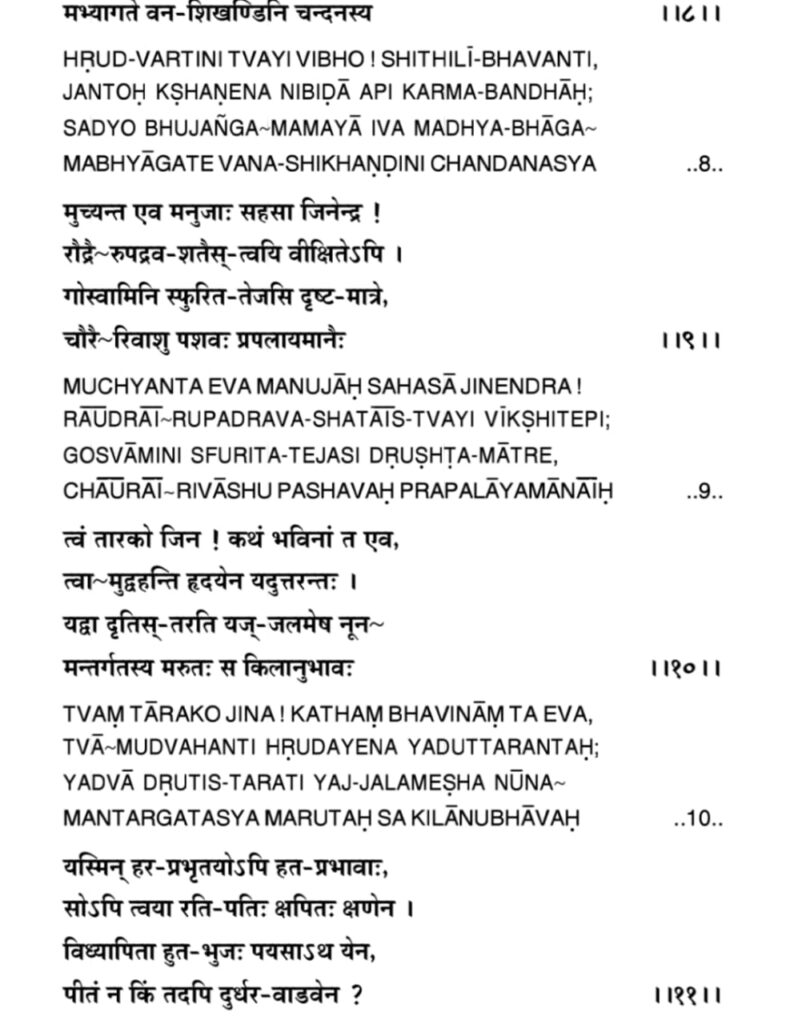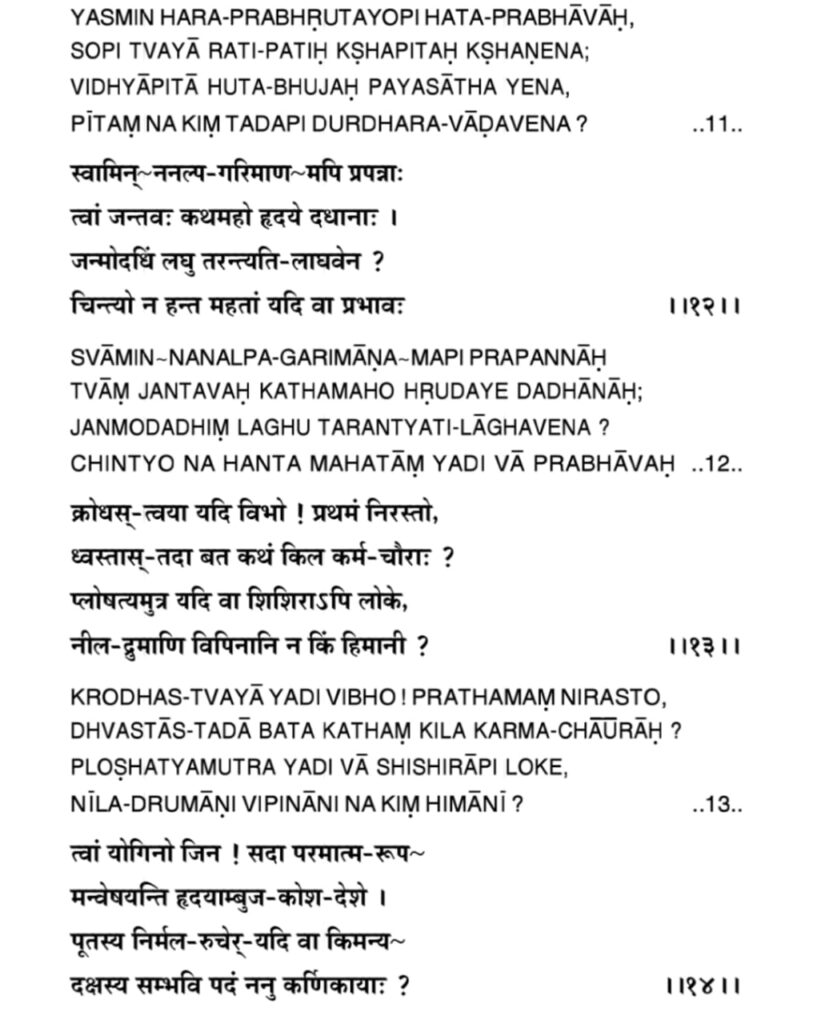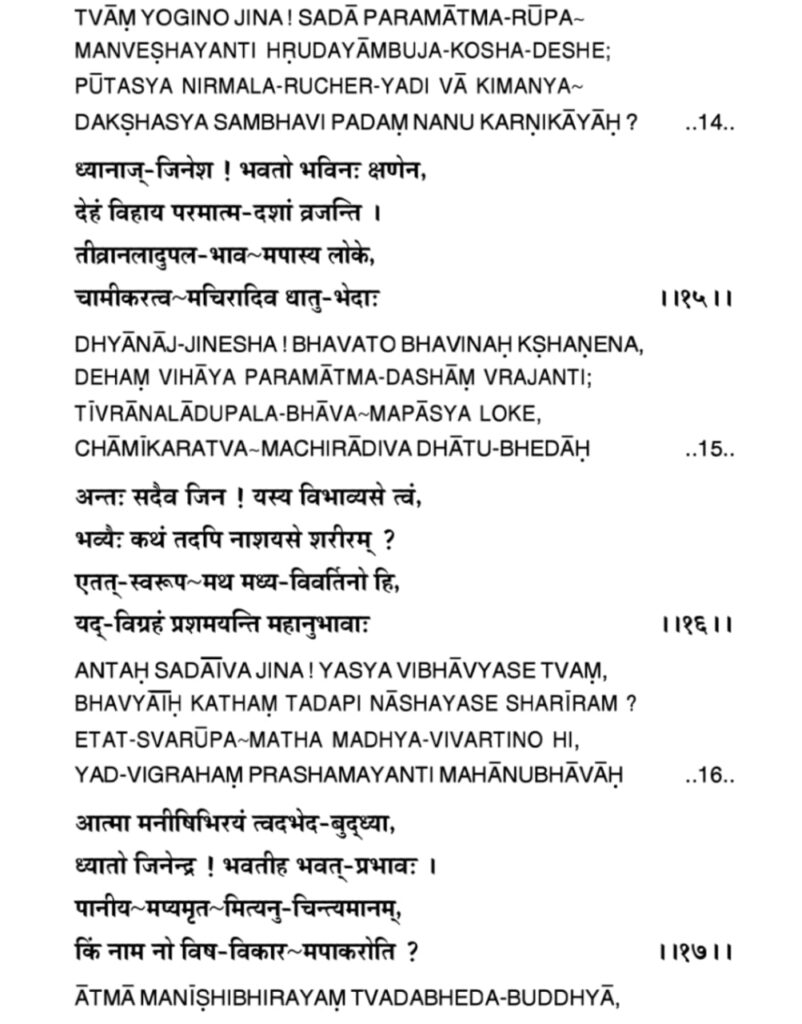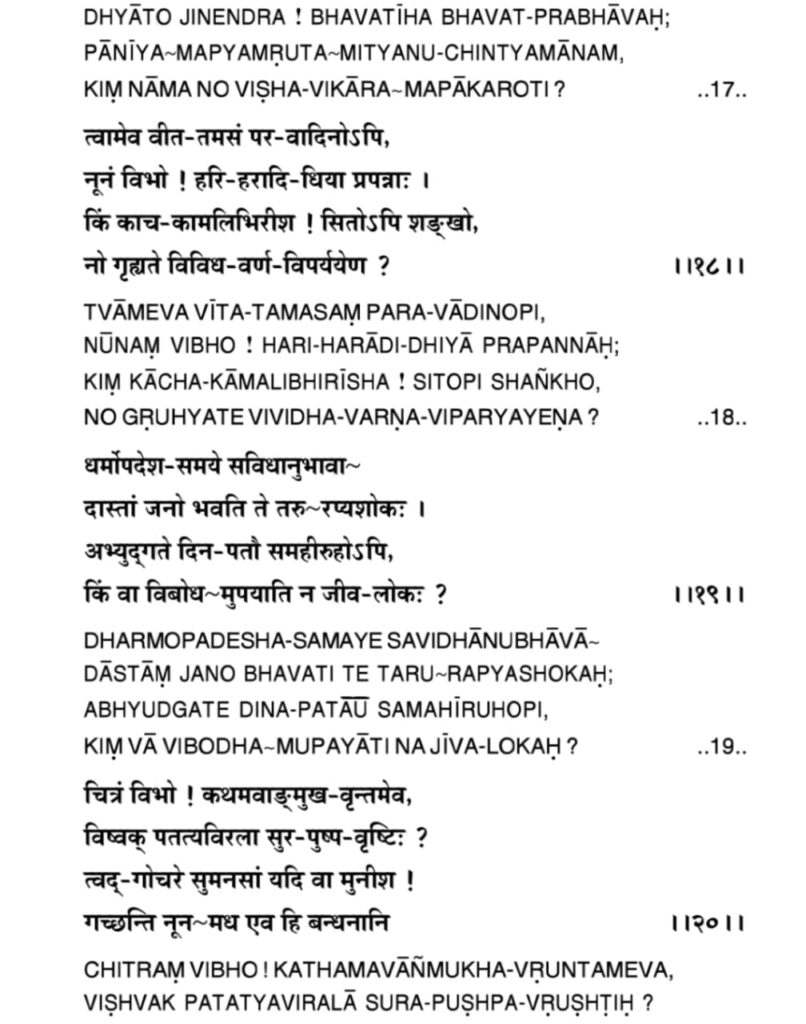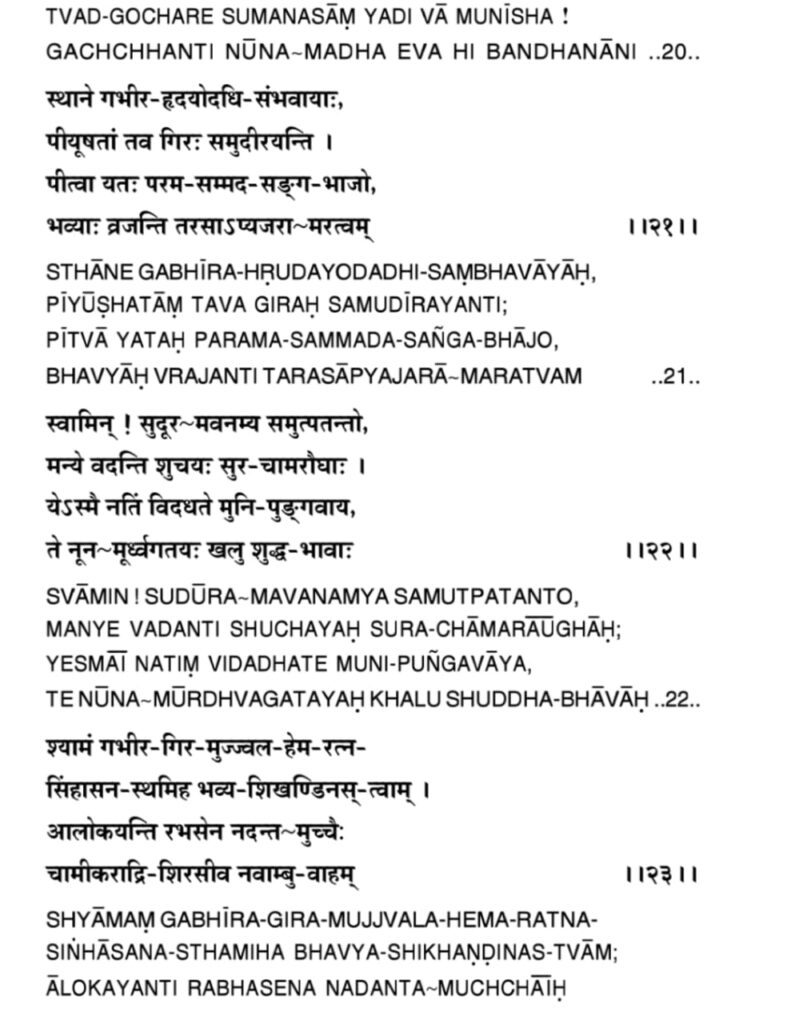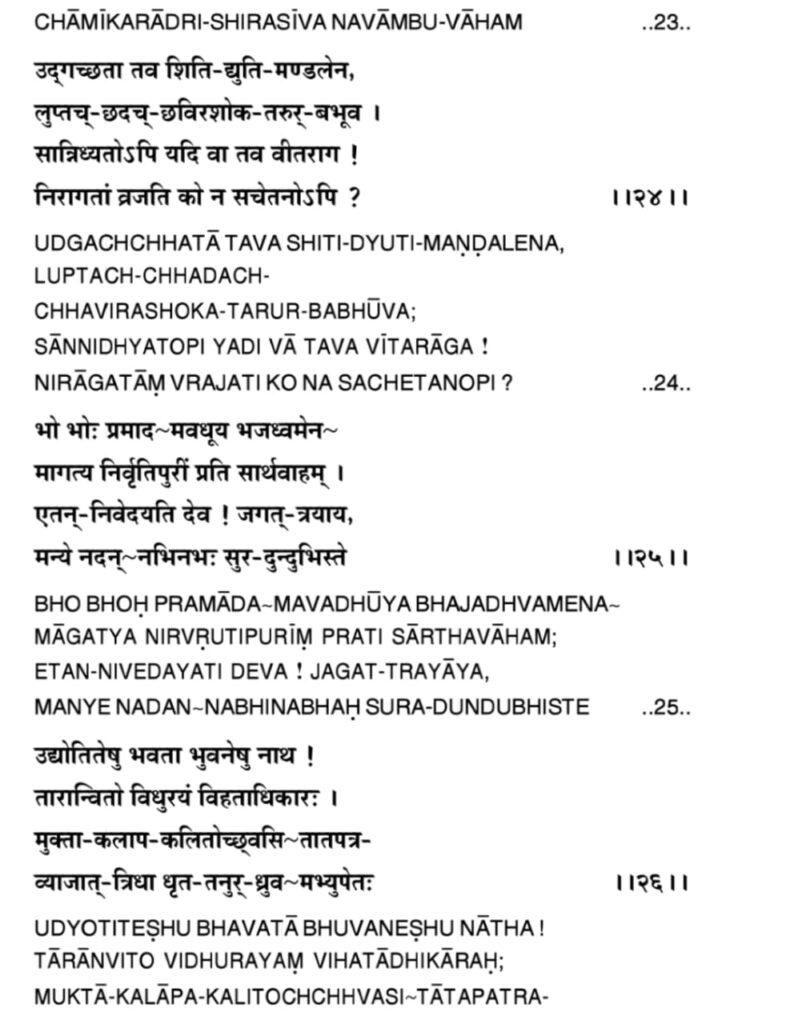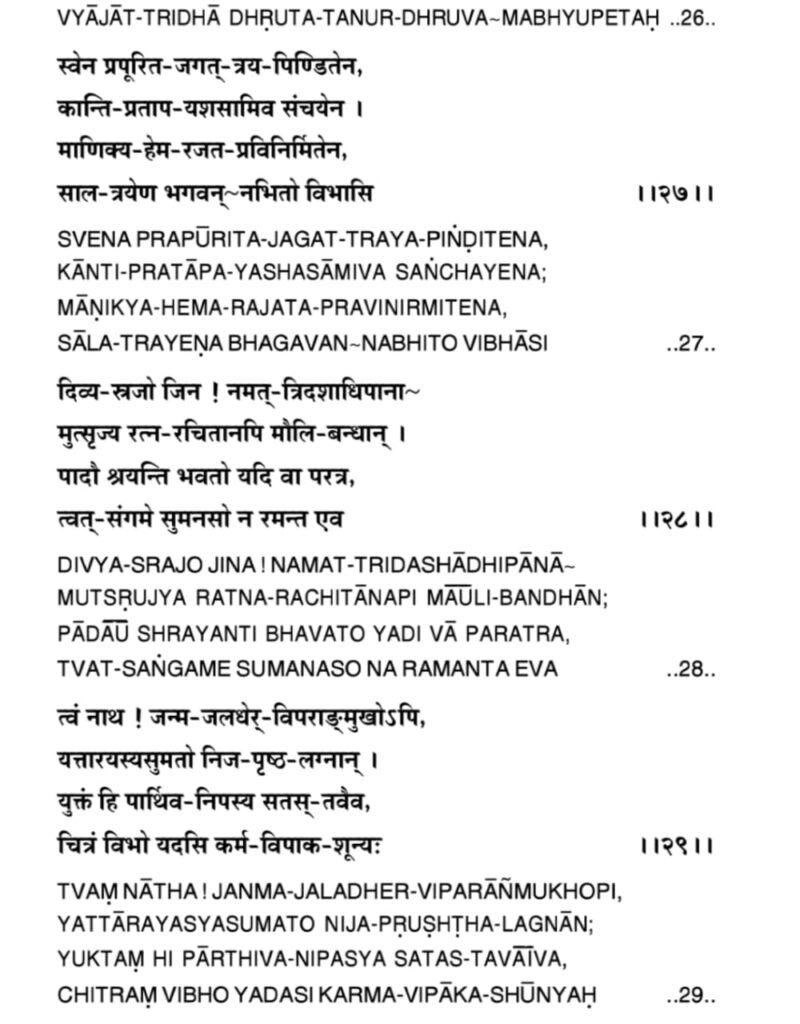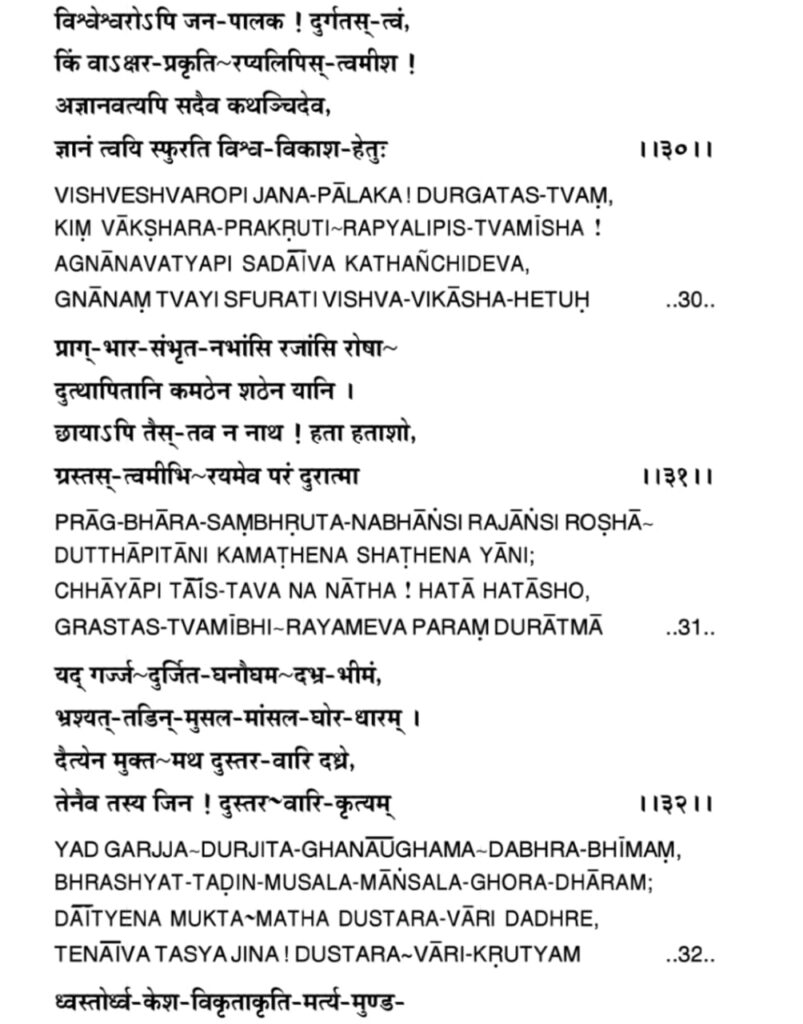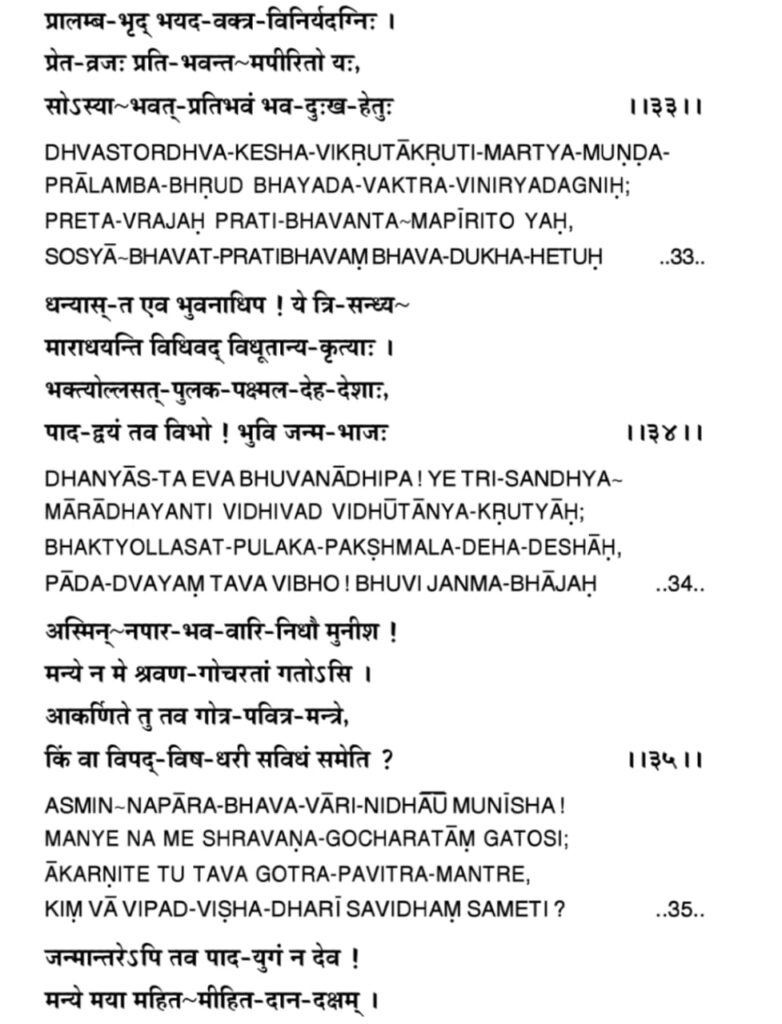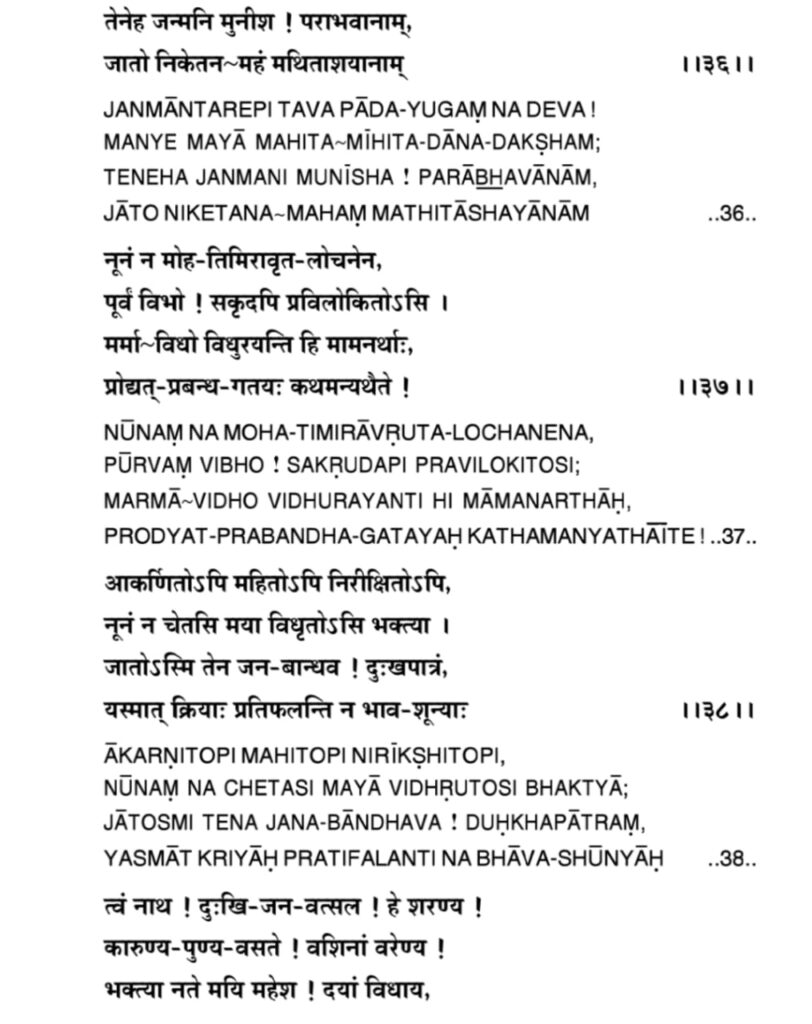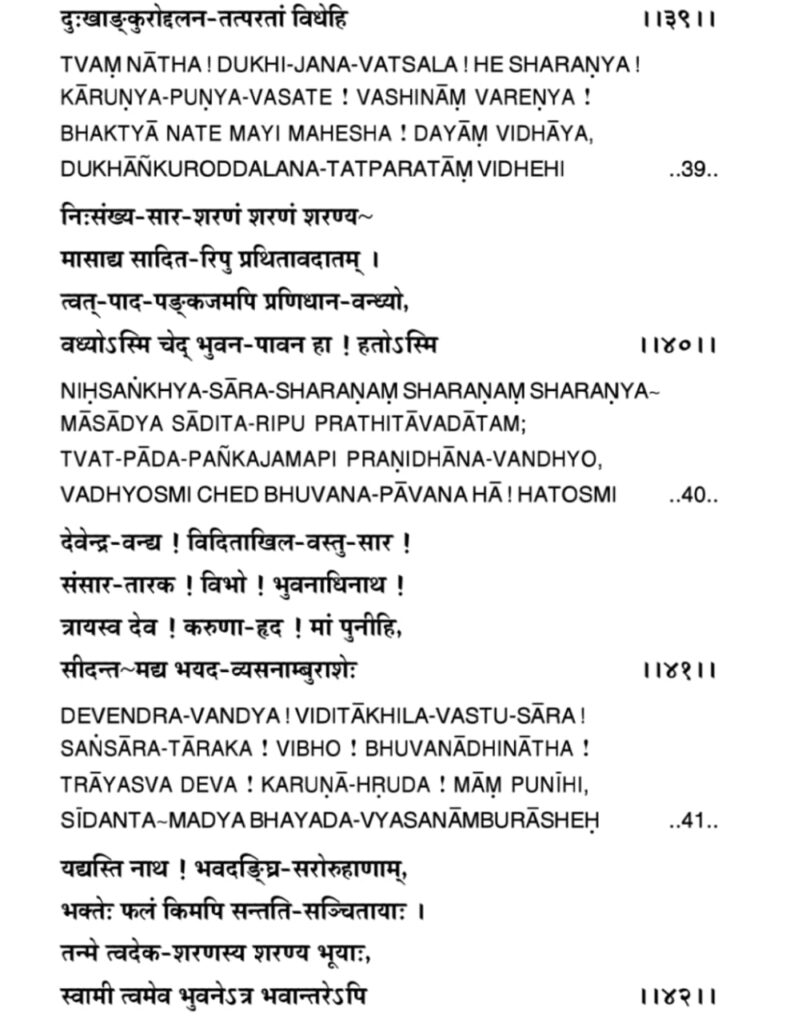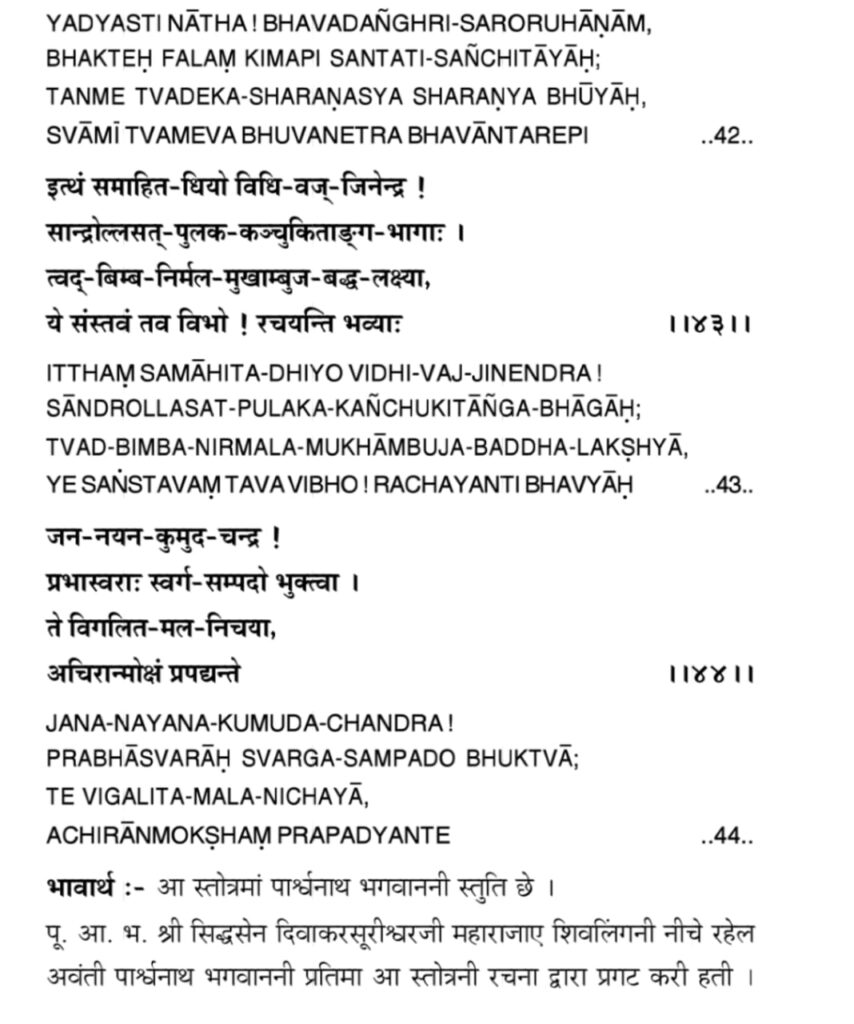When Pratikraman should be done
Ideally, Pratikraman is considered due as soon as a there is a lapse in observing any of the 12 vows . Sooner we ask forgiveness for the lapse, minimal would be the bondage of the Karma.
However as a layman we may not realize immediately about any such mistake that we commit and since we are likely to faulter every now and then, it is laid down that we should do Pratikraman twice a day.
There are 5 types of pratikaman based of when it should be done :
One is called Evening(Devashi) Pratikraman, which is meant for the lapses during the day time and should be done at the end of the day, at sunset.
The other known as Morning (Rai or Raishi)Pratikraman is meant for lapses during the night time and should be done in the morning at sunrise.
The intention in laying down two Pratikramans a day is that a person can easily recall the lapses or transgressions in which he might have indulged during that particular day or night. He can therefore seek forgiveness for the same without involving undue delay.
Many people, however, think that they cannot spare that much time every day. Such people should do Pratikraman at least once every fortnight. This is known as Fortnightly (Pakshik)Pratikraman.
There are some people who think that they cannot spare even that much time.Such people should do at least one Pratikraman every four months, known as Four Monthly(Choumasi) Pratikraman.
There are many people who think that they cannot spare even that much time. All of them must do at least one Pratikraman every year. This Yearly(Samvatsari) Pratikraman is considered a must for every Jain.
What is Pratikraman
“Prati” means “back” and “kraman” means “to go”. Combined together Pratikraman means to go back, review, confess, and repent the bad thoughts and deeds from our daily activities.
As a Jain householder we are supposed to observe 12 minor vows against five major vows observed by monks and nuns. During Pratikraman, we overview our activities for any lapse or transgressions which might have occurred among these vows. So, Pratikraman reminds us to live within set limitations.
Any lapse or transgression of these vows is called Atikraman. Therefore we undertake Pratikraman by remembering the code and the restraints one by one and take into consideration the faults and lapses pertaining to them with a view to ask forgiveness for it. During this Pratikraman, even if we might not have taken these 12 vows, we still ask forgiveness for lapses pertaining to them and wish that one of these days we can take those vows. This way, we try to ask for forgiveness for our ill actions and purify ourselves and improve upon our future activities. This enables us to shed off some of our previous Karmas and also to slow down or prevent the inflow of new Karmas.
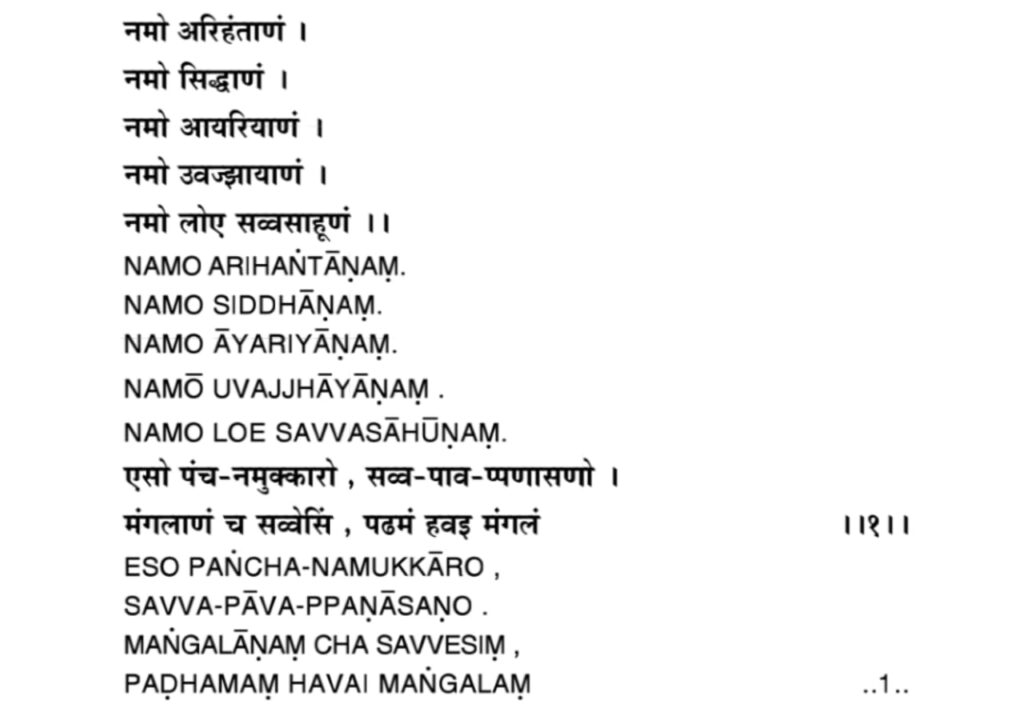
SHRI NAMSASKAR MAHAMANTRA
NAVKAR MANTRA with meaning in Hindi & English
I bow down to Arihanta,
I bow down to Siddha,
I bow down to Acharya,
I bow down to Upadhyaya,
I bow down to Sadhu and Sadhvi.
These five bowings downs,
Destroy all the sins,
Amongst all that is auspicious,
This Navkar Mantra is the foremost.
श्री नमस्कार महामंत्र
णमो अरिहंताणं - मैं अरिहंतो को नमन करता हूँ ।
णमो सिद्धाणं – मैं सिद्धों को नमन करता हूँ ।
णमो आयरियाणं – मैं आचार्यो को नमन करता हूँ ।
णमो उवज्झायाणं – मैं उपाध्याओ को नमन करता हूँ ।
णमो लोए सव्व साहूणं – मैं लोक (जगत्) के सर्व साधुओ को नमन करता हूँ ।
एसोपंचणमुक्कारो –ये पाँचो को कीया हुआ नमस्कार |
सव्वपावप्पणासणो – सभी पापो का पूरा नाश करते हैं ।
मंगलाणं च सव्वेसिं – और, सभी मंगलों में
पढमं हवई मंगलं – यह बिलकुल प्रथम मंगल हैं ।
meanings :
Namo Arihantanam: I bow down to Arihanta,
Namo Siddhanam: I bow down to Siddha,
Namo Ayariyanam: I bow down to Acharya,
Namo Uvajjhayanam: I bow down to Upadhyaya,
Namo Loe Savvasahunam: I bow down to Sadhu and Sadhvi.
Eso Panch Namukkaro: Bowing downs to these five,
Savva-pava-ppanasano: Destroy all the sins,
Manglanam cha Savvesim: Amongst all that is auspicious,
Padhamam Havai Mangalam: This Navkar Mantra is the foremost.
The Navkar Mantra is the most fundamental mantra in Jainism and can be
recited at any time of the day. While reciting the Navkar Mantra, the
aspirant bows with respect to Arihantas, Siddhas, acharyas, Upadhyayas,
Sadhus, and Sadhvis. The mantra enables us to worship the virtues of
all the supreme spiritual people instead of just worshipping one
particular person. For this reason, the Navkar Mantra does not mention
the names of any Tirthankaras, Siddhas, Acharyas, Upadhyayas, Sadhus,
or Sadhvis. At the time of recitation, we remember their virtues and
try to emulate them. In this mantra we bow down to these supreme
spiritual personalities, and therefore, it is also called Namaskar or
Navkar Mantra.
The Navkar Mantra contains the essence of Jainism. It points out that
if we want to be truly liberated, we have to give up worldly life
(sansar). The first stage of renunciation is to become a monk (sadhu)
or nun (sadhvi). While progressing on a spiritual path, some may be
designated as Upadhyayas or Acharya. The ultimate aim is to attain
omniscience, becoming an Arihanta, which leads us to liberation, the
becoming a Siddha.
1) ARIHANTAS
The term Arihanta is made up of Ari, meaning enemies, and hant,
meaning destroyer. Consequently, Arihanta means destroyer of enemies.
In this case the term enemies refers to passions such as anger, greed,
ego, and deceit which are internal enemies, because they defile the
true nature of the soul. A soul can only reach the state of Arihanta
by overcoming all its inner enemies. Once a soul has shed all of its
four defiling (ghati) karmas namely Gyananavarniya (Knowledge obscuring)
Karma, Darshanavarniya (Perception obscuring) karma, Mohniya (Deluding)
Karma and Antaraya (Obstructive) Karma, it becomes an Arihanta and
attains perfect knowledge (Kevalgyana), perfect perception
(Kevaldarshana), and infinite power (Ananta Virya) and it becomes a
passionless(vitragi). Arihantas are divided into two categories:
Tirthankar and Ordinary. Arihantas who have attained Tirthankar Nam
Karma become Tirthankaras while the rest of them become Ordinary
Arihants. There are twenty-four Tirthankaras during every half time
cycle. These Tirthankaras reinstate the Jain Sangh (four-fold Jain
Order) consisting of Sadhus (monks), Sadhvis (nuns), Shravaks (male
householders), and Shravikas (female householders). The first
Tirthankar (Arihanta) of this time period was Lord Rushabhdev, and the
twenty-fourth and last Tirthankar was Lord Mahavira, who was lived from
599B.C. to 527B.C. Tirthankaras are also called Jina (conqueror of
inner passions) from which the term Jain, follower of a Jina, is
derived. At the time of Arihanta's nirvan (death), the remaining four
non-defiling (aghati) karmas such as Nam (Physique determining) Karma,
Gotra (Status determining) Karma, Vedniya (Feeling producing) Karma and
Ayushya (Age span determining) Karma, are destroyed. Ordinary Arihants
are those souls who attain salvation, but do not possess Tirthankar
Nama Karma and hence, do not establish the Jain Order. After attaining
salvation they are called Siddhas. Since Siddhas have attained ultimate
liberation, we do not have access to them. However, Arihantas offer us
spiritual guidance during their lifetime. In order to show our special
reverence for their teachings, we bow to them first, hence the first
verse of the Navkar Mantra. Currently, as per scriptures except at
Mahavideh kshetra, there are no Arihantas. The last Arihant was
Jambuswami. According to the Aagams (Jain scriptures) there will be no
more Arihantas during the remaining period of the current half-time
cycle.
2) SIDDHAS
Siddhas are liberated souls. They have reached the highest state,
salvation, and have attained Moksha. They have eradicated all their
karmas, and therefore do not accumulate any more new karmas, thus
freeing themselves forever from the cycle of birth and death (Akshay
Sthiti). This state of freedom is called Moksha. They are experiencing
ultimate, unobstructed bliss (Akshay Sukh) and are not subjected to any
kind of suffering. They possess perfect and total knowledge (Anantgyan,
Kevalgyan, omniscience) and perception (Anant Darshan, Kevaldarshana,
omniperception), that means they know and perceive everything in total
that is happening now, that has happened in the past, and that which
will happen in the future all at the same time and they also possess
infinite vigor (Anant-Virya). They have no desires and are completely
detached thus making them immune from any sense of craving or aversion
(Anant Charitra, Vitragatva). Despite the fact that all Siddhas retain
a unique identity, they are equal (Aguru-laghutva) and
formless(Arupitva).
3) ACHARYAS
The message of Jina, Lord Mahavira the last Tirthankara, is carried by
the Acharya, our spiritual leaders. The responsibility of the spiritual
welfare of the entire Jain Sangh rests on the shoulders of the
Acharyas. Before reaching this state, one has to do an in-depth study
and have a thorough mastery of the Jain Aagams. In addition to
acquiring a high level of spiritual excellence, they also have the
ability to lead the monastic communion. They should also know the
various languages of the country and have acquired a sound knowledge of
other philosophies, ideologies, and religions of the region and the
world.
4) UPADHYAYAS
This title is given to those Sadhus who have acquired a special
knowledge of the AAagams (Jain scriptures) and philosophical systems.
They teach Jain scriptures to deserving aspirants, including sadhus and
sadhvis.
5) SADHUS AND SADHVIS
A male person who renounces the worldly life is called a monk or
sadhu, and a female is called a nun or sadhvi. When householders
become detached from the worldly aspects of life and aspire for
spiritual uplift, they renounce their worldly lives and become Sadhus
or Sadhvis, by accepting Deeksha. Before such initiation, they must
stay with Sadhus or Sadhvis for a period of time to understand
religious studies and to observe the code of conduct for renounced
life. When they feel confident, they request an acharya to initiate
them into the renounced order. If the acharya feels that they have the
desire and capability to face the rigors of renounced life, then he
gives them Deeksha. At the time of Deeksha, the newly initiated sadhu
or sadhvi adopts five major vows:
1) Observance of Ahimsa (non-violence)-not to commit any type of
violence (Savvao Panaivayao Virman Vrat)
2) Observance of Satya (truth)-not to indulge in any type of lie or
falsehood (Savvao Musavayao Virman Vrat)
3) Observance of Asteya (non-stealing)-not to take anything unless it
is given by the owner (Savvao Aadinnadanao Virman Vrat)
4) Observance of Brahamcharya (celibacy)-not to indulge in any sensual
pleasure (Savvao Mehunao Virman Vrat)
5) Observance of Aparigraha (non-possessiveness)-not to acquire more
than what is needed to maintain day to day life (Savvao Pariggrahao
Virman Vrat)
Some of the special things they observe are they do not accept the food
cooked for them. They do not eat before sunrise or after sunset. They
drink only boiled water. They walk bare feet. They do not stay in one
place for a longer time. They do not touch any person of opposite sex.
They do not get involved in social affairs there by meaning they are
not a social workers. Some monks wear no clothes while others wear
white clothes. All nuns wear white clothes. They offer spiritual
guidance to us. Their goal to become a monk or nun is to be liberated
from this worldly life and that is why their activities are directed
towards uplift of their souls to Paramatman (the state of liberation).
Self-discipline and purity is the main part of their daily lives. That
is why Jain monks and nuns are unique
Panchindiya Sutra
panchindiya-samvarano,
taha navaviha-bambhachera-gutti-dharo.
chauviha-kasäya-mukko,
ia atthärasa-gunehim sanjutto ...............1.
पंचिंदिय-संवरणो, तह नवविह-बंभचेर-गुत्ति-धरो |
चउविह-कसाय-मुक्को, इअ अट्ठारस-गुणेहिं संजुत्तो ………………. 1.
pancha-mahavvaya-jutto,
pancha-vihäyära-pälana-samattho.
pancha-samio ti-gutto,
chhattisa-guno guru majjha. ...................2.
पंच-महव्वय-जुत्तो, पंच विहायार-पालण-समत्थो |
पंच-समिओ ति-गुत्तो, छत्तीस-गुणो गुरु मज्झ ……………………….. 2.
Meaning :
The preceptor(Guru) effectively controls five sense organs which are touch, taste, smell, sight, and hearing. This is known as five Indriya Nishedha.
He/she observes nine guidelines (limitations) of celibacy. These steps provide proper protection to the vow of celibacy known as the nine Brahmacharya Vrata.
He/she is free from four passions (of anger, ego, deceit and greed). he/she is thus equipped with these eighteen attributes.
He/she practices five great vows (of non-violence, truth, non-accepting any thing unless specifically offered, celibacy and non-possession);This is known as following the five Mahavratas
He/she is capable to observe five-fold code (of knowledge, perception, conduct, austerity and vigor);This is known as following the five Ächäras
He/she observes five carefulness (pertaining to movements, utterance, desires, acceptance and disposal).This is known as following the five Samitis.
He/she effectively controls three aspects (of mind. speech and body).This is known as following the 3 Guptis. (In all) my preceptor is thus embedded with these 36 attributes.
Utility: In this Sutra are, Shown the thirty six virtues of the reverend Acharya Maharaja and this is recited at the time of doing the establishment of the Acharya. One who possesses these thirty six virtues of the Acharya Maharaja and one who is awarded the designation of Acharya is called Acharya.
ichchhämi khamäsamano ! vandium,
jävanijjäe nisihiyäe, matthaena vandämi.
इच्छामि खमासमणो ! वंदिउं,
जावणिज्जाए निसीहिआए, मत्थएण वंदामि ………………………….. .1.
Meaning: This Sutra is also known as Panchäng Pranipät Sutra. Different sects recite different sutras when one bows to the Tirthankar image or an Ascetic.
This Sutra is recited while offering obeisance to Tirthankar image at the temple or to the monks and nuns in a specific posture wherein the five body parts, namely two hands, two knees and the forehead, touch the floor together. Hence it is known as Panchäng Pranipät Sutra.
This sutra is recited three times in front of a Tirthankar image at the temple or two times in front of an ascetic at an Upäshray (temporary living place for monks)
chchhäkära! suha-räi ? (suha-devasi?)
sukha-tapa ? Sharira-niräbädha ?
sukhasanjama-jäträ nirvaho chho ji ?
swämi ! shätä chhe ji?
bhäta-pänino läbha dejo ji.
इच्छाकार ! सुह-राई ? (सुह-देवसि ?) सुख-तप ?
शरीर-निराबाध ? सुख-संजम-जात्रा निर्वहो छो जी ?
स्वामी ! शाता छे जी ?
भात-पाणीनो लाभ देजो जी ||
Oh! Master! I hope and wish you were comfortable during night
and day and while performing austerity, keeping in good health
and following the path of righteousness. Oh master are you in
peace? Will you please do me favor and accept the alms?
ichchhäkärena sandisaha bhagavan ! abbhutthiomi
abbhintara-devasiam(raiam) khämeum ?
(GURU : KHAMEHA)
ichchham, khämemi devasiam(raiam).
अब्भुट्ठिओमि सूत्र:
इच्छाकारेण संदिसह भगवन् !
अब्भुट्ठिओमि अब्भिंतर-देवसिअं (राइअं) खामेउं ?
(गुरु कहे - खामेह)
इच्छं, खामेमि देवसिअं (राइअं).
jan kinchi apattiam, para-pattiam; bhatte, päne;
vinae, veyävachche; äläve, sanläve; uchchäsane, samäsane; antara-bhäsäe, uvari-bhäsäe;
जं किंचि अपत्तिअं, पर-पत्तिअं; भत्ते, पाणे;
विणए, वेयावच्चे; आलावे, संलावे; उच्चासणे, समासणे;
अंतर-भासाए, उवरि-भासाए |
jan kinchi majjha
vinaya-parihinam, suhumam vä, bäyaram vä;
tubbhe jänaha, aham na jänämi;
tassa michchhä mi dukkadam………………………………………. .1.
जं किंचि मज्झ विणय-परिहीणं, सुहुमं वा, बायरं वा;
तुब्भे जाणह, अहं न जाणामि; तस्स मिच्छा मि दुक्कडं. ……….. .1.
Meaning:
Oh ! Respected Guru Mahäräj, I may have caused unhappiness or bitterness to you in regards to serving food or water. I may not have taken proper care of you. I may have disrespected you by sitting at a higher level than your or at the same level as you. I may have interrupted you while you were talking, talked back to you, or tried to prove you wrong. I may have exhibited impoliteness to you, which I may not be aware of. I beg your pardon for all the wrong doings that I may have committed during the day.
Utility:
In this sutra the soul regrets the unbecoming insulting behavior committed toward the Preverent Acharyas, upadhyayas and the whole group-‘Sangha’ and begs pardon.
Ichchhä-kärena Sandisaha Bhagavan,
Iriyävahiyam Padikkamämi ?
Ichchham Ichchämi Padikkamium. .................................1
Iriyävahiyäe, Virähanäe,........ 2
Gamanägamane,................3
Päna-kkamane, Biya-kkamane,
Hariya-kkamane, Osä-Uttinga,
Panaga-dagamatti-Makkadä-
Santäna-Sankamane.................................4
इरियावहिया सूत्र:
इच्छा-कारेण संदिसह भगवन् ! इरियावहियं पडिक्कमामि ?
इच्छं, इच्छामि पडिक्कमिउं……………………………………………. .1.
इरियावहियाए, विराहणाए………………………………………………. .2.
गमणागमणे………………………………………………………………. .3.
पाण-क्कमणे, बीय-क्कमणे, हरिय-क्कमणे,
ओसा-उत्तिंग-पणग-दग-मट्टी-मक्कडा-संताणा-संकमणे…………. .4.
Je me jivä virähiyä...........................5
Egindiyä, Beindiyä, Teindiyä,
Chaurindiyä, Panchindiyä, ...........................6
Abihayä, Vattiyä, Lesiyä,
Sanghäiyä, Sanghattiyä, Pariyaviyä,
Kilämiyä, Uddaviyä, Thänäo-Thänam,
Sankämiyä, Jiviyäo-vavaroviyä,
TASSA MICHCHHÄ MI DUKKADAM.............................7
जे मे जीवा विराहिया…………………………………………………….. .5.
एगिंदिया, बेइंदिया, तेइंदिया, चउरिंदिया, पंचिंदिया………………. .6.
अभिहया, वत्तिया, लेसिया, संघाइया, संघट्टिया,
परियाविया, किलामिया, उद्दविया,
ठाणाओ ठाणं संकामिया, जीवियाओ ववरोविया,
तस्स मिच्छा मि दुक्कडं………………………………………………… .7.
Meaning:
I desire to free myself from all my sins.
While walking I may have given pain to or crushed living beings such as:
Live animate seeds
Live plants
Living beings in the dew
Living ant hills
Living moss
Living beings in the water
Living beings in the earth
Living webs of spiders
I may have harassed or may have crushed all of these.
Whatever living beings may have had pain caused by me:
Living beings with only one sense, the sense of touch, as in the elements of earth, water, fire, air, and in plants;
Living beings with only two senses, the sense of touch and taste, as in worms and shell creatures;
Living beings with three senses, the sense of touch, taste, and smell, as in ants;
Living beings with four senses, the sense of touch, taste, smell, and sight, as in bees, wasps, and other flying insects;
Living beings with all five senses, the sense of touch, taste, smell, sight and hearing, as in beings of the water (fish), beings of the land (mammals, animals and human), and beings of the sky (birds).
Whoever may have been struck by me while traveling;
Whoever I may have covered by dust;
Whoever I may have been rubbed up against;
Whoever I may have been forced to collide with;
Whoever I may have inflicted pain upon;
Whoever I may have frightened;
Whoever I may have had pain caused by my touching or tilting them;
Whoever may have been tormented by being turned entirely upside down;
Whoever I may have shifted from one place to another;
Whoever I may have separated from life and made lifeless.
May all that be forgiven and may all the suffering I caused, knowingly or unknowingly, come to an end. May the ignorance in me that caused pain in other living beings come to an end, and may they all forgive me
By recitation of this sutra a person enumerates the sins that may have been committed by him/her in ordinary day-to-day life while moving around. He repents, apologizes, and asks for forgiveness for those sins.
Utility:
Whatever sins are incurred of committed in going and coming are removed by this sootra.
tassa uttari-karanenam, päyachchhitta-karanenam,
visohi-karanenam, visalli-karanenam,
pävänam kammänam,
nigghäyanatthäe, thämi käussaggam…………………………. .1.
तस्स-उत्तरी-करणेणं, पायच्छित्त-करणेणं,
विसोही-करणेणं, विसल्ली-करणेणं,
पावाणं कम्माणं निग्घायणट्ठाए, ठामि काउस्सग्गं. …………….. .1
Meaning:
For the sake of sublimation, repentance, purification, and to eliminate three internal darts (Shayla), viz. deceit, desire for worldly gains as the fruits of spiritual activities, and perversity, and to uproot all sinful activities, I undertake Käyotsarga
After requesting forgiveness from all living beings of the universe, the next step is to discipline one-self in order to avoid future sins. This is done via Käyotsarga (motionless body) and introspective meditation on a Jain prayer. This meditation also helps to reduce our Kashäyas which in turn reduces of our past bad karmas.By reciting Tassa Uttari Sutra, one declares the intension of meditation in motionless posture.By reciting Annattha Sutra, one enumerates the list of minor violations that may happen in his motionless yoga posture.
Utility: Sins are destroyed by iriyavahiyam but to be furthur free from the sins “Tassa Uttari” is recited.
annattha-usasienam, nisasienam,
khäsienam, chhienam, jambhäienam,
udduenam, väya-nisaggenam, bhamalie, pitta-muchchhäe. .......................1.
अन्नत्थ-ऊससिएणं, नीससिएणं, खासिएणं, छीएणं, जंभाइएणं,
उड्डुएणं, वाय-निसग्गेणं, भमलीए, पित्त-मुच्छाए…………………. .1.
suhumehim anga-sanchälehim, suhumehim khela-sanchälehim, suhumehim ditthi-sanchälehim. ...........2.
evamäiehim äagärehim, abhaggo avirähio,
hujja me käussaggo ………………………………………………….. .3.
सुहुमेहिं अंग-संचालेहिं, सुहुमेहिं खेल-संचालेहिं,
सुहुमेहिं दिट्ठि-संचालेहिं. ……………………………………………. .2.
एवमाइएहिं आगारेहिं, अभग्गो अविराहिओ,
हुज्ज मे काउस्सग्गो | …………………………………………………. .3.
jäva arihantänam bhagavantänam,
namukkärenam na päremi………………………………………… .4.
täva käyam thänenam monenam jhänenam,
appänam vosirämi……………………………………………………. .5.
जाव अरिहंताणं भगवंताणं, नमुक्कारेणं न पारेमि………….. .4.
ताव कायं ठाणेणं मोणेणं झाणेणं, अप्पाणं वोसिरामि………… .5.
Meaning:
I shall now engross myself in meditation in a completely motionless yoga posture (Käyotsarga) for a specified duration. I will remain motionless except for breathing in and out, coughing, sneezing, yawning, belching, involuntarily losing balance, vomiting, fainting, subtle flickering movements of eyes and other involuntary bodily movements.
I shall perform meditation and keep myself (my soul) away from all sinful activities by keeping my body motionless and by observing complete silence. At the conclusion of meditation, I will complete the Käyotsarga by offering salutations to Arihanta
logassa ujjoagare, dhamma-titthayare jine.
arihante kittaissam, chauvisampi kevali……………………….. .1.
लोगस्स उज्जोअगरे, धम्म-तित्थयरे जिणे |
अरिहंते कित्तइस्सं, चउवीसंपि केवली……………………………….. 1.
usabha-majiam cha vande,
sambhava-mabhinandanam cha sumaim cha.
paumappaham supäsam,
jinam cha chandappaham vande………………………………….. .2.
लोगस्स उज्जोअ-गरे, धम्म-तित्थ-यरे जिणे.
अरिहंते कित्तइस्सं, चउवीसं पि केवली……………………………….. 1.
उसभ-मजिअं च वंदे, संभव-मभिणंदणं च सुमइं च |
पउम-प्पहं सुपासं, जिणं च चंद-प्पहं वंदे…………………………….. 2.
suvihim cha pupfadantam,
siala-sijjamsa-väsupujjam cha.
vimala-manantam cha jinam,
dhammam santim cha vandämi………………………………….. .3.
सुविहिं च पुप्फ-दंतं, सीअल-सिज्जंस-वासु-पुज्जं च.
विमल-मणंतं च जिणं, धम्मं संतिं च वंदामि……………………….. 3.
kunthum aram cha mallim,
vande munisuvvayam namijinam cha.
vandämi ritthanemim,
päsam taha vaddhamänam cha………………………………….. .4.
कुंथुं अरं च मल्लिं, वंदे मुणिसुव्वयं नमिजिणं च.
वंदामि रिट्ठनेमिं, पासं तह वद्धमाणं च…………………………….. 4.
evam mae abhithuä,
vihuya-raya-malä pahina-jara-maranä |
chauvisam pi jinavarä,
titthayarä me pasiyantu……………………………………………. .5.
एवं मए अभिथुआ, विहुय-रय-मला पहीण-जर-मरणा.
चउ-वीसं पि जिणवरा, तित्थ-यरा मे पसीयंतु………………………. 5.
kittiya-vandiya-mahiyä, je e logassa uttamä siddhä.
äarugga-bohiläbham, samähi-vara-muttamam dintu…….. .6.
कित्तिय-वंदिय-महिया, जे ए लोगस्स उत्तमा सिद्धा.
आरुग्ग-बोहिलाभं, समाहि-वर-मुत्तमं-दिंतु………………………….. 6.
chandesu nimmalayarä, äichchesu ahiyam payäsayarä |
sägara-vara-gambhirä, siddhä siddhim mama disantu…..................7.
चंदेसु निम्मलयरा, आइच्चेसु अहियं पयासयरा.
सागर-वर-गंभीरा, सिद्धा सिद्धिं मम दिसंतु…………………………… 7.
Meaning:
Oh, Arihants! You are shedding divine light on the entire universe. Founder of divine laws and conqueror of inner enemies I praise you Lord. Arihants who are the twenty-four omniscient.
I bow to Adinäth or Rushabha-dev, Ajitanäth, Sambhavanäth, Abhinandanaswämi, Sumatinäth, Padmprabhu, and Chandraprabhu.
I bow to Pushpadant, Suvidhinäth, Sitalanäth, Shreyänsanäth, Väsupujya-swämi, Vimalanäth, Anantanäth, Dharmanäth, Shäntinäth.
I bow to Kunthunäth, Arahanäth, Mallinäth, Munisuvrat-swämi, and Naminäth.
I bow to Arishth-Neminäth, Pärshvanäth, and Mahävira (Vardhmän).
I am praising the Arihants who have been liberated from all karma and have broken the cycle of birth and death. These are the twenty four Tirthankars, smile upon me.
Oh, Arihants! You are praised and bowed to, whole heartily worshipped. You are the purest souls in the universe. Grant me divine health and knowledge and the highest state consciousness.
You are infinitely purer than the moon and infinitely brilliant than the sun. You are infinitely calmer than the oceans. My God, please lead me to the perfection, Moksha.
karemi bhante !
sämäiyam, sävajjam jogam pachchakkhämi |
jäva niyamam pajjuväsämi, duviham, tivihenam,
manenam, väyäe, käenam, na karemi, na käravemi ||
tassa bhante ! padikkamämi, nindämi, garihämi,
appänam vosirämi……………………………………………………. .1.
करेमि भंते !
सामाइयं, सावज्जं जोगं पच्चक्खामि |
जाव नियमं पज्जुवासामि,
दुविहं, तिविहेणं,
मणेणं, वायाए, काएणं,
न करेमि, न कारवेमि ||
तस्स भंते !
पडिक्कमामि, निंदामि, गरिहामि, अप्पाणं वोसिरामि. ………….. .1.
Meaning:
Oh Forgiving Gurudev ! I will meditate, worship, repent for my sins, or study religious scriptures for the duration of Sämäyika. I also take the vow of refraining from all undesirable activities.
With the two-fold activities; I will not do and I will not make others do any undesirable activities.
With three-fold activities of mind, speech, and body, I will not overlook any undesirable activities.
Oh respected Guruji ! I give up all harmful activities of my mind, my speech, and my body. I criticize myself for my undesirable actions. I express disapproval of my de-merits. I am determined to free myself from worldly bondage.
In this sutra, there is a vow to under take sämäyika and to relinquish the sin of harmful deeds. In other words, not to do or promote any sin by thought, word or deed and to be in equanimity till the vow of sämäyika is shown.
Utility: In this sutra, after accepting the vow of Samayika, we should not do any sinful act. we should be away from speaking ill of others and from gossiping unnecessarily, but we should study religious scripture and we should pass our time in reading or in learning new religious lessons and we should turn over the bids of a rosary. The vow of samayika means the process of self-experiencing. The equality with all the beings in this whole universe and it means also the prohibiting the new karmas with our from joining or from intermingling of the karmas with our soul-particles during the specified period of forty-eight minutes as prescribed by the omniscients. In Samayika, we should not touch the raw water, the raw earth, the fire, the wind, the vegetables, the opposite sex or the woman and the money; nor we should use any electrical appliance
sämäiya-vaya-jutto, jäva mane hoi niyama-sanjutto.
chhinnai asuham kammam, samäiya jattiä värä……………. .1.
सामाइय-वय-जुत्तो, जाव मणे होइ नियम-संजुत्तो
छिन्नइ असुहं कम्मं, समाइय जत्तिआ वारा ..................1
sämäiyammi u kae, samano iva sävao havai jamhä.
eena käranenam, bahuso sämäiyam kujjä………………….. .2.
सामाइयम्मि उ कए, समणो इव सावओ हवइ जम्हा
एएण कारणेणं, बहुसो सामाइयं कुज्जा ..................2
sämäyika vidhi se liyä, vidhi se purna kiyä,
vidhi mem jo koi avidhi hui ho,
una sabakä mana-vacana-käyä se
michchhä mi dukkadam……………………………………………….. .3.
सामायिक विधि से लिया, विधि से पूर्ण किया,
विधि में जो कोई अविधि हुई हो,
उन सबका मन-वचन-काया से मिच्छा मि दुक्कडं ................3
dasa mana ke, dasa vachana ke, bäraha käyä ke
ina battisa doshon mem se jo koi dosha lagä ho,
una sabakä mana-vachana-käyä se
michchhä mi dukkadam……………………………………………….. .4.
दस मन के, दस वचन के, बारह काया के
इन बत्तीस दोषों में से जो कोई दोष लगा हो,
उन सबका मन-वचन-काया से मिच्छा मि दुक्कडं .............4
MEANING :
With regard to the vow of Samayika, the following five faults should be avoided:
• Faulty thought
• Faulty speech
• Faulty bodily activity
• Forgetfulness of the vow of Samayika
• Improper procedure of Samayika
If I have committed any of these faults, I beg forgiveness for them.
During the period of Samayika, if my bodily activities and behavior were improper, if I did not offer complete and proper praise, respect, and worship, and if I did not observe the proper teachings of the omniscient, then may I be forgiven for these faults.
There are ten faults of mind, ten faults of speech, and twelve faults of body which one may commit during Samayika. Whatever faults I may have committed, I beg forgiveness for them.
The instincts of eating, fear, pleasure, and possessiveness should be avoided during Samayika. If I had any of the four instincts during Samayika, I beg forgiveness for them.
I took the vow of Samayika in a proper manner and I completed it as prescribed. Nevertheless, if any impropriety was done, I beg for forgiveness.
Jaga – Cintamani ! Jaga – Naha ! Jaga – Guru !
Jaga – Rakkhana ! Jaga – Bandhava !
Jaga – Satthavaha ! Jaga – Bhava – Viakkhana !
Atthavaya – Santhaviya -Ruva !
Kammattha - Vinasana ! Chauvisampi Jinavara !
Jayantu A-Ppadihaya – Sasana ! .............................................(1)
जग चिंतामणि !
जग-नाह ! जग-गुरु !
जग-रक्खण ! जग-बंधव !
जग-सत्थवाह ! जग-भाव-विअक्खण !
अट्ठावय-संठविय रुव !
कम्मट्ठ वीणासण ! चउवीसंपि जिणवर !
जयंतु अप्पडिहय-सासण ................................................१
Kammabhumihim Kammabhumihim
Padhama – Sanghayani Ukkosaya SattariSaya.
JinaVarana Viharanta Labbhai ;
Navakodihim Kevalina ,
Kodisahassa Nava Sahu Gammai .
Sampai Jina – Vara Visa Muni ,
Bihum Kodihim Varanana;
Samanaha Kodi – Sahassa – Dua ,
Thunijjai Nicca Vihani . ............................(2)
कम्मभूमिहिं कम्मभूमिहिं
पढम-संघयणि
उक्कोसय सत्तरिसय ,
जिणवराण विहरंत लब्भई,
नवकोडिहिं केवलीण
कोडि-सहस्स नव साहु गम्मइ ,
सपइ जिणवर वीस, मुणि
बिहूं कोडिहिं वरनाण ,
समणह कोडि-सहस्स-दुअ,
थुणिज्जइ निच्च विहाणी.............................२
Jayau Samiya Jayau Samiya !
Risaha ! Sattunji , Ujjinti Pahu-Nemi-Jina !
Jayau Vira ! Sachchauri–Mandana! ,
Bharuachchhahim Munisuvvaya !
Mahuri Pasa ! Duha – Duria – Khandana ! |
Avaravidehim Titthayara ,
Chihum Disi Vidisi Jim Ke vi ,
Tianagaya-Sampaiya , Vandum Jina Savvevi . .........................(3)
जयउ सामिय ! जयउ सामिय !
रिसह सत्तुंजि , उज्ज़िंति-पहु-नेमिजिण !
जयउ वीर ! सच्चउरिमंडण !
भरुअच्छहिं मुणिसुव्वय !
मुहरिपास ! दुह दुरिअखंडण !
अवर विदेहिं तित्थयरा,
चिहूं दिसि विदिसि जिं के वि ,
तीआणागय संपई अ, वंदु जिण सव्वे वि .................३
Satta – Navai Sahassa ,
Lakkha Chappanna Attha – Kodio .
Battisa – Saya Basiyaim ,
Tia Loe Cheie Vande ..............................(4)
सत्ता-णवइ सहस्सा,
लक्खा छप्पन्न अट्ठ कोडिओ.
बत्तीस-सय बासियाइं, तिअ-लोए चेइए वंदे.........................4
Panarasa – Kodi – Sayaim ,
Kodi Bayala Lakkha Adavanna ,
Chhattisa – Sahassa – Asiim ,
Sasaya – Bimbaim Panamami .............................(5)
पनरस-कोडि-सयाइं,
कोडि बायाल लक्ख अडवन्ना.
छत्तीस-सहस्स-असीइं,
सासय-बिंबाइं पणमामि.........................5
Mening :
Oh! Tirthankar Bhagawan, you are like the best of the best jewel (Chintamani). You are
the ultimate head of the whole universe. You are the preceptor of the universe. You are the protector of the universe. You are like an elder brother to the whole universe. You are the guide of the entire universe and, you perceive the inner thoughts of the entire universe. Oh! Twenty-four Tirthankaras, your idols are consecrated on Mt. Ashtapad. You have eradicated all eight categories of Karma. The four-fold Jain order established by you will prevail unobstructed forever. You are the greatest of the greatest.
In all Karma Bhumi2, there may exist at a time, a maximum 170 Jineshvar Bhagawan, who are endowed with the most unique and the best physic, 90 million omniscients (Kevaljnani) and 90,000 million monks. I pray every morning to the twenty Tirthankaras, 20 million omniscient monks and, 20,000 million other monks who are currently present.
Oh! Lord, you are the great. You are the great. Oh! Bhagawan Rushabhadev, your idol graces Mt.Shatrunjay, Oh! Nemi-nath Bhagawan, your idol graces Mt.Girnar, Oh! Bhagawan Mahavir-swami, your idol graces the temple in the town of Sachor, like a precious ornament. Oh! Bhagawan Munisuvrat-swami, your idol graces the temple in the town of Bharuch. Oh! Bhagawan Parshva-nath, your idol graces the temple in the town of Mathura and you eradicate the sufferings and the sins of the people. I offer my obeisance to all Jineshvar Bhagawan, who may have ever existed anytime in the past, may exist anytime in the future or are present now anywhere in the universe.
I am bowing down to the 85,700,282 temples and 15,425,836,080 Tirthankar idols, which are always present in the universe.
Utility :
This sootra is chaityavandana, which composed by shri Gautamaswami, when he went on pilgrimage to Ashtapada Tirth.In ‘Jag Chintamani Sutra’ we pray to the temples and idols of Tirthankar Bhagawan which have always existed and which will always exist.
Jam Kinci Nama- Tittham ,
Sagge Payali Manuse Loe .
Jaim Jina – Bimbaim ,
Taim Savvaim Vandami ...........................(1)
जं किंचि नाम-तित्थं ,
सग्गे पायालि मणुसे लोए .
जाइं जिण-बिंबाइं, ताइं सव्वाइं वंदामि..................१
Meaning
I bow down to all the places of pilgrimage and, to the idols of Tirthankar Bhagawan present anywhere in the heavens, lower realm of the universe, and the middle section of the universe, which is commonly known as Manushya Loka.
Utility:
By this sutra, salutation are offered to all the Jina pratimas of the namal tirthas in all the three worlds.
This sutra is an important Chaitya Vandan Sutra. It is recited after reciting Jag Chintamani Sutra or other short poetic compositions, which offer obeisance to temples and the idols of Jineshvar Bhagawan.
namutthu nam, arihantänam, bhagavantänam…………….. .1.
äi-garänam, tittha-yaränam, sayam-sambuddhänam……..........2.
purisuttamänam, purisa-sihänam, purisa-vara-pundariänam,
purisa-vara-gandha-hatthinam………………..................... .3.
loguttamänam, loga-nähänam, loga-hiänam,
loga-paivänam, loga-pajjoa-garänam………………………….. .4.
abhaya-dayänam, chakkhu-dayänam, magga-dayänam,
sarana-dayänam, bohi-dayänam……………………………….. .5.
dhamma-dayänam, dhamma-desayänam,
dhamma-näyagänam, dhamma-särahinam,
dhamma-vara-chäuranta-chakkavattinam……………………… .6.
appadihaya-vara-näna-dansana-dharänam,
viyatta-chhaumänam…………………………………………………. .7.
jinänam, jävayänam, tinnänam, tärayänam, buddhänam,
bohayänam, muttänam, moagänam…………………………….8.
savvannunam, savva-dareesinam, siva-mayala-marua-mananta-
makkhaya-mavväbäha-mapunarävitti
siddhigai-nämadheyam
thänam sampattänam, namo jinänam, jia-bhayänam…………………………………….. .9.
je a aiyä siddhä, je a bhavissanti-nägae käle.
sampai a vattamänä, savve ti-vihena vandämi…………….......10.
नमुत्थु णं, अरिहंताणं, भगवंताणं…………………………………….. .1.
आइ-गराणं, तित्थ-यराणं, सयं-संबुद्धाणं…………………………….. .2.
पुरिसुत्तमाणं, पुरिस-सीहाणं, पुरिस-वर-पुंडरीआणं,
पुरिस-वर-गंध-हत्थीणं………………………………………………….. .3.
लोगुत्तमाणं, लोग-नाहाणं, लोग-हिआणं,
लोग-पईवाणं, लोग-पज्जोअ-गराणं…………………………………… .4.
अभय-दयाणं, चक्खु-दयाणं, मग्ग-दयाणं,
सरण-दयाणं, बोहि-दयाणं………………………………………………. .5.
धम्म-दयाणं, धम्म-देसयाणं, धम्म-नायगाणं,
धम्म-सारहीणं, धम्म-वर-चाउरंत-चक्कवट्टीणं…………………… .6.
अप्पडिहय-वर-नाण-दंसण-धराणं, वियट्ट-छउमाणं……………… .7.
जिणाणं, जावयाणं, तिन्नाणं, तारयाणं, बुद्धाणं,
बोहयाणं, मुत्ताणं, मोअगाणं…………………………………………….. .8.
सव्वन्नूणं, सव्व-दरिसीणं, सिव-मयल-मरुअ-मणंत-
मक्खय-मव्वाबाह-मपुणरावित्ति सिद्धिगइ-नामधेयं
ठाणं संपत्ताणं, नमो जिणाणं, जिअ-भयाणं………………………….. .9.
जे अ अईया सिद्धा, जे अ भविस्संति-णागए काले.
संपइ अ वट्टमाणा, सव्वे ति-विहेण वंदामि…………………………. .10.
Meaning:
Obeisance to the Arihanta Bhagavants. Obeisance to the Jinas the beginners of the Scriptures, the Tirthankaras, and the self enlightened ones.
Obeisance to the best among men, the lions among men, the best lotus among men, and the elephants of the gandhana species among men.
Obeisance to the best in the world, the guides of the world, the benefactors of the world, the beacons of the world, and the enlighteners of the world.
Obeisance to the liberators from fear, the givers of vision, the givers of the path, the givers of refuge, the givers of right faith, and the givers of enlightenment.
Obeisance to the givers of law, the preachers of law, the masters of law, the leaders of law, the world monarchs of law, and those who are the best in all four directions.
Obeisance to those who are liberated from the bondage of wrong knowledge, who are the holders of unrestricted and best knowledge and faith, who in this world are the light, the liberators, the refuge, and the movers and givers of rest.
Obeisance to those who are the victors and the givers of victory, the saviors and the saved, the givers of enlightenment and the enlightened, and the givers of liberation and the liberated.
Obeisance to the all-knowing, all-seeing Jinas, who have conquered fear and who have attained the happy, stable, formless, infinite, imperishable, unobstructed, and eternally perfect state and existence.
Obeisance to the Shraman Bhagavan Mahävir, the Adikara, and the last Tirthankar, whose advent was determined by the preceding Tirthankars.
I pay homage and obeisance to the Lord and may the Revered Lord from there cast his gracious glances at me here
Utility:
Shakarendra is the supreme god of the heaven, known as Saudharma heaven. Due to his special clairvoyance knowledge he immediately knows whenever the soul of a Tirthankar Bhagawan is conceived. Shakrendra then assumes a specific posture (as depicted in the diagram below) and recites Namutthunam Sutra. Therefore, this Sutra is also known as Shakra Stava Sutra and Pranipat-danda Sutra. This Sutra enumerates the virtues of Tirthankar and offers obeisance to all Tirthankaras and omniscients.
Javanti Ceiaim , Uddhe A Ahe A Tiria- Loe A,
Savvaim Taim Vande, Iha Santo Tattha Santaim ...........................(1)
जावंति चेइआइं, उड्ढे अ अहे अ तिरिअ लोए अ.
सव्वाइं ताइं वंदे, इह संतो तत्थ संताइं. ..............................१
Explanation:
I bow down to all the existing idols of Jineshvar Bhagawan present anywhere in the upper, middle, or the lower part of the universe.
Utility:
By this sutra, Salutation are offered to all the jina-pratimas situated in the upper, the middle and the lower worlds
Javanta Ke Vi Sahu,
Bharaheravaya – Maha – Videhe A.
Savvesim Tesim Panao,
Ti–Vihena Ti–Danda–Virayanam .............................(1)
जावंत के वि साहू, भरहेरवय-महा-विदेहे अ.
सव्वेसिं तेसिं पणओ, ति-विहेण ति-दंड-विरयाणं .......................१
Explanation:
Sadhu Maharaj and Sadhviji Maharaj do not commit any sinful activities either in their thoughts, speech, or bodily actions, nor they cause others to do the same or praise others who commit sinful activity. I bow down in my thoughts, by my speech and by my body, to all such Sadhu Maharaj and Sadhviji Maharj, present anywhere in Bharat Kshetra, Airvat Kshetra, and Maha Videha Kshetra;
We are not fortunate to have physical presence of Arihant Bhagwans and their sermons. Therefore, it is the Guru Maharaj, who preaches us through his sermons and guides us on the path leading to Moksha as originally preached by Arihanta Bhagawn. So it is extremely important to offer obeisance to Guru Maharaj to express respect and gratitude for providing spiritual guidance.
namorhat-siddhä-chäryopädhyäya-sarva-sädhubhy...................1.
नमोडर्हत्-सिद्धा-चार्योपाध्याय-सर्व-साधुभ्य: ............................१
Meaning -
I pay my respect to the five supreme beings, Arihanta, Siddha,
Ächärya, Upädhyäya and Sädhu.
Object: To pay respect to the five supreme beings.
uvasagga-haram pasam, pasam vandami kamma-ghana-mukkam,
visahara-visa-ninnasam, mangala-kallana-avasam..........................(1)
visahara-phullinga-mantam, kanthe dharei jo saya manuo,
tassa gaha-roga-mari, duttha jara janti uvasamam......................(2)
chitthau dure' manto, tujzha panamo vi bahu-falo hoi,
nara-tiriesu vi-jiva, pavanti na dukkha-dogachcham..........................(3)
tuha sammatte laddhe, chintamani-kappa-payava-bbhahiiye,
pavanti avigghenam, jiva ayaramaram thanam...........................(4)
ia santhuo mahayasa ! bhatti-bbhara-nibbharena hiyaena,
ta deva ! dijja bohim, bhave bhave pasa ! jina-chanda..........................(5)
उवसग्ग-हरं पासं, पासं वंदामि कम्म-घण मुक्कं ।
विसहर-विस-निन्नासं, मंगल-कल्लाण-आवासं ।।१।।
विसहर-फुलिंग-मंतं, कंठे धारेइ जो सया मणुओ ।
तस्स गह-रोग-मारी, दुट्ठ जरा जंति उवसामं ।।२।।
चिट्ठउ दुरे मंतो, तुज्झ पणामो वि बहु फलो होइ ।
नर-तिरिएसु वि जीवा, पावंति न दुक्ख-दोगच्चं।।३।।
तुह सम्मत्ते लद्धे, चिंतामणि-कप्प-पायव-ब्भहिए ।
पावंति अविग्घेणं, जीवा अयरामरं ठाणं ।।४।।
The meaning of the Stotra in English is as below:
I bow to Lord Parshwanath, who is served by the demi god. Parshwa, who is the remover of all afflictions, free from all sorts of Karmas, the destroyer of the poison of the poisonous animals, and is the abode of bliss and well-being.
If a man(manuo) who can recite this mantra by-hearted will get healed from all vish (poison) of life. All his problems will be solved by reciting this mantra daily
Aside from that charm, even bowing to you would be highly fruitful (resulting in divine life etc.); all beings would not (thereby) be in an unhappy or a miserable state.
If one gains the truth presented by you, which is superior even to the desire yielding tree, the soul can gain age-less and immortal state without any obstacles. Great graceful Lord, I have adored you this way with devoted heart, therefore Lord Parshwanath, kindly bless me with the true knowledge in every(remaining) birth.
jaya viyaräya ! jaga-guru! hou mamam tuha ppabhävao bhayavam!
bhava-nivveo maggä-nusäriä, itthaphala-siddhi. ......................1
loga-viruddha-chchäo, guru-jana-puä, parattha-karanam cha,
suha-guru-jogo tavvayana-sevanä aä-bhavamakhandä. .....................2
värijjai jai vi niyäna-bandhanam, viyaräya ! tuha samaye.
taha vi mama hujja sevä, bhave bhave tumha chalanänam. .....................3
dukkha-kkhao kamma-kkhao, samahi-maranam cha bohi-labho a.
sampajjau mah eam , tuha naha! panama-karanenam...............................4.
sarva-mangala-mängalyam, sarva-kalyäna-kärnam.
mokshartham sarva jivanam, jainam jayati shäsanam. ...........................5.
जय वीयराय! जग-गुरु!, होउ ममं तुह प्पभावओ भयवं!.
भव-निव्वेओ मग्गाणुसारिआ इट्ठफल-सिद्धी……………….. .1.
लोग-विरुद्ध-च्चाओ गुरु-जण-पूआ परत्थ-करणं च.
सुह-गुरु-जोगो तव्वयण-सेवणा आ-भवमखंडा………………. .2.
वारिज्जइ जइ वि नियाण-बंधणं वीयराय! तुह समये.
तह वि मम हुज्ज सेवा, भवे भवे तुम्ह चलणाणं………….. .3.
दुक्ख-क्खओ कम्म-क्खओ, समाहि-मरणं च बोहि-लाभो अ.
संपज्जउ मह एअं, तुह नाह! पणाम-करणेणं……………….. .4.
सर्व-मंगल-मांगल्यं, सर्व-कल्याण-कारणम्
प्रधानं सर्व-धर्माणां, जैनं जयति शासनम् 19
Meaning :
Hail! O Passionless Lord! Preceptor of the world, through your
grace, blessed lord, may I wish for, disgust towards the cycle of
birth and death, pursuit of the right path and attainment of ultimate
bliss. ...1
Abandonment of whatever is wrong and impure in the world,
respect for the spiritual guide and elders, to be helpful to others,
close association with right spiritual guide and full obedience to his
words throughout all worldly existences. ....2
O Passionless lord! Even though in your doctrine it is prohibited to
ask favors from Jinas, still gr
ant me to serve in your feet in all my
worldly existences. .....3
O master! By paying obeisance to you, I gain these four favors,
unhappiness is destroyed, karmas are destroyed, and right faith and
vow of holy death are acquired. .....4
Let the holiest among all, the prosperous among all, supreme
among all the religions, the Holy law of Jina be triumphant.......5
Utility :
By this sutra, the request is made to the ‘Prabhu’ for the best virtues, beside this the request is made for four things: namely, (1) the destruction of all the miseries, (2) the total annihilation of the karmas, (3) the perfectly quite and peaceful end of out life and (4) the right faith.
Object: Recitation of thirteen prayers in front of Jina.
arihanta-cheiyänam, karemi käussaggam. ................1
vandana-vattiäe, puana-vattiäe, sakkära-vattiäe,
sammäna-vattiäe, bohi-läbha-vattiäe, niruvasagga-vattiäe. .................2
अरिहंत-चेइयाणं, करेमि काउस्सग्गं…………………………. .1.
वंदण-वत्तिआए, पूअण-वत्तिआए, सक्कार-वत्तिआए,
सम्माण-वत्तिआए, बोहि-लाभ-वत्तिआए, निरुवसग्ग-वत्तिआए…................2.
सद्धाए, मेहाए, धिईए, धारणाए, अणुप्पेहाए वड्ढमाणीए, ठामि काउस्सग्गं.................3.
Meaning :
Oh! Arihant Bhagawän, I wish to undertake Käyotsarga in front of the omniscient Lord’s image to bow to you, to worship you, to express my reverence to you, to respect you, to attain the true wisdom and to the removal of my affliction.
I undertake this Käyotsarga with ever increasing level of conviction, intellect, patience, determination and contemplation.
Utility :
By this sutra, obeisance is offered to the arihata bhagvana and for the sake of respecting, worshiping, welcoming-honoring, attaining the right faith and achieving salvation, the omniscient have preached us to remain in the kaussagga
Object : To stand in body-abandonment posture (Käyotsarga) in
front of Jinas to adore and revere them with increasing intensity of
faith for beneficial effects
kalläna-kandam padhamam jinindam, santim tao nemi-jinam munindam.
päsam payäsam sugunikka-thänam, bhattii vande siri-vaddhamänam. ................1
apära-sansära-samudda-päram, pattä sivam dintu suikka-säram.
savve jinindä sura-vinda-vandä, kalläna-vallina visäla-kandä ................२
nivväna-magge vara-jäna-kappam, panäsiyä-sesa-kuväi-dappam.
mayam jinänam saranam buhänam, namämi nichcham tijaga-ppahänam. ...................3
kundindu-gokkhira-tusara-vannä, saroja-hatthä kamle nisannä.
väesiri putthaya-vagga-hatthä, suhäya sä amha sayä pastthä.........................4
कल्लाण-कंदं पढमं जिणिंदं, संतिं तओ नेमि-जिणं मुणिंदं.
पासं पयासं सुगुणिक्क-ठाणं, भत्तीइ वंदे सिरि-वद्धमाणं ................१
अपार-संसार-समुद्द-पारं, पत्ता सिवं दिंतु सूइक्क-सारं.
सव्वे जिणींदा सुर-विंद-वंदा, कल्लाण-वल्लीण विसाल-कंदा.................२
निव्वाण-मग्गे वर-जाण-कप्पं, पणासिया-सेस कुवाइ-दप्पं.
मयं जिणाणं सरणं बुहाणं, नमामि निच्चं तिजग-प्पहाणं .....................३
कुंदिंदु-गोक्खीर-तुसार-वन्ना, सरोज-हत्था कमले निसन्ना.
वाएसिरी पुतथ्य-वग्ग-हत्था, सुहाय सा अम्ह सया पसत्था......................४
Menings :
With devotion I pay respects to, foremost Lord Rushabha dev, fountain of all good, peaceful and soothing like a moon Lord Shäntinätha, supreme lord among monks Lord Neminätha, enlightener Lord Parshvanätha & establisher of good virtues revered Vardhamäna Swami. 1
The ones, who have successfully crossed the ocean of worldly life, who are adored by the celestial beings and who are like the widely spread roots of happiness, all the Jinas; grant me the ultimate release moksha.
The supreme vehicle for the path of liberation, the destroyer of ego of all wrong believers, shelter of the wise, the principle doctrines (Aägamas) of Jineshwara in three worlds, to which I pay my eternal respect. 3
Fair complexion like jasmine flower, full moon, milk of cow and dew, seated on a lotus, holding lotus in one hand, and a bundle of books in the other hand, beneficent to all, you! Goddess of learning (Sarsavati Devi) always blesses us with happiness. 4
Utility:
Stuti is offered to the five jinas, namely, shri Rishabhadeva, shantinrth, nemnath, parshvanath and mahavir swami, by its first verse stuti is offered to all the jineshvaras with the second verse stuti is offered is knowledge with third verse and stuti is offered to saraswati with the fourth verse.
Object: Adoration of foremost Lord Jina, all the Tirthankaras, Holy Writ and Goddess of learning (Sarsavati Devi).
sansära-dävä-nala-däha-niram, sammoha-dhuli-harane samiram.
mäyä-rasä-därana-sära-siram, namämi viram giri-sära dhiram. ......................1.
bhava-vanäma-sura-dänava-mänavena, chulä-vilola-kamalä-vali-mälitäni.
sampuritä-bhinata-loka-samihitäni, kämam namämi jinaräja-padäni täni.........................2.
bodhägädham supada-padavi-nira-puräbhirämam, jiva-hinsä-virala-lahari-sangamä-gäha-deham.
chula-velam guru-gama-mani-sankulam dura-päram, säram-virä-gama-jala-nidhim sädaram sädhu seve.....................................3
aä-mulä-lola-dhuli-bahula-pari-malä-lidha-lolä-limälä-,
jhankärä-räva-särä-mala-dala-kamalä-gära-bhumi-niväse!
chhäyä-sambhära-säre! vara-kamala-kare! tära-häräbhiräme!
väni-sandoha-dehe! bhava-viraha-varam dehi me devi! säram. ....................4.
संसार-दावा-नल-दाह-नीरं, संमोह-धूली-हरणे समीरं.
माया-रसा-दारण-सार-सीरं, नमामि वीरं गिरि-सार-धीरं…………………….. .1.
भावा-वनाम-सुर-दानव-मानवेन, चूला-विलोल-कमला-वलि-मालितानि.
संपूरिता-भिनत-लोक-समीहितानि, कामं नमामि जिनराज-पदानि तानि…………………. .2.
बोधागाधं सुपद-पदवी-नीर-पूराभिरामं, जीवा-हिंसा-विरल-लहरी-संगमा-गाह-देहं.
चूला-वेलं गुरु-गम-मणी-संकुलं दूर-पारं, सारं-वीरा-गम-जल-निधिं सादरं साधु सेवे………………………………………………………………… .3.
आमूला-लोल-धूली-बहुल-परि-मला-लीढ-लोलालि-माला-, झंकारा-राव-सारा-मल-दल-कमला-गार-भूमी-निवासे!.
छाया-संभार-सारे! वर-कमल-करे! तार-हाराभिरामे!, वाणी-संदोह-देहे! भव-विरह-वरं देहि मे देवि सारम्…………………………………………………….. .4.
Meaning
I bow to you, revered Lord Mahävira you are like water to put out
the wildfire of mundane existence, like a gale of wind to blow
away the dust of infatuation, like a plough to till away the ground
of deceit and steadfast like Mount Meru, 1
I bow in the feet of Lord Jinas, you, who are worshiped by kings of
humans, demons and celestial beings, with their heads bowed
down, with garlands made of lotus flowers; the lotus flowers which
adorn their crowns, and you, who have fulfilled all the desires of
people who have paid their obeisance to you. 2
I bow to, the ocean of words (scripture) of Lord Mahävira which is
full of profound knowledge, whose verses are like a fascinating
and flowing pool of water, whose body is vast due to the mutual
union of waves of non-violence and simplicity, full of inter-twined
lessons of doctrines, full of essence and full of jewels of wisdom. 3
O Goddess Sarsavati! With extremely beautiful complexion,
holding a lotus flower in one hand, sparkling necklaces adoring the
neck, seated on a lotus flower of such sweet fragrance that the
flocks of wasps fly around it; grant me the state of liberation, the
ultimate release from mundane existence. 4
Utility : The prayer in this first verse is of shri Mahavir Swami.in second third and fourth Verse is same as given in Kallankandam. This prayer is composed by shri Haribhadra suriji maharaj equal in Sanskrit and Prakrit. This is his final composition.
Object: Adoration for eternally beneficial Lord Mahävira, all
Tirthankaras and Sarsavati Devi
pukkhara-vara-diva-ddhe, dhäyai-sande a jambu-dive a.
bharaheravaya-videhe, dhammäi-gare namamsämi. ....................1.
tama-timira-padala-viddham-sanassa sura-gana-narinda-mahiassa.
simä-dharassa vande, papphodia-moha-jälassa. .........................2.
jäi-jarä-marana-soga-panäsanassa, kalläna-pukkha-lavisälasuhä-
vahassa; ko deva-dänava-narinda-gana-chchiassa,
dhammassa sära muva labbha kare pamäyam? ............................3
siddhe bho! payao namo jina-mae, nandi sayä sanjame,
devam-näga-suvanna-kinnara-gana-ssabbhua-bhävachchie.
logo jattha paitthio jagaminam telukka-machchäsuram,
dhammo vaddhau säsao vijayao, dhammuttram vaddhau. ....................................4
पुक्खर-वर-दीवड्ढे, धायइ-संडे अ जंबु-दीवे अ.
भरहेरवय-विदेहे, धम्माइ-गरे नमंसामि………………………………. .1.
तम-तिमिर-पडल-विद्धं-सणस्स सुर-गण-नरिंद-महिअस्स.
सीमा-धरस्स वंदे, पप्फोडिअ-मोह जालस्स…………………………….. .2.
जाई-जरा-मरण-सोग-पणासणस्स,
कल्लाण-पुक्खल-विसाल-सुहा-वहस्स.
को देव-दाणव-नरिंद-गण-च्चिअस्स,
धम्मस्स सार-मुवलब्भ करे पमायं ? ……………………….. .3.
सिद्धे भो! पयओ नमो जिण-मए नंदी सया संजमे,
देवं-नाग-सुवन्न-किन्नर-गण-स्सब्भूअ-भावच्चिए.
लोगो जत्थ पइट्ठिओ जगमिणं तेलुक्क-मच्चासुरं,
धम्मो वड्ढउ सासओ विजयओ धम्मुत्तरं वड्ढउ………………………. .4.
Meaning :
I bow down to those peaceful liberators who have established the
sacred doctrine in five Bhärata, five Airävata, and five Mahävideha
continents (Kshetras) located in two and half islands made up by
Jambudvipa, Dhatakikhanda and half of Pushkaradvipa. 1
Meaning :
I worship the sacred doctrine, which is destroyer of the veil of
darkness of ignorance, which is adored by celestial beings and
kings, which contains the rules of conduct, and which tears apart
the net of delusion. 2
That which ends the sorrows of birth, old age, and death and that
which brings the full and ample bliss of final release, worshiped by
gods, demons and kings, how can, one who understands its
essence, ever become careless? 3
Meaning :
Oh people! Pay reverently salutations to the Holy Writ (shruta
dharma), of Lord Tirthankara, which is proven to be the most
superior doctrine, most beneficial in the path of right conduct, is
faithfully worshiped by empyrean gods (vaimänik deva), mansion
dwelling gods (bhavana pati deva), luminous gods (jyotishika
deva) and forest gods (vyantara deva). Let this sacred doctrine,
which includes detailed description of all the six substances all the
three worlds and the living beings in there, be triumphant. May it
be victorious and may it prosper the dignity of the other tenets like
lesser and major vows. 4.
Utility : This sutra depicts the prayer praising Tirthankars residing in Addhi dvip and true Knowledge.
Object : This is a hymn in praise of Jaina doctrine, which drives
away the darkness of ignorance.
Siddhanam Buddhanam Para- Gayanam Parampara -Gayanam .
Loagga-Muvagayanam , Namo Saya Savva – Siddhanam ..................(1)
Jo Devana Vi Devo , Jam Deva Panjali Namamsanti .
Tam Deva – Deva -Mahiam , Sirasa Vande Mahaviram ...............(2)
Ikko Vi Namukkaro , Jinavara – Vasahassa Vaddhamanassa .
Sansara-Sagarao , Tarei Naram Va Narim Va .....................(3)
Ujjiinta Sela – Sihare , Dikkha Nanam Nisihia Jassa .
Tam Dhamma – Cakka – Vattim , Arittha Nemim Namamsami ..............(4)
Cattari Attha Dasa Do Ya , Vandiya Jinavara Cauvvisam .
Paramattha – Nitthi Attha , Siddha Siddhim Mama Disantu ...............(5)
सिद्धाणं बुद्धाणं ,पार-गयाणं परंपर-गयाणं.
लोअग्ग-मुवगयाणं , नमो सया सव्व सिद्धाणं...............१
जो देवाण वि देवो , जं देवा पंजलि नमंसंति .
तं देव-देव-महिअं , सिरसा वंदे महावीरं...................२
इक्को वि नमुक्कारो , जिणवर वसहस्स वद्धमाणस्स ,
संसार सागराओ , तारेइ नरं व नारि वा….......३
उज्जिंत-सेल-सिहरे , दिक्खा नाणं निसीहिआ जस्स:
तं धम्म-चक्कवट्टिम, अरिट्ठ-नेमिं नंमसामि…...................४
चत्तारि अट्ठ दस दो य , वंदिया जिणवरा चउव्वीसं,
परमट्ठ-निट्ठि-अट्ठा, सिद्धा सिद्धिं मम दिसंतु ….............५
Meaning :
I pay homage to all the Siddhas, the enlightened ones who have crossed the ocean of worldly existence, who have attained salvation by following the fourteen stages (Gunasthan) of spiritual development in orderly fashion and have reached the summit of the Universe. ………………………………..1
I pay my respect by bowing down my head to Lord Mahävira, who is the god of gods, to whom gods bow down with folded hands and who is worshipped by Indras…. 2
Even one salutation done perfectly to Vardhaman Mahavira, will carry a man or a woman across the ocean of worldly existence………………………..3
I worship Arishtanemi, the all-knowing monarch, who received the initiation, perfect knowledge (kevala-jnäna) and liberation (moksha) on the summit of mount Girnara ……4
May twenty-four (four, eight, ten and two) respected Tirthankars, who have been liberated and have attained the Siddha state, grant me the boon of salvation……5
Utility: In this sutra is presented prayer of all enlightened Mahavir swami, Nemnath and the Twenty Four Tirthankars installed and seated on Ashtapada Tirtha.
veyävachcha-garänam, santi-garänam, samma-ditthi-samähigaränam karemi
käussaggam…...........................................................................................................1.
वैयावच्च-गराणं संति-गराणं , सम्मदिट्ठि-समाहि-गराणं करेमि
काउसग़गं…..............................................................1.
Meaning :
I stand in body-abandonment posture (käyotsarga) for those patron
gods, who render selfless service and bring tranquility to Jaina
religious order (Jaina Shäshana); and bring equanimity to people
of right faith
Utility: All the reverent deities are remembered in this sutra.
Object: Reverence to all Gods of right faith..
bhagavanham, acharyaham,upadhyayaham, sarva-sadhuham..........................1.
भगवान्हं, आचार्यहं , उपाध्यायहं, सर्व-साधुहं…....................१
Meaning :
I stand in body-abandonment posture to worship the Mansion
Dwelling Goddess (Bhavana - Devatä). Bhavana Devi is always
benefactor to monks with right knowledge etc., and those who
practice restraints (sayama) and give religious discourses.
Utility: In this sutra obeisance is offered to Bhagavan, Acharya, Upadhyay and all the saints.
Icchakarena Sandisaha Bhagavan ! devasia Padikkamane Thau ? Iccham,
Savvassa Vi Devasia , Duchchintia ,
Dubbhasia , Duchchitthia , Michchha Mi Dukkadam ..........................(1)
इच्छा-कारेण संदिसह भगवान् ! देवसिअ पडिक्कमणे ठाउ ? इच्च्छं ,
सव्वस्सवि देवसिअ, दुच्चिंतिअ,
दुब्भासिअ दुच्चिट्ठिअ, मिच्छा मि दुक्कडं.............................१.
Meaning :
O lord! With your permission, can I admit to all harmful activities committed during the day? (When the preceptor grants the permission & accepting the permission we say), for all the sinful thoughts, words and activities I may have committed during the day, may those harmful deeds be forgiven and become fruitless………..1.
Icchami Thami Kaussaggam ,
Jo Me Devasio Aiyaro Kao , Kaio , Vaio , Manasio,
Ussutto, Ummaggo, Akappo, Akaranijjo, Dujjhao, Duvvichintio,
Anayaro , Avichchhiavvo , A – Savaga – Pauggo.
Nane , Dansane , Charitta – Charitte , Sue , Samaie,
Tinham Guttinam , Chaunham Kasayanam,
Pancanhamanu – Vvayanam , Tinham Guna -
Vvayanam , Caunham Sikkha – Vayanam,Barasa.
Vihassa – Savaga – Dhammassa, Jam Khandiam ..........................(1)
इच्छामि ठामि काउस्सग्गं ,
जो मे देवसिओ आइआरो कओ, काइओ, वाइओ , माणसिओ ,
उस्सुतो ,उम्मग्गो , अकप्पो , अकरणिज्जो , दुज़्झाओ दुव्विचिंतिओ ,
अणायारो , आणिच्छीअव्वो ,असावग-पाउग्गो ,
नाणे, दंसणे , चरित्ता-चरित्ते, सुए , सामाइए,
तिण्हं गुत्तीणं , चउण्हं कसायाणं , पंचण्ह-मणुव्वयाणं , तिण्हं गुण-व्वयाणं ,
चउण्हं सीखा-वयाणं , बारस-विहस्स सावग धम्मस्स ,
जं खंडीअं जं विराहिअं, तस्स मिच्छा मि दुक्कडं...................१
Meaning : I wish to stand in meditation posture for whatever faults I may have committed during the day through my deeds, words, and thoughts.
For speaking against the scriptures, following a wrong path, performing unworthy and improper deed, ill meditated, ill conceived, immoral, undesirable and unbecoming acts for a layman.
In regard to knowledge, belief and conduct of a layman’s life, the scriptures, the equanimity (samayika), and whatever wrong doing I may have committed in respect to the three-fold restraint vows (guptis), four passions (kashayas), and the five minor vows (anuvratas).
In regard to three spiritual merit vows (gunavratas), four spiritual disciplinary vows (shikshavratas), the layman’s twelvefold rule of conduct that I may have broken or opposed. May those bad deeds of mine be forgiven and become fruitless.
Explanation: This is the desire to confess the violations committed, knowingly or unknowingly, against the 12 fold vows of a layman, by recitation of a short prayer of confession. The twelve vows of a layperson are:
1. Five minor vows (AnuVratas): These are non-violence, truthfulness, non-stealing, chastity and non-attachment.
2. Three spiritual vows of merit (GunaVratas): These are vow of limited area of activity (digvrata), vow of simplicity (bhogopabhoga) and vow of piety (anarthadanda). And
3. Four spiritual vows of discipline (ShikshaVratas): These are practice of equanimity (samayika), vow of additional confinement of every day activity (desavakashikaVrata), vow of fasting (posadhopavasa) and vow of charity (danaVrata).
Utility: In this sutra all evils are acknowledged publicly and the pardon is sought.
nänammi dansanammi a, charanammi tavammi taha ya viriyammi.
äayaranam äyäro, ia eso panchahä bhanio. ......................................1.
käle vinae bahu-mäne, uvahäne-taha a-ninhavane.
vanjana-attha-tadubhae, atthaviho nänamäyäro..............................2
nissankia nikkankhia, nivvitigichchhä amudha-ditthia.
uvavuha-thirikarane, vachchhalla ppabhävane attha. ............3
panihäna joga jutto, panchahim samihim tihim guttihim;
esa charittä yäro atthaviho hoi näyavvo..................................4.
bärasa vihammi vi tave, sabbhintara bähire kusala ditthe;
agiläianäjivi näyavvo so tavä yäro. ................................5.
ana sana munoariyä, vitti sankhevanam rasachchäo;
käya kilesosanlinayä ya, bajjho tavo hoi. .......................6.
päyachchhitam vinao, veyävachcham taheva sajjhäo.
jhänamussaggo vi a, abbhintarao tavo hoi. .....................7.
aniguhia-bala-virio, parakkamai jo jahuttamäutto.
junjai a jahäthämam, näyavvo viriä yäro. ........................8.
नाणम्मि दंसणम्मि अ , चरणम्मि तवम्मि तह य वीरियम्मि, आयरणं
आयारो , इस एसो पंचहा भणीओ ........................................१
काले विणए बहुमाणे, उवहाणे तह अनिण्हवणे.
वंजण-अत्थ-तदुभये , अट्ठविहो नाणमायारो..........................२
निस्संकिअ निक्कंखिअ, निव्वितिगिच्छा अमूढ दिट्ठि अ.
उववूह-थिरीकरणे, वच्छल्ल-पभावणे अट्ठ....................................३..
पणिहाण जोगजुत्तो , पंचहिं समिईहिं तीहिं गुत्तिहिं,
एस चरित्तयारो , अट्ठविहो होइ नायव्वो ......................४
बारस-विहम्मि वि तवे , सब्भिंतर-बाहिरे कुसल-दिट्ठे.
अगिलाइ-अणाजीवी, नायव्वो सो तवायारो...............५.
अणसण-मूणोअरिया , वित्ती-सिंखेवणं रसच्चाओ .
काय-किलेसो संलीणया य बज्झों तवो होइ...............६.
पायच्छितं विणओ , वेयावच्चं तहेव सज्झओ.
झाणं उस्सग्गो वि अ , अब्भिंतरओ तवो होइ...............७.
अणिगूहिअ-बल वीरिओ , परक्कमइ जों जहुत्तमाउत्तो.
जुंजइ अ जहाथामं, नायव्वो वीरियायारो.....................८.
Meaning :
There are five ethical codes of conduct in regard to right knowledge, right faith, right conduct, penance and spiritual strength. 1
Meaning
To study scripture at proper time (jnänächära), to respect the scholar (vinayächära), to greatly respect wise, preceptors and the scriptures (bahumänächära), to make efforts to study the scriptures upadhänächara), not to conceal identity of the spiritual preceptor (aninhavanächära), to pronounce the verses clearly (vyanjanächära), to interpret the verses accurately (arthächära) to reflect both on verses and meaning (ubhayächär) are the eight fold practice of right knowledge. 2
Meaning
Not to have any doubt in the words of Jina (nishankitächära), not to put faith in other religions (nikänkshitächära), not to loath at monks and nuns for their unclean and untidy appearance (nirvitigichhächära), not to get impressed by pompousness, spells and charms of an unfaithful (amudhdrastiächära), genuinely praise and support a person with right faith (upabrumhanächära), to bring stability in religious practices of the people whose faith is shaken (sthirikaranächära), to look after the welfare of the coreligionists (vätsalyächära), and to perform pious activities which will bring praise from people of other faiths (prabhävnächära), are the eight fold practices of right faith. 3
Meaning
To practice the five fold vigilant (samitis) and three fold restraints (guptis) of mind, speech and body, diligently, are eight fold practices of right conduct. 4
Meaning
The six external and six internal austerities prescribed by lord Arihanta, without remorse or without expectation of financial returns for livelihood, is the right way of practice of penance. 5
Meaning
To practice four fold dietetic restrictions {total or partial fast, eating less then required amount, to restrict the number of items to eat, complete or partial abstention of tasty foods (like milk, yogurt, clarified butter, sugar, oil etc.)}, mortification of body by heat, cold, insect bites etc. and to be modest are the six types of external austerities. 6
Meaning
Confession (präyaschitta) in the presence of a spiritual guide (guru), which includes atonement (pratikramana) and confession (älochanä), reverential behavior in thoughts, words and deeds to the elders and monks (vinaya), and look after their needs, (vaiyävachcha), studying, asking questions, memorizing, expounding, reading the sacred lore (dharma kathä) that is swädhyäya, abandonment of body (käyotasarga) and meditation (dhyäna), are the six internal austerities. 7
Meaning
To use the mental, verbal and bodily strength according to ones ability to promote religious activities and to pursue the path of righteousness are the three ways of utilizing one‟s energy the right way.
Utility: In this eight verses, is given the description of the discrimination of five kinds of Virtious deeds.
Object: To pray and ask forgiveness for violations of the five ethical codes of conduct.
ichchhämi khamä-samano! vandium jävanijjäe, nisihiäe. .................1
anujänaha, me miuggaham, nisihi.........................2
aho-käyam käya-samphäsam-khamanijjo bhe! kilämo ?
appa-kilantänam bahusubhena bhe! divaso vaikkanto? .........3.
javanijjam cha bhe? khämemi khamä-samano!
devasiam vaikkamam, aävassiäe, padikkamämi, khamäsamanänam devasiäe
aäsäyanäe tittisanna yaräe, jam kinchi michchhäe
mana-dukkadäe, vaya-dukkadäe, käya-dukkadäe, kohäe, mänäe,
mäyäe, lobhäe. ...................6
savva-käliäe, savva-michchho-vayäräe,
savva-dhammä-ikkamanäe, äasäyanäe jo me aiyäro kao,
tassa khamä-samano! padikkamämi,
nindämi, garihämi, appänam vosirämi. .....................7.
इच्छामि खमा-समणो ! वंदिउं जावणिज्जाए, निसीहिआए,
अणुजाणह मे मिउग्गहं, निसीहि,
अहो-कायं काय-संफासं-खमणिज्जो भे ! किलामो ?
अप्प-किलंताणं बहु-सुभेण भे ! दिवसो वइक्कंतो ?
जत्ता भे ? जवणिज्जं च भे ? खामेमि खमा-समणो !
देवसिअं वइक्कमं, आवस्सिआए पडिक्कमामि, खमासमणाणं, देवसिआए
आसायणाए तित्तीसन्न यराए जं किंचि मिच्छाए,
मण-दुक्कडाए, वय-दुक्कडाए, काय-दुक्कडाए, कोहाए, माणाए,
मायाए, लोभाए, सव्व-कालिआए, सव्व-मिच्छो-वयाराए,
सव्व-धम्मा-इक्कमणाए आसायणाए जो मे अइयारो कओ,
तस्स खमा-समणो ! पडिक्कमामि,
निंदामि, गरिहामि, अप्पाणं वोसिरामि………………………. .1.
Meanings :
(The disciple says). O forbearing monk! I wish to enquire about
your health and pay my respects to you. (The preceptor says do as
you wish).
Oh revered monk forgive me if I cause any pain while touching
your feet with my body, I hope you will have spent your whole day
peacefully with little disturbance?
jattä bhe! 4.
(The monk says yes). In your
spiritual progress you are unperturbed by your sense organs and
passions. (The preceptor says yes and so are you). I beg for pardon,
forbearing monk, for my daily transgressions. (The preceptor says........5
O forbearing monk! For any disrespect and for any of the thirtythree
defilements (äshätnäs means unholy acts) while performing
day to day essential duties, anything done amiss through mind,
speech, or body, through anger, pride, deceit or greed. 6
Due to any unbecoming behavior and violation of the sacred
doctrine, whatever offence I may have committed, forbearing
monk, I confess and reprehend and repent it and cast aside my
sinful self. 7
Utility: By this one seeks obeisance by greeting the reverent ‘Guru’ and begs pardon for the Unbecoming behavior toward him, while reciting this sutra again ‘Avassiae’ is omitted.
Object: To pay utmost respects to the spiritual preceptors and ask
for their forgiveness for any transgressions committed while
paying respects.
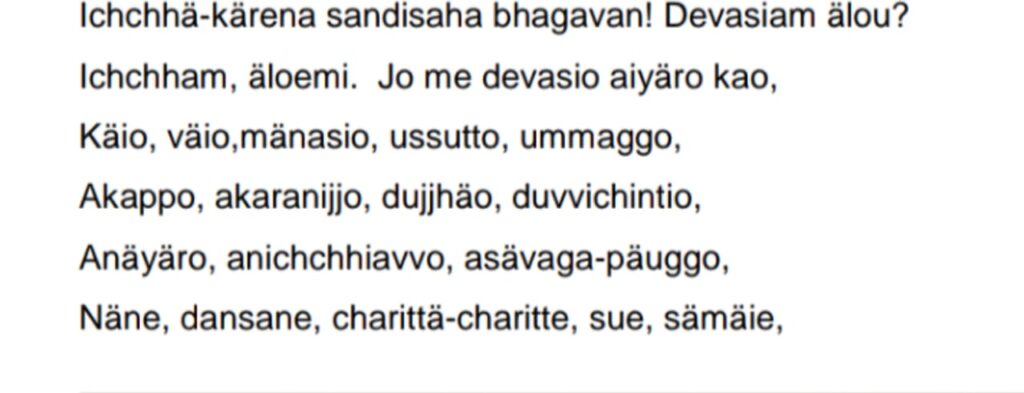

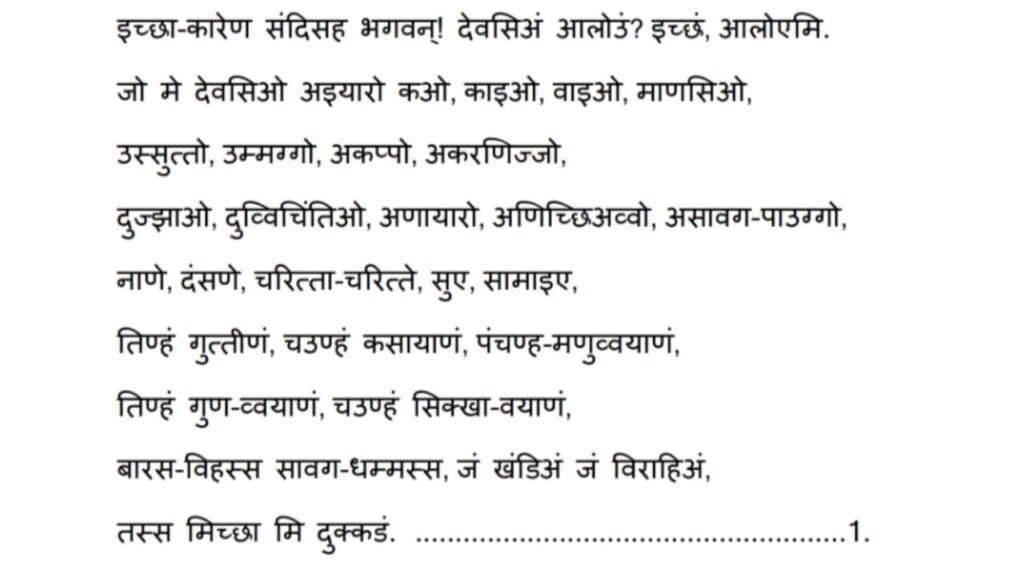
Meaning :
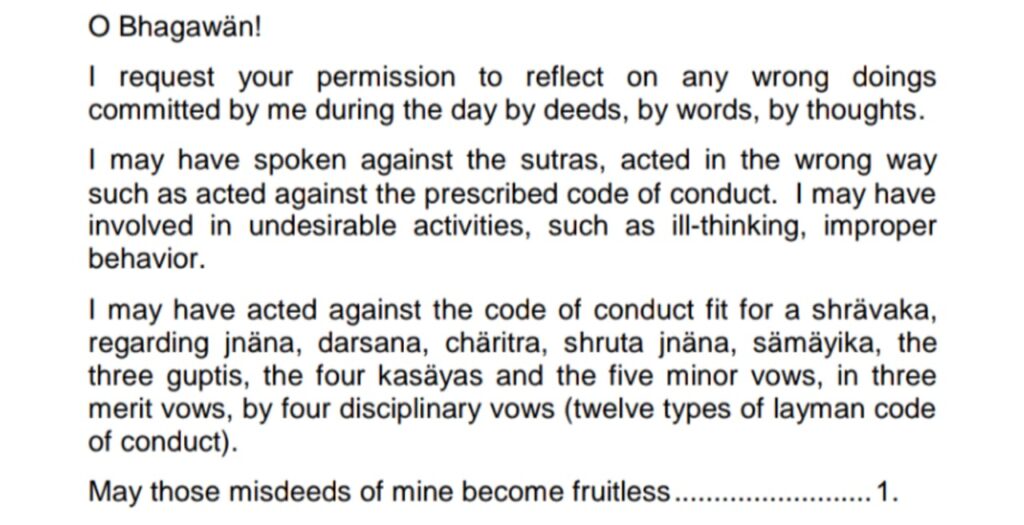
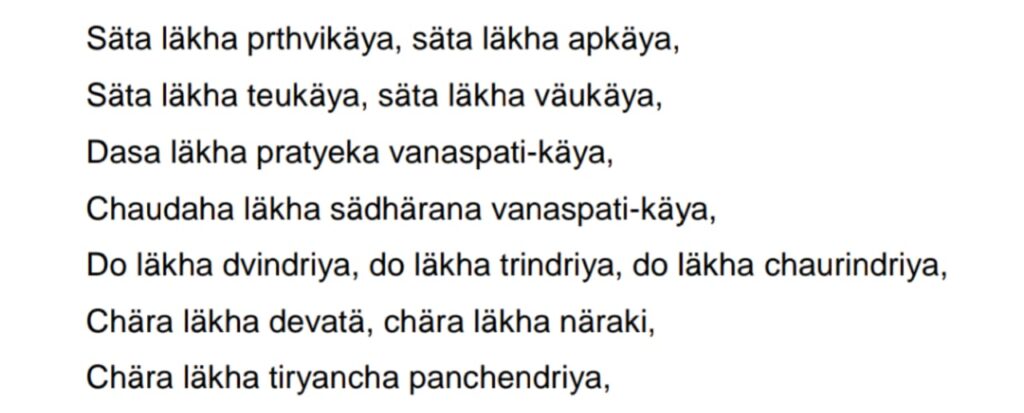
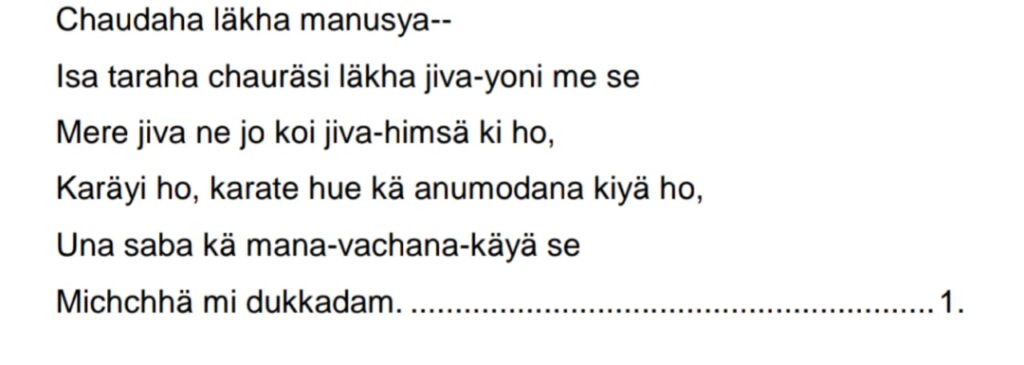
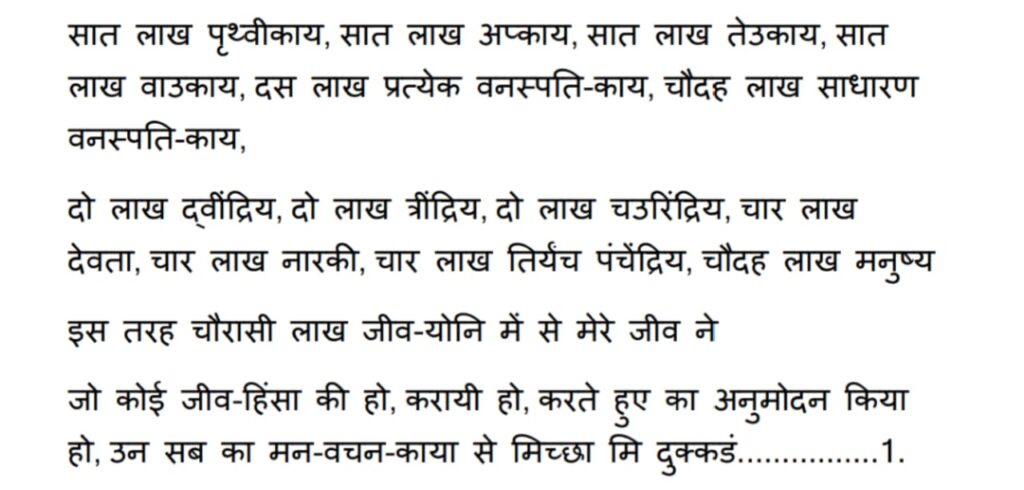
Meaning :
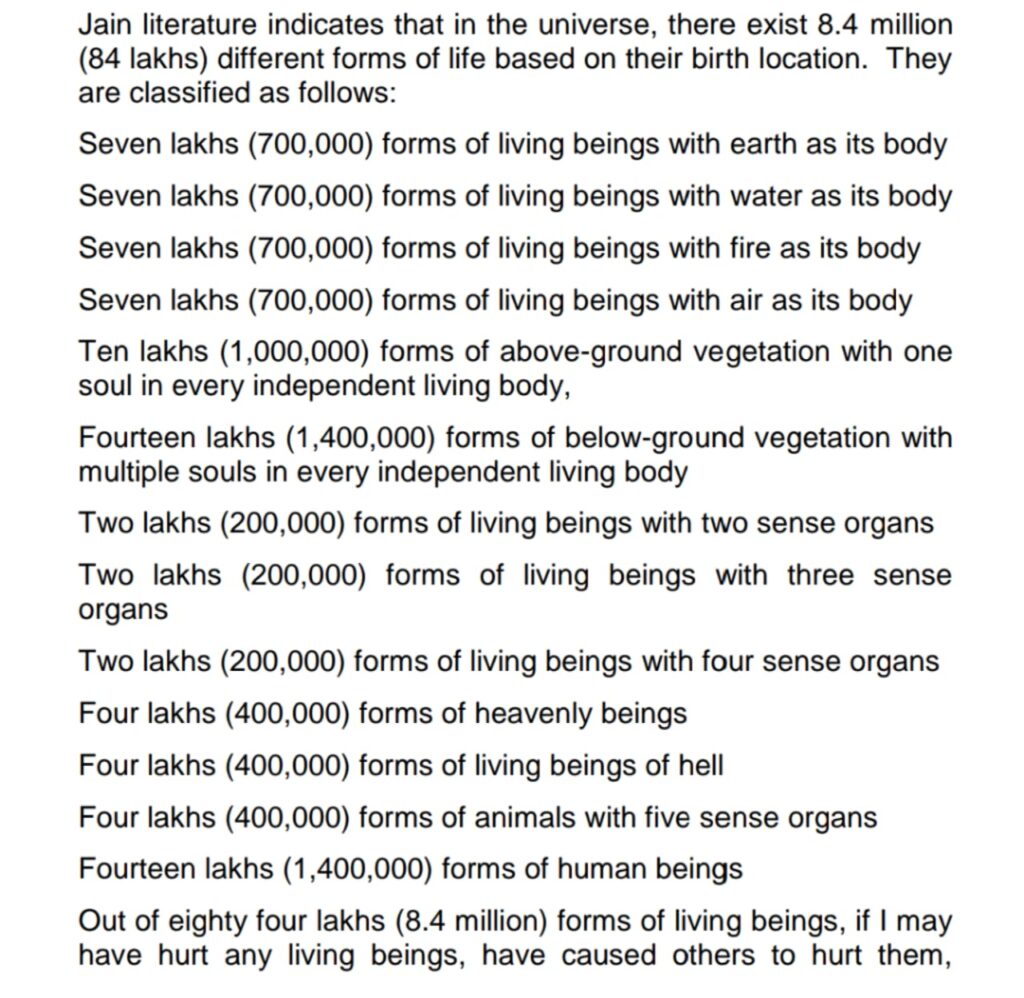

pahele pränätipäta, bije mrushäväda,
trije adattädäna, chauthe maithuna,
pänchame parigraha, chhathe krodha,
sätme mäna, äthme mäyä,
navme lobha, dashme räga,
agyärme dvesha, bärme kalaha,
terame abhyäkhyäna, chaudame paishunya,
panderame rati-arati, solame para-pariväda,
saterame mäyä-mrushä-väda, athärame mithyätva-shalya;
ae athära, päpasthänakamahen, mahäre jive, je koi papa
sevayun hoi, sevrävyun hoi, sevatän pratye anumodhyu hoi, te
savi hun mane, vachane käyae kari, michchhämi dukkadam.
पहला प्राणातिपात, दूसरा मृषावाद, तीसरा अदत्ता-दान,
चौथा मैथुन, पांचवां परिग्रह, छठा क्रोध, सातवां मान,
आठवां माया, नौवां लोभ, दसवां राग, ग्यारहवां द्वेष,
बारहवां कलह, तेरहवां अभ्याख्यान, चौदहवां पैशुन्य,
पन्द्रहवां रति-अरति, सोलहवां पर-परिवाद, सत्रहवां
माया-मृषा-वाद, अठारहवां मिथ्यात्व-शल्य–
इन अठारह पाप-स्थानोंमें से मेरे जीव ने जिस किसी पाप का सेवन
किया हो, कराया हो, करते हुए का अनुमोदन किया हो,
उन सब का मन-वचन-काया से मिच्छा मि दुक्कडं………...........1.
Meanings :
First comes killing (pränätipäta or himsä), second is lying
(mrushäväda),
third is stealing (adattädäna), fourth is unchastity (abrahma or
maithuna),
fifth is acquisitiveness (parigraha), sixth is anger (krodha),
seventh is pride (mäna), eighth is deceit (mäyä),
ninth is greed (lobha) tenth is attachment (räga),
eleventh is hatred (dwesha), twelfth is disputation (kalaha),
thirteenth is false accusation (abhyäkhyäna), fourteenth is
backbiting (paishunya),
ifteenth is pleasure-displeasure ( rati-arati), sixteenth is slander
(para-pariväda or nindä),
seventeenth is deceitful speech (mäyä-mrushävada) and eighteenth
is false belief, belief in wrong god, teacher and religion
(mithyätva).
f I have indulged or have promoted or encouraged any such sinful
act by others or praised the person who has committed any one of
these eighteen categories of sin, either mentally, verbally or
physically, may those sinful deeds be forgiven and become
fruitless.
Utility: This sutra describes how the evil karmas of the eighteen type are accumulated and Pardon is sought for such evils thus accumulated.
Object: To contemplate and ask forgiveness for 18 categories of sins.
savvassa vi devasia
duchchintia, dubbhasia, duchchitthia,
ichchha-karena sandisaha bhagavan ! ichchham,
tassa michchha mi dukkadam………………...........1
सव्वस्स वि देवसिअ
दुच्चिंतिअ ,दुब्भासिअ, दुच्चिट्ठिअ ,
इच्छा-कारेण संदिसह भगवान् ! इच्छं ,
तस्स मिच्छा मि दुक्कडं.........................१
Meaning :
Oh bhagawana! kindly give me the permission voluntarily to perform the pratikramana of all the faults committed during the day by evil thoughts, evil talks and evil deeds. i accept your orders. those misdeeds of mine may become fruitless .....................1.
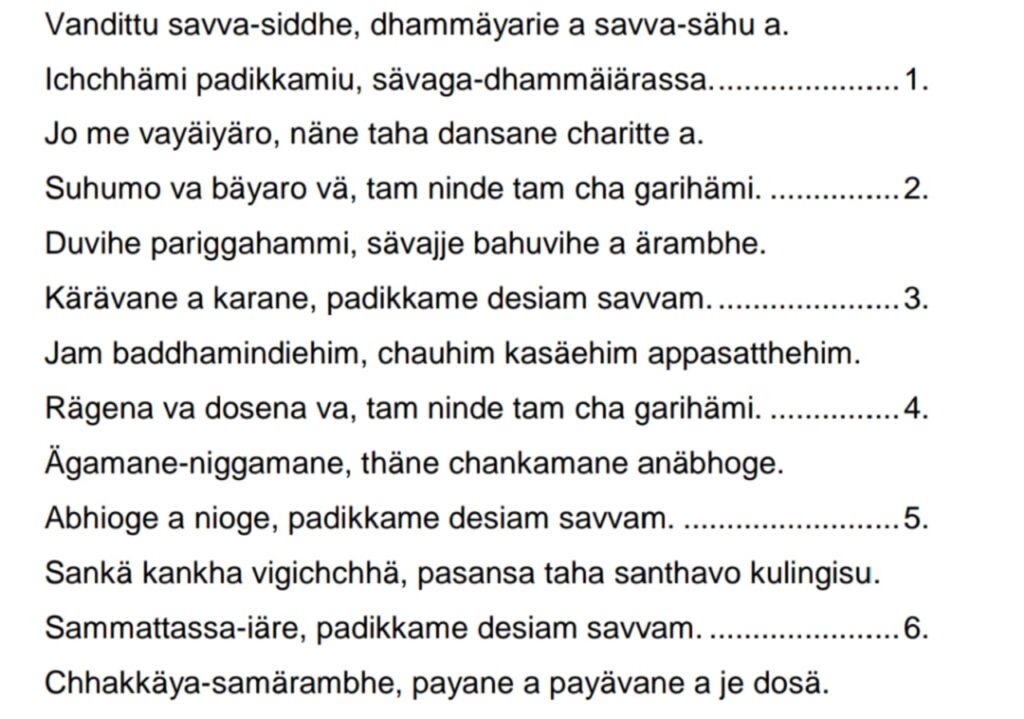
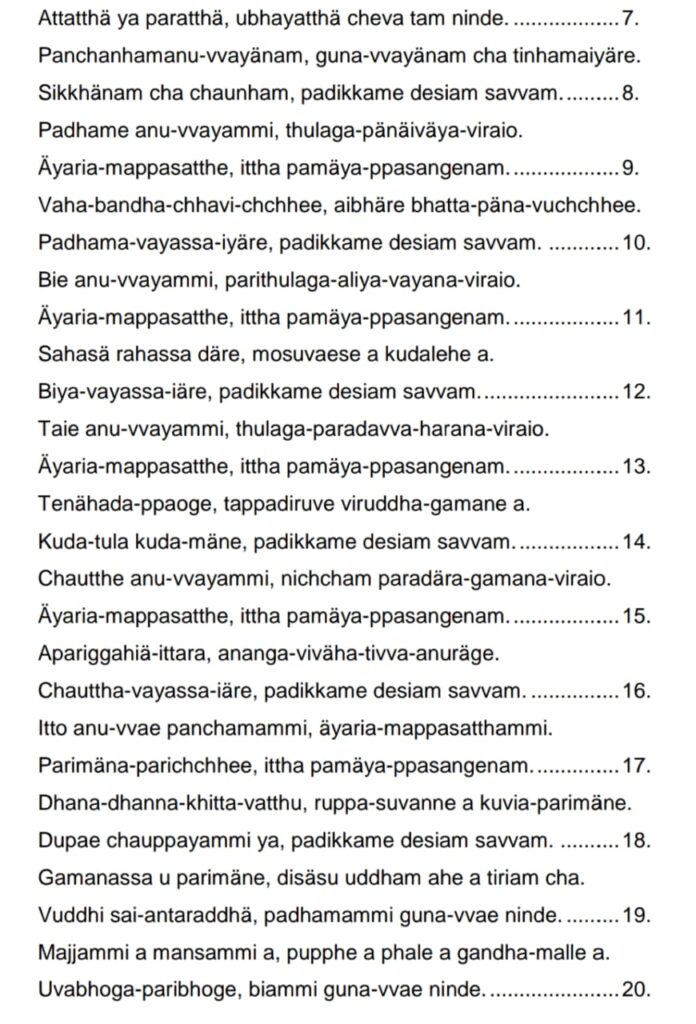
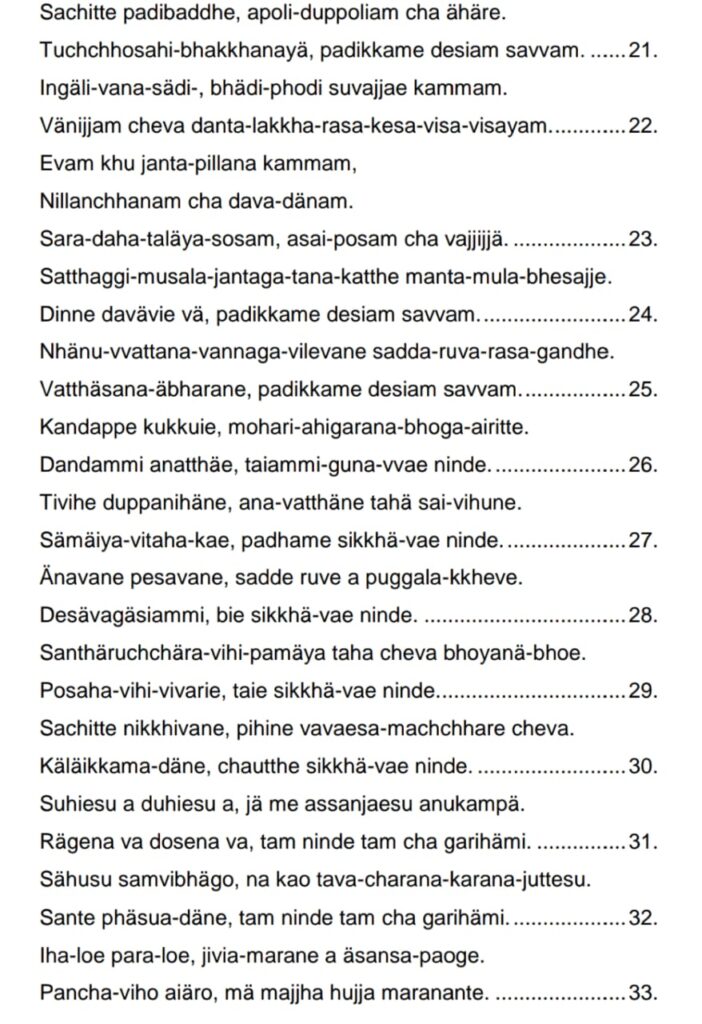
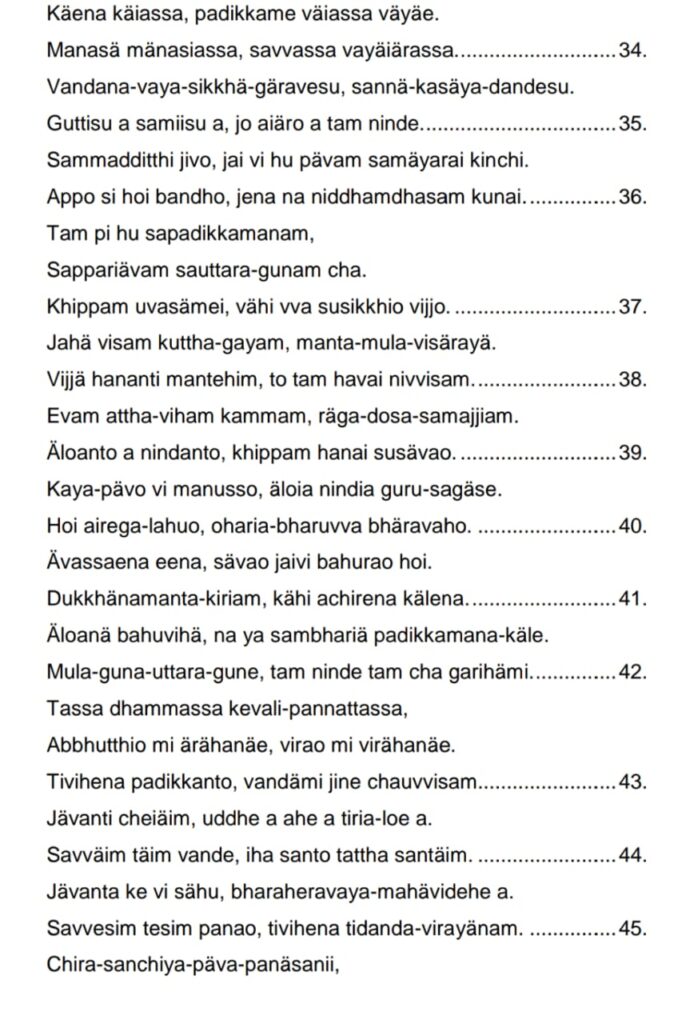
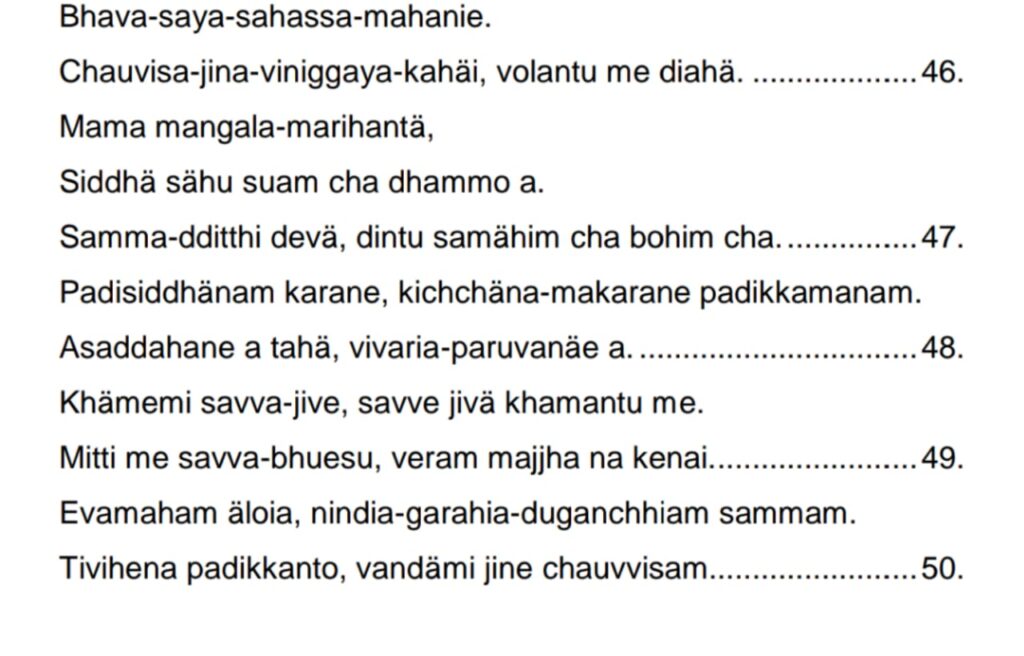
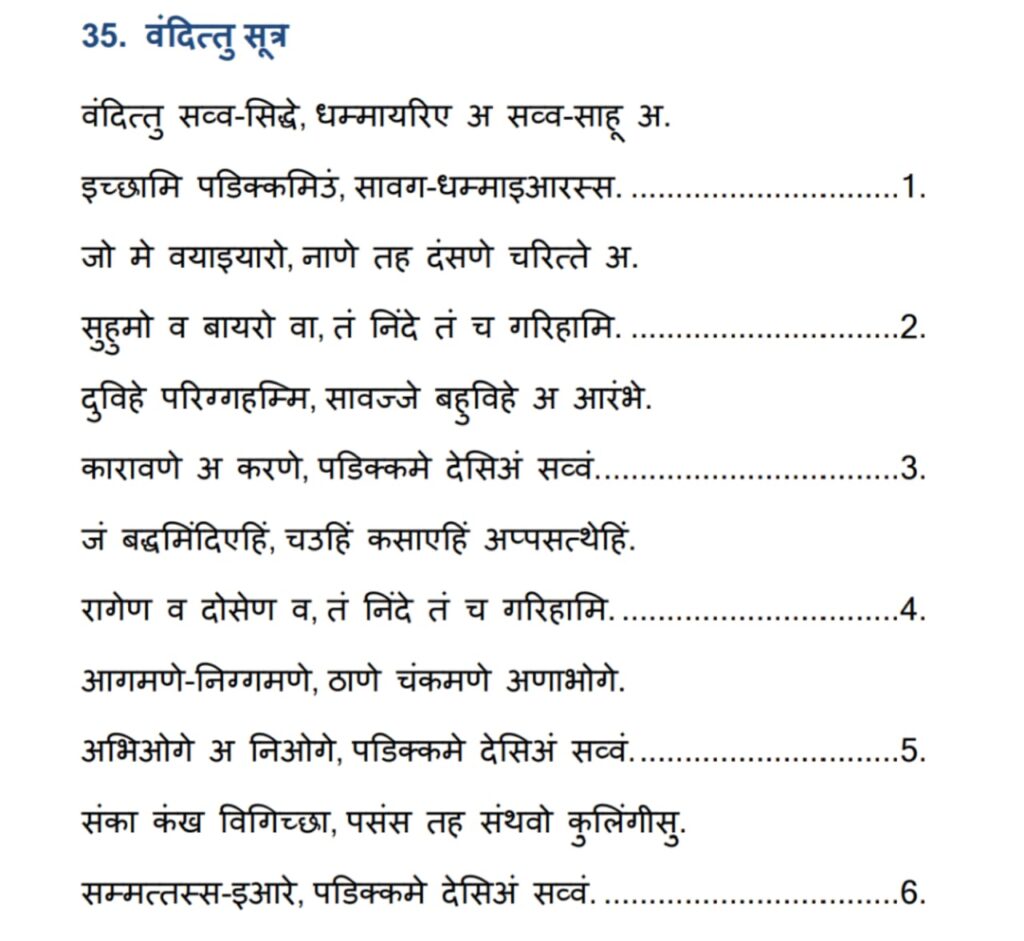
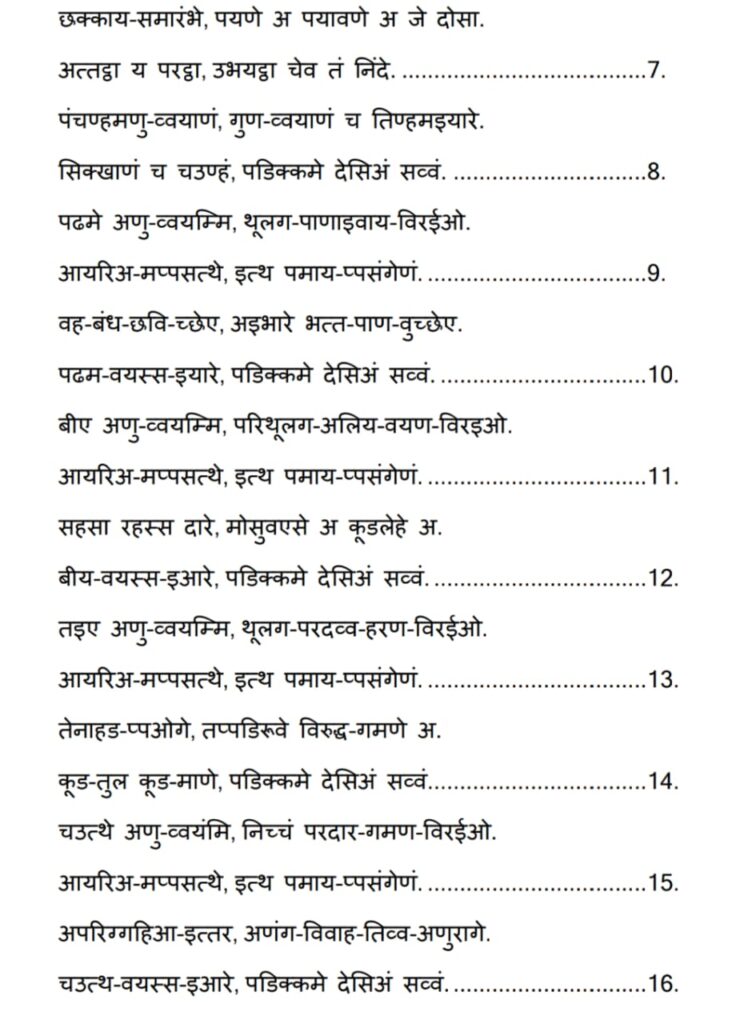
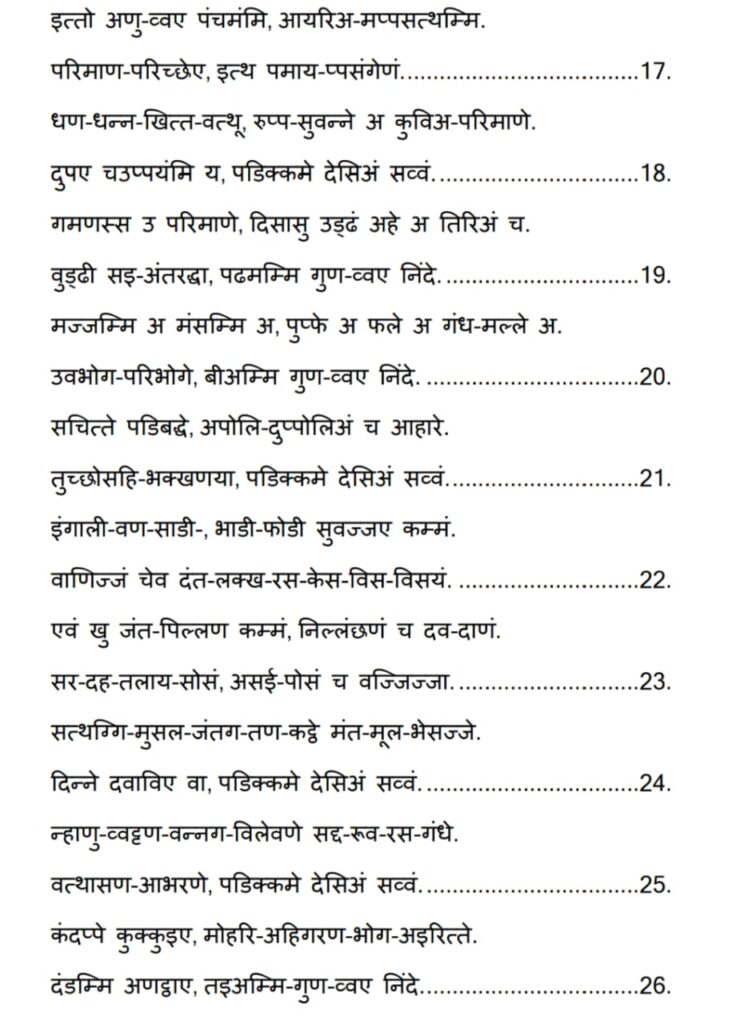
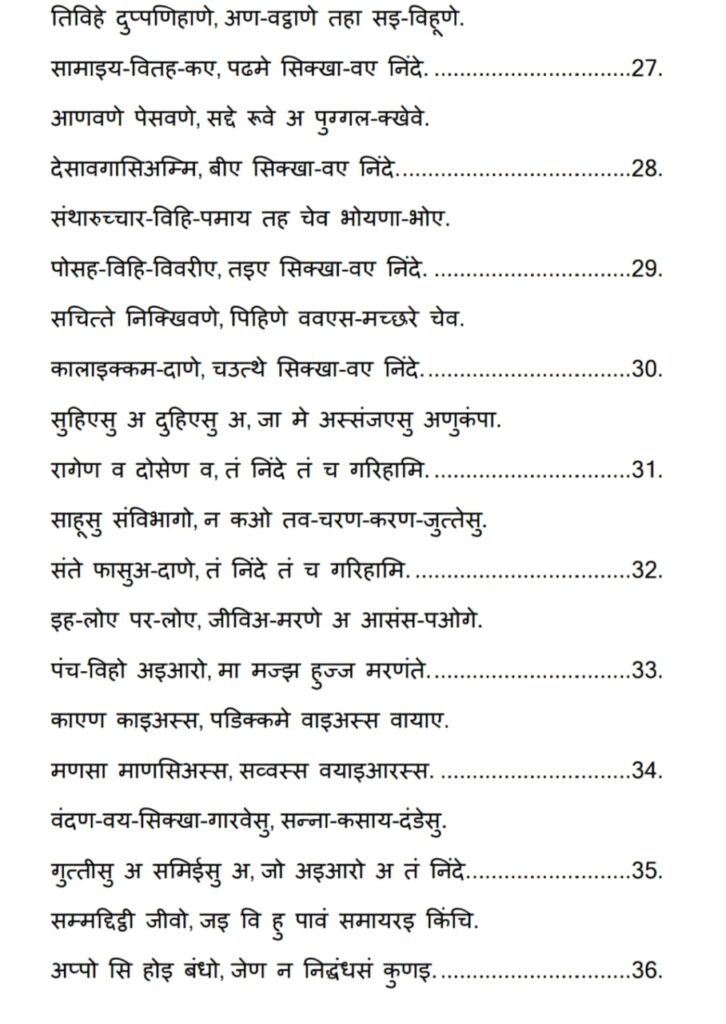
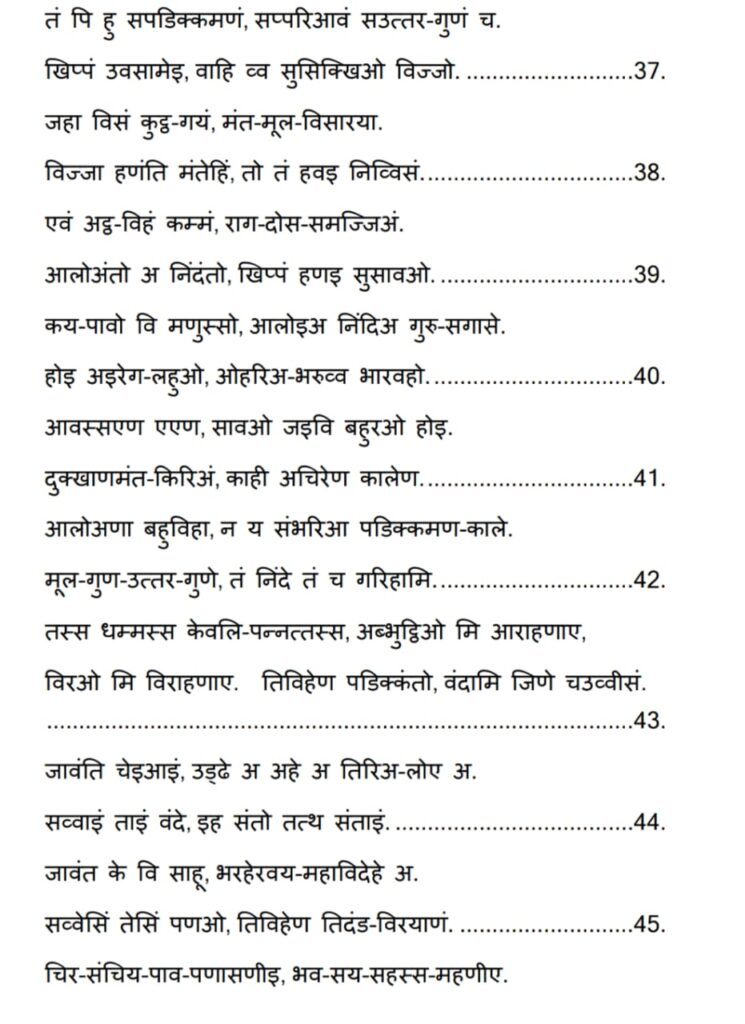
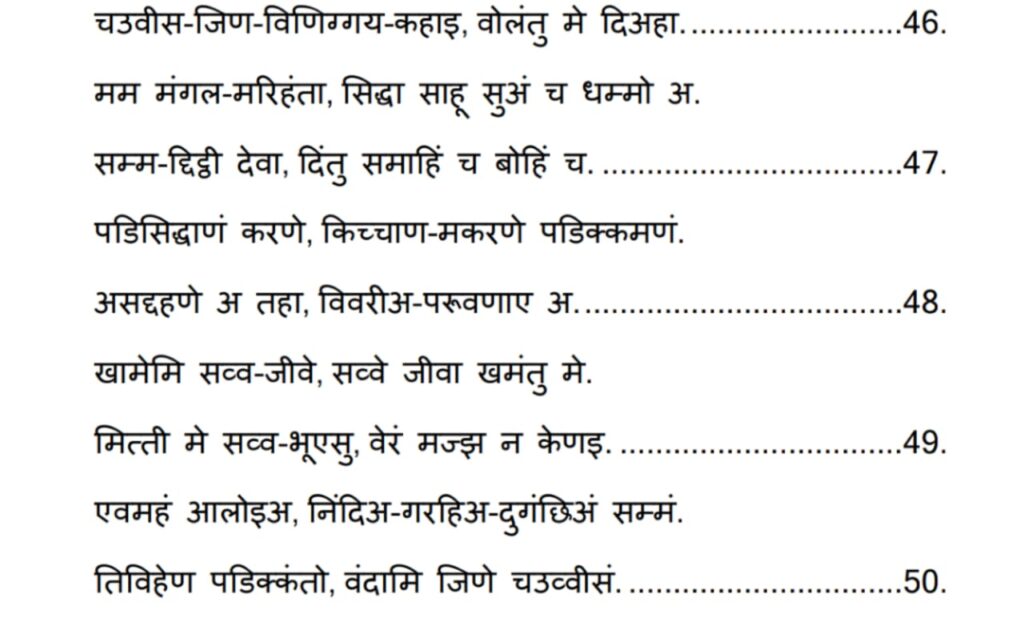
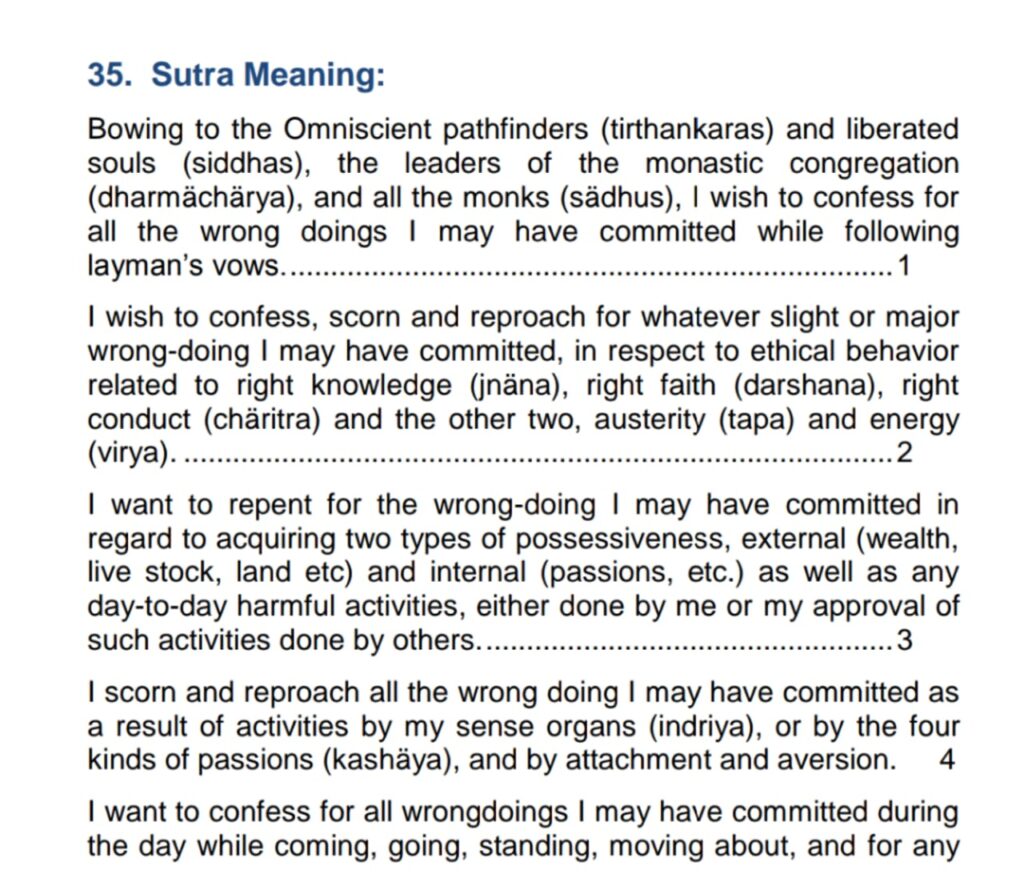
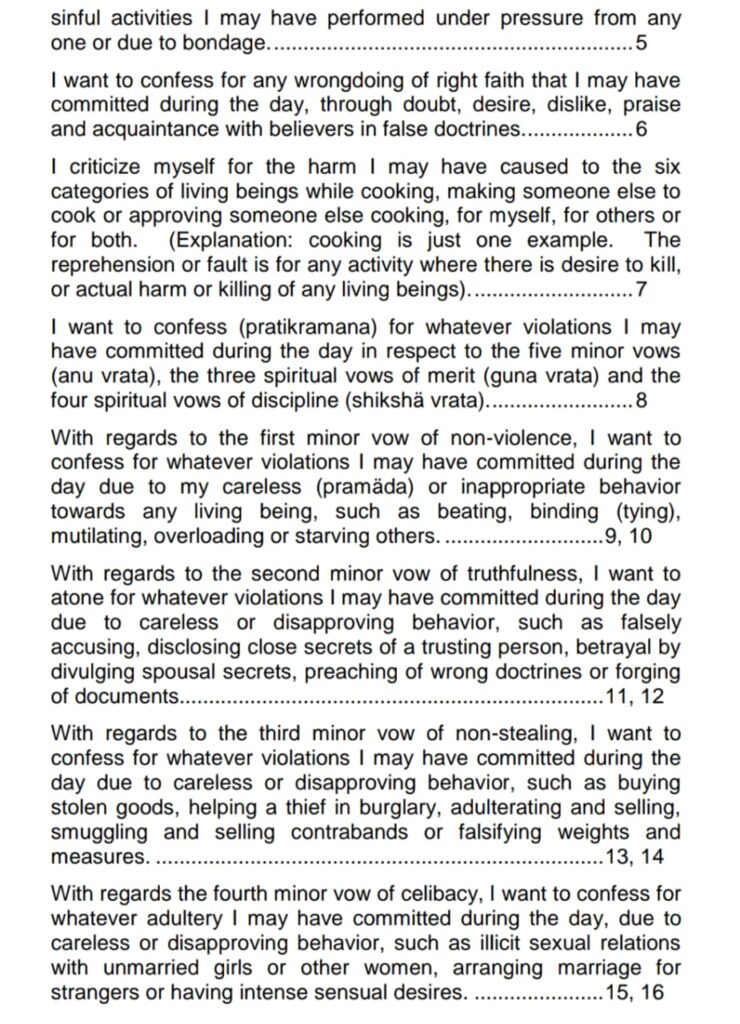
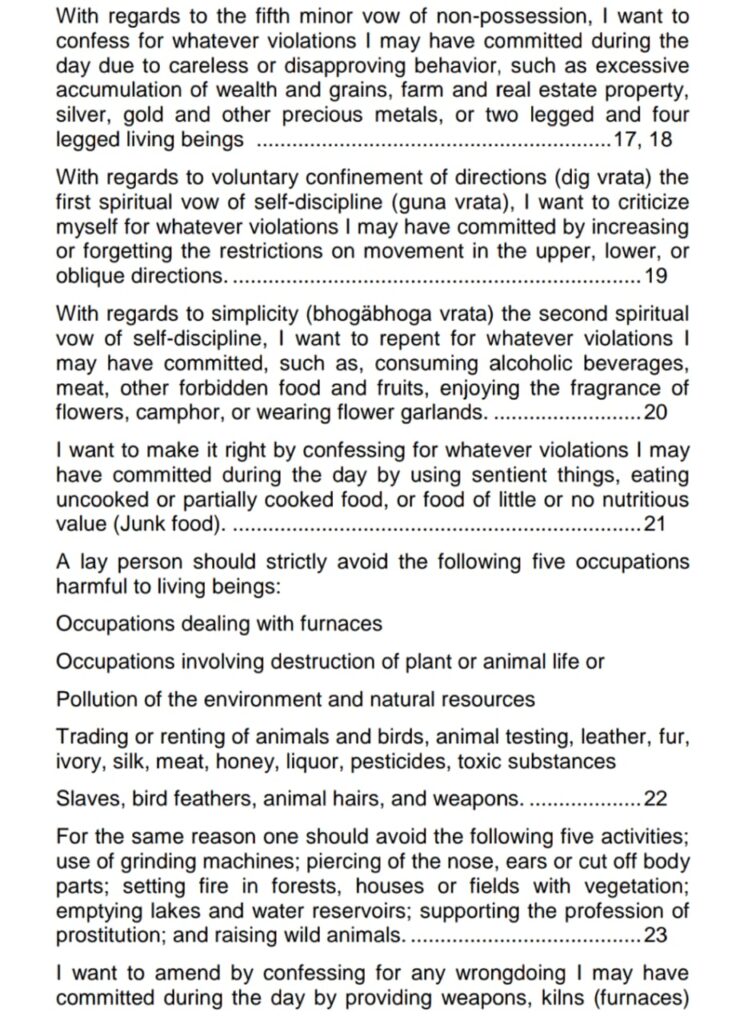
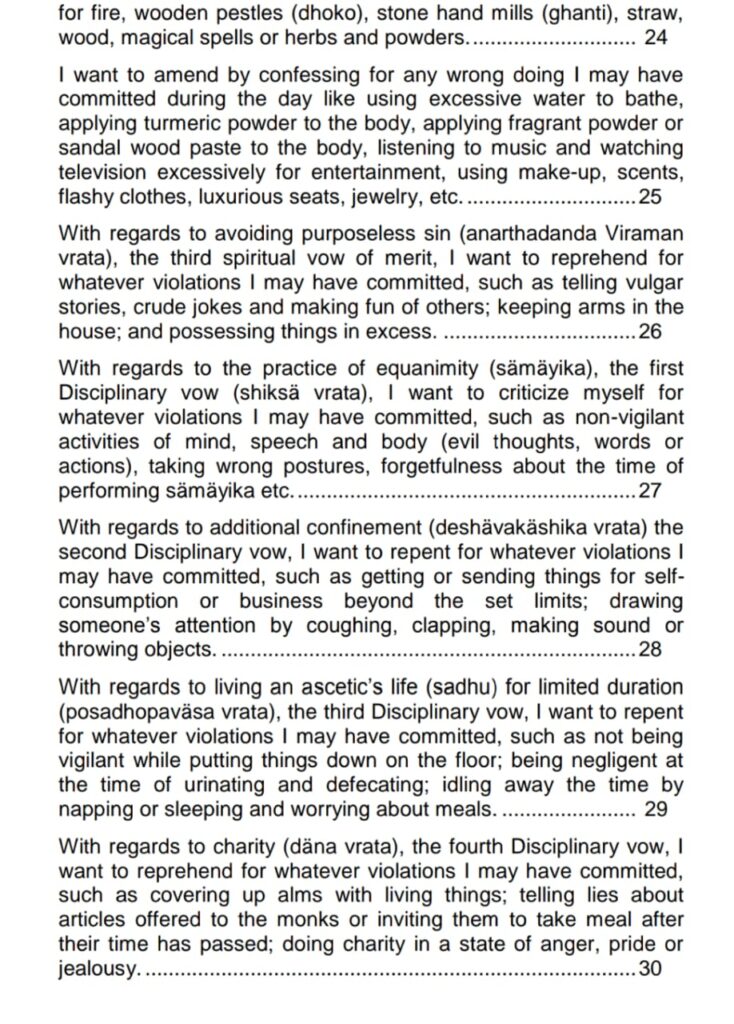
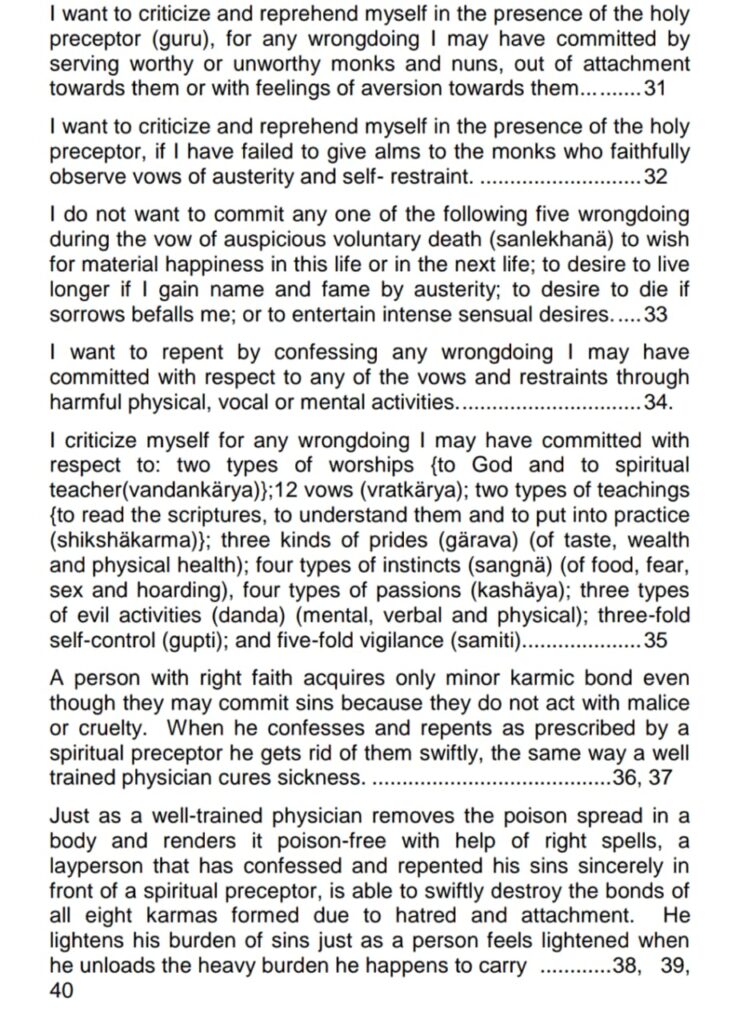
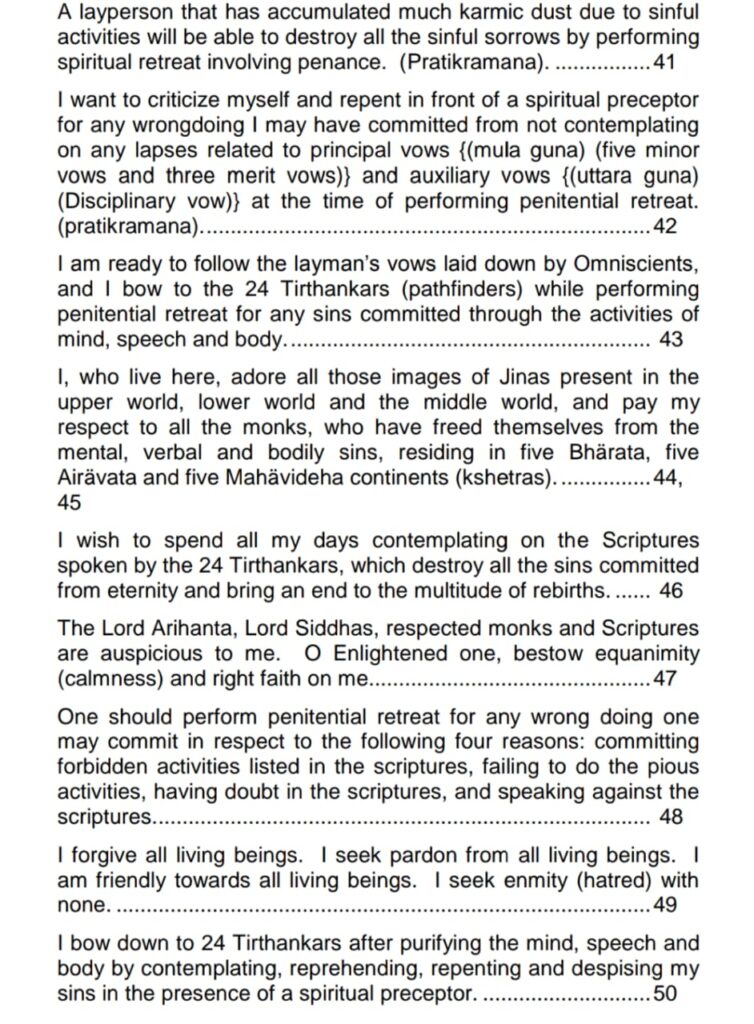
äyaria-uvajjhäe, sise sähammie kula-gane a.
je me kei kasäyä, savve tivihena khämemi. ...............1
savvassa samana-sanghassa, bhagavao anjalim karia sise.
savvam khamävaitta, khamämi savvassa ahayam pi. ................2
savvassa jiva-räsissa, bhävo dhamma-nihia-nia-chitto.
savvam khamävaitta, khamämi savvassa ahayam pi. .................3
आयरिय-उवज्जाए, सीसे साहम्मिए कुल-गणे अ .
जे मे केइ कसाया, सव्वे तिविहेण खामेमि...............१
सव्वस्स समण-संघस्स, भगवओ अंजलि करिअ सीसे ,
सव्वं खमावइत्ता , खामामि सव्वस्स अहयं पि ................२
सव्वस्स जिव-रासिस्स, भावओ धम्म-निहिअ-निअ-चित्तो.
सव्वं खमावइत्ता, खमामि सव्वस्स अहयं पि .............................3.
Meanings :
With mind, speech and body, I beg for forgiveness for violations, I
may have committed due to passions, towards leaders of monastic
congregation, ascetic teachers, their disciples and members of their
congregation. 1
I respectfully ask for forgiveness from the entire ascetic
community for any wrongs I may have committed to them and
forgive them for any wrongs they may have committed onto me. 2
I respectfully ask for forgiveness from all living beings for any
wrongs I may have committed to them and forgive them for any
wrongs they may have committed onto me. 3
Utility: In this sutra the soul regrets the unbecoming insulting behavior committed toward the Prevalent Acharyas,
upadhyayas and the whole group-‘Sangha’ and begs pardon.
suadevyäe karemi käussaggam annattha.
suadevayä bhagavai,
nänävaraniya kamma sanghäyam,
tesim khaveu sayayam,
tesim suasäyare bhatti.
सुअदेवयाए करेमी काउसग्गं अन्नत्थ ....
सुअदेवया भगवई, नाणावरणीय कम्म संघायं,
तेसिं खवेउ सययं , जेसिं सुअ सायरे भती
Meanings :
I stand in body-abandonment posture and offer my prayer to
Goddess of Learning, Sarasvati Devi. O Goddess of Learning!
Destroy the knowledge obscuring Karma (Jnänvarniya) of those
men who always worship the Holy Writ, the ocean of right
scriptural knowledge.
Object: Hymn of praise to Goddess of Learning Sarasvati Devi
आयरिय-उवज्जाए, सीसे साहम्मिए कुल-गणे अ.
जे मे केइ कसाया, सव्वे तिविहेण खामेमि..............१
सव्वस्स समण-संघस्स, भगवओ अंजलिं करिअ सीसे ,
सव्वं खमाव् इत्ता ,
खामामि सव्वस्स अहयं पि ......२
सव्वस्स जिवरासिस्स, भावओ
Meanings :
When religious ceremonies, are performed by monks under the
protection of Guardian Deity of Space (Kshetra Devi), will always
lead us all to happiness..
Object: Hymn of praise to Guardian Deity of Space (Kshetra
Devatä)
kamala-dala-vipula-nayanä, kamala-mukhi kamala-garbha-sama-gauri.
kamale sthitä bhagvati, dadätu shruta-devtä siddhim...............................1.
कमल-दल-विपुल-नयना, कमल-मुखी कमल-गर्भ-सम-गौरी.
कमले स्थिता भगवती, ददातु श्रुत-देवता सिद्धिम्...................१.
Meanings :
Goddess (Bhagavati) Sarasvati, whose eyes have wide oval shape
like a lotus petal, face like a lotus flower, complexion as fair as the
middle part of the lotus flower and sits on the lotus, grant me the
ultimate release.
Object: Hymn of praise to Goddess of Learning.
bhavanadevayäe karemi kaussaggam, gnänädigunyutänäm,
nityam swädhyäyasamyamaratänäm; viddhätu bhavanadevi,
shivam sadä sarva sädhunäm.
भवनदेवयाये करेमि काउसग्गं ,
ज्ञानादिगुणयुतानां ,
नित्यं स्वाध्यायसंयमरतानामः विद्धातु भवनदेवी ,
शिवं सदा सर्वसाधुनाम
Meanings :
I stand in body-abandonment posture to worship the Mansion
Dwelling Goddess (Bhavana Devatä). Bhavana Devi is always
benefactor to monks with right knowledge etc., and those who
practice restraints (sayama) and give religious discourses
yasyäh kshetram samäshritya, sädhubhih sädhyate kriä;
sä kshetradevatä nityam, bhuyännah sukha däyini.
यस्याः क्षेत्रं समाश्रित्य ,
साधुभिः साध्यते क्रिया
सा क्षेत्र -देवता नित्यं
भूयान्नः सुख दायिनी
Meanings
When religious ceremonies, are performed by monks under the
protection of Guardian Deity of Space (Kshetra Devi), will always
lead us all to happiness..
Utility: By this sutra salutation are offered to 170 tirthankars become in highest numbering. This Sutra is recited by males.
namostu varddhamänäya,
sparddhamänäya karmanä.
tajjayä-väpta-moksäya,
paroksäya kutirthinäm…………………………………………………………………… .1.
yesäm vikacä-ravinda-räjyä,
jyäyah krama-kamalä-valim dadhatyä.
sadrsairiti sangatam prasasyam,
kathitam santu siväya te jinendräh………………………………………………… .2.
kasäya-täpä-rdita-jantu-nirvrtim,
karoti yo jaina-mukhämbudod-gatah.
sa sukra-mäsodbhava-vrsti-sannibho,
dadhätu tustim mayi vistaro giräm………………………………………………….. .3.
नमोस्तु वर्द्धमानाय,
स्पर्द्धमानाय कर्मणा.
तज्जया-वाप्त-मोक्षाय,
परोक्षाय कुतीर्थिनाम्. .1.
येषां विकचा-रविन्द-राज्या,
ज्यायः क्रम-कमलावलिं दधत्या.
सदृशैरिति संगतं प्रशस्यं,
कथितं सन्तु शिवाय ते जिनेन्द्राः. .2.
कषाय-तापा-र्दित-जन्तु-निर्वृतिं,
करोति यो जैन-मुखाम्बुदोद्-गतः.
स शुक्र-मासोद्भव-वृष्टि-सन्निभो,
दधातु तुष्टिं मयि विस्तरो गिराम्. .3.
Meaning: I wish for permission from the spiritual preceptor, to pay my obeisance to forbearing monks (kshmäshramana). I pay my respect to the five supreme beings, Arihanta, Siddha, Ächärya, Upädhyäya and Sädhus.
I pay my obeisance to Lord Mahävira, who after winning a constant struggle with karmas, achieved liberation, which is beyond the comprehension of wrong believers. …1.
Let the Peaceful liberators always be our benefactors. They have feet, which are soft like lotus flowers, therefore when they walk, their feet land on the golden lotuses created by heavenly gods. ……… .2.
Let the words of Tirthankars, which are like first heavy rainfall at the beginning of monsoon season, spoken through the mouth of chief disciple (gandhara); bring peace and tranquility to me………………………… 3.
Utility: This sutra is a prayer offered to the virprbhu, all the tirthankaras and Jinvani and is Recited at Devasai pratikramana
vishäla lochana dalam, prodyadantänsu kesaram; prätarvira
jinendrasya, mukha padmam punätu vah. 1
yeshämabhisheka karma kritvä, mattä harsha bharät sukham
surendräh; trunamapi ganayanti naiva näkam, prätah santu
shiväya te jinendräh. 2
kalanka-nirmukta-mamukta purnatam, kutarka rähu grasanam
sadodayam; apurva chandram jinachandrabhäsitam; dinä game
naumi budhair namaskratam. 3
प्रातर्वीर-जिनेन्द्रस्य, मुख-पद्मं पुनातु वः .......1.
येषामभिषेक-कर्म कृत्वा,
तृणमपि गणयन्ति नैव नाकं,
कलंक-निर्मुक्त-ममुक्त-पूर्णतं,
अपूर्व-चन्द्रं जिन-चन्द्र-भाषितं,
Meaning :
Let Lord Mahävira be auspicious to all of us, whose face in the
morning resembles an open lotus flower, wide oval eyes
resembling petal of lotus and the shiny white teeth like the farina. 1
Let all the Lord Jineshwaras be auspicious to us in the morning,
whose bathing ceremony (ablution) performed by Kings of
heavenly Gods bring them incomparable joy than life in heaven. 2
I pay my respect in the morning to the Holy Writ that is untainted,
ever perfect, fully manifested like a full moon and whose
brightness cannot ever be obscured by any entity. 3
Utility: This sutra prayer is offered to virprabhu all the tirthankars and Jinvani and is recited at Devasai pratikramana
Object: Hymn of Praise for Lord Omniscient after completing six
essential duties in morning penitential retreat (rai Pratikramana).
1. Introduction
Hymn of praise to Goddess of Learning Saraswati Devi.
2. सुअ-देवया स्तुति
सुअ-देवया भगवई, नाणा-वरणीय-कम्म-संघायं.
तेसिं खवेउ सययं, जेसिं सुअ-सायरे भत्ती....................................1.
3. Sua-Devayä Stuti
Sua-devayä bhagavai, nänä-varaniya-kamma-sanghäyam.
Tesim khaveu sayayam, jesim sua-säyare bhatti.....................1.
4. Sutra Meaning:
Saraswati Devi, Goddess of Learning, I stand in meditation and
offer my prayer to you.
Saraswati Devi!
Destroy the knowledge obscuring Karma (Jnänvarniya karma) of
devotees who have faith in the Scriptures, the ocean of
enlightened knowledge. ............................................................1.
1. Introduction
This is a prayer for a Goddess of the region (Bhavana Devatä)
requesting her to ward off obstacles and be helpful in the pursuit of
the three-fold path of knowledge, faith, and conduct (Jnan,
Darshan, Charitra) to salvation.
Men and Women in Pratikramana, such as Pakkhi and Sädhu
bhagavantas in devasia pratikramana during travelling (vihära)
utter this eulogy of the regional goddess.
2. यस्यााः क्षेत्रं स्तुति
यस्याः क्षेत्रं समाश्रित्य , साधुभिः साध्यते क्रिया .
सा क्षेत्र - देवता नित्यं , भूयान्नः सुख - दायिनी ..........................1.
3. Yasyäh Ksetram Stuti
Yasyäh ksetram samäsritya, sädhubhih sädhyate kriyä.
Sä ksetra-devatä nityam, bhuyännah sukha-däyini..................1.
4. Sutra Meaning:
May the goddess of the region always bestow happiness upon us
in whose area sadhus and sädhvis on the path of salvation are
performing religious rites...........................................................1.
1. Introduction
Hymn of praise to Goddess of knowledge (Saraswati)
This prayer describes the beauty of Saraswati Devi, who is full of
prosperity (Bhagavati).
2. कमल - दल स्तुति
कमल - दल - विपुल - नयना , कमल - मुखी कमल - गर्भ - सम - गौरी .
कमले स्थिता भगवती , ददातु श्रुत - देवता सिद्धिम् ....................................... 1 .
3. Kamala-Dala Stuti
Kamala-dala-vipula-nayanä,
Kamala-mukhi kamala-garbha-sama-gauri.
Kamale sthitä bhagavati,
Dadätu sruta-devatä siddhim....................................................1.
4. Sutra Meaning:
Venerable Saraswati Devi (goddess of knowledge), with large
eyes like a lotus petal, with face a like a lotus flower, with fair
complexion like the middle part of a lotus flower and seated on a
lotus, may bestow ultimate success ........................................1.
1. Introduction
The goddess of dwelling is requested to be helpful to
the ascetics in their pursuit of spiritual goal.
This eulogy of the goddess of dwelling is uttered in Pratikramana
such as Pakkhi and by sädhu bhagavantas in devasia
pratikramana during the travelling (vihära).
2. ज्ञानादि-गुण युतानां स्तुति
ज्ञानादि-गुण-युतानां , नित्यं स्वाध्याय-संयम-रतानाम्.
विदधातु भवन-देवी , शिवं सदा सर्व-साधूनाम्...................................1.
3. Jnänädi-Guna-Yutänäm
Jnänädi-guna-yutänäm, nityam svädhyäya-sanyama-ratänäm.
Vidadhätu bhavana-devi, sivam sadä sarva-sädhunäm................1.
4. Sutra Meaning:
The goddess of the dwelling may always take care of the welfare
of all sädhus pursuing knowledge and deeply engrossed in selfstudy and self-control................................................................1.
1. Introduction
Only men recite this stuti during Pratikraman. In the stuti by
praying goddess of region, we request her to remove any
obstacles that may occur during religious activity.
2. जीसे खित्ते साहू स्तुति
जीसे जीसे खित्ते साहू , दंसण - नाणेहिं चरण - सहिएहिं
साहति मुक्ख - मग्गं , सा देवि हरउ दुरिआई .............................1.
3. Jise Khitte Sahu Stuti
Jise khitte sāhū, daṁsaṇa-nāṇehiṁ caraṇa-sahiehiṁ
Sāhaṁti mukkha-maggaṁ, sā devi hara u duriāiṁ. ..................1.
4. Sutra Meaning:
The goddess of the region may ward off obstacles, in the area
where the Sädhus are striving on the path of salvation through
right faith, right knowledge, and right conduct.
1. Introduction
This sutra is also known as “Muni Vandan Sutra”. In this Sutra all
Sädhu and Sädhvi bhagavantas residing in the universe (in the
two and half continents as per Jain geography) are venerated.
Here the Sadhu Mahäräja’s 18000 aspects of conduct are adored.
2. अड्ढाइज्जेसु सूत्र
अड्दाइज्जेसु दीव-समुद्देसु , पनरससु कम्म-भूमीसु;
जावंत के वि साहू , रय-हरण-गुच्छ-पडिग्गह-धरा ........................... 1 .
पंच-मह-व्वय-धरा , अट्ठारस-सहस्स-सीलंग-धरा;
अक्खुया-यार-चरित्ता , ते सव्वे सिरसा मणसा , मत्थएण वंदामि ..................... 2 .
3. Addhäijjesu Sutra
Addhäijjesu diva-samuddesu, Panarasasu kamma-bhumisu;
Jävanta ke vi sähu, Raya-harana-guchchha-padiggaha-dharä.
..................................................................................................1.
Pancha-maha-vvaya-dharä, Atthärasa-sahassa-silanga-dharä;
Akkhuyä-yära-carittä, Te savve sirasä manasä, matthaena
vandämi.....................................................................................2.
4. 45. Sutra Meaning:
Any Sädhu or Sädhvi in the fifteen lands of activities of adhi dvipa
and oceans holding rajoharana, gucchaka and pätras .............1.
Observing five great vows, observing eighteen thousand aspects
of virtues (shila), observing uninterrupted code of conduct and
chäritra, I bow down to with body, mind and head ...................2.
1. Introduction
At the most 170 Tirthankars can be present simultaneously. They
are respected by remembering their physical complexion, which is
divided in 5 colors.
According to Jain geography, there exist 5 Bhärata, 5 Airävata and
5 Mahävideha continents.
Jains believe that one Tirthankara present at the same time in
each Bhärata and Airavata continent some times during 3rd and
4th era of the time cycle, thus 10 Tirthankaras are present in these
10 continents.
Each continent of Mahävideha has 32 territories, thus there are
(5x32) =160 territories of the 5 Mahävideha continents.
Jains also believe that in each territory of Mahävideha, one
Tirthankar may exist at the same time. Hence there may be 160
Tirthankaras in Mahävideha present at the same time.
Thus, there could be a maximum of (10+160) 170 Tirthankars
existing at the same time.
In the present time cycle, only during the time of Lord Ajitnath, our
second Tirthankar, were all 170 Tirthankars present
2. वर - कनक स्तुति
वर-कनक-शंख-विद्रुम- , मरकत-घन-सन्निभं विगत-मोहम्.
सप्तति-शतं जिनानां , सर्वामर-पूजितं वन्दे ....................................... 1.
3. Vara-Kanaka Stuti
Vara-kanaka-sankha-vidruma-,
Marakata-ghana-sannibham vigata-moham.
Saptati-satam jinänäm, Sarvämara-pujitam vande...................1.
4. Sutra Meaning:
I bow to 170 Tirthankars (passionless Pathfinders) who are devoid
of infatuation, adorned by all gods, and whose complexions are:
Yellow like pure gold,
White like a conch-shell,
Red like a coral,
Green like an emerald or
Black like rain-clouds. ...............................................................1.
1. Introduction
People of Nadol city were suffering from plague created by an evil
minded goddess. Agreeing to the request of the Jain community of
the city, Shri Mänadeva Suri composed this hymn or sutra to get
rid of the plague.
Shri Mänadeva Suri was blessed by Padmä, Jaya, Vijayä, and
Aparajita, the four goddesses. It is due to their mystic power the
city was saved from the disaster created by the plague.
In this hymn, Lord Shäntinätha is praised with many precious
qualities.
2. लघु-शान्ति स्तव
शान्तिं शान्ति-निशान्तं , शान्तं शान्ता-शिवं नमस्कृत्य.
स्तोतुः शान्ति-निमित्तं , मन्त्र-पदैः शान्तये स्तौमि ............................. 1.
ओमिति निश्चित-वचसे , नमो नमो भगवतेर्हते पूजाम् .
शान्ति-जिनाय जयवते , यशस्विने स्वामिने दमिनाम् .............................. 2.
सकलातिशेषक-महा-संपत्ति-समन्विताय शस्याय .
त्रैलोक्य-पूजिताय च , नमो नमः शान्ति-देवाय ........................................ 3.
सर्वामर-सुसमूह-स्वामिक-संपूजिताय न जिताय .
भुवन-जन-पालनोद्यत-तमाय सततं नमस्तस्मै ....................................... 4.
सर्व-दुरितौघ-नाशन-कराय सर्वाशिव-प्रशमनाय.
दुष्ट ग्रह-भूत-पिशाच-शाकिनीनां प्रमथनाय .......................................... 5.
यस्येति नाम-मन्त्र-प्रधान-वाक्योपयोग-कृत-तोषा.
विजया कुरते जन - हित - मिति च नुता नमत तं शान्तिम् .......................... 6.
भवतु नमस्ते भगवति! , विजये! सुजये ! परा - परैरजिते !.
अपराजिते! जगत्यां , जयतीति जयावहे! भवति ....................................... 7.
सर्वस्यापि च संघस्य , भद्र - कल्याण - मंगल - प्रददे!.
साधूनां च सदा शिव - सुतुष्टि - पुष्टि - प्रदे! जीयाः ..................................... 8.
भव्यानां कृत - सिद्धे!, निवृति - निर्वाण - जननि! सत्त्वानाम्.
अभय - प्रदान - निरते!, नमोस्तु स्वस्ति - प्रदे! तुभ्यम् ................................ 9.
भक्तानां जन्तूनां , शुभावहे! नित्यमुदयते ! देवि!.
सम्यग - दृष्टीनां धृति - रति - मति - बुद्धि - प्रदानाय ................................. 10.
जिन - शासन - निरतानां , शान्ति नतानां च जगति जनतानाम्.
श्री - संपत्कीर्ति - यशो - वर्द्धनि!, जय देवि! विजयस्व ............................... 11.
सलिला - नल - विष - विषधर - दुष्ट - ग्रह - राज - रोग - रण - भयतः .
राक्षस - रिपु - गण - मारि - चौरेति - श्वापदा - दिभ्यः ............................... 12.
अथ रक्ष रक्ष सुशिवं , कुरु कुरु शान्तिं च कुरु कुरु सदेति.
तुष्टिं कुरु कुरु पुष्टि , कुरु कुरु स्वस्तिं च कुरु कुरु त्वम् ................................ 13.
भगवति! गुणवति! शिव - शान्ति-तुष्टि-पुष्टि - स्वस्तीह कुरु कुरु जनानाम्.
ओमिति नमो नमो ह्राँ ह्रीँ ह्रूँ ह्र: , यः क्षः ह्रीँ फट् फट् स्वाहा .............................. 14 .
एवं-यन्नामाक्षर पुरस्सरं, संस्तुता जया-देवी.
कुरुते शान्तिं नमतां , नमो नमः शान्तये तस्मै ........................... 15.
इति पूर्व - सूरि - दर्शित - मन्त्र - पद - विदर्भितः स्तवः शान्तेः.
सलिलादि - भय - विनाशी , शान्त्यादि - करश्च भक्तिमताम् .................... 16.
यश्चैनं पठति सदा , शृणोति भावयति वा यथा - योगम्.
स हि शान्ति - पदं यायात् , सूरिः श्री-मान-देवश्च .................................... 17.
उपसर्गाः क्षयं यान्ति , छिद्यन्ते विघ्न - वल्लयः .
मनः प्रसन्नतामेति , पूज्यमाने जिनेश्वरे ................................................ 18.
सर्व - मंगल - मांगल्यं , सर्व - कल्याण - कारणम् .
मोक्षार्थम् सर्व जीवानाम् , जैनं जयति शासनम् ..................................... 19.
3. Laghu-Shänti Stava
Shäntim shänti-nishäntam, shäntam shäntä-sivam namaskrtya.
Stotuh shänti-nimittam, mantra-padaih shäntaye staumi. ........1.
Omiti nischita-vachase, namo namo bhagavaterhate pujäm.
Shänti-jinäya jayavate, yasasvine svämine daminäm. .............2.
Sakalätisesaka-mahä-sampatti-samanvitäya sasyäya.
Trailokya-pujitäya cha, namo namah shänti-deväya. ...............3.
Sarvämara-susamuha-svämika-sampujitäya na jitäya.
Bhuvana-jana-pälanodyata-tamäya satatam namas-tasmai. ...4.
Sarva-duritaugha-näsana-karäya sarväsiva-prasamanäya.
Dusta graha-bhuta-pisächa-säkininäm pramathanäya.............5.
Yasyeti näma-mantra-pradhäna-väkyopayoga-krta-tosä.
Vijayä kurute jana-hita-miti cha nutä namata tam shäntim.......6.
Bhavatu namaste bhagavati!, vijaye! Sujaye! Parä-parairajite!.
Aparäjite! Jagatyäm, jayatiti jayävahe! Bhavati. .......................7.
Sarvasyäpi cha sanghasya, bhadra-kalyäna-mangala-pradade!.
Sädhunäm cha sadä siva-sutusti-pusti-prade! Jiyäh. ...............8.
Bhavyänäm krta-siddhe!, nirvrti-nirväna-janani! Sattvänäm.
Abhaya-pradäna-nirate!, namostu svasti-prade! Tubhyam. .....9.
Bhaktänäm jantunäm, subhävahe! Nitya-mudyate! Devi!.
Samyag-drstinäm dhrti-rati-mati-buddhi-pradänäya. ................10.
Jina-säsana-niratänäm, shänti-natänäm cha jagati janatänäm.
Sri-sampat-kirti-yaso-varddhani!, jaya devi! Vijayasva. ............11.
Salilä-nala-visa-visadhara-dusta-graha-räja-roga-rana-bhayatah.
Räksasa-ripu-gana-märi-chaureti-sväpadä-dibhyah. ...............12.
Atha raksa raksa susivam, kuru kuru shäntim cha kuru kuru sadeti.
Tustim kuru kuru pustim, kuru kuru svastim cha kuru kuru tvam
..................................................................................................13.
Bhagavati! Gunavati! Siva-shäntiTusti-pusti-svastiha kuru kuru janänäm.
Omiti namo namo
Hrää hriä hruä hrah, yah ksah hriä phat phat svähä. ...............14.
Evam-yannämäksara-purassaram, sanstutä jayä-devi.
Kurute shäntim namatäm, namo namah shäntaye tasmai. ......15.
Iti purva-suri-darsita-mantra-pada-vidarbhitah stavah shänteh.
Salilädi-bhaya-vinäsi, shäntyädi-karascha bhaktimatäm..........16.
Yaschainam pathati sadä, srnoti bhävayati vä yathä-yogam.
Sa hi shänti-padam yäyät, surih sri-mäna-devascha................17.
Upasargäh ksayam yänti, chhidyante vighna-vallayah.
Manah prasannatämeti, pujyamäne jinesvare. .........................18
Sarva-mangala-mängalyam, sarva-kalyäna-käranam.
Mokshartham sarva jivänäm, jainam jayati säsanam ..................19.
4. Sutra Meaning:
I bow to Lord Shäntnäth, who is the abode of tranquility, is free
from defilement and has overcome all adversities; with sanctified
words I adore the Lord, the source of tranquility, for the sake of the
tranquility of the adorers. ..........................................................1
With the resounding sound of Aum let my repeated obeisance be
to the worship-worthy Lord Shäntinäth, the victorious, glorious,
and the Lord of the restrained...................................................2
Let repeated obeisance be to Lord Shäntinäth, who is adorable,
who is embedded with all extraordinary attributes, who is imbibed
with superb esteem and who is worshipped by all the three worlds...................................................................3
I salute you forever, O Lord Shäntinätha, who is always ready to
protect living beings of all three worlds, and who is worshiped and
undefeated by an entire assembly of celestial beings and their
rulers, the 64 Indras. .................................................................4
My salutations to you forever, Lord Shäntinätha, who destroys all
types of fears and calms down all calamities, including those
created by evil planetary gods (graha), ghosts, evil spirits
(pishächa) and witches (shäkini)...............................................5
I salute you Lord Shäntinätha; listening to your Mantra-like name
has repeatedly brought immense pleasure to Vijayä Devi, the
benefactor of those who adore her ........................................... 6
I salute you O Divine (Bhagavati)! Vijayä, Sujya, Ajita and
Aparajita, all four Goddesses who are undefeatable, always
victorious (Jayavaha) and helpful (Bhavati Devi), as strength of
your mystic mantra brings triumph on this world.
Bhagavati means Divine
Vijayä means Victorious in a special way
Sujya means victorious in an auspicious way
Ajita means Unconquerable
Aparajita means Undefeatable and
Bhavati means helpful..................................................7
The next eight (8 to 15) verses are in praise of Vijayä Devi
(Goddess of Victory).
I salute you, O Goddess! Who is beneficial and auspicious to
entire fourfold Jain congregation, and gives mental peace
(sutushti) and brings prosperity (pushti) to revered monks ......8
I salute you O Goddess! Bestower of peace and joy to worthy
living beings (bhavya jivas) by always looking after their wellbeing,
eager to extend fearlessness and bring them success. ...........9
O goddess, you are a well-wisher of the devotees and always
eager to provide patience, affection, intelligence and wisdom to
those embedded with the right faith.
Oh Goddess! Benefactor to devotees, and always eager to provide
patience, affection, intelligence and wisdom to the people with
right faith, and the followers of Jain religious order. Be victorious
Jayadevi; you provide grace, wealth, fame and glory to the people
in the world, who stay by the Jain order and who bow to Lord
Shäntinäth............................................................................ 10, 11
O Goddess! Protect us from fear of flood, fire, poison, snakes, evil
planetary gods, kings, wars, demons (räkshasha), plagues,
robbers, wild animals, ghosts, evil spirits and witches; Now
protect, please protect; extend bliss and tranquility; do that
incessantly; extend contentedness, spiritual nourishment, strength
and prosperity.………………………………….. .................... 12, 13
Oh Graceful Goddess with high attributes, extend well-being,
peace, contentedness, spiritual nourishment and bliss to the
people; I bow to you with the sacred sounds of Hram, Hrim,
Hroom, Hrah, Yah, Kshah Hrim, Phoot, Phut, Swähä. ............13
Oh divine! Virtuous! Goddess Jayä! Be our benefactor, protector
and bestow peace, strength and contentedness on us. I bow to
you with the sacred sounds of “Om, namo, namo, hräm, hrim,
hrum, rah yah kshah hrim, phat-phat swähä”. Thus adored by the
above Mantra Jayädevi extends tranquility to those who bow to
Lord Shäntinäth. Let repeated obeisance be to that Lord Shäntinäth................................................................ 14, 15
This way, as shown by our spiritual teachers of the past, the hymn
of praise of Lord Shäntinätha, composed with sacred letters, is the
destroyer of all fears and brings peace to the devotees ........... 16
Any person, who recites, listens and contemplates on this hymn
every day may very quickly achieve eternal peace. May the
composer of this hymn, Ächärya Shri Mänadev Suri, also achieve
eternal peace. ...........................................................................17
Afflictions come to an end, the creepers of obstacles are uprooted
and the mind is delighted through the virtue of worshipping the
omniscient Lord......................................................................... 18
Jain philosophy and its practice are auspicious and the cause of
all spiritual prosperity. It wishes that all living beings attain
liberation....................................................................................19
1. Introduction
This hymn, in praise of Lord Pärshvanätha, is recited while
performing Pratikramana.
2. चउक्कसाय सूत्र
चउक्कसाय - पडिमल्लुल्लूरणु , दुज्जय - मयण - बाण - मुसुमूरणु.
सरस-पियंगु-वन्नु गय-गामिउ , जयउ पासु भुवण-त्तय-सामिउ ........................ 1 .
जसु तणु - कंति - कडप्प - सिणिद्धउ , सोहइ फणि - मणि - किरणा - लिद्धउ.
नं नव - जल - हर - तडिल्लय - लंछिउ , सो जिणु पासु पयच्छउ वंछिउ ................. 2 .
3. Caukkasäya Sutra
Chaukkasäya-padimallulluranu,
Dujjaya-mayana-bäna-musumuranu.
Sarasa-piyangu-vannu gaya-gämiu,
Jayau päsu bhuvana-ttaya-sämiu.............................................1.
Jasu tanu-kanti-kadappa-siniddhau,
Sohai phani-mani-kiranä-liddhau.
Nam nava-jala-hara-tadillaya-lanchhiu,
So jinu päsu payachchhau vanchhiu. .......................................2.
4. Sutra Meaning:
Lord Pärshvanätha, the master of all three worlds, endowed with
golden complexion and with a gait like an elephant, destroyer of all
four passions and one who has cut apart the Cupid’s arrow, may
you be ever victorious ............................................................... 1
O Lord Pärshvanätha, your graceful body shines with rays emitted
by the jewel on the hood of the cobra covering your head and by
lightning accompanying the torrential rain; grant me that what I
desire. .......................................................................................2
1. Introduction
This sajjhäya (swädhyäya) is in praise of the extra-ordinary great
persons who lived in the past. It is recited during rai pratikramana
in the morning.
In this hymn, there are names of 53 virtuous men and 47 virtuous
women who in their lives have shown extra ordinary virtues and
have lived an ideal Jain life.
By reciting the names of such great men and women, we
remember their exemplary character so that it inspires us to bring
similar qualities to our life.
2. भरहेसर सज्झाय
भरहेसर बाहुबली , अभय कुमारो अ ढंढण कुमारो.
सिरिओ अण्णिआ उत्तो , अइमुत्तो नागदत्तो अ ............................ 1.
मेअज्ज थूलभद्दो , वयर रिसी नंदिसेण सीहगिरी .
कयवन्नो अ सुकोसल , पुंडरीओ केसी करकंडू ........................... 2.
हल्ल विहल्ल सुदंसण , साल महासाल सालिभद्दो अ .
भद्दो दसन्नभद्दो , पसन्नचंदो अ जसभद्दो ....................................... 3.
जंबु पहू वंकचूलो , गय सुकुमालो अवंति सुकुमालो .
धन्नो इलाइ पुत्तो , चिलाइ पुत्तो अ बाहुमुणी ................................... 4.
अज्ज गिरी अज्ज रक्खिअ , अज्ज सुहत्थी उदायगो मणगो .
कालय सूरी संबो , पज्जुन्नो मूलदेवो अ .......................................... 5.
पभवो विण्हु कुमारो , अद्द कुमारो दढप्पहारी अ.
सिज्जंस कूरगडू अ , सिज्जंभव मेह कुमारो अ .......................... 6.
एमाइ महासत्ता , दिंतु सुहं गुण-गणेहिं संजुत्ता .
जेसिं नाम - ग्गहणे , पाव - प्पबंधा विलिज्जंति .............................. 7.
सुलसा चंदनबाला , मणोरमा मयणरेहा दमयंती .
नमया सुंदरी सीया , नंदा भद्दा सुभद्दा य ...................................... 8.
राइमई रिसिदत्ता , पउमावई अंजणा सिरिदेवी .
जिट्ठ सुजिट्ठ मिगावई , पभावई चिल्लणादेवी ................................ 9.
बंभी सुंदरी रुप्पिणी , रेवई कुंती सिवा जयंती य .
देवई दोवई धारणी , कलावई पुप्फचूला य ................................... 10.
पउमावई य गोरी , गंधारी लक्खमणा सुसीमा य .
जंबूवई सच्चभामा , रुप्पिणी कण्हट्ठ महिसीओ ................................ 11.
जक्खा य जक्खदिन्ना , भूआ तह चेव भूअदिन्ना य .
सेणा वेणा रेणा , भइणीओ थूलभद्दस्स .......................................... 12.
इच्चाइ महा-सईओ , जयंति अकलंक - सील - कलिआओ .
अज्ज वि वज्जइ जासिं , जस - पडहो तिहुअणे सयले ................................... 13.
3. Bharahesara Sajjhäya
Bharahesara bähubali, abhaya kumäro a dhandhana kumäro.
Sirio anniä utto, aimutto nägadatto a. .......................................1.
Meajja thulabhaddo, vayara risi nandisena sihagiri.
Kayavanno a sukosala, pundario kesi karakandu. ...................2.
Halla vihalla sudansana, säla mahäsäla sälibhaddo a.
Bhaddo dasannabhaddo, pasannachando a jasabhaddo. .......3.
Jambu pahu vankachulo, gaya sukumälo avanti sukumälo.
Dhanno iläi putto, chiläi putto a bähumuni................................4.
Ajja giri ajja rakkhia, ajja suhatthi udäyago manago.
Kälaya suri sambo, pajjunno muladevo a. ................................5.
Pabhavo vinhu kumäro, adda kumäro dadhappahäri a.
Sijjansa kuragadu a, sijjambhava meha kumäro a. ..................6.
Emäi mahäsattä, dintu suham guna-ganehim sanjuttä.
Jesim näma-ggahane, päva-ppabandhä vilijjanti......................7.
Sulasä chandanabälä, manoramä mayanarehä damayanti.
Namayä sundari siyä, nandä bhaddä subhaddä ya. ................8.
Räimai risidattä, paumävai anjanä siridevi.
Jittha sujittha migävai, pabhävai chillanädevi...........................9.
Bambhi sundari ruppini, revai kunti sivä jayanti ya.
Devai dovai dhärani, kalävai pupphachulä ya. .........................10.
Paumävai ya gori, gandhäri lakkhamanä susimä ya.
Jambuvai sachchabhämä, ruppini kanhattha mahisio..............11.
Jakkhä ya jakkhadinnä, bhuä taha cheva bhuadinnä ya.
Senä venä renä, bhainio thulabhaddassa. ...............................12.
Ichchäi mahä-saio, jayanti akalanka-sila-kaliäo.
Ajja vi vajjai jäsim, jasa-padaho tihuane sayale........................13.
4. Sutra Meaning:
King Bharata, Bähubali, Abhaya kumära, Dhandhana kumära,
Sriyaka, son of Arnikä, Atimukta, Nägadatta and ....................1.
Muni Metärya, Sthulabhadra, Vajra rsi, Nandisena, Sihagiri,
Krtapunya (Kayavannä), muni Sukosala, Pundarika, Kesi,
Karakandu and .........................................................................2.
Halla, Vihalla, Setha Sudarsana, Säla, Mahäsäla muni,
Sälibhadra, Bhadrabähu svämi, Dasärnabhadra, Prasannacandra
räjarsi, Yasobhadra suri and ....................................................3.
Jambusvämi, prince Vankacula, Gajasukumär, Avantisukur,
dhannä, son of iläci, son of ciläti, muni bähu and ....................4.
Ärya Mahägiri, Ärya Raksita, Ärya Suhasti Suri, Räjarsi Udäyana,
Manaka Kumära, Kälaka Suri, Sämba Kumära, Pradyumna
Kumära, King Muladeva and ....................................................5.
Prabhava Svämi, Visnu Kumära, Ärdra Kumära, Drdha Prahäri,
Sreyänsa, Kuragadu Muni, Sayyambhava Svämi and Megha
Kumära .....................................................................................6.
Such great persons possessing great virtues may confer
happiness; by reciting whose names, the fetter of sins are
destroyed. .................................................................................7.
Sulasä, Candanabälä, Manoramä, Madanarekhä, Damayanti,
Narmadä Sundari, Sitä, Nandä, Bhadrä, Subhadrä and .........8.
Räjimati, Rsidattä, Padmävati, Anjanä Sundari, Sridevi, Jyesthä,
Sujyesthä, Mrgävati, Prabhävati, Cellanä Devi and ................9.
Brähmi, Sundari, Rukmini, Revati, Kunti, Sivä, Jayanti, Devaki,
Draupadi, Dhärani, Kalävati, Puspaculä and ...........................10.
Padmävati, Gauri, Gändhäri, Laksmanä, Susimä, Jambuvati,
Satyabhämä And Rukmini-- these eight chief queens of sri krsna
and ...........................................................................................11.
Yaksä, Yaksadattä, Bhutä, Bhutadattä, Senä, Venä, and Renä--
(these seven) Sisters of Sthulabhadra, ....................................12.
Such great chaste women observing pure celibacy without blemish
attain victory and their drums of glory reverberates even this day in
all three worlds..........................................................................13.
1. Introduction
This sutra describes the 36 essential duties of a layperson.
As described in this hymn all recommendations are selfexplanatory and easy to understand.
Since a layperson does not give up worldly possessions
completely, these activities should be performed as they are
beneficial to one-self.
They help a person to become righteous and bring equanimity.
Other people who are in close contact with them will also be
attracted to join the congregation.
2. मन्जह जिणाणं सज्झाय
मन्नह जिणाणमाणं , मिच्छं परिहरह , धरह सम्मत्तं .
छव्विह - आवस्सयम्मि , उज्जुत्तो होइ पइ-दिवसं ...................1.
पव्वेसु पोसह-वयं , दाणं सीलं तवो अ भावो अ .
सज्झाय नमुक्कारो , परोवयारो अ जयणा अ ...........................2.
जिण-पूआ जिण-थुणणं , गुरु-थुअ साहम्मिआण वच्छल्लं .
ववहारस्स य सुद्धी , रह-जत्ता तित्य-जत्ता य ..............................3.
उवसम-विवेग-संवर , भासा-समिई छजीव-करुणा य .
धम्मिअ-जण-संसग्गो , करण-दमो चरण-परिणामो ........................4.
संघोवरि बहु-माणो , पुत्थय-लिहणं पभावणा तित्थे .
सड्ढाण किच्चमेअं , निच्चं सुगुरू-वएसेणं .....................................5.
3.Mannaha Jinänam Sajjhäya
Mannaha jinänamänam, michchham pariharaha,
Dharaha sammattam.
Chhavviha-ävassayammi, ujjutto hoi pai-divasam....................1.
Pavvesu posaha-vayam, dänam silam tavo a bhävo a.
Sajjhäya namukkäro, parovayäro a jayanä a............................2.
Jina-puä jina-thunanam, guru-thua sähammiäna vacchhallam.
Vavahärassa ya suddhi, raha-jattä tittha-jattä ya......................3.
Uvasama-vivega-samvara, bhäsä-samii chajiva-karunä ya.
Dhammia-jaṇa-saṁsaggo, karaṇa-damo caraṇa-pariṇāmo. ...4.
Saṁghovari bahu-māṇo, putthaya-lihaṇaṁ pabhāvaṇā titthe.
Saḍḍhāṇa kichchameaṁ, nichchaṁ sugurū-vaeseṇaṁ. .........5.
4. Sutra Meaning:
Recommendation of 36 worthy acts for a layperson.
(1) Follow Tirthankars’ preachings of Ahimsa, Anekantwad, and
non-possessiveness
(2) Give up any beliefs based on fear, greed, and glorification.
(3) Accept right faith
(4-9) Always diligently perform the six essential duties, ...........1
(10) Do paushadhvrata for a day during religious festivals
(11) Give charity to the needy people
(12) Be faithful to your spouse
(13) Observe external and internal austerities
(14) Contemplate on the 12 themes of reflection (bhävnä)
(15) Study the scriptures (swädhyäya)
(16) Pay obeisance to the five supreme beings
(17) Be benevolent and help others to the best of your ability
(18) Protect all living beings......................................................2
(19) Worship Tirthankars
(20) Recite the hymns of praise to the Tirthankars
(21) Recite the hymns of praise to the spiritual preceptor
(22) Be affectionate towards fellow human beings
(23) Be honest in all business transactions
(24) Organize religious seminars
(25) Visit pilgrimage places ......................................................3
(26) Be peaceful
(27) Have discretion
(28) Stop inflow of karma
(29) Be watchful of language
(30) Have compassion towards all living beings
(31) Keep company of spiritual people
(32) Control sense organs and
(33) Have desire for renunciation or Dikshä. ............................4
(34) Respect the four-fold Sangha or community
(35) Contribute to the writing and printing of religious books
(36) Spread the message of religion
Understand how to carry out all these benevolent acts from a Guru
and have faith. ..........................................................................5
1. Introduction
To pay obeisance to all the eternal (shäsvata) and non-eternal
(ashäsvata) temples, images of Tirthankars, and to prominent
heavenly gods and seers.
2.सकल तीर्थ वन्दना
सकल तीर्थ वंदुं कर जोड , जिनवर नामे मंगल क्रोड .
पहेले स्वर्गे लाख बत्रीश , जिनवर चैत्य नमुं निश-दिश ............................1.
बीजे लाख अट्ठावीश कह्यां , त्रीजे बार लाख सद्दह्यां.
चोथे स्वर्गे अड लख धार , पांचमे वंदुं लाख ज चार ...................................2.
छट्ठे स्वर्गे सहस पचास , सातमे चालीस सहस प्रासाद .
आठमे स्वर्गे छ हजार , नव दशमे वंदुं शत चार .....................................3.
अगियार बारमे त्रणसें सार , नव ग्रैवेयके त्रणसें अढार .
पांच अनुत्तर सर्वे मळी , लाख चोराशी अधिकां वळी ..............................4.
सहस सत्ताणुं त्रेवीस सार , जिनवर भवन तणो अधिकार .
लांबां सो जोजन विस्तार , पचास ऊंचां बहोंतेर धार ................................5.
एक सो एंशी बिंब प्रमाण , सभा सहित एक चैत्ये जाण .
सो क्रोड बावन क्रोड संभाल , लाख चोराणु सहस चौंआल .........................6.
सातसें उपर साठ विशाल , सवि बिंब प्रणमुं त्रण काल .
सात क्रोड ने बहोंतेर लाख , भवनपतिमां देवळ भाख ..............................7.
एक सो एंशी बिंब प्रमाण , एक एक चैत्ये संख्या जाण .
तेरसे क्रोड नेव्यासी क्रोड , साठ लाख वंदुं कर जोड ..............................8.
बत्रीससें ने ओगणसाठ , तीर्छा लोकमां चैत्यनो पाठ .
त्रण लाख एकाणुं हजार , त्रणसें वीश ते बिंब जुहार ................................9.
व्यंतर ज्योतिषीमां वळी जेह , शाश्वता जिन वंदुं तेह .
ऋषभ , चंद्रानन , वारिषेण , वर्धमान नामे गुण-सेण ............................10.
सम्मेत-शिखर वंदुं जिन वीश , अष्टापद वंदुं चोवीश .
विमलाचल ने गढ गिरनार , आबु उपर जिनवर जुहार ...........................11.
शंखेश्वर केसरियो सार , तारंगे श्री अजित जुहार .
अंतरिक्ख वरकाणो पास , जीराउलो ने थंभण पास ..............................12.
गाम नगर पुर पाटण जेह , जिनवर चैत्य नमुं गुणगेह .
विहरमान वंदुं जिन वीश , सिद्ध अनंत नमुं निश-दिश ..........................13.
अढी द्वीपमा जे अणगार , अढार सहस शीलांगना धार .
पंच महा-व्रत समिति सार , पाळे पळावे पंचाचार ............................14.
बाह्य अभ्यंतर तप उजमाल , ते मुनि वंदु गुण-मणि-माल .
नित नित ऊठी कीर्ति करूं , जीव कहे भव सायर तरूं .......................15 .
3. Sakala Tirtha Vandanä
Sakala tirtha vandu kara joda,
jinavara näme mangala kroda.
Pahele svarge läkha batrisa,
jinavara chaitya namu nisa-disa................................................1.
Bije läkha atthävisa kahyä,
trije bära läkha saddahyä.
Chothe svarge ada lakha dhära,
pänchame vandu läkha ja chära...............................................2.
Chhatthe svarge sahasa pachäsa,
sätame chälisa sahasa präsäda.
Äthame svarge chha hajära,
nava dasame vandu sata chära................................................3.
Agiyära bärame tranase sära,
nava graiveyake tranase adhära.
Päncha anuttara sarve mali,
läkha choräsi adhikä vai............................................................4.
Sahasa sattänu trevisa sära,
jinavara bhavana tano adhikära.
Lämbä so jojana vistära,
pachäsa unchä bahotera dhära. ...............................................5.
Eka so ensi bimba pramäna,
sabhä sahita eka chaitye jäna.
So kroda bävana kroda sambhäla,
läkha choränu sahasa chauäla. ................................................6.
Sätase upara sätha visäla,
savi bimba pranamu trana käla.
Säta kroda ne bahotera läkha,
bhavanapatimä deva bhäkha....................................................7.
Eka so ensi bimba pramäna,
eka eka chaitye sankhyä jäna.
Terase kroda nevyäsi kroda,
sätha läkha vandu kara joda.....................................................8.
Batrisase ne oganasätha,
tirchhä lokamä chaityano pätha.
Trana läkha ekänu hajära,
tranase visa te bimba juhära.....................................................9.
Vyantara jyotisimä vali jeha,
säsvatä jina vandu teha.
Rsabha, chandränana, värisena,
vardhamäna näme guna-sena..................................................10.
Sammeta-sikhara vandu jina visa,
astäpada vandu chovisa.
Vimalächala ne gadha giranära,
äbu upara jinavara juhära. ........................................................11.
Sankhesvara kesariyo sära,
tärange sri ajita juhära.
Antarikkha varakäno päsa,
jiräulo ne thambhana päsa........................................................12.
Gäma nagara pura pätana jeha,
jinavara chaitya namu gunageha.
Viharamäna vandu jina visa,
siddha ananta namu nisa-disa..................................................13.
Adhi dvipamä je anagära,
adhära sahasa silänganä dhära.
Pancha mahä-vrata samiti sära,
päle paläve panchächära..........................................................14.
Bähya abhyantara tapa ujamäla,
te muni vandu guna-mani-mäla.
Nita nita uthi kirti karu,
jiva kahe bhava säyara taru......................................................15.
4. Sutra Meaning:
To pay obeisance to all the eternal (shäsvata) and non-eternal
(ashäsvata) images of Tirthankars, and to prominent heavenly
gods and seers.
With my hands clasped, I worship all the places of pilgrimage,
because millions of beneficial things happen upon recitation of the
names of Tirthankars. In the first heaven there are 32 hundred
thousand Jina-Temples. I pay my respect to all the Jina images
daily .......................................................................................... 1.
In the second heaven there are 28 hundred thousand; in the third
there are 12 hundred thousand; in the fourth there are 8 hundred
thousand and in the fifth heaven there are 4 hundred thousand
temples. I pay my homage to all the Jina images in them.......2.
In the sixth heaven there are 50 thousand; in the seventh heaven
there are 40 thousand; in eighth heaven there are 6 thousand; in
ninth heaven there are 4 hundred; and in the tenth heaven there
are 4 hundred temples. I pay homage to all the Jina images in
them. .........................................................................................3.
In the eleventh heaven there are 3 hundred; in the twelfth heaven
there are 3 hundred; in nine Grayvayakas there are 318; in the five
heavens of spiritual conquest (anuttara), there are more than 84
hundred thousand Jain temples................................................4.
(Explanation - There are five Anuttar heavens of Spiritual
Conquest in the topmost part of the Upper World. Their individual
names are Vijayä, Vaijayanta, Jayanta, Aparajita and
Sarvarthasiddha. In the first four heavens, the heavenly gods
(devas) will attain liberation during their third births. Heavenly
gods in the Sarvarthasiddha heaven, the highest and most
sublime, will attain liberation in their next birth. The nine
Graiveyake heavens are so named because they are located near
the neck of the Jain cosmos and just below Anuttara heavens).
There are 97,023 thousand exquisite temples of Tirthankars.
According to the description in scriptures the dimensions of each
temple in the upper world are 100 Yojanas in length (1 Yojana is 4
miles), 50 Yojanas wide and 72 Yojanas in height. I pay homage
to all of them.............................................................................. 5.
It should be remembered that in each Jina Temple with an
assembly hall, there are 180 images of Jina. the ones without an
assembly hall each have 120 images; that makes 152 million 94
hundred thousand and 40 thousand images (1,529,444,760) I bow
to all of them..............................................................................6.
In the abyss (deep part) of the middle world, where there are
residence for Bhavanapatis (palace dwelling celestial beings),
there are 7 million 72 thousand huge temples (77,200,000) ....7.
In each temple, there are 180 images of Jinas. The total comes to
1389 million and 60 thousand images (13,896,000,000)..........8.
In the middle world there are 3259 Jain temples, with 3 hundred
thousand 91 thousand 3 hundred and 20 (391,320) images in
them ..........................................................................................9.
In the regions of forest dwelling gods (vyantardeva) and luminous
gods (jyotishika deva), there are innumerable temples. I pay my
homage to all the images of Jinas in permanently located temples
whose names are Rushabh, Chandränana, Värishena and
Vardhmana................................................................................10.
I pay homage and praise all the 20 images on Sametashikhara, 24
images on Ashtäpad Mountain, and all the images on Shatrunjaya
(Vimalächala), Girnära and Abu................................................11.
I pay homage to Lord Pärshvanätha at Shankheshwara, Lord
Ajitnätha at Kesariyaji and Tärangä, Antriksha and Varkänä
Pärshvanätha, Jirävalä and Stambhana Pärshvanätha. ..........12.
I pay homage to all the images in temples of villages, towns, cities
and capital cities of all the provinces of Bhärata; and every day I
respect the 20 existing Tirthankaras of Mahävideha continent and
infinite number of perfected souls (Siddhas) who are
liberated.(siddhapada) ..............................................................13.
I pay homage every morning to all the sages of two and a half
islands (adhidwipa), who strictly observe themselves and help
others to observe the eighteen thousands restraints, 5 major vows,
the path of fivefold vigilance (samiti) and 5 categories of ethical
behavior (ächära), who have practiced 6 external and 6 internal
austerities and who are full of pious attributes like a string of
precious stones. “Thus”, says Jiv Vijay Maharaj, the composer of
this sutra “I will cross the ocean of the mundane existence” ....14.
1. नमुक्कारसहिअं - मुट्ठिसहिअं
उग्गए सूरे नमुक्कार-सहिअं , मुट्ठि-सहिअं पच्चक्खाइ चउव्विहंपि आहारं -- असणं , पाणं , खाइमं , साइमं -- अन्नत्थणा-भोगेणं , सहसा-गारेणं , महत्तरा-गारेणं , सव्व-समाहि-वत्तिया-गारेणं वोसिरइ .
1. Namukkärasahiam-Mutthisahiam
Uggae sure namukkära-sahiam, mutthi-sahiam
pachchakkhäi
chauvvihampi ähäram-- asanam, pänam, khäimam, säimam
annatthanä-bhogenam, sahasä-gärenam, mahattarä-gärenam,
savva-samähi-vattiyä-gärenam vosirai.
2. पोरिसी / साड्ढ-पोरिसी
उग्गए सूरे पोरिसिं / साड्ढ - पोरिसिं , मुट्ठि-सहिअं पच्चक्खाइ , उग्गए सूरे चउव्विहंपि आहारं-- असणं , पाणं , खाइमं , साइमं अन्नत्थणा-भोगेणं , सहसा-गारेणं , पच्छन्न-कालेणं , दिसा-मोहेणं , साहु-वयणेणं , महत्तरा-गारेणं , सव्व-समाहि-वत्तिया-गारेणं वोसिरइ .
2. Porisi / Säddha-Porisi
Uggae sure *porisim / säddha-porisim, mutthi-sahiam
pachchakkhäi,
Uggae sure chauvvihampi ähäram-- asanam, pänam, khäimam,
säimam annatthanä-bhogenam, sahasä-gärenam, pachchhanna-
पच्चक्खाण लेने वाला व्यक्ति पच्चक्खाण लेते समय पच्चक्खाइ /
वोसिरइ के स्थान पर पच्चक्खामि / वोसिरामि बोले.
Same as above
The person taking pachchakkhäna should say pachchakkhämi / vosirämi
in place of pachchakkhäi / vosirai while taking the pachchakkhäna
*जो पच्चक्खाण हो, वही बोलें
* say only that, which the pachchakkhäna is
kälenam, disä-mohenam, sähu-vayanenam, mahattarä-gärenam,
savva-samähi-vattiyä-gärenam vosirai.
3. पुरिमड्ढ / अवड्ढ
सूरे उग्गए *पुरिमड्ढ / अवड्ढ मुट्ठि-सहिअं पच्चक्खाइ चउव्विहंपि आहारं-- असणं , पाणं , खाइमं , साइमं अन्नत्थणा - भोगेणं , सहसा - गारेणं , पच्छन्न - कालेणं , दिसा - मोहेणं , साहु - वयणेणं , महत्तरा - गारेणं , सव्व-समाहि-वत्तिया-गारेणं वोसिरइ .
3. Purimaddha / Avaddha
Sure uggae *purimaddha / avaddha mutthi-sahiam pachchakkhäi
Chauvvihampi ähäram-- asanam, pänam, khäimam, säimam
Annatthanä-bhogenam, sahasä-gärenam, pachchhanna-kälenam,
Disä-mohenam, sähu-vayanenam, mahattarä-gärenam,
Savva-samähi-vattiyä-gärenam vosirai.
4. एगासणा / बियासणा
उग्गए सूरे *नमुक्कार - सहिअं / पोरिसिं / साइढ - पोरिसिं / सूरे उग्गए पुरिमड्ढ /अवड्ढ मुट्ठि - सहिअं पच्चक्खाइ उग्गए सूरे चउव्विहंपि आहारं-- असणं , पाणं , खाइमं , साइमं अन्नत्थणा - भोगेणं , सहसा - गारेणं , पच्छन्न - कालेणं , दिसा - मोहेणं , साहु - वयणेणं , महत्तरा - गारेणं , सव्व समाहि - वत्तिया - गारेणं विगईओ पच्चक्खाइ अन्नत्थणा - भोगेणं , सहसा गारेणं , लेवा - लेवेणं गिहत्थ - संसट्ठेणं , उक्खित्त - विवेगेणं , पडुच्च - मक्खिएणं , पारिट्ठावणिया - गारेणं , महत्तरा - गारेणं , सव्व - समाहि - वत्तिया - गारेणं *एगासणं / बियासणं पच्चक्खाइ तिविहंपि आहारं-- असणं , खाइमं , साइमं अन्नत्यणा - भोगेणं , सहसा - गारेणं , सागारिया - गारेणं , आउंटण पसारेणं , गुरु - अब्भुट्ठाणेणं , पारिद्वावणिया - गारेणं , महत्तरा - गारेणं , सव्व-समाहि - वत्तिया - गारेणं , पाणस्स लेवेण वा , अलेवेण वा , अच्छेण वा , बहलेण वा , ससित्येण वा असित्थेण वा वोसिरइ .
१. स्नातस्या स्तुति :
स्नातस्या~प्रतिमस्य मेरु-शिखरे शच्या विभो: शैशवे;
रूपा~लोकन-विस्मया~ह्रत -रस-भ्रांत्या भ्रमच्-चक्षुषा ।
उन्-मृष्टं नयन-प्रभा-धवलितं क्षिरोदका~शंकया;
वक्त्रं यस्य पुनः पुनः स जयति श्री-वर्द्धमानो जिन:
SNATASYA~PRATIMASYA MERU~SHIKHARE
SHACHYA VIBHOH SHAISHAVE ;
RUPA~LOKANA-VISMAYA~HRUTA-RASA
BHRANTYA BHRAMACH-CHAKSHUSHA
UN-MRUSHTAM NAYANA-PRABHA-DHAVALITAM
KSHIRODAKĀ~SHANKAYĀ ;
VAKTRAM YASYA PUNAH PUNAH SA JAYATI
SHRI-VARDDHAMĀNO JINAH ..1..
2. हंसांसाहत-पद्म-रेणु-कपिश-क्षीरार्ण~वाम्भो-भृतैः ;
कुम्भै~रप्सरसां पयोधर-भर-प्रस्पर्द्धिभिः काञ्चनैः ।
येषां मन्दर - रत्न - शैल - शिखरे जन्माभिषेकः कृतः ;
सर्वे: सर्व - सुरा - सुरेश्वर - गणे ~ स्तेषां नतोऽहं क्रमान् ।।२ ।।
2. HANSĀNSĀHATA - PADMA - REŅU - KAPISHA KŞHİRĀRŅA ~ VĀMBHO - BHẬRUTĀITH ;
KUMBHĀI ~ RAPSARASĀM PAYODHARA-BHARA-PRASPARDDHIBHIH KANCHANAIH .
YESHAM MANDARA - RATNA - SHAILA - SHIKHARE JANMABHISHEKAH KRUTAH ;
SARVAIH SARVA - SURA - SURESHVARA - GANAI ~ STEŞHĀM NATOHAM KRAMĀN . ..2 ..
3. अर्हद्-वक्त्र-प्रसूतं गणधर-रचितं , द्वादशाङ्गं विशालं ;
चित्रं बह्वर्थ - युक्तं मुनि-गण-वृषभैर - धारितं बुद्धिमद्भिः ।
मोक्षाग्र-द्वार-भूतं व्रत-चरण-फलं ज्ञेय-भाव-प्रदीपं ;
भक्त्या नित्यं प्रपद्ये श्रुत ~ मह ~ मखिलं सर्व - लोकैक - सारम् ।।३ ।।
3. ARHAD-VAKTRA-PRASŪTAM GANADHARA-RACHITAM , DVADASHANGAM VISHALAM ;
CHITRAM BAHVARTHA-YUKTAM MUNI-GANA-VRUSHABHAIR-DHĀRITAM BUDDHIMADBHIH ;
MOKSHĀGRA-DVĀRA-BHŪTAM VRATA-CHARAŅA-FALAM GNEYA-BHĀVA-PRADIPAM ;
BHAKTYĀ NITYAM PRAPADYE SHRUTA~MAHA~MAKHILAM SARVA - LOKAIKA - SARAM ..3..
4. निष्पङ्क - व्योम - नील - द्युति ~ मलस - दृृशं बाल-चन्द्राभ-दंष्ट्र ;
मत्तं घण्टारवेण प्रसृत-मद-जलं पूरयन्तं समन्तात् ।
आरूढो दिव्य-नागं विचरति गगने कामदः काम-रूपी ,
यक्षः सर्वानुभूतिर्-दिशतु मम सदा सर्व कार्येषु सिद्धिम् ।।४ ।।
4. NISHPANKA - VYOMA - NILA - DYUTI - MALASA - DRUSHAM
BĀLA - CHANDRĀBHA - DANSHTRAM ;
MATTAM GHANTARAVENA PRASRUTA-MADA-JALAM PŪRAYANTAM SAMANTĀT ;
ĀRŪDHO DIVYA - NĀGAM VICHARATI GAGANE KĀMADAH KĀMA-RŪPI ,
YAKSHAH SARVĀNUBHŪTIR-DISHATU MAMA SADĀ SARVA KARYESHU SIDDHIM ..4..
भावार्थ :
आ स्तुतिमां पहेली गाथामां वीरप्रभुनी , बीजी गाथामां सर्व जिनेश्वरोनी , त्रीजी गाथामां जिनागमनी स्तुति करवामां आवी छे अने चोथी गाथामां सर्वानुभूति यक्ष , स्मरण करवामां आव्युं छे ।
कलिकालसर्वज्ञ पू .आ.भ. श्री हेमचन्द्रसूरीश्वरजी महाराजाना शिष्य बालचंद्रमुनिए रचेल छे ।
पक्खी , चोमासी अने संवच्छरी प्रतिक्रमणमां थोयरूपे आ स्तुति बोलाय छे ।
सकलाऽऽर्हत् - प्रतिष्ठान~मधिष्ठानं शिव - श्रियः ।
भूर् - भुव :-स्वस् - त्रयीशान~मार्हन्त्यं प्रणिदध्महे ।।१ ।।
SAKALARHAT-PRATIŞHȚHANA-
MADHIŞHTHĀNAM SHIVA SHRIYAH;
BHŪR-BHUVAH-SVAS-TRAYĪSHĀNA
MARHANTYAM PRAŅIDADHMAHE. ..........1.
नामाऽऽकृति-द्रव्य-भावैः, पुनतस्-त्रि-जगज्-जनम् ।
क्षेत्रे काले च सर्वस्मिन्नर्हतः समुपास्महे ||2||
NĀMĀKRUTI-DRAVYA-BHĀVĀTH,
PUNATAS-TRI-JAGAJ-JANAM;
KSHETRE KĀLE CHA SARVASMIN~
NARHATAH SAMUPĀSMAHE. ...........2.
आदिमं पृथिवी-नाथ-मादिमं निष्परिग्रहम् ।
आदिमं तीर्थ-नाथं च, ऋषभ-स्वामिनं स्तुमः ||3||
ĀDIMAM PRUTHIVI-NĀTHA~
MĀDIMAM NISHPARIGRAHAM;
ĀDIMAM TĪRTHA-NĀTHAM CHA,
RUSHABHA-SVAMINAM STUMAH. ................3.
अर्हन्त-मजितं विश्व-कमलाकर-भास्करम् ।
अम्लान-केवलादर्श-सङ्क्रान्त-जगतं स्तुवे ||4||
ARHANTA~MAJITAM VISHVA-
KAMALĀKARA-BHĀSKARAM;
AMLĀNA-KEVALĀDARSHA-
SAÑKRĀNTA-JAGATAM STUVE ..................4.
विश्व-भव्य-जनाराम-कुल्या-तुल्या जयन्ति ताः ।
देशना-समये वाच:, श्री-संभव-जगत्पतेः ||5||
VISHVA-BHAVYA-JANĀRĀMA-
KULYA-TULYĀ JAYANTI TAH:
DESHANĀ-SAMAYE VĀCHAH,
SHRI-SAMBHAVA-JAGATPATEH. ......................5.
अनेकान्त-मताम्भोधि-समुल्लासन-चन्द्रमाः ।
दद्या-दमन्द-मानन्दं, भगवानभिनन्दन: ||6||
ANEKĀNTA-MATĀMBHODHI-
SAMULLĀSANA-CHANDRAMĀH:
DADYĀ-DAMANDA-MĀNANDAM,
BHAGAVA-NABHINANDANAH. ................6.
द्युसत्-किरीट-शाणाग्रो-त्तेजिताङ्म्रि-नखावलिः ।
भगवान् सुमति-स्वामी, तनोत्वभिमतानि वः ||7||
DYUSAT-KIRİȚA-SHĀŅĀGRO-
TTEJITANGHRI-NAKHAVALIH:
BHAGAVÄN SUMATI-SVĀMĪ,
TANOTVABHIMATANI VAH. ...................7.
पद्मप्रभ-प्रभोर्-देह-भास: पुष्णन्तु वः श्रियम् |
अन्तरङ्गारि-मथने, कोपाटोपादि-वारुणाः ||8||
PADMAPRABHA-PRABHOR-DEHA
BHĀSAH PUŞHŅANTU VAH SHRIYAM
ANTARAÑGĀRI-MATHANE,
KOPĀTOPĀDI-VĀRUŅĀH. ....................8.
श्री-सुपार्श्व-जिनेन्द्राय, महेन्द्र-महिताङ्घ्रये |
नमश्चतुर्-वर्ण-सङ्घ-गगनाभोग-भास्वते ||9||
SHRI-SUPĀRSHVA-JINENDRĀYA,
MAHENDRA-MAHITĀÑGHRAYE;
NAMASHCHATUR-VARŅA-SAÑGHA-
GAGANĀBHOGA-BHĀSVATE. ................9.
चन्द्रप्रभ-प्रभोश्चन्द्र-मरीचि-निचयोज्ज्वला ।
मूर्तिर्-मूर्त-सित-ध्यान-निर्मितेव श्रियेऽस्तु वः ||10||
CHANDRAPRABHA-PRABHOSHCHANDRA
MARĪCHI-NICHAYOJJVALĀ;
MŪRTIR-MŪRTA-SITA-DHYANA
NIRMITEVA SHRIYESTU VAH. ...................10.
करामलक-वद्-विश्वं, कलयन् केवल-श्रिया ।
अचिन्त्य-माहात्म्य-निधिः, सुविधिर्-बोधयेऽस्तु वः ||11||
KARĀMALAKA-VAD-VISHVAM,
KALAYAN KEVALA-SHRIYĀ;
ACHHINTYA-MĀHĀTMYA-NIDHIH,
SUVIDHIR-BODHAYESTU VAH. ................11.
सत्त्वानां परमानन्द- कन्दोद्रभेद-नवाम्बुदः ।
स्याद्वादामृत-निःस्यन्दी, शीतलः पातु वो जिनः ||12||
SATTVĀNĀM PARAMĀNANDA
KANDODBHEDA-NAVĀMBUDAH;
SYĀDVĀDĀMRUTA-NIHSYANDĪ,
SHITALAH PĀTU VO JINAH. ....................12.
भवरोगाऽऽत्त्त-जन्तूना मगदङ्कार-दर्शन: ।
निःश्रेयस-श्री-रमण:, श्रेयांस: श्रेयसेऽस्तु वः ||13||
BHAVAROGĀRTTA-JANTŪNĀ
MAGADANKARA-DARSHANAH;
NIHSHREYASA-SHRĪ-RAMAŅAH,
SHREYAŃSAH SHREYASESTU VAH. .......................13.
विश्वोपकारकी-भूत-तीर्थकृत्-कर्म-निर्मितिः ।
सुरासुरनरैः पूज्यो, वासुपूज्य: पुनातु वः ||14||
VISHVOPAKĀRAKĪ-BHŪTA-
TIRTHAKRUT-KARMA-NIRMITIH;
SURĀSURANARĀTH PŪJYO,
VĀSUPŪJYAH PUNĀTU VAH. ...................14.
विमल-स्वामिनो वाचा, कतक-क्षोद-सोदराः ।
जयन्ति त्रि-जगच्-चेतो-जल-नर्मल्य-हेतवः ||15||
VIMALA-SVĀMINO VĀCHAH,
KATAKA-KSHODA-SODARAH;
JAYANTI TRI-JAGACH-CHETO
JALA-NAIRMALYA-HETAVAH. ..............15.
स्वयंभूरमण-स्पर्द्धि-करुणा-रस-वारिणा ।
अनन्त-जिदनन्तां वः, प्रयच्छतु सुखश्रियम् ||16||
SVAYAMBHŪRAMAŅA-SPARDDHI-
KARUŅĀ-RASA-VĀRIŅĀ;
ANANTA-JIDANANTĀM VAH,
PRAYACHCHHATU SUKHASHRIYAM. .............16.
कल्प-द्रम-सधर्माण-मिष्टप्राप्तौ शरीरिणाम् ।
चतुर्धा-धर्म-देष्टारं, धर्मनाथ-मुपास्महे ||17||
KALPA-DRUMA-SADHARMAŅA-
MIŞHȚAPRĀPTĀU SHARĪRIŅĀM;
CHATURDHĀ-DHARMA-DEŞHȚĀRAM,
DHARMANĀTHA-MUPĀSMAHE. ................17.
सुधा-सोदर-वाग्-ज्योत्स्ना-निर्मली-कृत-दिङ्-मुखः |
मृग-लक्ष्मा तमः-शान्त्यै, शान्ति-नाथ-जिनोऽस्तु वः ||18||
SUDHĀ-SODARA-VĀG-JYOTSNĀ-
NIRMALI-KRUTA-DIN-MUKHAH;
MRUGA-LAKŞHMĀ TAMAH-SHĀNTYĀĪ,
SHĀNTI-NĀTHA-JINOSTU VAH. .................18.
श्री-कुन्थु-नाथो भगवान्, सनाथोऽतिशरयाद्धिभि: ।
सुरासुर-नृ-नाथाना-मेकनाथोऽस्तु वः श्रिये ||19||
SHRĪ-KUNTHU-NĀTHO BHAGAVĀN,
SANĀTHOTISHAYARDDHIBHIH;
SURĀSURA-NRU-NĀTHĀNĀ~
MEKANĀTHOSTU VAH SHRIYE. ..............19.
अरनाथस्तु भगवाँ-चतुर्थार-नभो-रविः ।
चतुर्थ-पुरुषार्थ-श्री-विलासं वितनोतु वः ||20||
ARANĀTHASTU BHAGAVĀN-
SHCHATURTHĀRA-NABHO-RAVIH;
CHATURTHA-PURUŞHĀRTHA-SHRĪ-
VILĀSAM VITANOTU VAH. ...........20.
सुरासुर-नराधीश-मयूर-नव-वारिदम् ।
कर्म-द्रून्मूलने हस्ति-मल्लं मल्लि-मभिष्टुमः ||21||
SURĀSURA-NARĀDHISHA-
MAYŪRA-NAVA-VĀRIDAM;
KARMA-DRŪNMŪLANE HASTI-
MALLAM MALLI-MABHIŞHTUMAH. ...........21.
जगन्-महा-मोह-निद्रा-प्रत्यूष-समयोपमम् ।
मुनिसुव्रत-नाथस्य, देशना-वचनं स्तुमः ||22||
JAGAN-MAHĀ-MOHA-NIDRĀ
PRATYŪSHA-SAMAYOPAMAM;
MUNISUVRATA-NĀTHASYA,
DESHANĀ-VACHANAM STUMAH. ..................22.
लुठन्तो नमतां मूर्ध्नि, निर्मलीकार-कारणम् |
वारिप्लवा इव नमेः, पान्तु पाद-नखांशव: ||23||
LUTHANTO NAMATĀM MŪRDHNI,
NIRMALĪKĀRA-KĀRAŅAM;
VĀRIPLAVĀ IVA NAMEH,
PĀNTU PĀDA-NAKHĀNSHAVAH. ...................23.
यदु-वंश-समुद्रेन्दुः, कर्म-कक्ष-हुताशन: |
अरिष्ट-नेमिर्-भगवान्, भूयाद्वोऽरिष्ट-नाशन: ||24||
YADU-VANSHA-SAMUDRENDUH,
KARMA-KAKŞHA-HUTĀSHANAH;
ARIŞHȚA-NEMIR-BHAGAVĀN,
BHŪYĀDVORISHȚA-NĀSHANAH. ................24.
कमठे धरणेन्द्रे च, स्वोचितं कर्म कुर्वति ।
प्रभुस्-तुल्य-मनो-वृत्तिः, पार्श्वनाथ: श्रियेऽस्तु वः ||25||
KAMATHE DHARAŅENDRE CHA,
SVOCHITAM KARMA KURVATI;
PRABHUS-TULYA-MANO-VRUTTIH
PĀRSHVANĀTHAH SHRIYESTU VAH. .................25.
श्रीमते वीर-नाथाय, सनाथायाद्~भुत-श्रिया ।
महानन्द-सरो-राज-मरालाया~र्हते नमः ||26||
SHRIMATE VĪRA-NĀTHĀYA,
SANĀTHĀYĀD-BHUTA-SHRIYĀ;
MAHĀNANDA-SARO-RĀJA-
MARĀLĀYĀR~HATE NAMAH. ..................26.
कृतापराधेऽपि जने, कृपा-मन्थर-तारयोः ।
ईषद्-बाष्पार्-द्रयोर्-भद्रं, श्री-वीर-जिन-नेत्रयोः ||27||
KRUTĀPARĀDHEPI JANE,
KRUPA-MANTHARA-TARAYOH;
İŞHAD-BĀŞHPĀR-DRAYOR-BHADRAM,
SHRI-VĪRA-JINA-NETRAYOH. ...............27.
जयति विजितान्य-तेजाः, सुरासुराधीश-सेवित: श्रीमान् ।
विमलस्-त्रास-विरहितस्-त्रिभुवन-चूडामणिर्-भगवान् ||28||
JAYATI VIJITĀNYA-TEJĀH,
SURĀSURĀDHĪSHA-SEVITAH SHRĪMĀN;
VIMALAS-TRĀSA-VIRAHITAS-
TRIBHUVANA-CHŪDĀMAŅIR-BHAGAVĀN. ..............28.
वीरः सर्व-सुरासुरेन्द्र-महितो, वीरं बुधा संश्रिताः,
वीरेणाभिहतः स्व-कर्म-निचयो, वीराय नित्यं नमः ।
वीरात्-तीर्थ~मिदं प्रवृत्त~मतुलं, वीरस्य घोरं तपो,
वीरे श्री-धृति-कीर्ति-कान्ति-निचयः, श्री-वीर ! भद्रं दिश ||29||
VĪRAH SARVA-SURĀSURENDRA-MAHITO,
VĪRAM BUDHĀH SAŃSHRITĀH,
VĪREŅĀBHIHATAH SVA-KARMA-NICHAYO,
VĪRĀYA NITYAM NAMAH;
VĪRĀT-TĪRTHA-MIDAM PRAVRUTTA~MATULAM,
VĪRASYA GHORAM TAPO,
VĪRE SHRĪ-DHRUTI-KĪRTI-KĀNTI-NICHAYAH,
SHRĪ-VĪRA! BHADRAM DISHA. ..................29.
अवनि-तल-गतानां कृत्रिमा~कृत्रिमानां;
वर-भवन-गतानां दिव्य-वैमानिकानाम् ।
इह मनुज-कृतानां, देवराजार्~चितानां;
जिन-वर-भवनानां, भावतोऽहं नमामि ||30||
AVANI-TALA-GATĀNĀM KRUTRIMĀ-KRUTRIMĀNĀM;
VARA-BHAVANA-GATĀNĀM DIVYA-VĀĪMĀNIKĀNĀM;
IHA MANUJA-KRUTĀNĀM, DEVARĀJĀR-CHITĀNĀM;
JINA-VARA-BHAVANĀNĀM, BHĀVATOHAM NAMАМІ. ...............30.
सर्वेषां वेधसामाद्य~मादिमं परमेष्ठिनाम् ।
देवाधिदेवं सर्वज्ञ, श्री-वीरं प्रणिदध्महे ||31||
SARVEŞHĀM VEDHASĀMĀDYA
MĀDIMAM PARAMEŞHȚHINĀM;
DEVĀDHIDEVAM SARVAGNAM,
SHRĪ-VĪRAM PRADA MAHE. .............31.
देवोऽनेक-भवाजितोजित- महा- पाप-प्रदीपानलो;
देवः सिद्धि-वधू-विशाल-हृदया~लङ्कार-हारोपमः ।
देवोऽष्टादश-दोष-सिन्धुर-घटा-निर्भेद-पञ्चाननो;
भव्यानां विदधातु वाञ्छित-फलं श्री-वीतरागो जिन: ||32||
DEVONEKA-BHAVĀRJITORJITA-MAHĀ-
PĀPA-PRADĪPĀNALO;
DEVAH SIDDHI-VADHŪ-VISHĀLA-HRUDAYĀ~
LAÑKĀRA-HĀROPAMAH;
DEVOŞHȚĀDASHA-DOŞHA-SINDHURA-
GHAȚĀ-NIRBHEDA-PAÑCHĀNANO;
BHAVYĀNĀM VIDADHĀTU VĀÑCHHITA-FALAM
SHRĪ-VĪTARĀGO JINAH. ...................32.
ख्यातोऽष्टापद-पर्वतो गज-पदः सम्मेत-शैलाभिधः;
श्रीमान् रैवतक: प्रसिद्ध-महिमा शत्रुञ्जयो मण्डपः ।
वैभारः कनकाचलोर्~बुद-गिरिः श्री-चित्रकूटादय~
स्तत्र श्री-ऋषभादयो जिनवरा: कुर्वन्तु वो मङ्गलम् ||33||
KHYĀTOSHȚĀPADA-PARVATO GAJA-PADAH
SAMMETA-SHAILĀBHIDHAH;
SHRĪMĀN RĀĪVATAKAH PRASIDDHA-MAHIMĀ
SHATRUÑJAYO MAŅDAPAH;
VĀĪBHĀRAH KANAKĀCHALOR-BUDA-GIRIH
SHRİ-CHITRAKŪȚĀDAYA-
STATRA SHRĪ-RUŞHABHĀDAYO JINAVARĀH
KURVANTU VO MAÑGALAM. .......................33.
भावार्थ :- आ स्तोत्रमा चोवीशे परमात्मानी, शाश्वता चैत्यो अने तीर्थोनी सुंदर स्तुति करवामां आवी छे ।
आ स्तोत्रना रचयिता कलिकालसर्वज्ञ हेमचन्द्रसूरीश्वरजी महाराजा छे |
आ स्तोत्र पक्खी, चोमासी अने संवच्छरी प्रतिक्रमणमां चैत्यवंदनरूपे बोलाय छे |
संति-करं संति-जिणं, जग-सरणं जय सिरीइ दायारं ।
समरामि भत्त-पालग-निव्वाणी-गरुड-कय-सेवं ||1||
SANTI-KARAM SANTI-JIŅAM,
JAGA-SARAŅAM JAYA-SIRĪI DĀYĀRAM;
SAMARĀMI BHATTA-PĀLAGA-
NIVVĀŅĪ-GARUDA-KAYA-SEVAM. ..............1.
ॐ स नमो विप्पोसहि-पत्ताणं संति-सामि-पायाणं,
झ्रौं स्वाहा-मंतेणं, सव्वासिव-दुरिअ-हरणाणं ||2||
OM SA NAMO VIPPOSAHI-
PATTĀNAM SANTI-SĀMI-PĀYĀŅAM;
JHRAUM SVĀHĀ-MANTEŅAM,
SAVVĀSIVA-DURIA-HARAŅĀŅAM. ...............2.
ॐ संति-नमुक्कारो, खेलोसहिमाइ-लद्धि-पत्ताणं ।
सौं ह्रीं नमो सव्वोसहि-पत्ताणं च देइ सिरिं ||3||
OM SANTI-NAMUKKARO,
KHELOSAHIMĀI-LADDHI-PATTĀŅAM;
SAUM HRĪM NAMO SAVVOSAHI-
PATTĀŅAM CHA DEI SIRIM. ...................3.
वाणी-तिहुअण-सामिणि-सिरिदेवी- जक्खराय-गणिपिडगा ।
गह-दिसि-पाल- सुरिंदा, सया वि रक्खन्तु जिण-भत्ते ||4||
VĀŅĪ-TIHUAŅA-SĀMIŅI-
SIRIDEVĪ-JAKKHARĀYA-GAŅIPIDAGĀ;
GAHA-DISI-PĀLA-SURINDĀ,
SAYĀ VI RAKKHANTU JIŅA-BHATTE. .............4.
रक्खन्तु मम रोहिणी, पन्नत्ती वज्जसिंखला य सया,
वज्जंकुसि चक्केसरि, नरदत्ता काली महाकाली ||5||
RAKKHANTU MAMA ROHIŅĪ,
PANNATTĪ VAJJASINKHALĀ YA SAYĀ;
VAJJANKUSI CHAKKESARI,
NARADATTĀ KĀLI MAHĀKĀLĪ. ...............5.
गोरी तह गंधारी, महजाला माणवी अ वईरुट्टा ।
अच्छुत्ता माणसिआ, महामाणसिया उ देवीओ ||6||
GORĪ TAHA GANDHĀRĪ,
MAHAJĀLĀ MĀŅAVĨ A VAIRUȚȚĀ;
ACHCHHUTTĀ MĀŅASIĀ,
MAHĀMĀŅASIYĀ U DEVİO ...............6.
जक्खा गोमुह महजक्ख, तिमुह जक्खेस तुम्बरू कुसुमो ।
मायंग-विजय-अजिया, बम्भो मणुओ सुरकुमारो ||7||
JAKKHĀ GOMUHA MAHAJAKKHA,
TIMUHA JAKKHESA TUMBARŪ KUSUMO;
MĀYAŃGA-VIJAYA-AJIYĀ,
BAMBHO MAŅUO SURAKUMĀRO. ..............7.
छम्मुह पयाल किन्नर, गरुडो गंधव्व तह य जक्खिन्दो ।
कुबर वरुणो भिउडी, गोमेहो पास-मायंगा ||8||
CHHAMMUHA PAYĀLA KINNARA,
GARUDO GANDHAVVA TAHA YA JAKKHINDO;
KUBARA VARUŅO BHIUDI,
GOMEHO PĀSA-MĀYANGĀ. .....................8.
देवीओ चक्केसरि, अजिआ दुरिआरि काली महाकाली |
अच्चुआ संता जाला, सुतारया~सोय-सिरिवच्छा ||9||
DEVIO CHAKKESARI,
AJIĀ DURIĀRI KĀLI MAHĀKĀLI;
ACHCHUĀ SANTĀ JĀLĀ,
SUTĀRAYĀ-SOYA-SIRIVACHCHHĀ. ...............9.
चंडा विजयंकुसि, पन्नइत्ति निव्वाणि अच्चुआ धरणी ।
वइरुट्ट छुत्त गंधारी, अम्ब पउमावई सिद्धा ||10||
CHANDĀ VIJAYANKUSI,
PANNAITTI NIVVĀŅI ACHCHUĀ DHARAŅI;
VAIRUȚȚA CHHUTTA GANDHĀRĪ,
AMBA PAUMĀVAĪ SIDDHĀ. .......................10.
इअ तित्थ-रक्खण-रया, अन्ने वि सुरासुरी य चउहा वि ।
वंतर जोइणि पमुहा, कुणन्तु रक्खं सया अम्हं ||11||
IA TITTHA-RAKKHAŅA-RAYĀ,
ANNE VI SURĀSURĪ YA CHAUHĀ VI;
VANTARA JOINI PAMUHĀ,
KUŅANTU RAKKHAM SAYĀ AMHAM ............11.
एवं सुदिट्ठि-सुरगण-सहिओ संघस्स संति-जिण-चन्दो ।
मज्झ वि करेउ रक्खं, मुणिसुंदरसूरि-थुअ-महिमा ||12||
EVAM SUDIȚTHI-SURAGAŅA-
SAHIO SANGHASSA SANTI-JIŅA-CHANDO;
MAJJHA VI KAREU RAKKHAM,
MUŅISUNDARASŪRI-THUA-MAHIMĀ ...........12.
इअ संति-नाह-सम्मद्दिट्टी- रक्खं सरइ तिकालं जो ।
सव्वोवद्दव-रहिओ, स लहई सुहसंपयं परमं ||13||
IA SANTI-NĀHA-SAMMADDIȚTHI-
RAKKHAM SARAI TIKĀLAM JO;
SAVVOVADDAVA-RAHIO,
SA LAHAI SUHASAMPAYAM PARAMAM. ............13.
भावार्थ :- आ स्तोत्रमा चोवीसे भगवानना अधिष्ठायक देव / देवीओ, विद्यादेवीओ विगेरे सम्यग्दृष्टि देवताओनुं स्मरण अने शांतिनाथ भगवाननी स्तुति करवामां आवी छे ।
आ स्तोत्रना रचयिता पू. आ. भ. श्री मुनिसुंदरसूरीश्वरजी महाराजा छे, जेओ सहस्रावधानी हता, अर्थात् एक साथे पूछायेला १००० प्रश्नोना क्रमसर जवाब आपी शकता हता ...।
पक्खी, चोमासी अने संवच्छरी प्रतिक्रमणना अंते आ स्तोत्र बोलाय छे |
मांगलिक प्रतिक्रमणमां आ स्तोत्र स्तवनरूपे बोलाय छे ।
अजिअं जिअ-सव्व-भयं, संतिं च पसन्त-सव्व-गय-पावं ।
जय-गुरु संति-गुण-करे, दो वि जिण-वरे पणिवयामि ।। गाहा ।। ।।१ ।।
AJIAM JIA-SAVVA-BHAYAM,
SANTIM CHA PASANTA-SAVVA-GAYA-PĀVAM;
JAYA-GURU SANTI-GUŅA-KARE,
DO VI JIŅA-VARE PAŅIVAYĀMI ........GAHA......1...
ववगय-मंगुल-भावे, ते हं विउल - तव-निम्मल- सहावे ।
निरुवम-महप्पभावे, थोसामि सुदिट्ठ-सब्भावे ।। गाहा ।। ।।२।।
VAVAGAYA-MANGULA-BHĀVE,
TE HAM VIULA-TAVA-NIMMALA-SAHĀVE;
NIRUVAMA-MAHAPPABHĀVE,
THOSĀMI SU-DIȚTHA-SABBHĀVE .........GAHA...2...
सव्व-दुक्ख-प्पसंतीणं, सव्व-पाव-प्पसंतीणं ।
सया अजिअ-संतीणं, नमो अजिअ-संतीणं ।। सिलोगो ।। ।।३।।
SAVVA-DUKKHA-PPASANTINAM,
SAVVA-PĀVA-PPASANTINAM;
SAYA AJIA-SANT INAM,
NAMO AJIA-SANTINAM ....SILOGO....3....
अजिअ-जिण ! सुह-प्पवत्तणं,
तव पुरिसुत्तम ! नाम-कित्तणं ।
तह य धिइ-मइ-प्पवत्तणं,
तव य जिणुत्तम ! संति ! कित्तणं || मागहिआ || ||4||
AJIA-JIŅA! SUHA-PPAVATTAŅAM,
TAVA PURISUTTAMA ! NĀMA-KITTAŅAM.
TAHA YA DHII-MAI-PPAVATTAŅAM,
TAVA YA JINUTTAMA ! SANTI ! KITTANAM ..MAGAHIA....4..
किरिआ-विहि-संचिअ-कम्म-किलेस-विमुक्खयरं,
अजिअं-निचिअंच गुणेहिं महा-मुणि-सिद्धि-गयं ।
अजिअस्स य संति-महा- मुणिणो वि य संति- करं,
सययं मम निव्बुइ-कारणयं च नमंसणयं ।। आलिंगणयं।। ।।5।।
KIRIA-VIHI-SANCHIA-KAMMA-KILESA-VIMUKKHAYARAM,
AJIAM-NICHIAM CHA GUŅEHIM MAHĀ-MUŅI-SIDDHI-GAYAM;
AJIASSA YA SANTI-MAHĀ-MUŅIŅO VI YA SANTI-KARAM,
SAYAYAM MAMA NIVVUI-KĀRAŅAYAM CHA NAMAŃSAŅAYAM ......ĀLINGAŅAYAM.....5...
पुरिसा ! जइ दुक्ख-वारणं,
जइ अ विमग्गह सुक्ख-कारणं |
अजिअं संतिं च भावओ,
अभय-करे सरणं पवज्जहा ।। मागहिआ।। ।।6।।
PURISAI JAI DUKKHA-VÄRAŅAM,
JAI A VIMAGGAHA SUKKHA-KĀRAŅAM;
AJIAM SANTIM CHA BHĀVAO,
ABHAYA-KARE SARAŅAM PAVAJJAHĀ .......MĀGAHIĀ.....6...
अरइ-रह-तिमिर-विरहिय-मुबरय-जर-मरणं,
सुर-असुर-गरुल-भुयग-वइ-पयय-पणिवइअं ।
अजिअ-महमवि अ सुनय-नय-निळण-मभयकरं,
सरण-मुवसरिअ भुवि-दिवि-ज-महिअं सयव~मुवणमे ।। संगययं।। ।।७।।
ARAI-RAI-TIMIRA-VIRAHIYA-MUVARAYA-JARA-MARAŅAM,
SURA-ASURA-GARULA-BHUYAGA-VAI-PAYAYA-PAŅIVAIAM;
AJIA-MAHAMAVI A SUNAYA-NAYA-NIUŅA-MABHAYAKARAM,
SARANA-MUVASARIA BHUVI-DIVI-JA-MAHIAM
SAYAYA-MUVAŅAME ......SANGAYAYAM...7....
तं च जिणुत्तम~मुत्तम-नित्तम-सत्त-धरं,
अज्जव-मद्दव-खंति-विमुत्ति-समाहि-निहिं ।
संतिकरं पणमामि दमुत्तम-तित्थवरं,
संति-मुणी मम संति-समाहि-वरं दिसउ ।। सोवाणयं ।। ||८||
TAM CHA JIŅUTTAMA-MUTTAMA-NITTAMA-SATTA-DHARAM,
AJJAVA-MADDAVA-KHANTI-VIMUTTI-SAMĀHI-NIHIM;
SANTIKARAM PAŅAMĀMI DAMUTTAMA-TITTHAYARAM,
SANTI-MUŅI MAMA SANTI-SAMÄHI-VARAM DISAU
.......SOVĀŅAYAM. 8.
सावत्थि-पुन्च-पत्थिवं च वर-हत्थि-मत्यय-पसत्व-वित्थिन-संथिअं, थिर-
सरिच्छ-वच्छं, मय-गल-लीलायमाण-वर-गंध-हत्थि-पत्थाण-पत्थिअं,
संथवारिहं, हत्थि- हत्थ-बाहूं, धंत-कणग-रूअग-निरुवहय-पिंजरं, पवर-
लक्खणोवचिय-सोम-चारु-रूवं, सुइ-सुह-मणाभिराम- परम-रमणिज्ज-वर-
देव-दुंदुहि-निनाय-महुरयर-सुह-गिरं || वेड्ढओ || ||9||
SĀVATTHI-PUVVA-PATTHIVAM CHA VARA-HATTHI-MATTHAYA-
PASATTHA-VITTHINNA-SANTHIAM, THIRA-SARICHCHHA-
VACHCHHAM, MAYA-GALA-LILAY AMANA-VARA-GANDHA -
HATTHI-PATTHĀŅA-PATTHIAM, SANTHAVĀRIHAM; HATTHI-
HATTHA-BĀHUM, DHANTA-KAŅAGA-RUAGA-NIRUVAHAYA-
PINJARAM, PAVARA-LAKKHANOVACHIYA-SOMA-CHĀRU-RŪVAM,
SUI-SUHA-MAŅĀBHIRĀMA-PARAMA-RAMAŅIJJA-VARA-DEVA-
DUNDUHI-NINĀYA-MAHURAYARA-SUHA-GIRAM .........VEDDHAO....9..
अजिअं जिआरिगणं, जिअ-सव्व-भयं भवोहरिउं ।
पणमामि अहं पयओ, पावं पसमेउ मे भयवं ।। रासालुद्धओ ।। ।।१०।।
AJIAM JIĀRIGAŅAM, JIA-SAVVA-BHAYAM BHAVOHARIUM;
PAŅAMĀMI AHAM PAYAO, PĀVAM PASAMEU ME BHAYAVAM
.....RĀSĀLUDDHAO...10..
कुरु-जणवय-हत्थिणाउर-नरीसरो पढमं, तओ महा- चक्कवट्टि- भोए महप्पभावो,
जो बावत्तरि-पुर-वर-सहस्स-वर-नगर-निगम-जणवय-वई बत्तीसा-राय-वर-
सहस्साणुयाय-मग्गो, चउदस-वर-रयण-नव-महानिहि-चउसट्टि-सहस्स-पवर-
जुवईण सुंदर-वई, चुलसी-हय-गय-रह-सय- सहस्स- सामी छन्रवइ -गाम - कोडि-
सामी, आसी जो भारहमि भयवं ।। वेड्ढओ।। ।।११।।
KURU-JAŅAVAYA-HATTHIŅĀURA-NARĪSARO PADHAMAM,
TAO MAHĀ-CHAKKAVATTI-BHOE МАНАРРАВНAVO, JO
BAVATTARI-PURA-VARA-SAHASSA-VARA-NAGARA-NIGAMA-
JAŅAVAYA-VAI BATTĪSĀ-RĀYA-VARA-SAHASSĀŅUYĀYA-
MAGGO; CHAUDASA-VARA-RAYAŅA-NAVA-MAHĀNIHI-
CHAUSAȚTHI-SAHASSA-PAVARA-JUVAĪŅA SUNDARA-VAI,
CHULASI-HAYA-GAYA-RAHA-SAYA-SAHASSA-SĀMI
CHHANNAVAI-GĀMA-KODI-SĀMĪ, ĀSĪ JO BHĀRAHAMMI
BHAYAVAM ...........VEDDHAO....11..
तं संतिं संति-करं, संतिण्णं सव्व-भया ।
संति थुणामि जिणं, संतिं विहेउ मे ।। रासा-नंदिअयं ।। ।।१२।।
TAM SANTIM SANTI-KARAM, SANTIŅŅAM SAVVA-BHAYĀ;
SANTIM THUŅĀMI JIŅAM, SANTIM VIHEU ME
....RĀSĀ-NANDIAYA....12..
इक्खाग ! विदेह ! नरीसर ! नर-वसहा ! मुणि-वसहा !
नव-सारय-ससि-सकलाणण ! विगय-तमा ! विहुअ-रया !
अजि ! उत्तम-तेअ ! गुणेहिं महा- मुनि ! अमिअ-बला ! विउल-कुला !
पणमामि ते भव-भय-मूरण ! जग-सरणा ! मम सरणं ।। ॥ लचित्त लेहा ॥ ॥ १३ ॥
IKKHĀGA ! VIDEHA ! NARA! NARA-VASAHĀ!
MUNI-VASAHA!
NAVA-SĀRAYA-SASI-SAKALĀŅAŅA !
VIGAYA-TAMĀ ! VIHUA-RAYĀ!
AJI ! UTTAMA-TEA ! GUŅEHIM MAHĀ-MUŅI !
AMIA-BALĀ ! VIULA-KULĀ !
PANAMAMI TE BHAVA-BHAYA-MURANA !
JAGA-SARAŅĀ! MAMA SARAŅAM ......CHITTALEHA.......13..
देव-दाण-विंद-चंद-सूर-वंद ! हट्ठ-तुट्ठ ! जिट्ठ ! परम-
लट्ठ-रूव ! धंत-रुप्प-पट्ट-सेअ-सुद्ध-निद्ध-धवल-
दंत-पंति ! संति ! सत्ति-कित्ति-मुत्ति-जुत्ति-गुत्ति-पवर !
दित्त-तेअ-वंद-धेय ! सव्व-लोअ-भाविअ-प्पभाव ! णेअ !
पइस मे समाहिं ।। नारायओ।। ||14||
DEVA-DĀŅA-VINDA-CHANDA-SŪRA-VANDA!
HAȚTHA-TUȚTHA ! JIȚTHA ! PARAMA-
LAȚTHA-RŪVA ! DHANTA-RUPPA-
PAȚTA-SEA-SUDDHA-NIDDHA-DHAVALA;
DANTA-PANTI ! SANTI ! SATTI-
KITTI-MUTTI-JUTTI-GUTTI-PAVARA !
DITTA-TEA-VANDA-DHEYA! SAVVA-LOA-BHĀVIA-PPABHĀVA !
NEA! PAISA ME SAMĀHIM .........NĀRĀYAO..14...
विमल-ससि-कलाइरेअ-सोमं, वितिमिर-सूर-कराइरेअ-तेअं।
तिअस-वइ-गणाइरेअ-रूवं, धरणि-घर-प्पवराइरेअ-सारं ।। कुसुमलया ।।।१५ ।।
VIMALA-SASI-KALĀIREA-SOMAM,
VITIMIRA-SŪRA-KARĀIREA-TEAM
TIASA-VAI-GAŅĀIREA-RŪVAM,
DHARAŅI-DHARA-PPAVARĀIREA-SÄRAM
..............KUSUMALAYA. ..15..
सत्ते अ सया अजिअं, सारीरे अ बले अजिअं ।
तव-संजमे अ अजिअं, एस थुणामि जिणं अजिअं ।।
भुअग-परि-रिंगि ।। ।।१६।।
SATTE A SAYA AJIAM, SĀRĪRE A BALE AJIAM;
TAVA-SAŃJAME A AJIAM, ESA THUŅĀMI JIŅAM AJIAM
..BHUAGA-PARI-RINGIAM...16..
सोम-गुणेहिं पावइ न तं नव-सरय-ससी,
तेअ-गुणेहिं पावइ न तं नव-सरय-रवी ।
रूव-गुणेहिं पावइ न तं तिअस-गण-वई,
सार-गुणेहिं पावइ न तं धरणि-धर-बई ।। खिज्जिअयं।। ।।१७।।
SOMA-GUNEHIM PĀVAI NA TAM NAVA-SARAYA-SASI,
TEA-GUŅEHIM PĀVAI NA TAM NAVA-SARAYA-RAVI;
RŪVA-GUNEHIM PĀVAI NA TAM TIASA-GAŅA-VAI,
